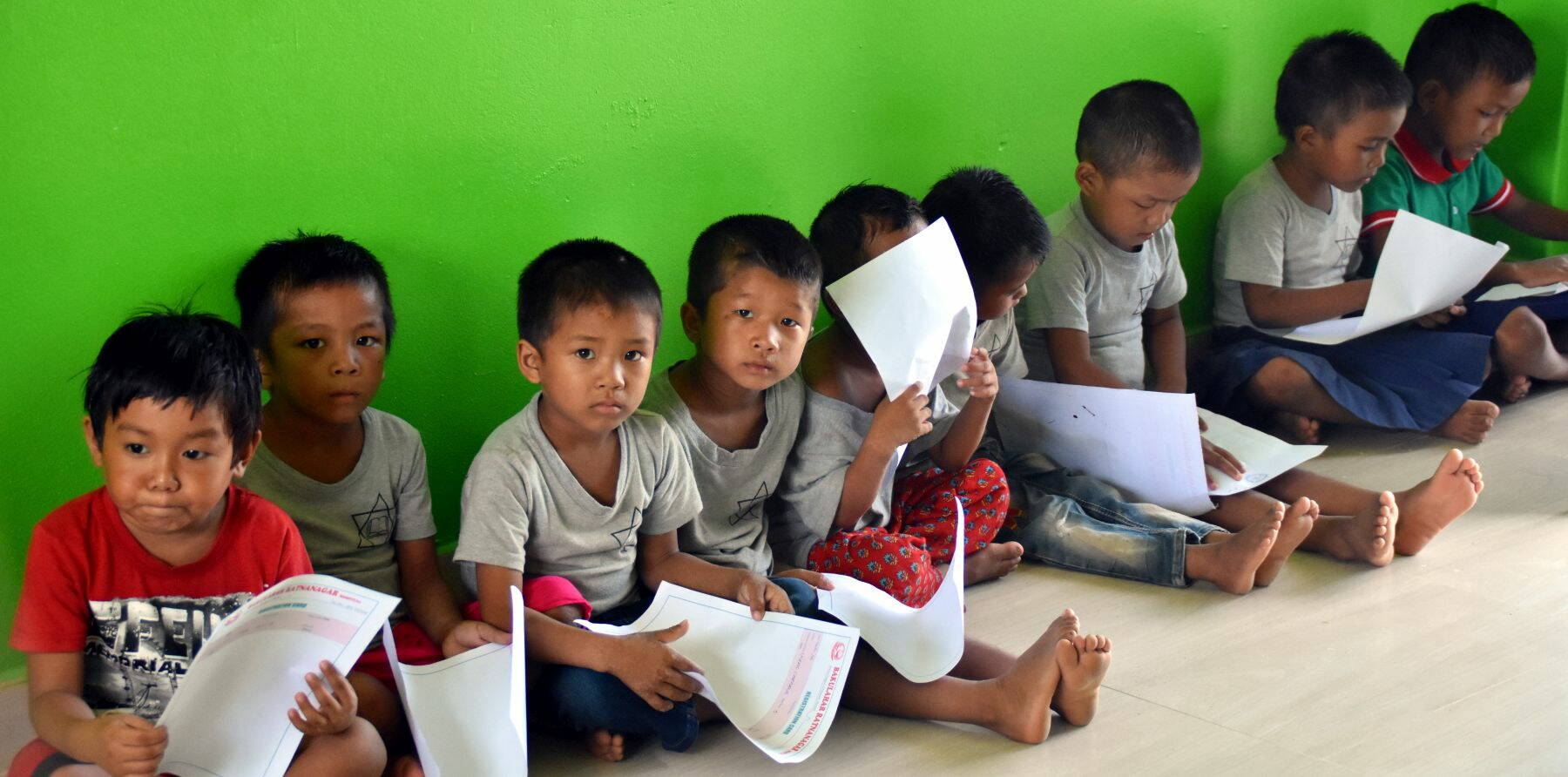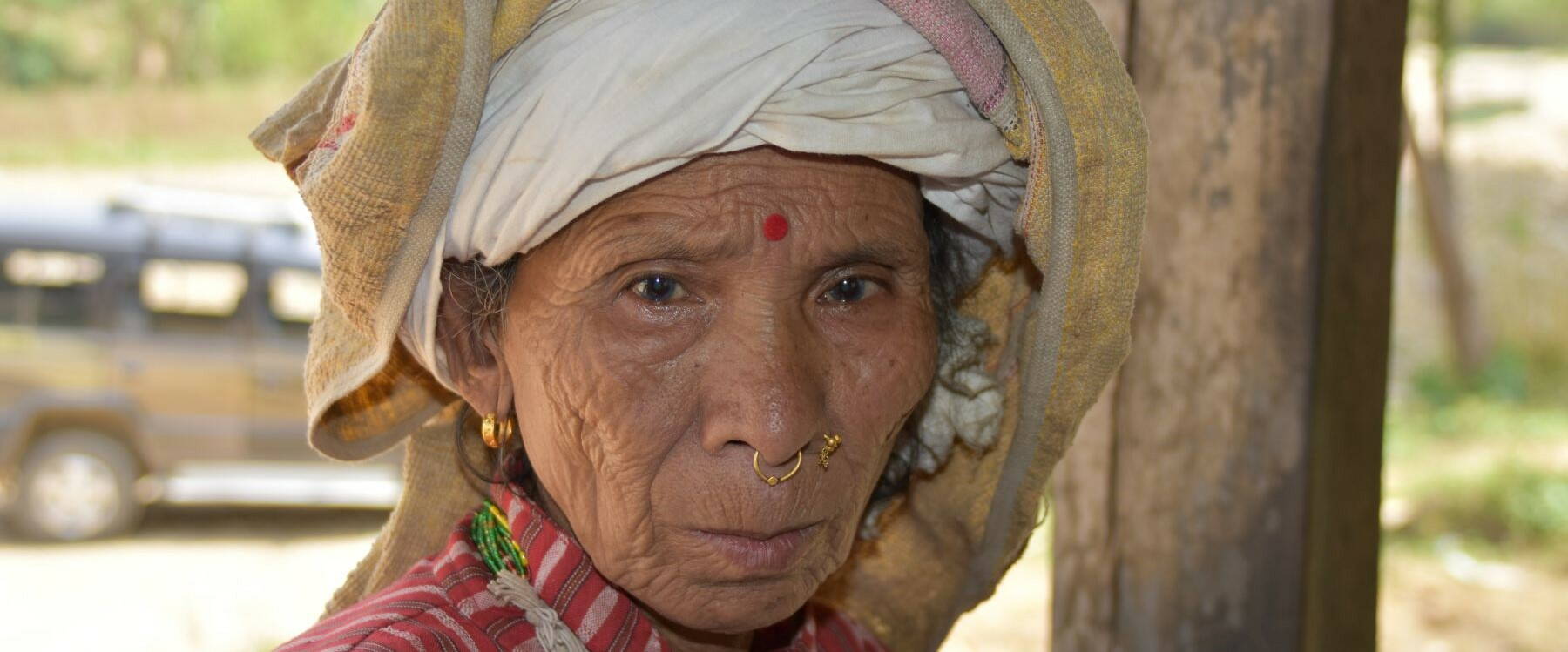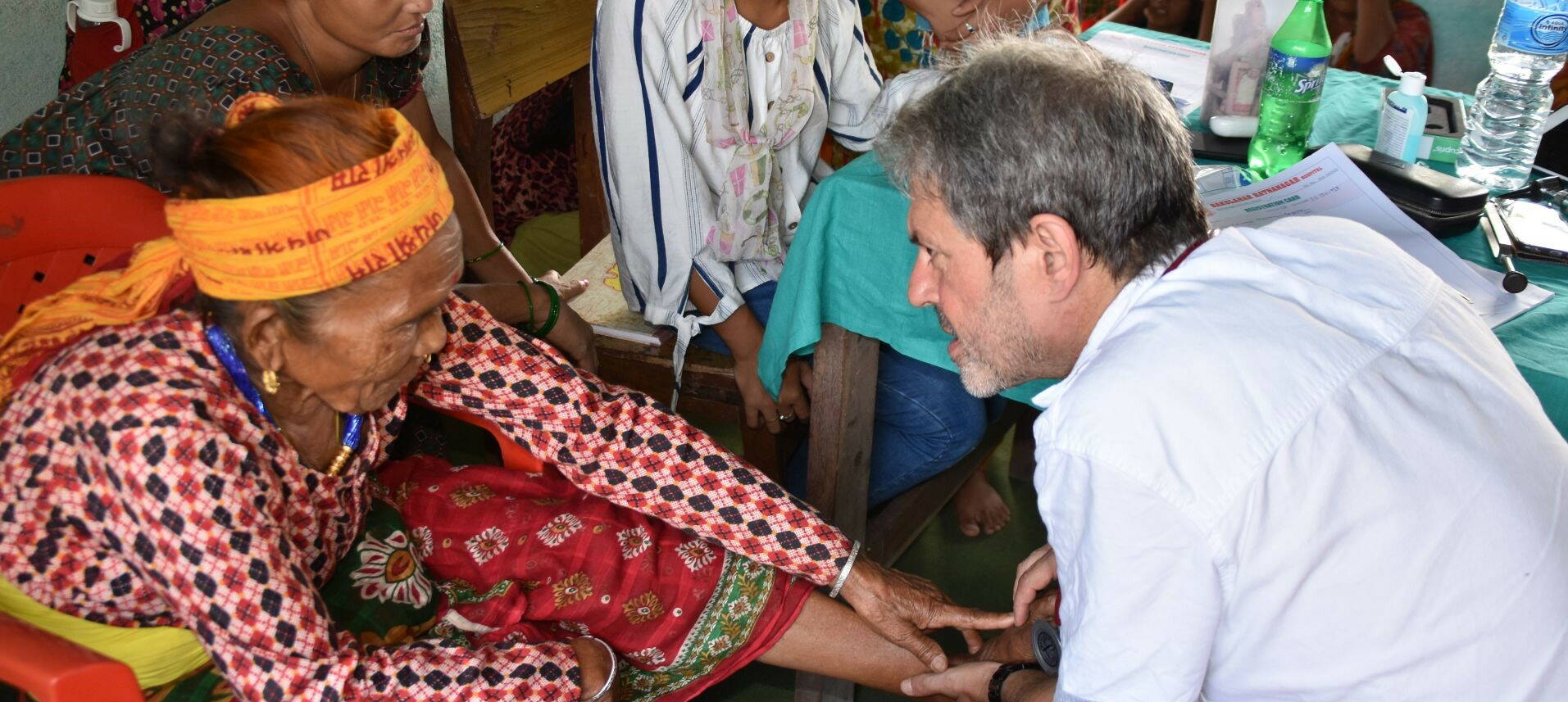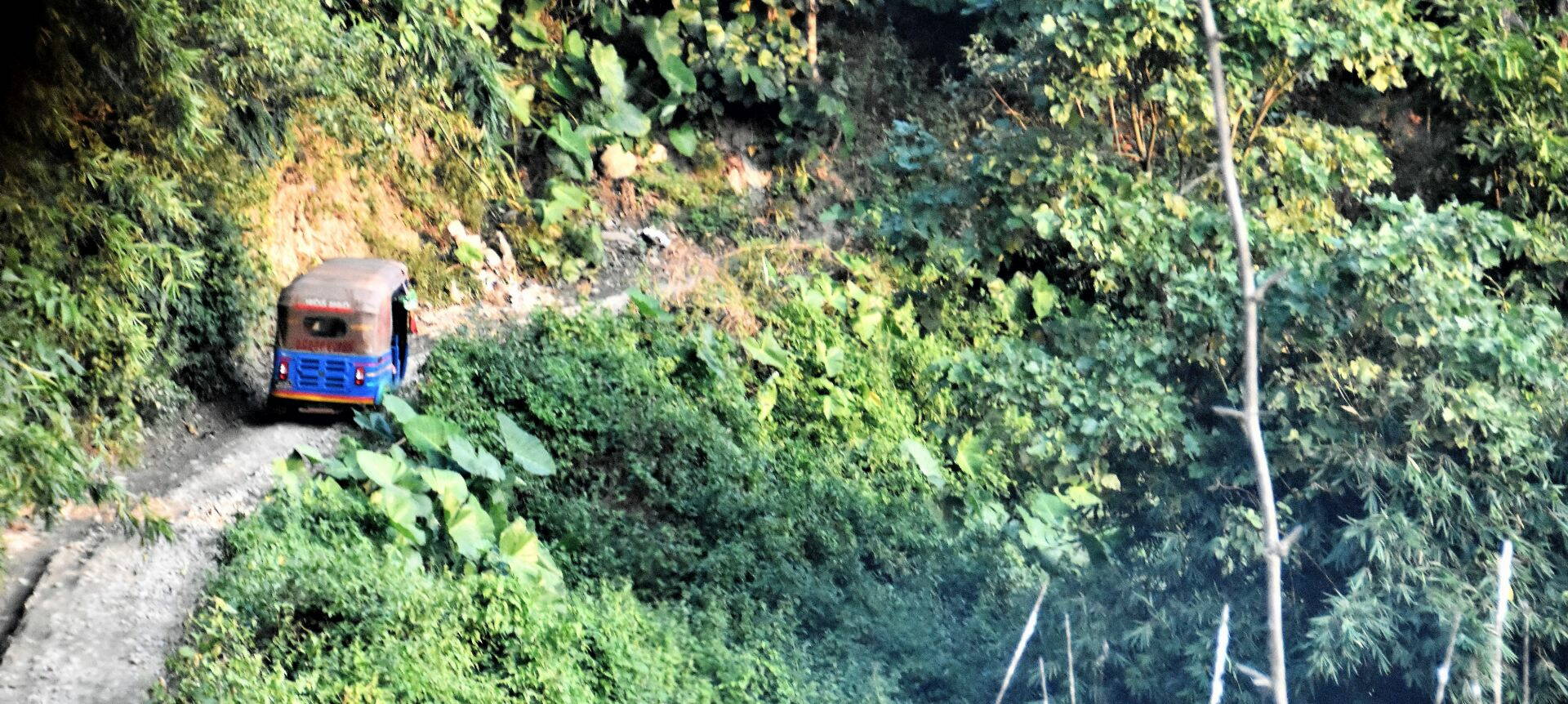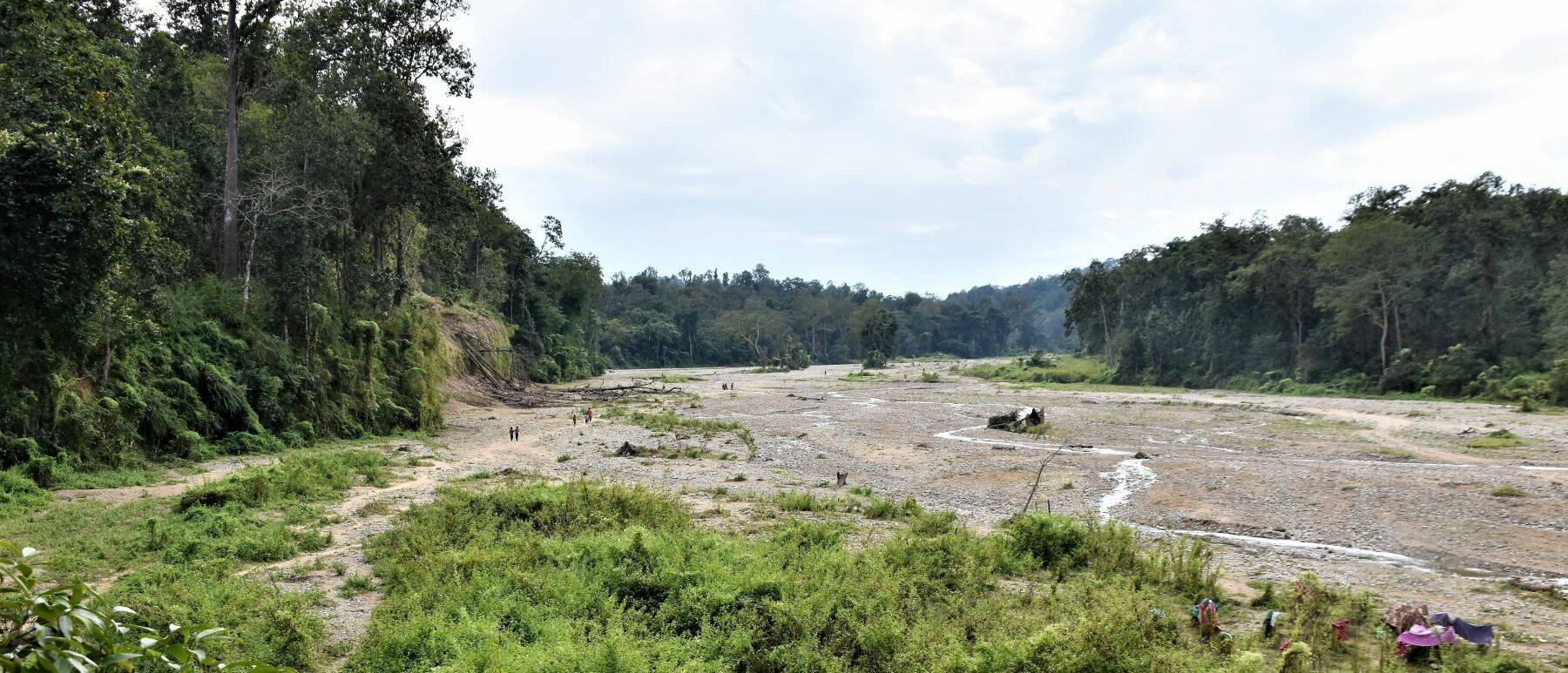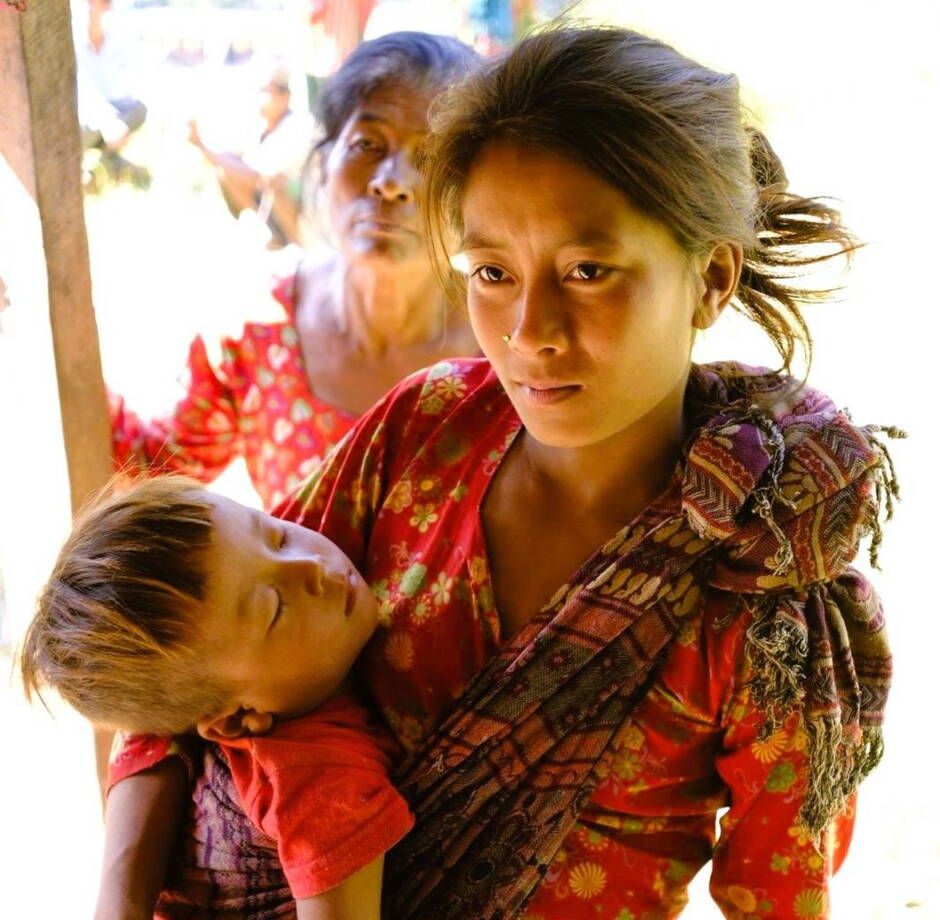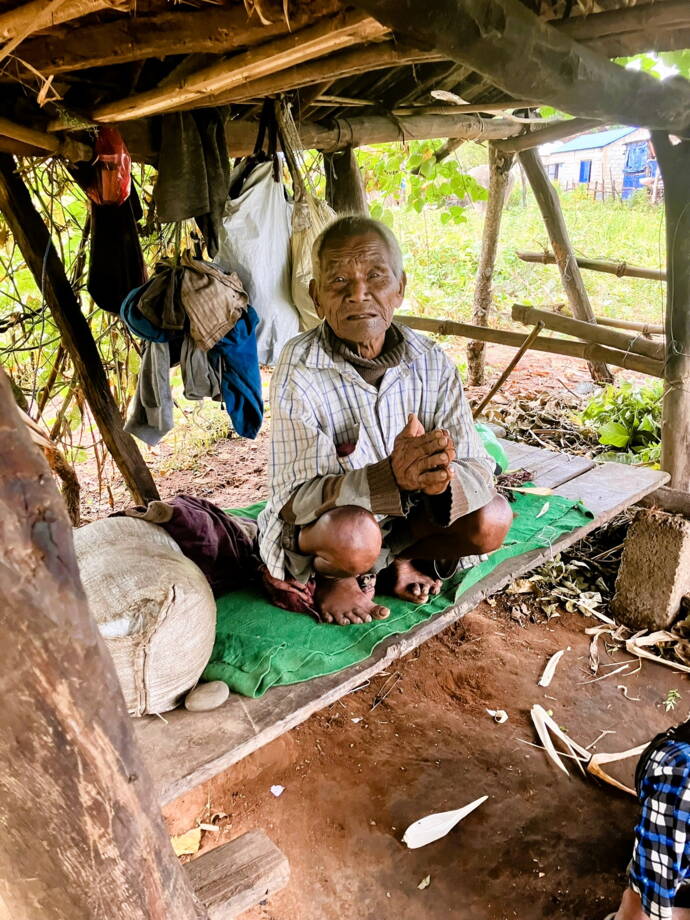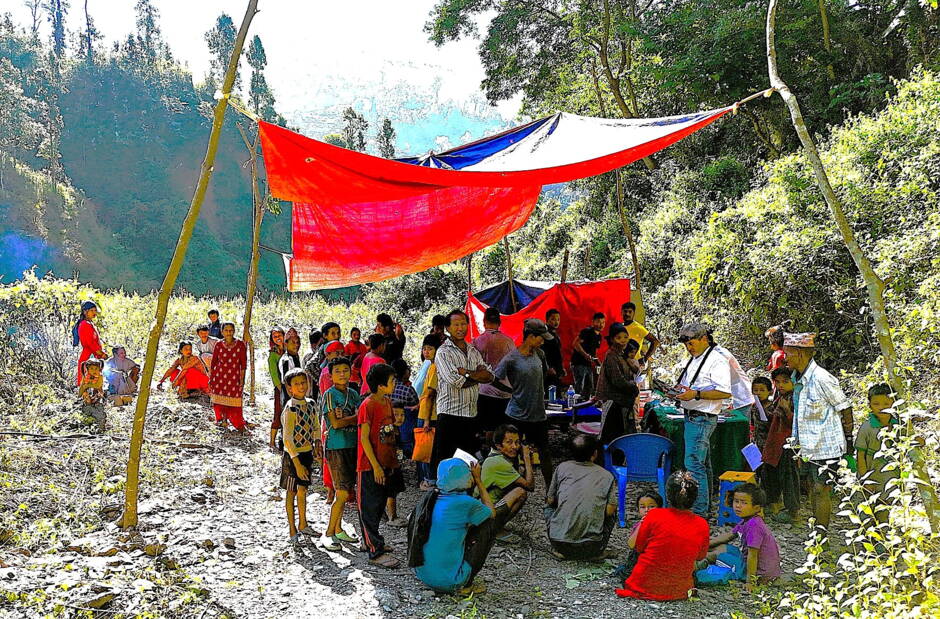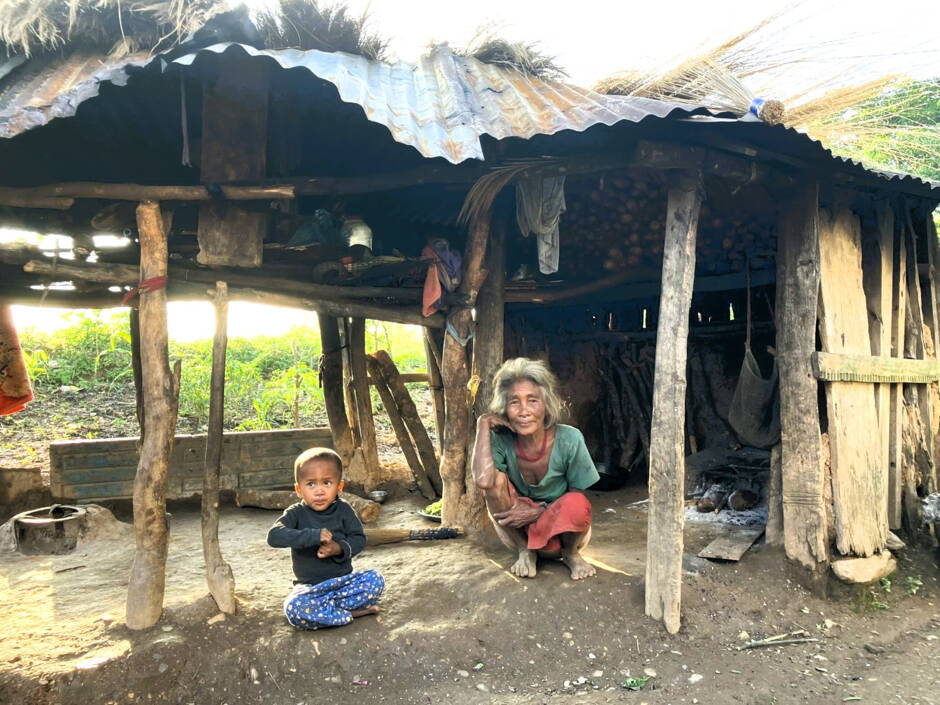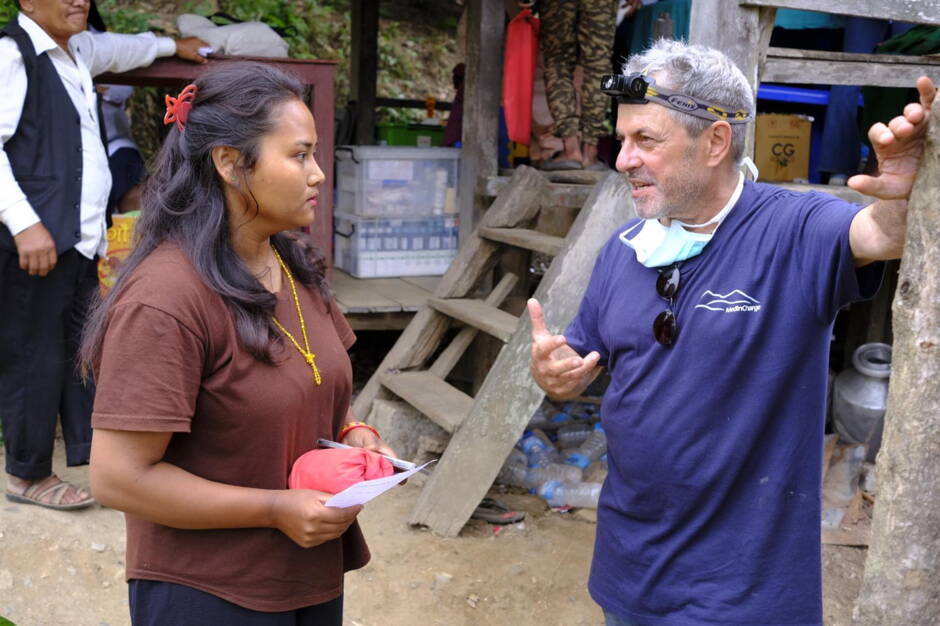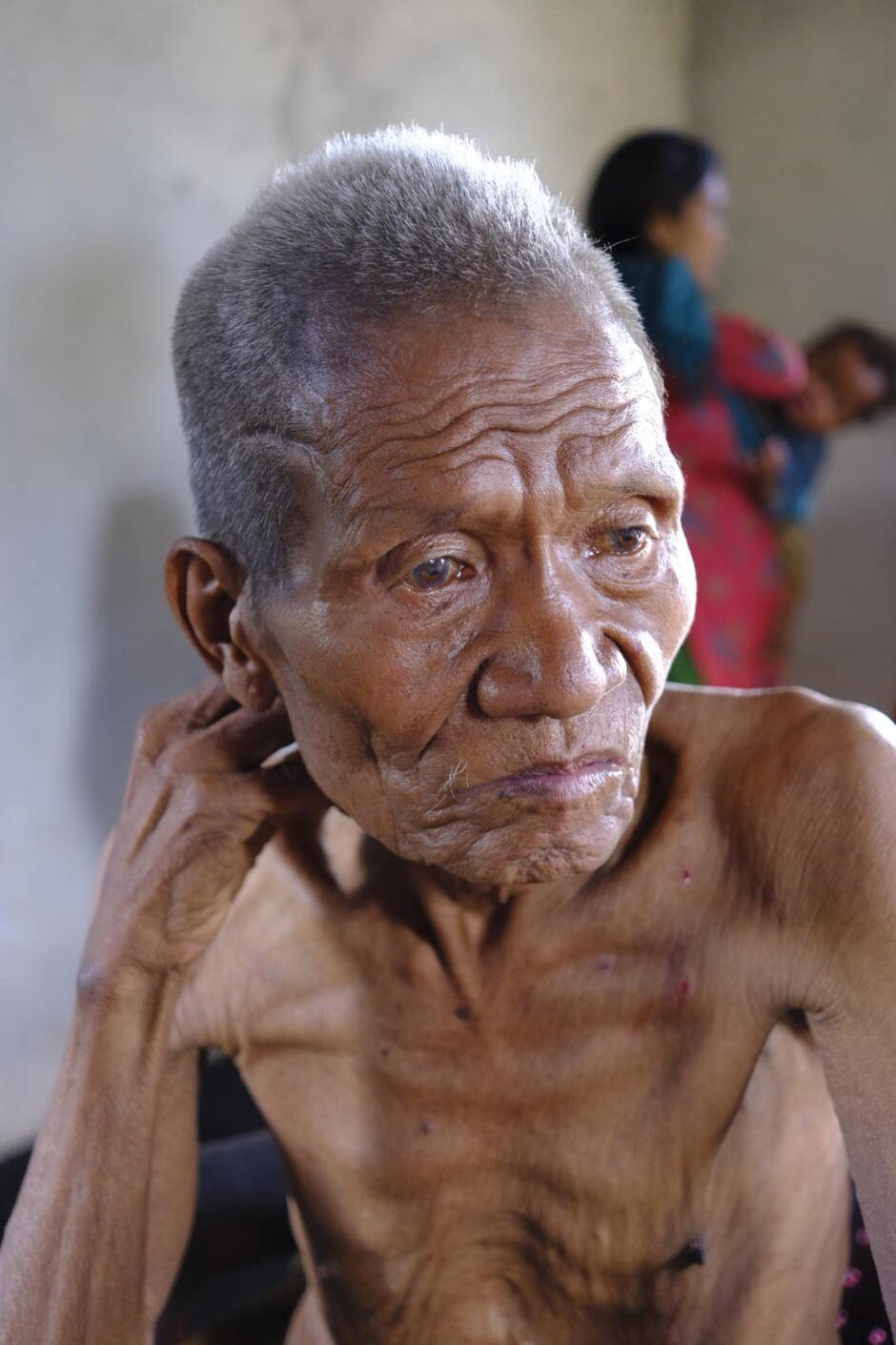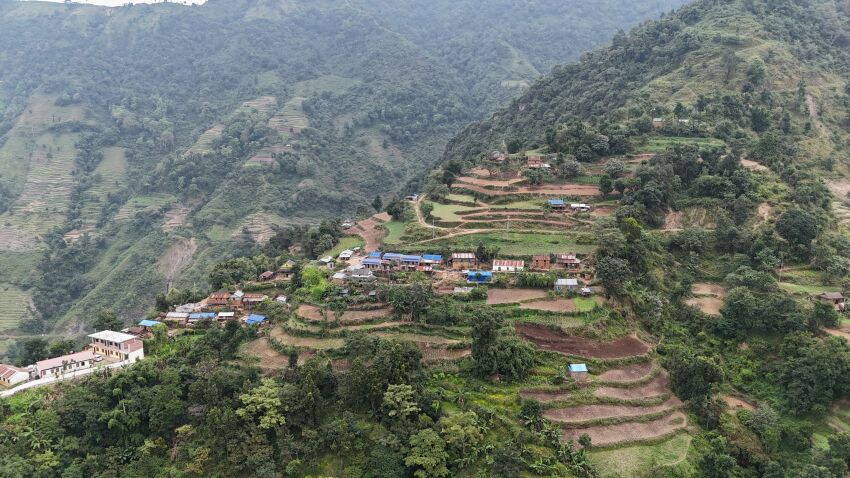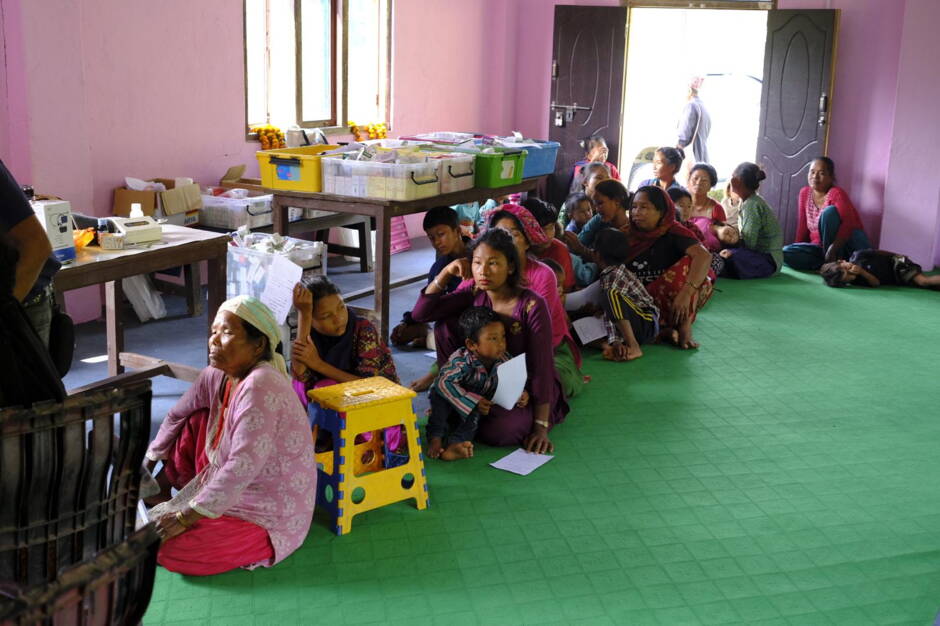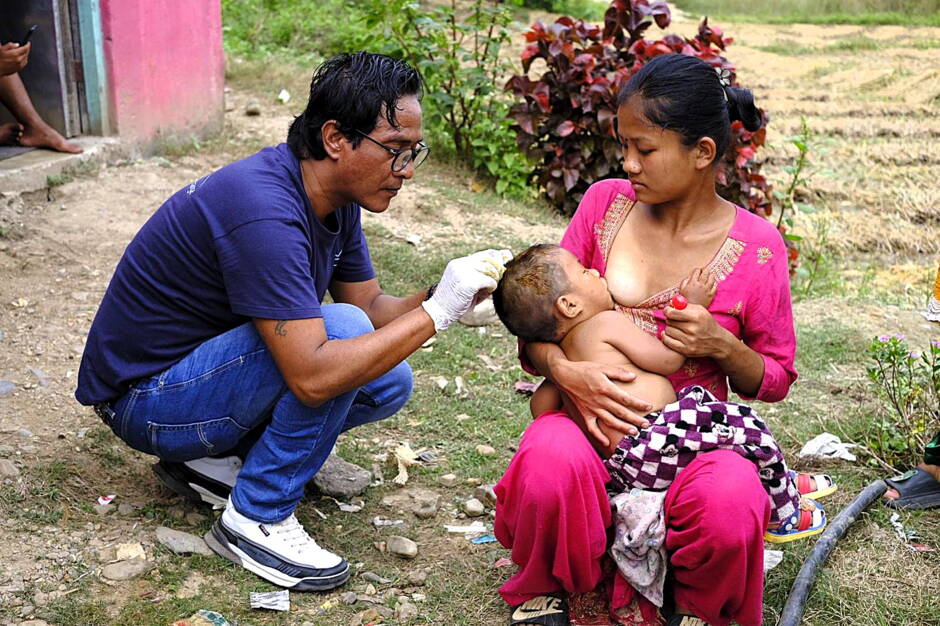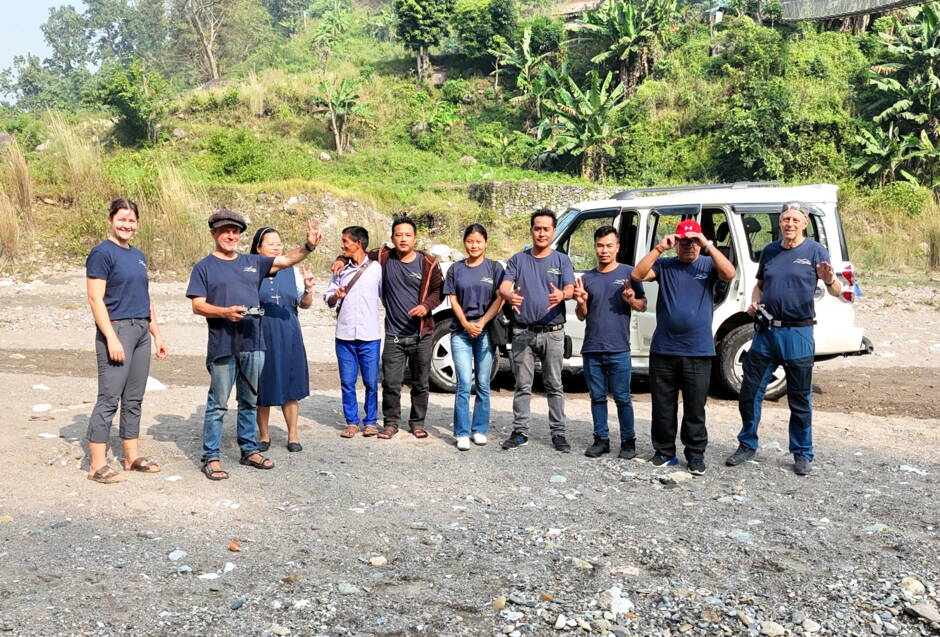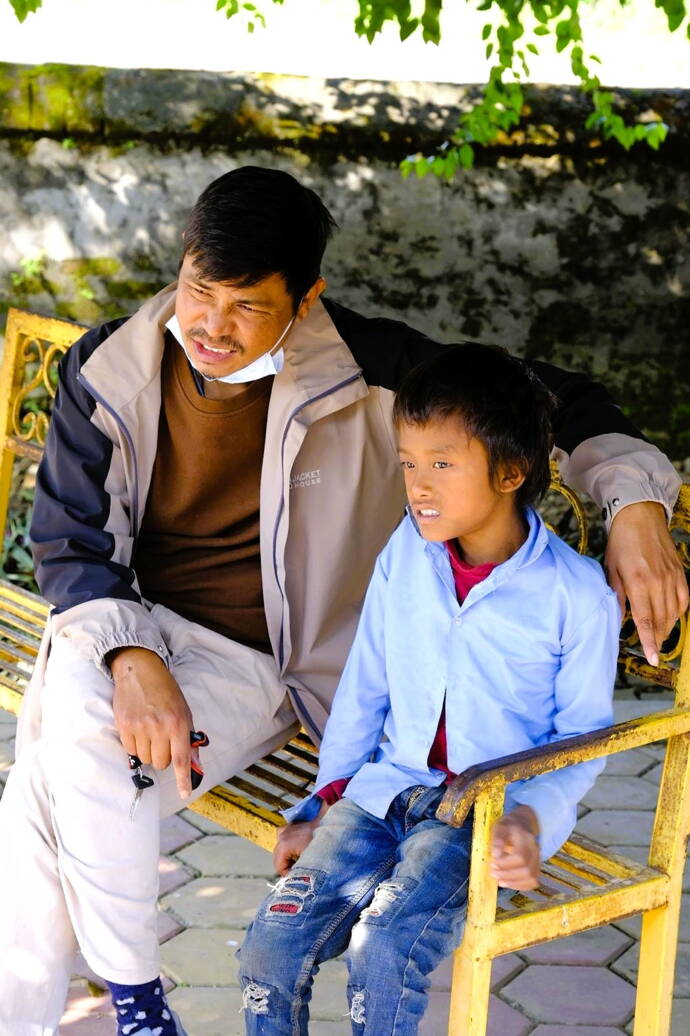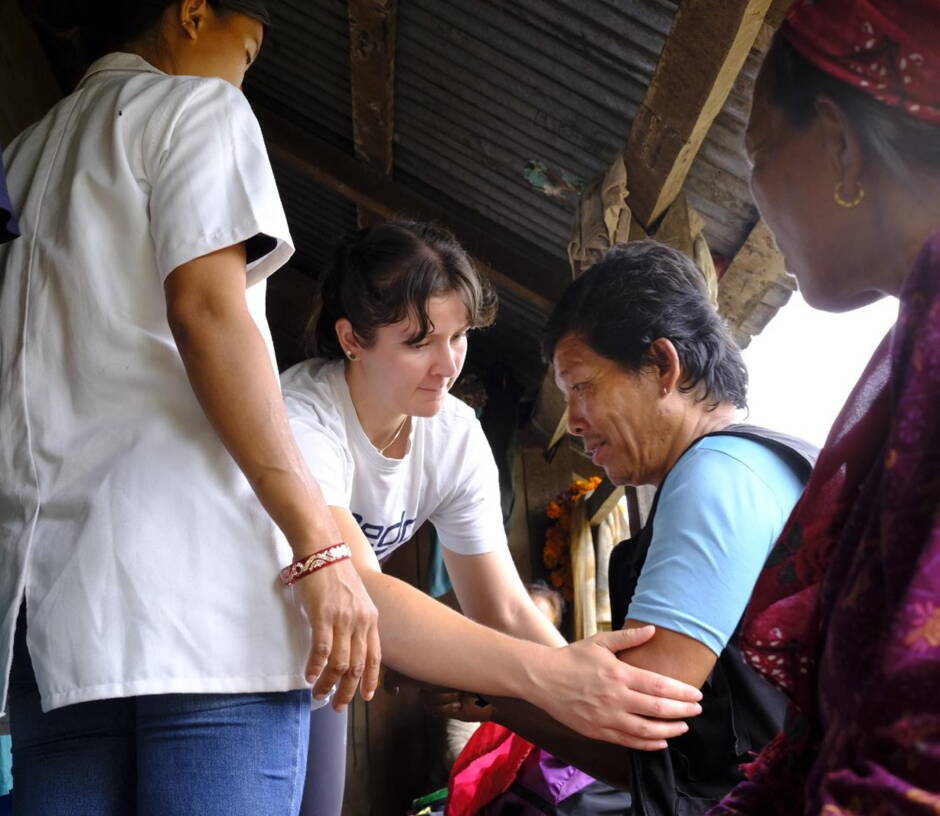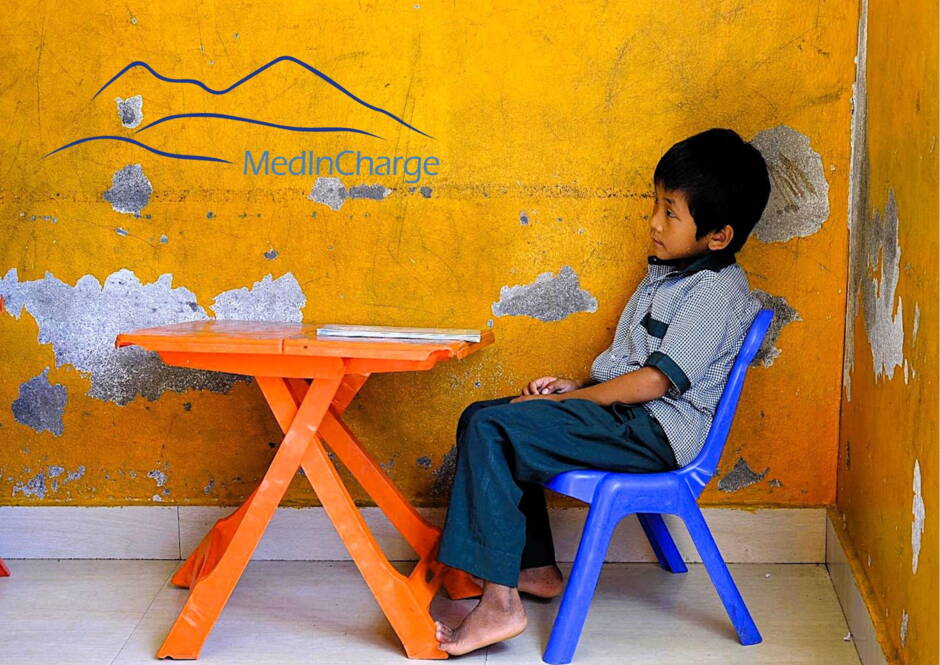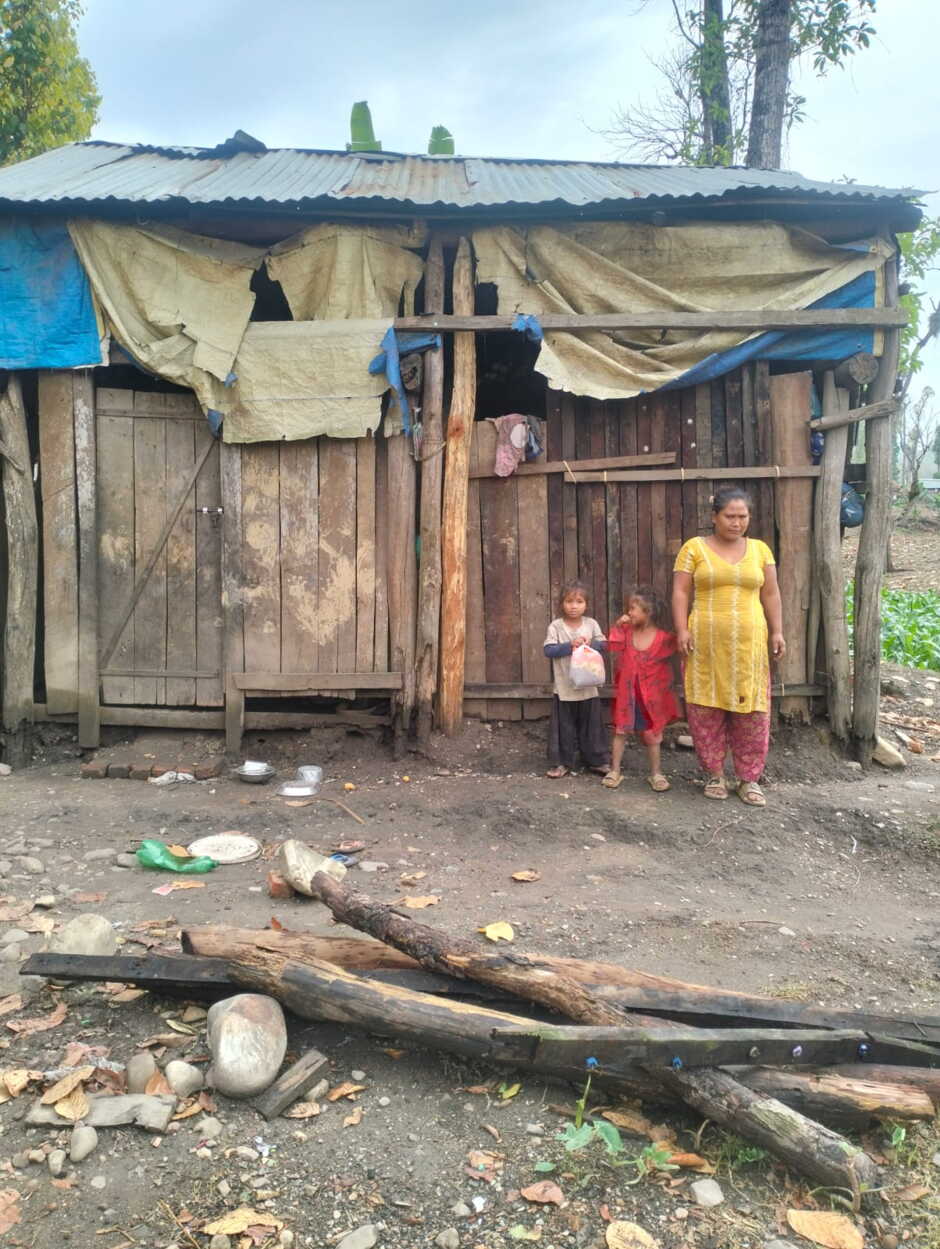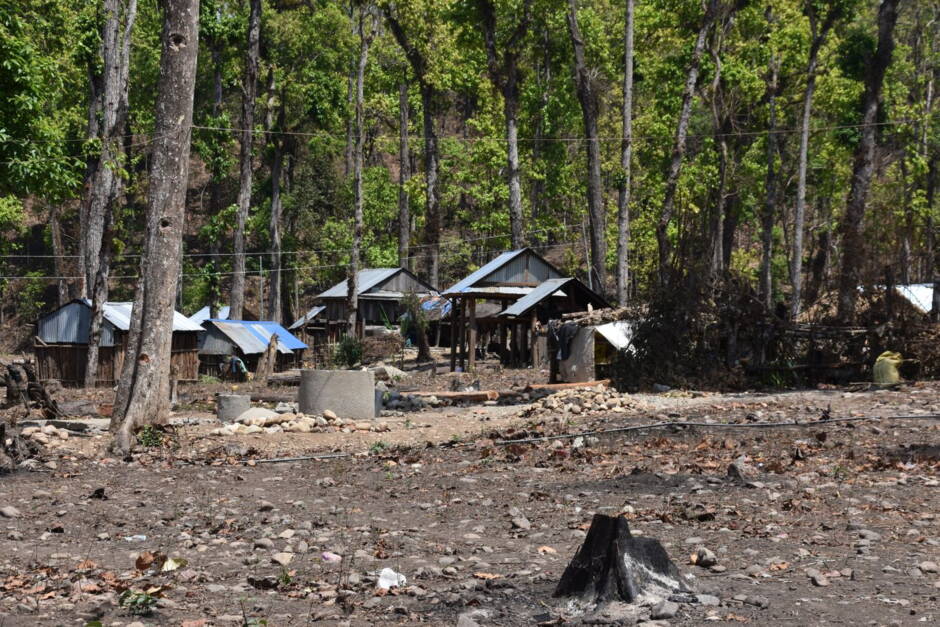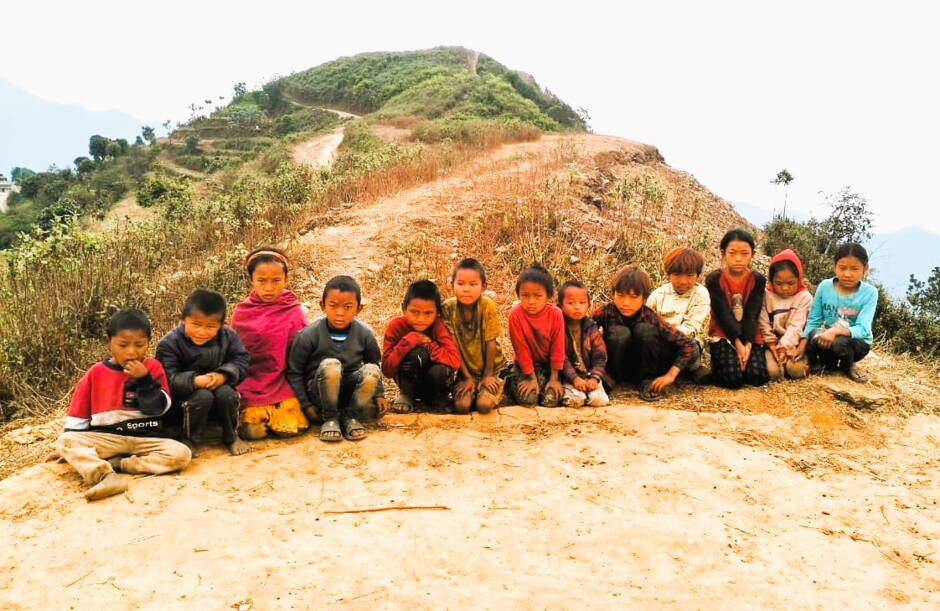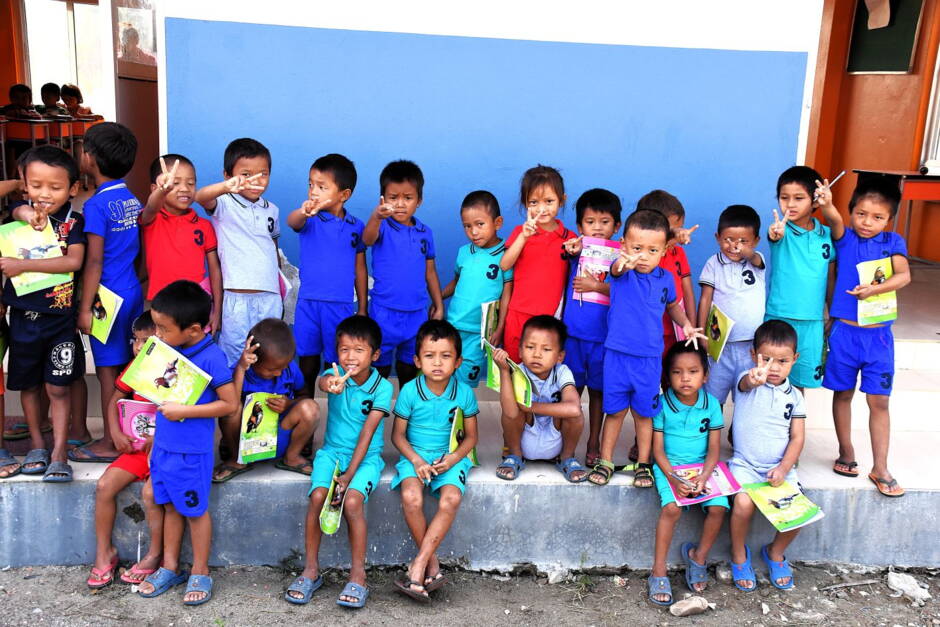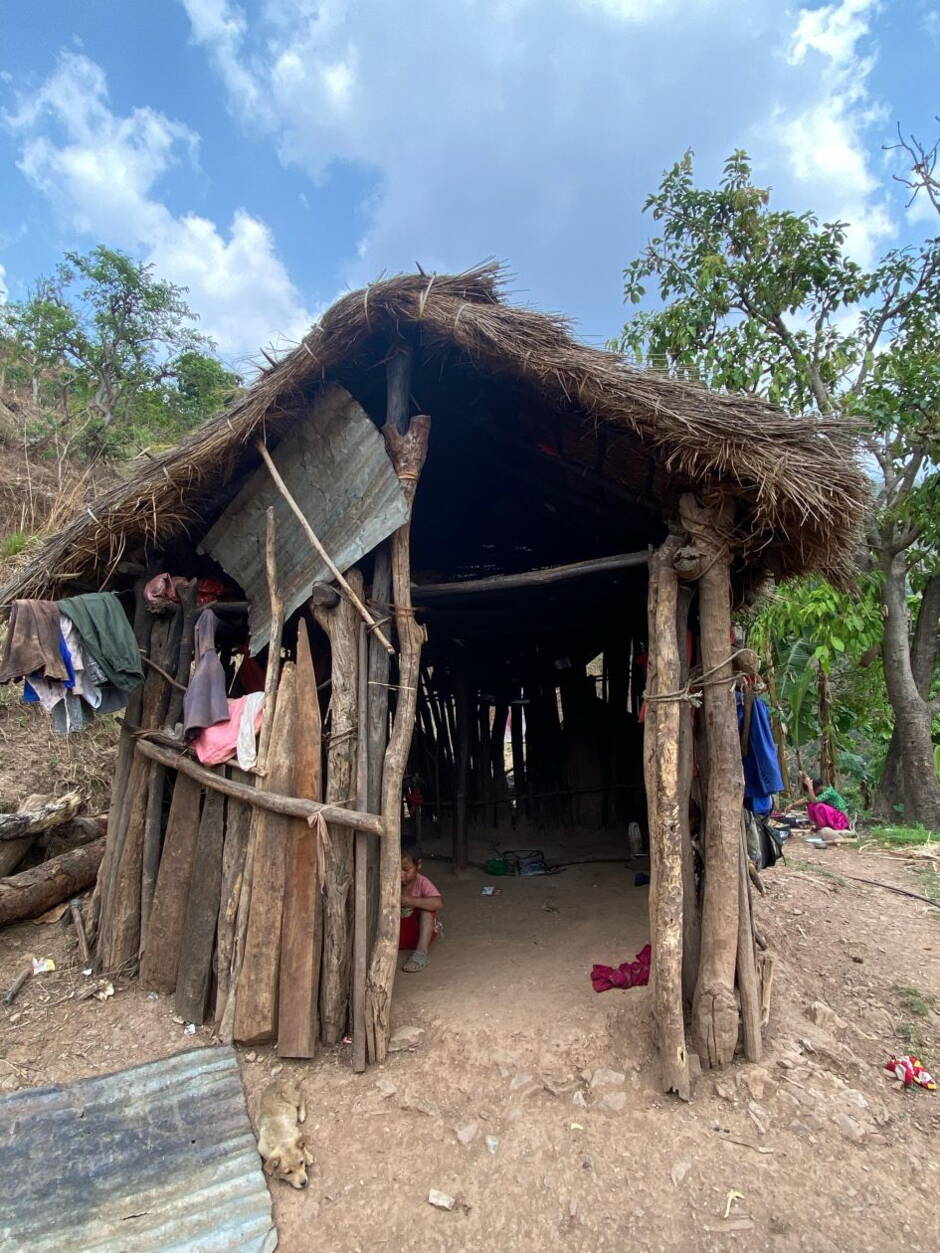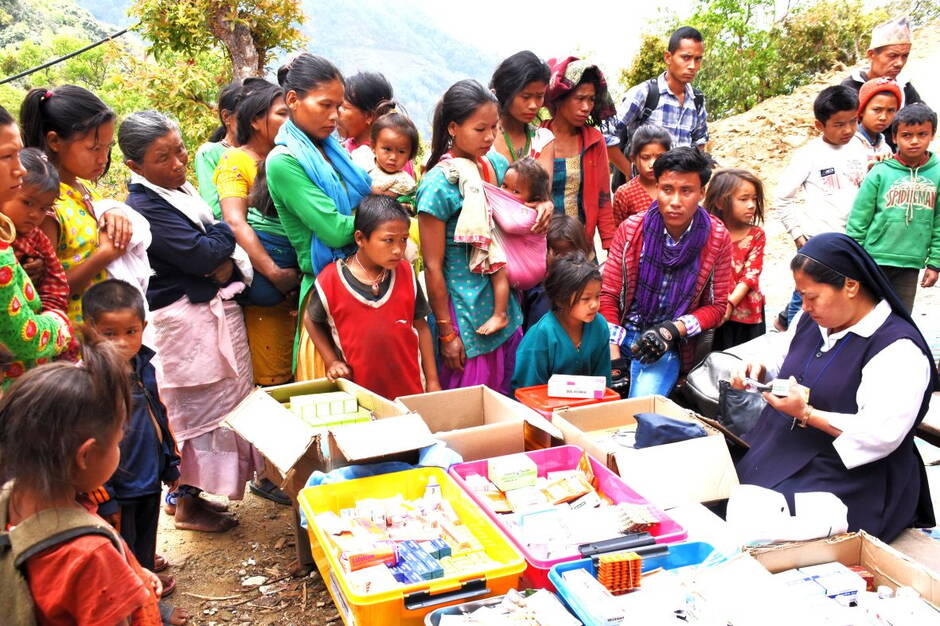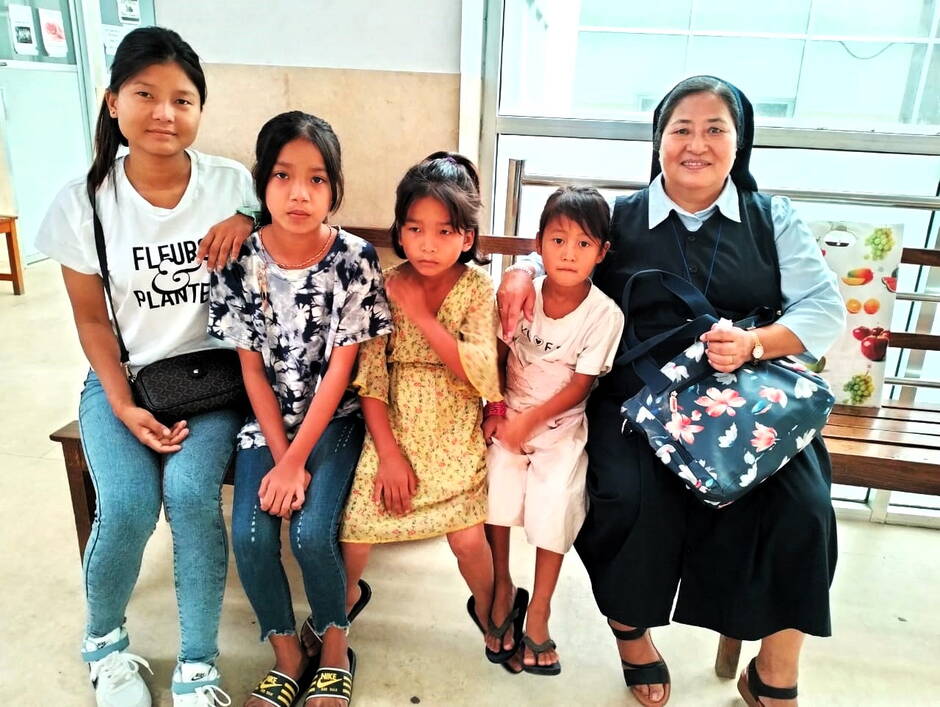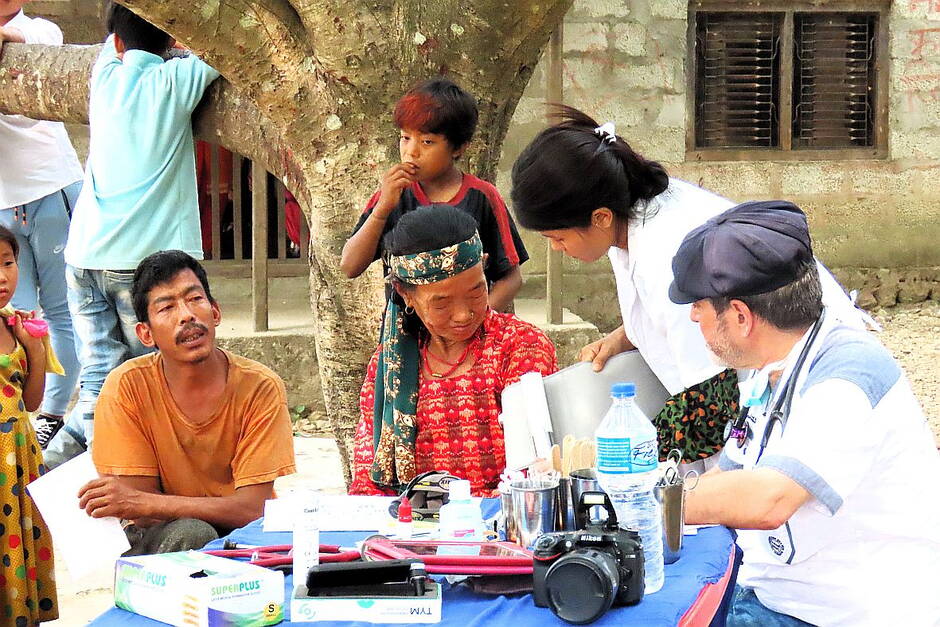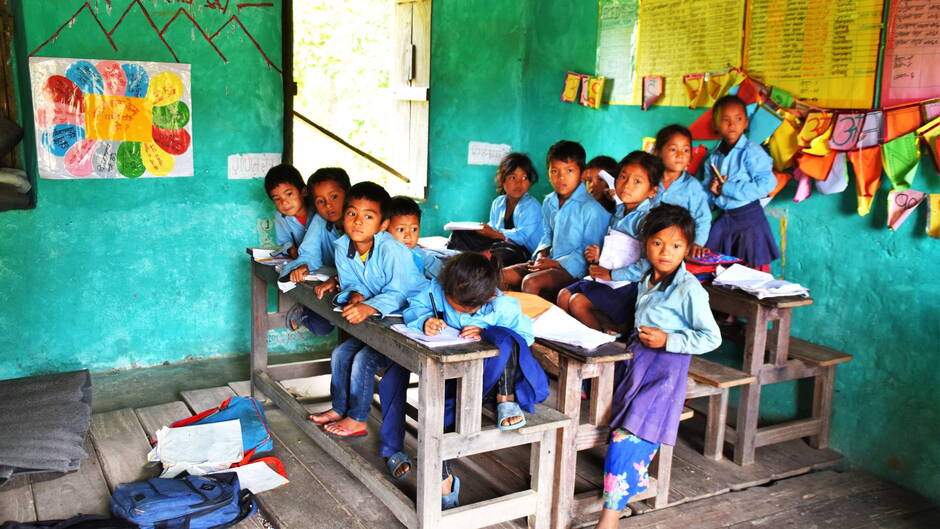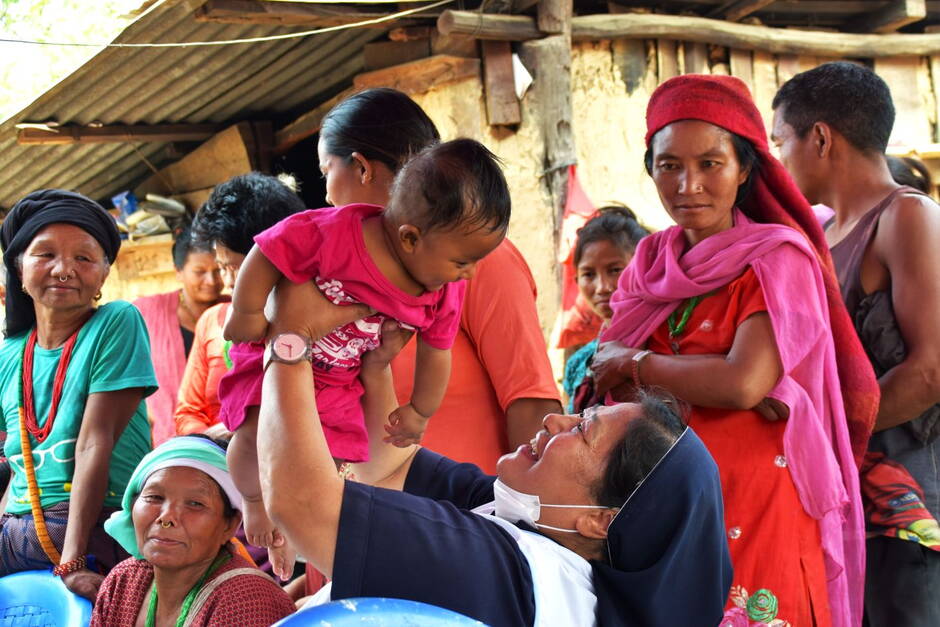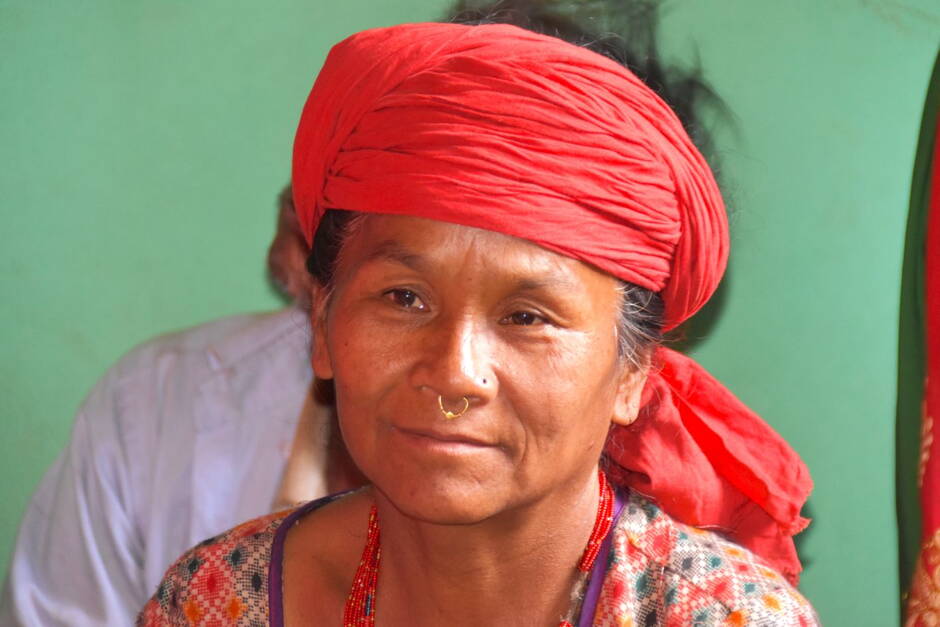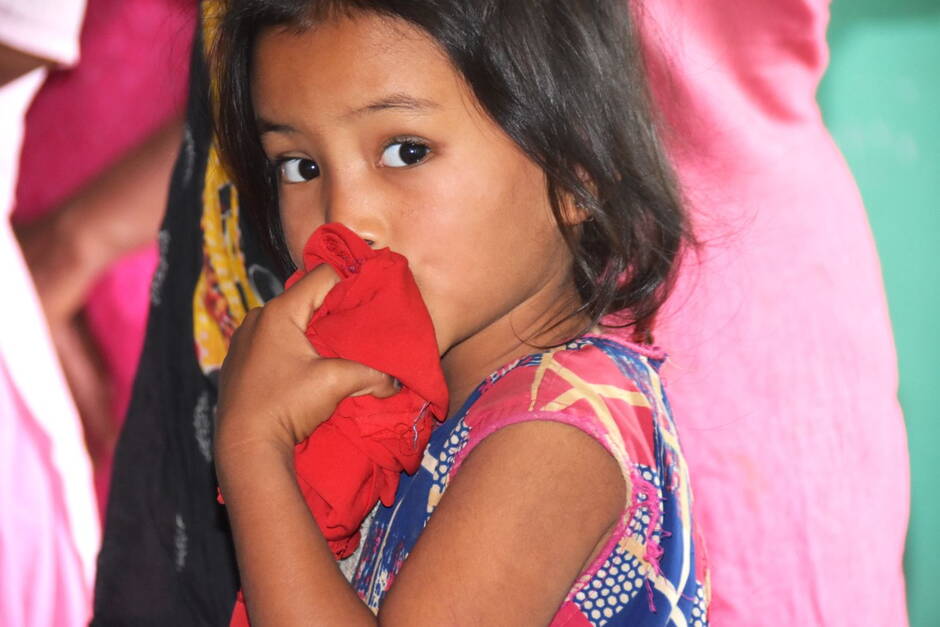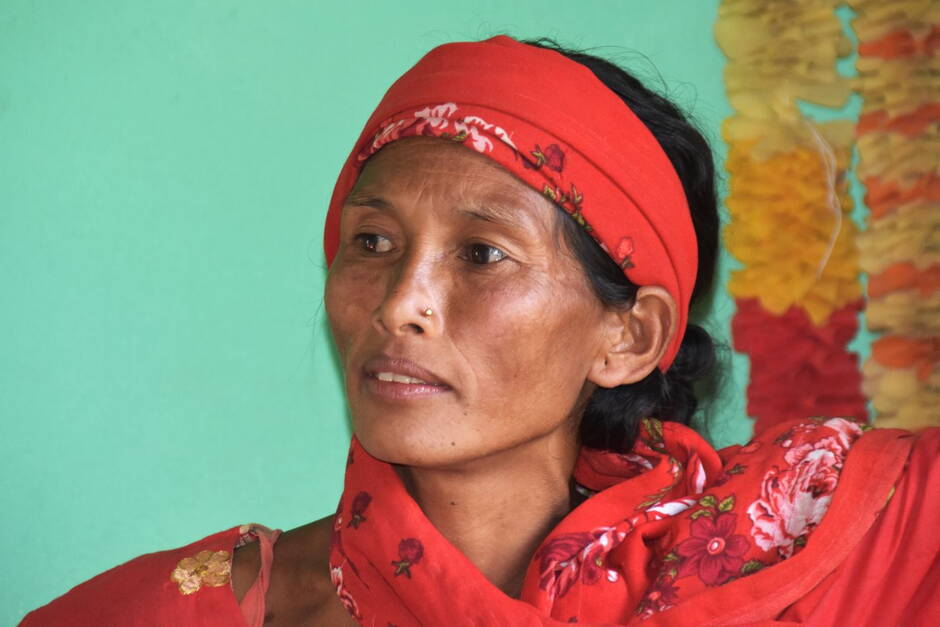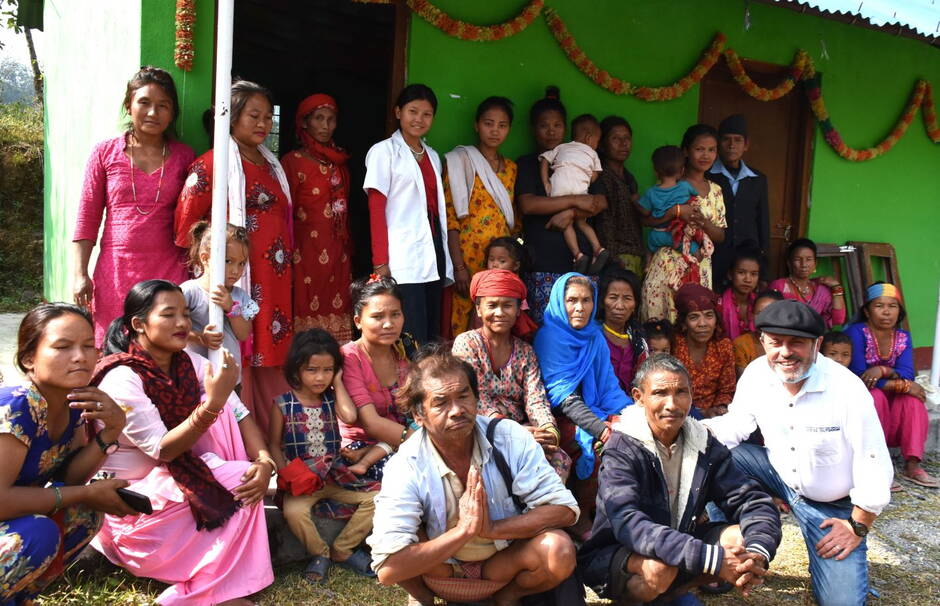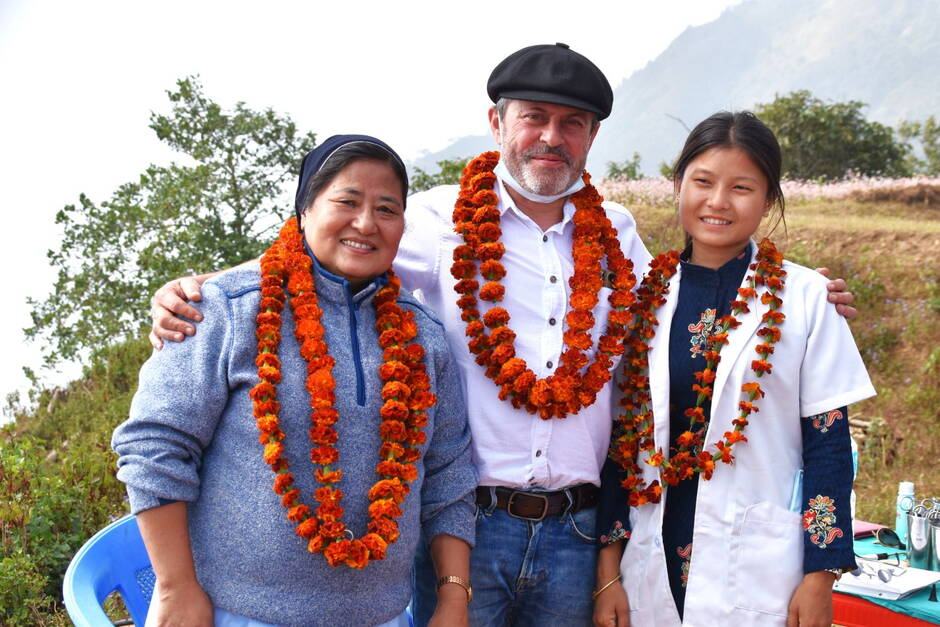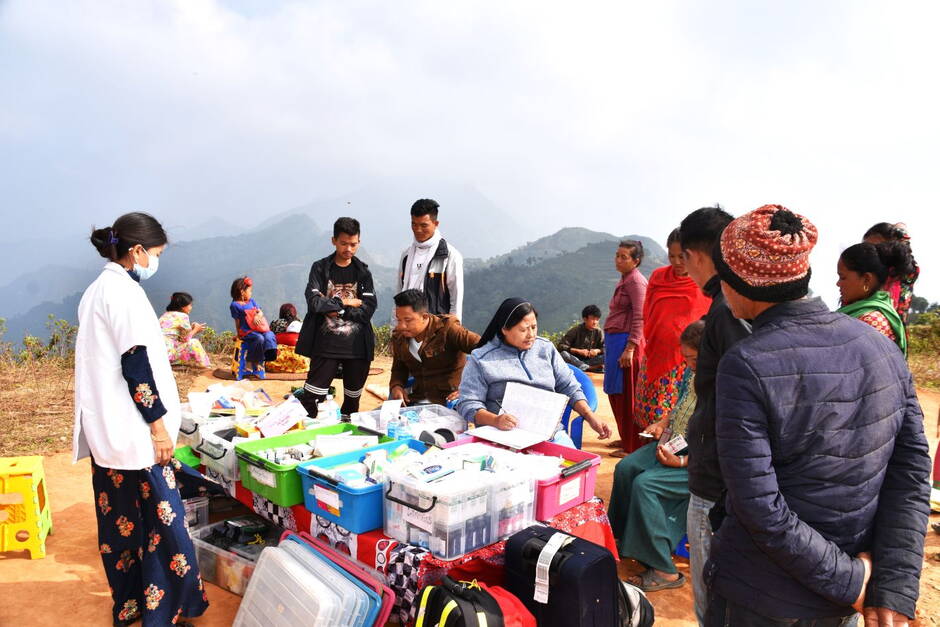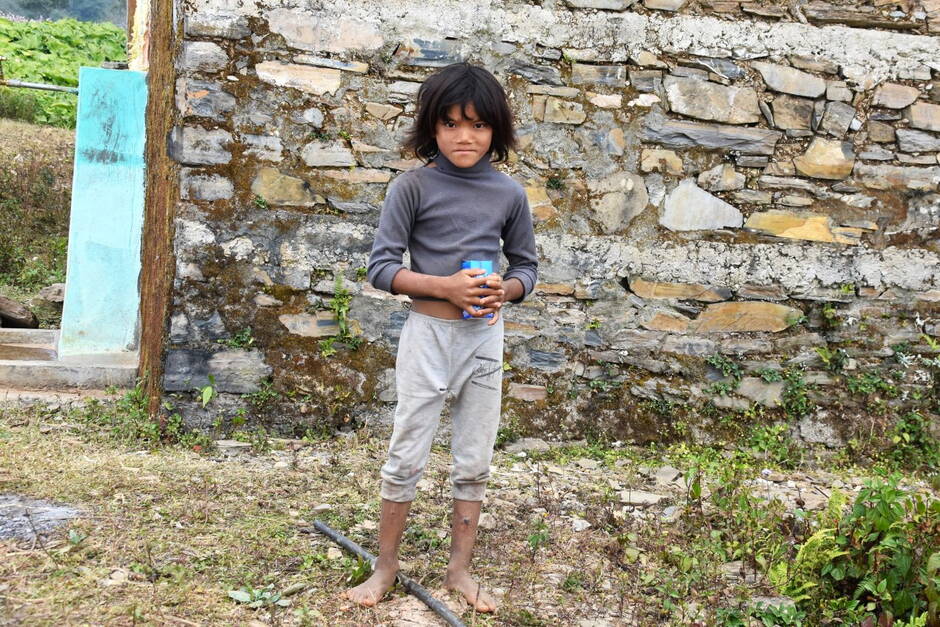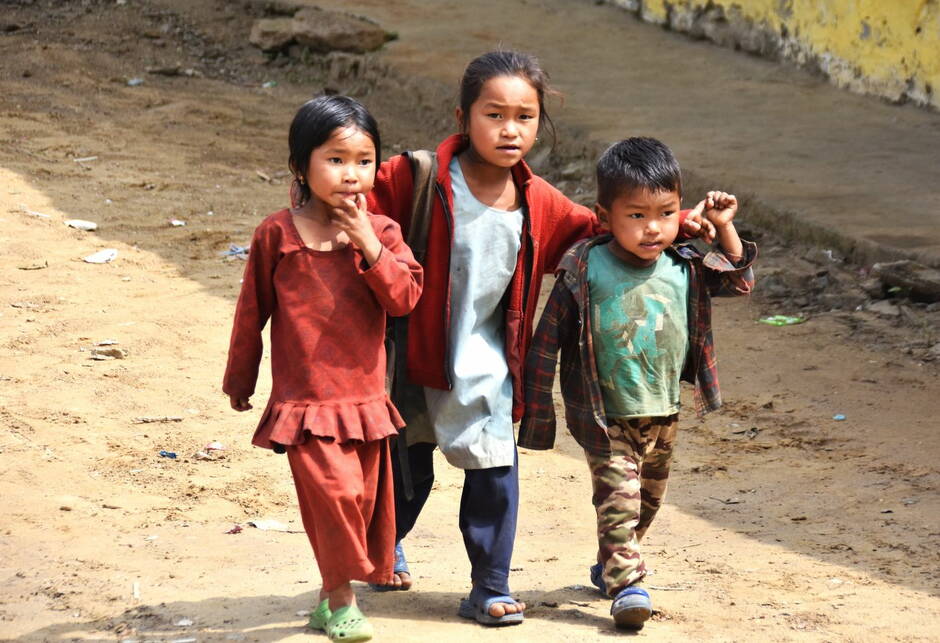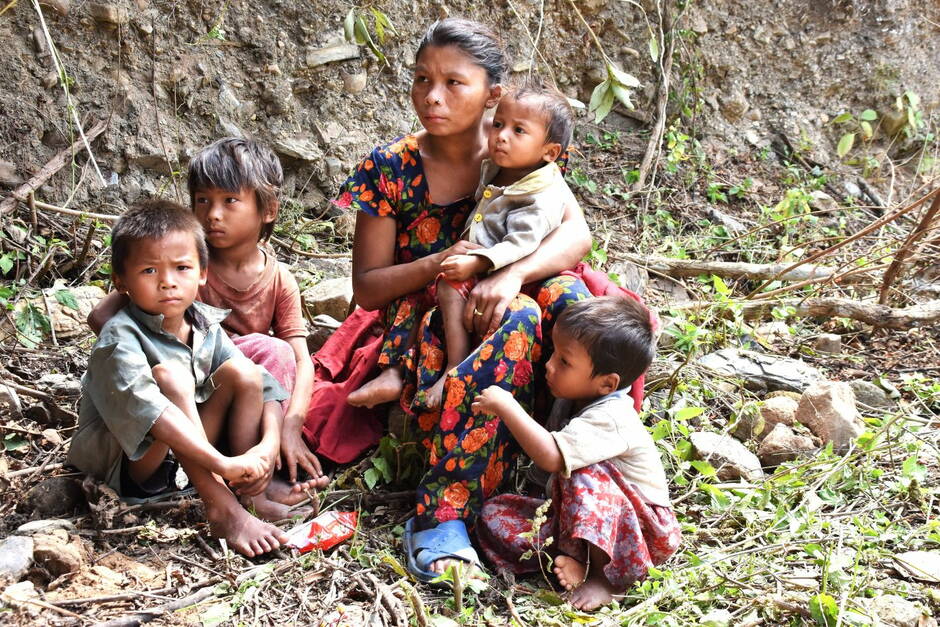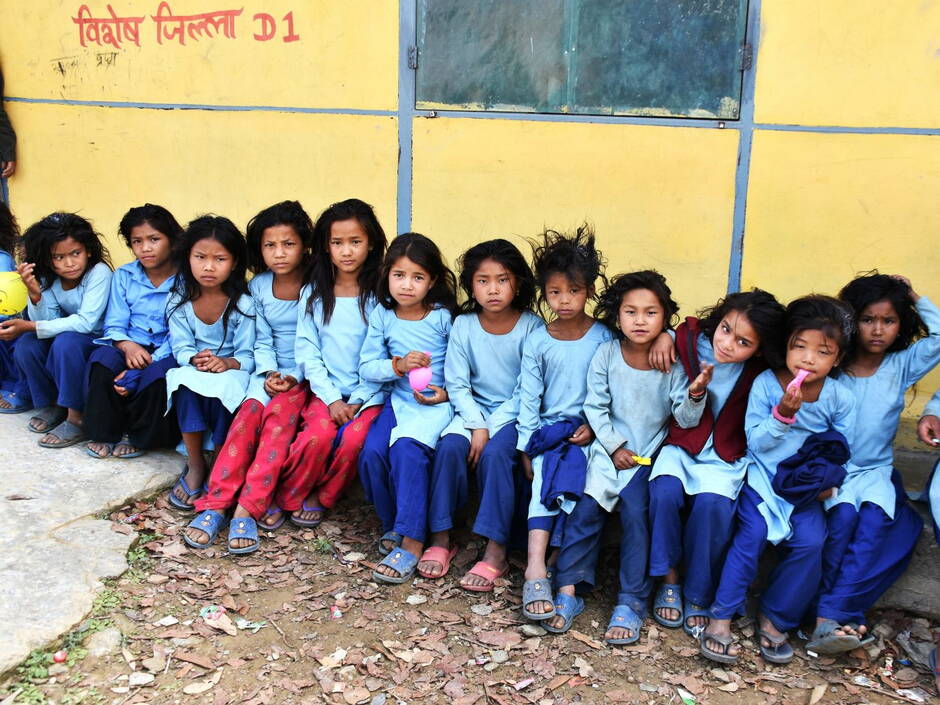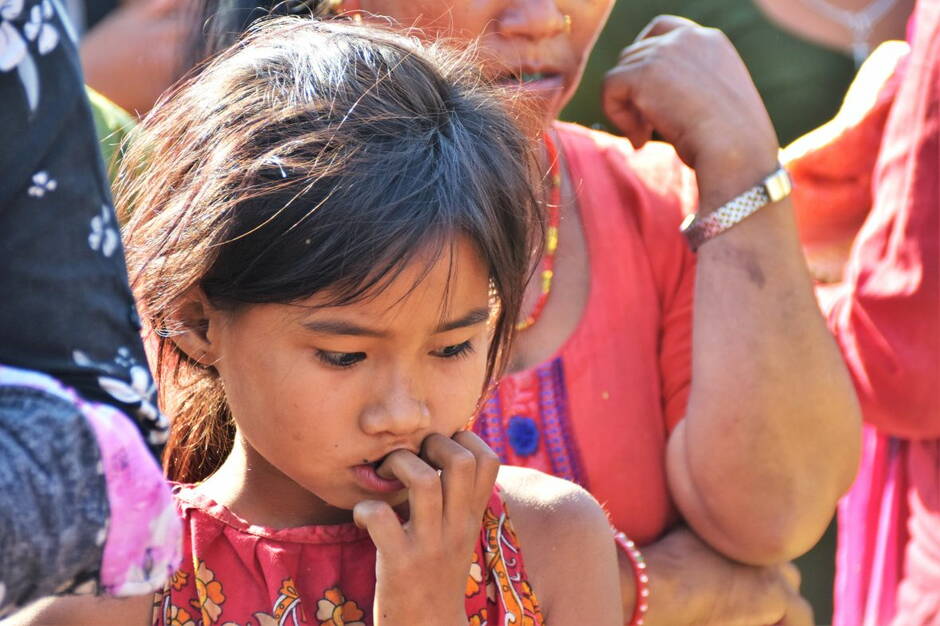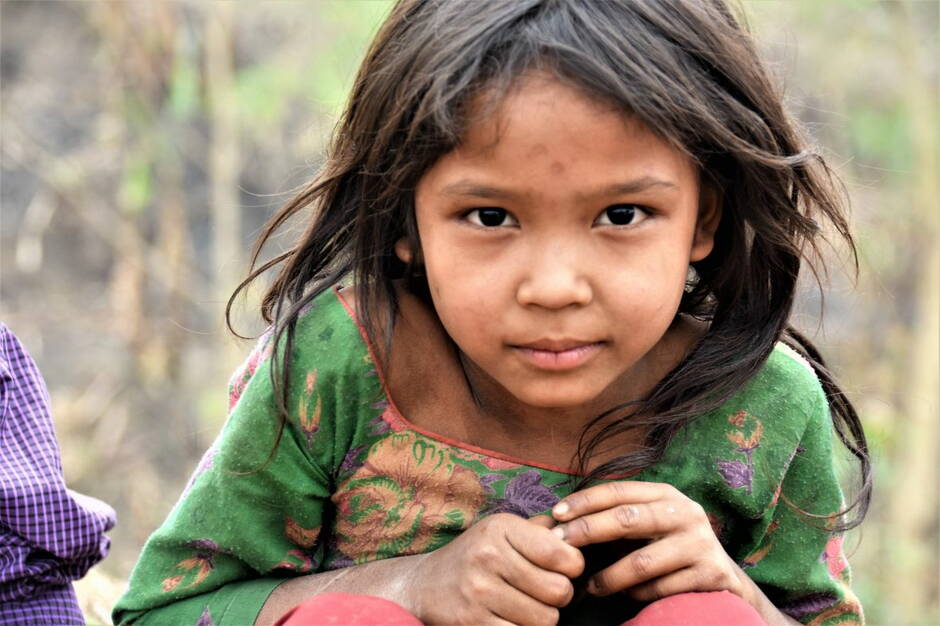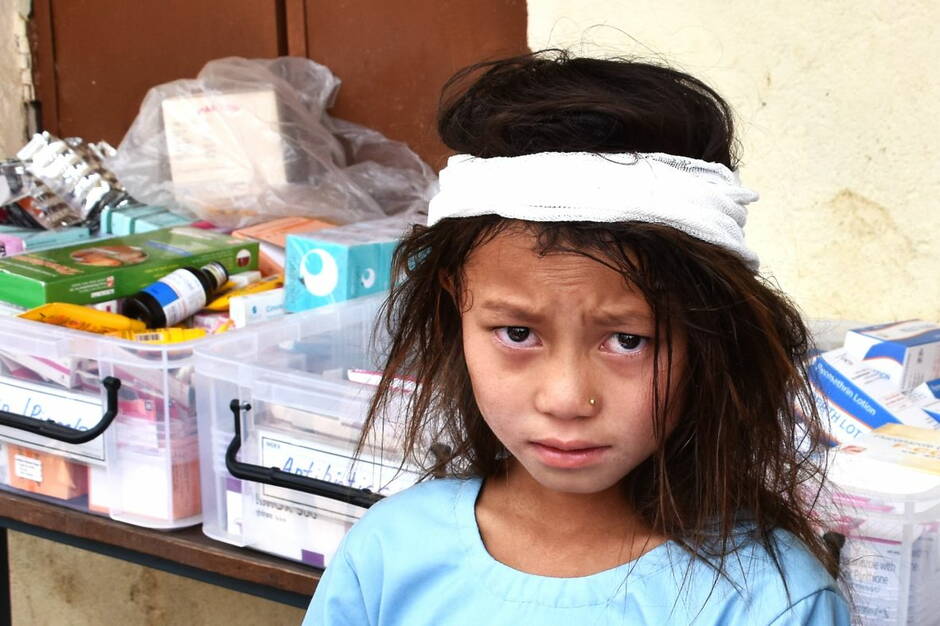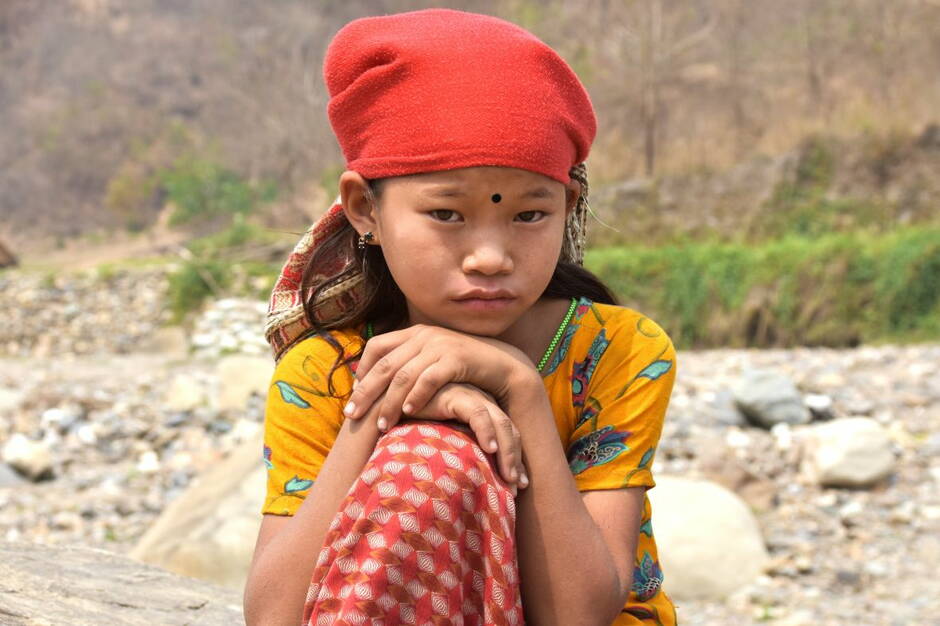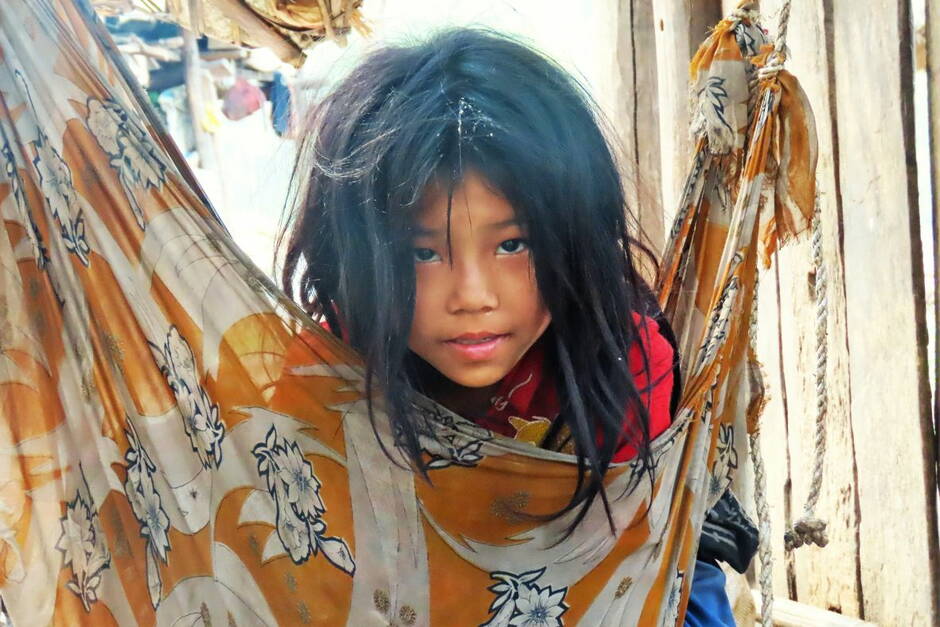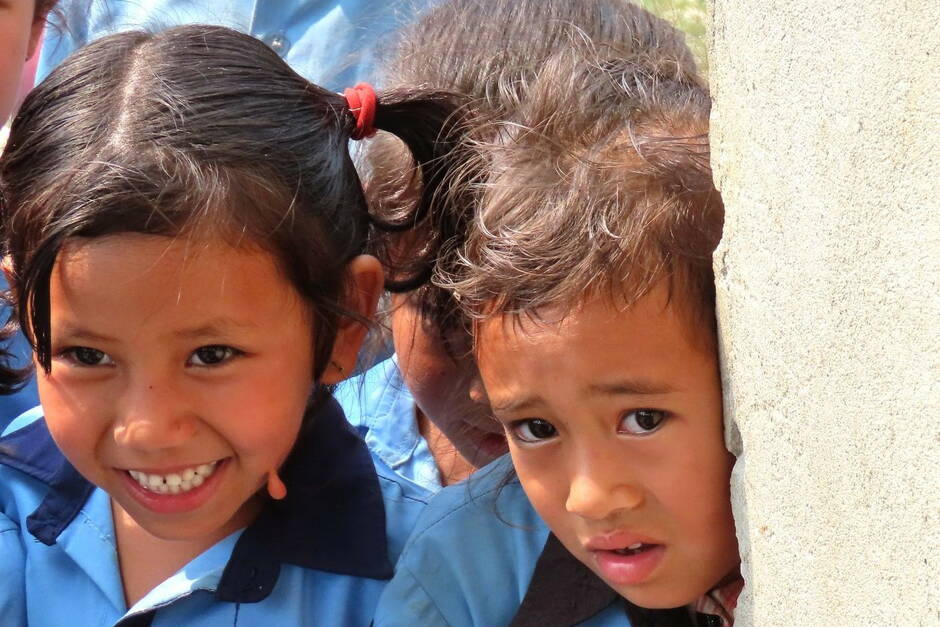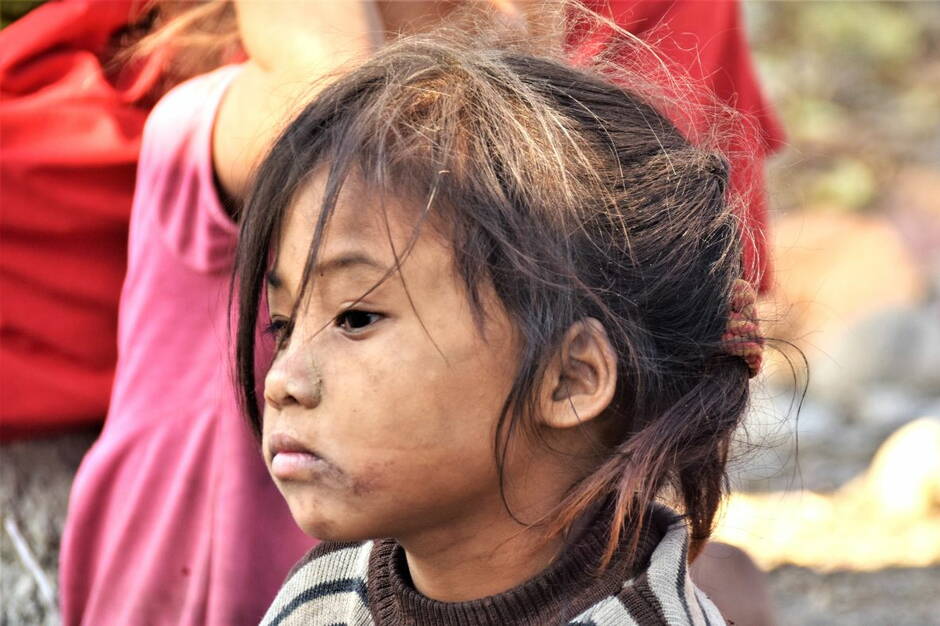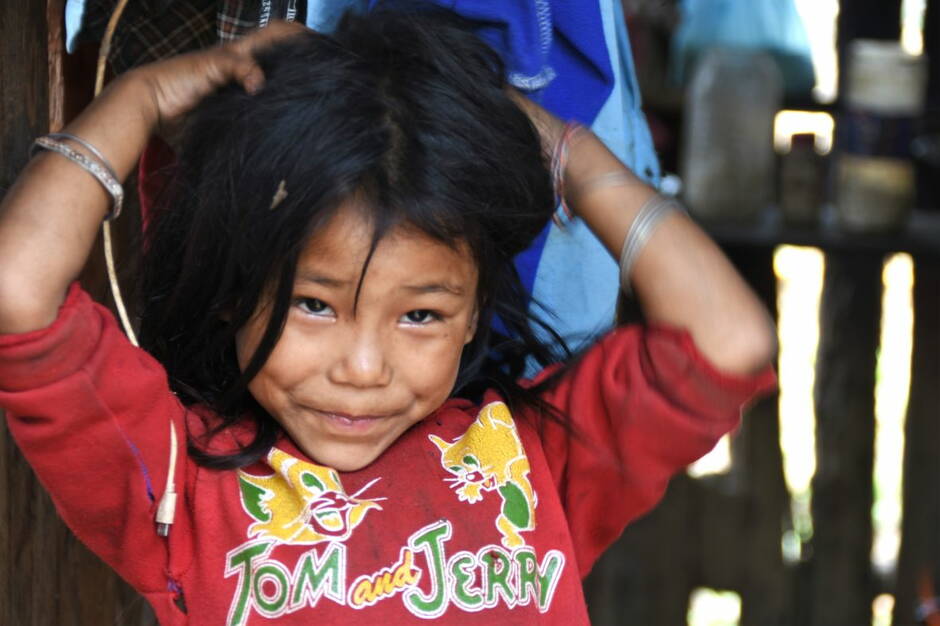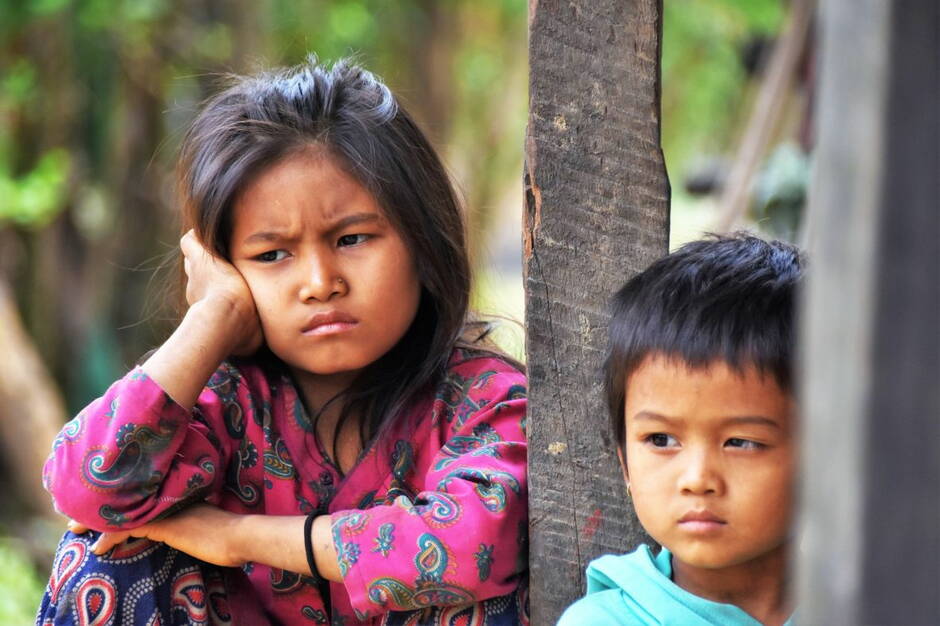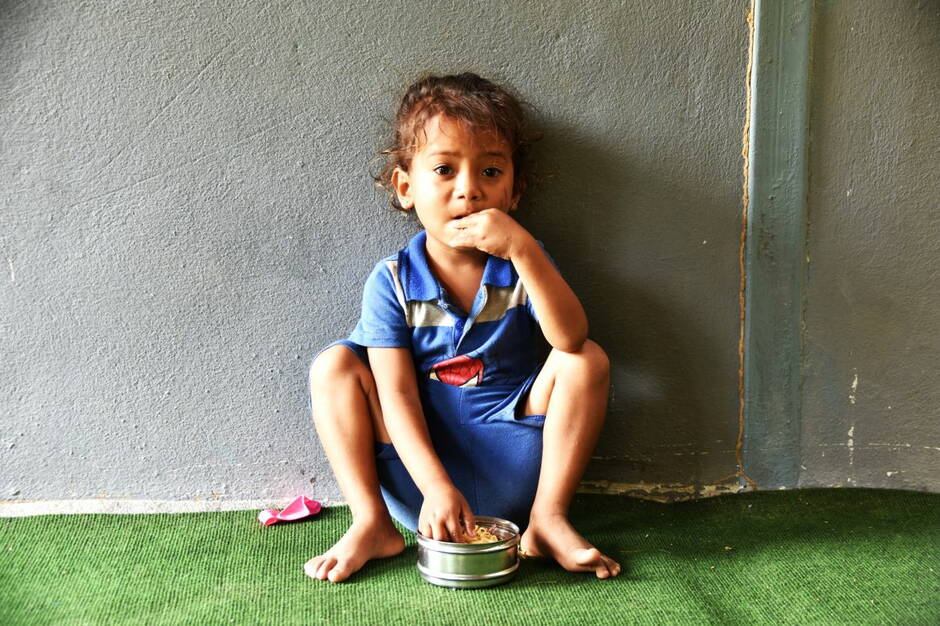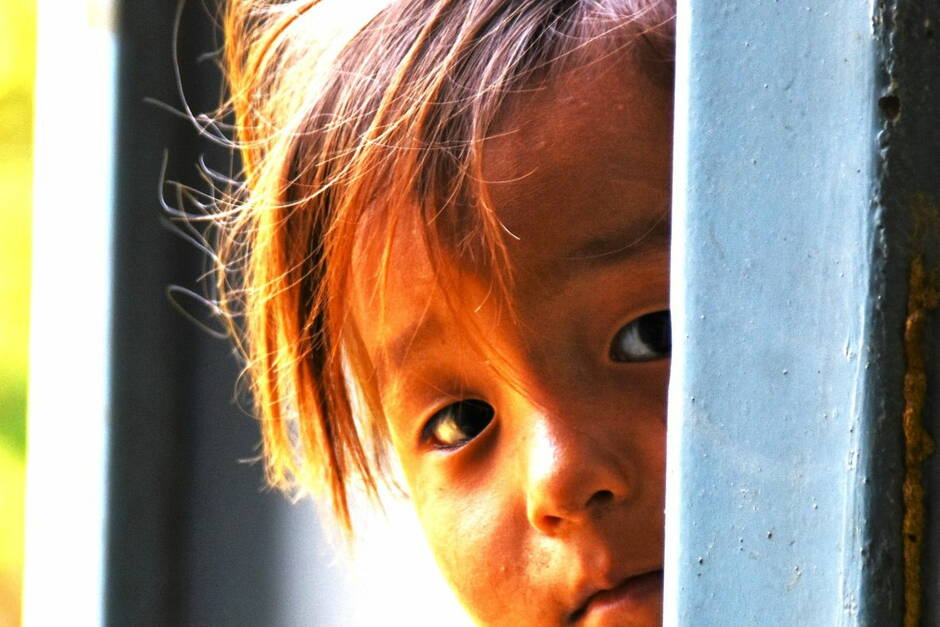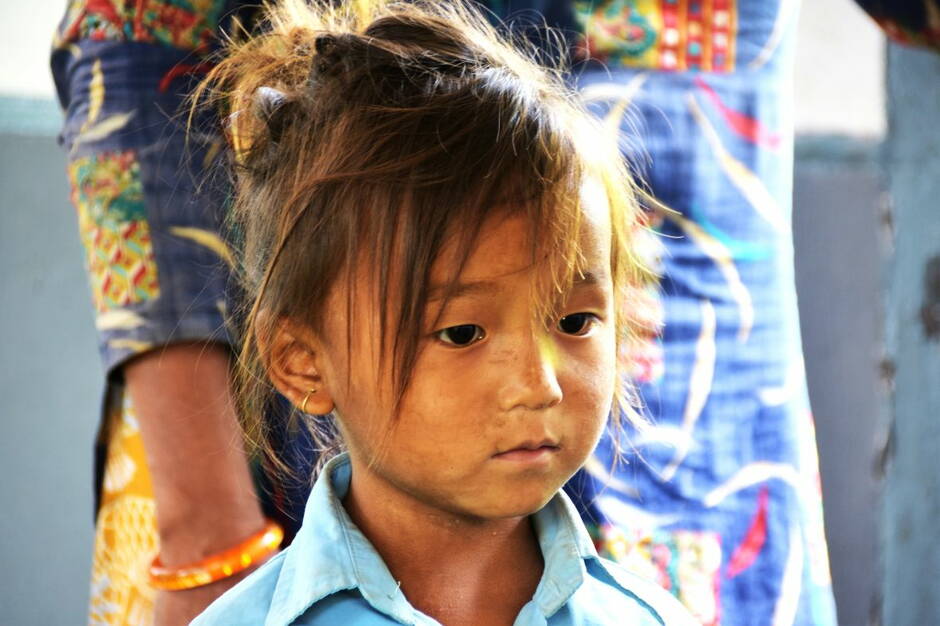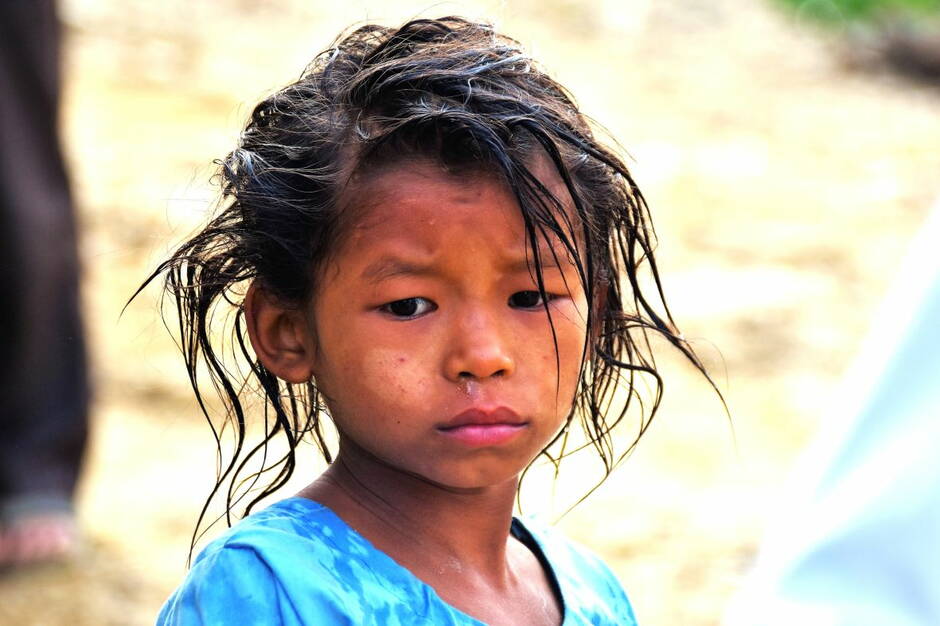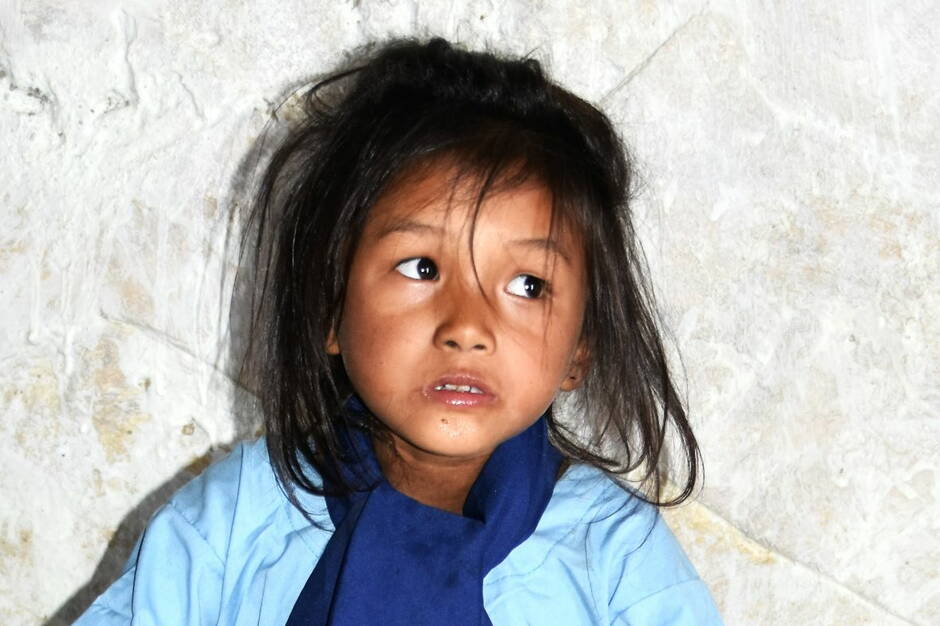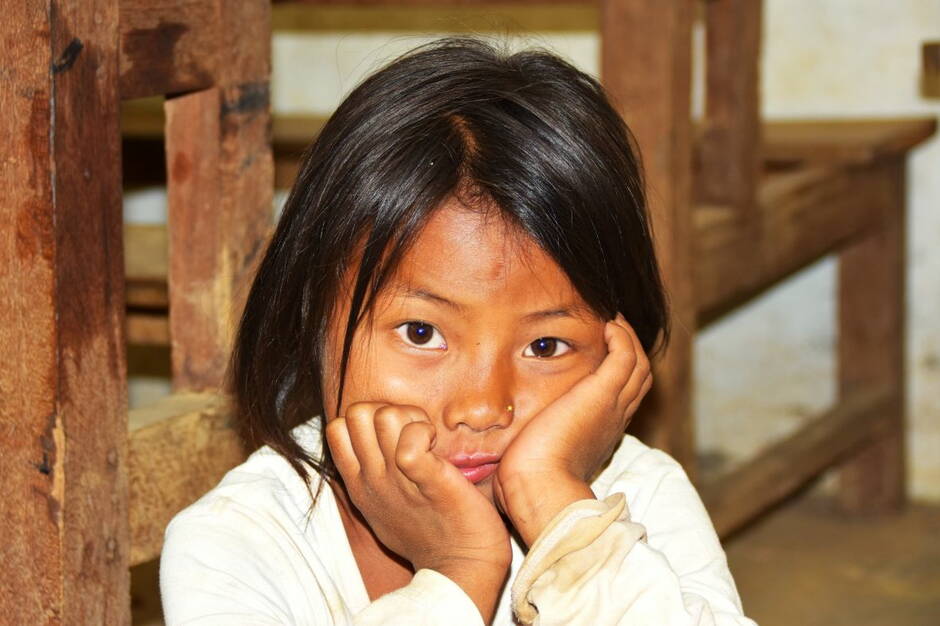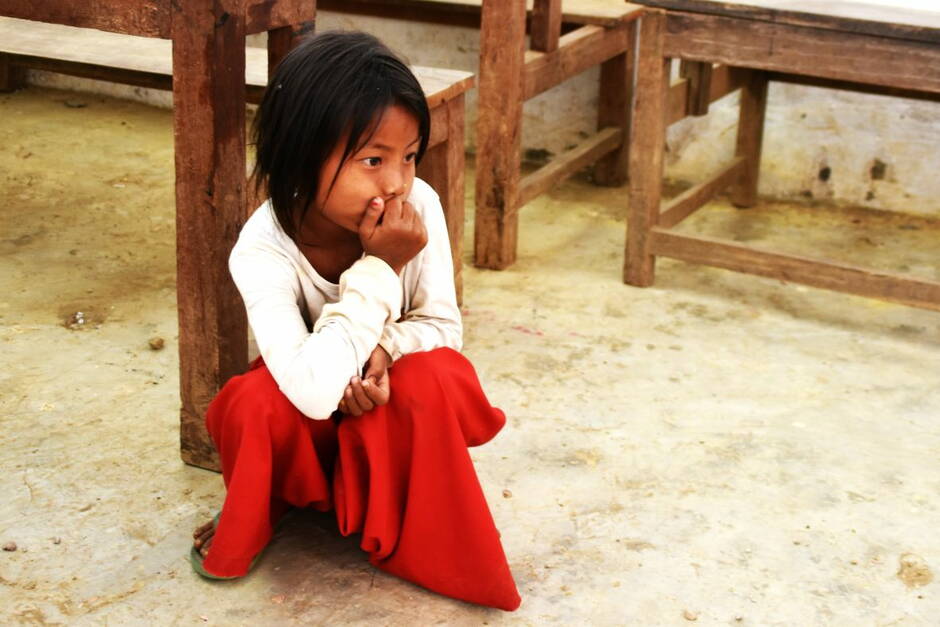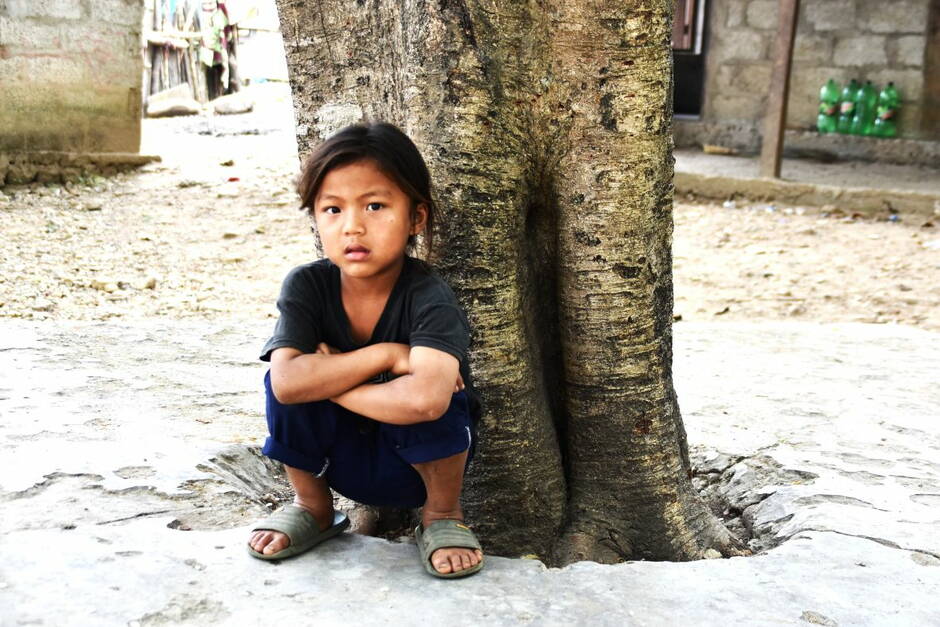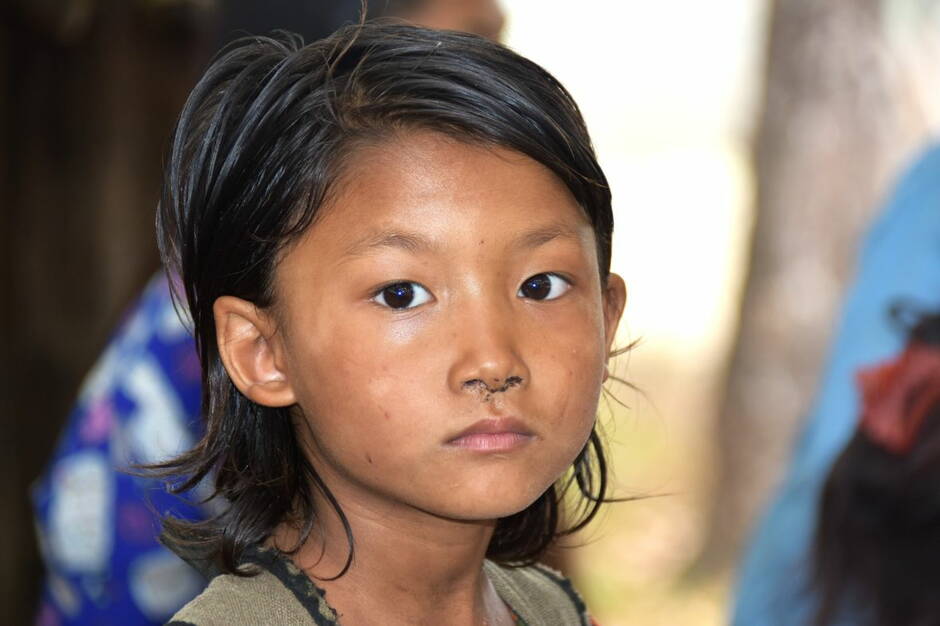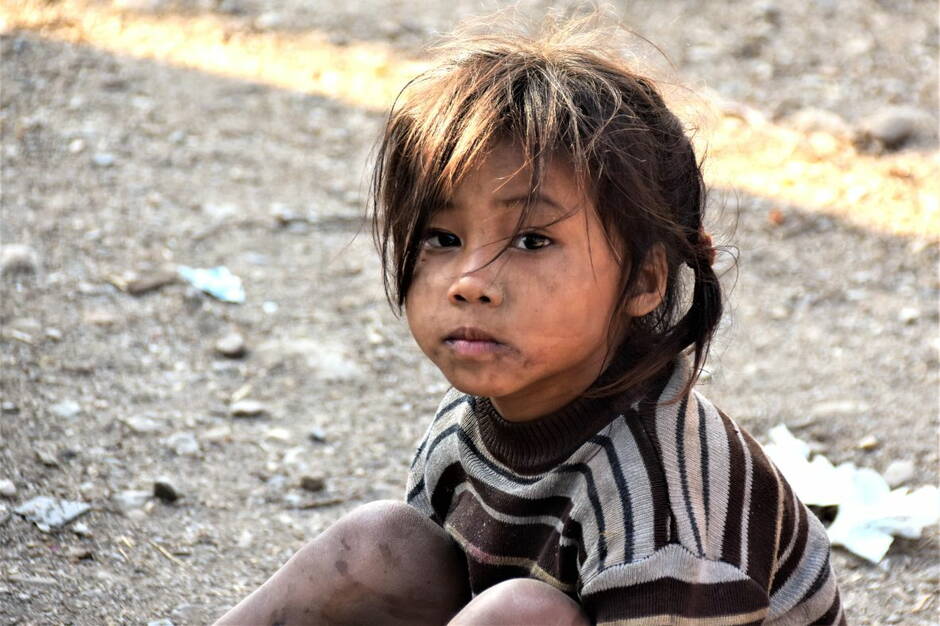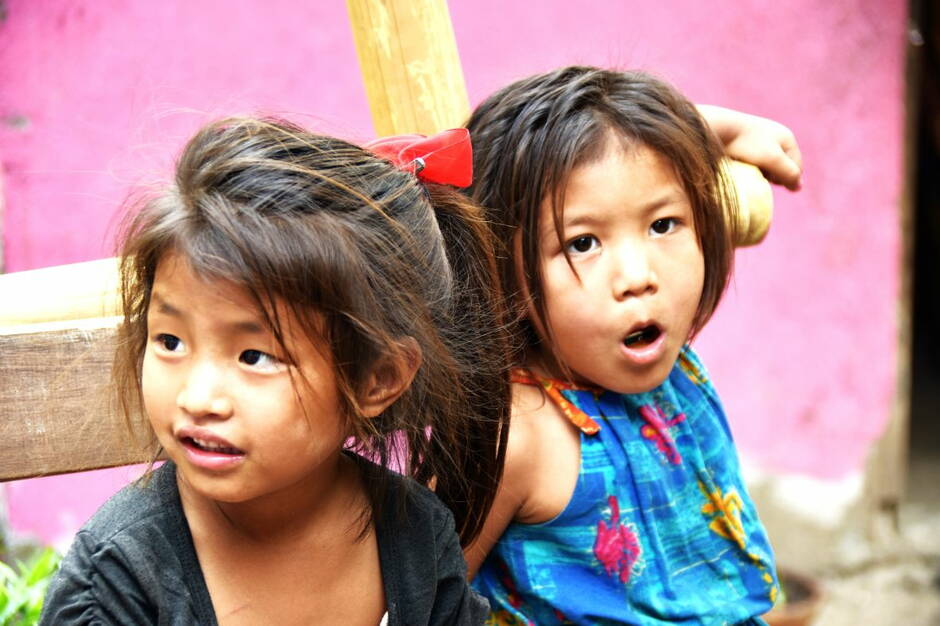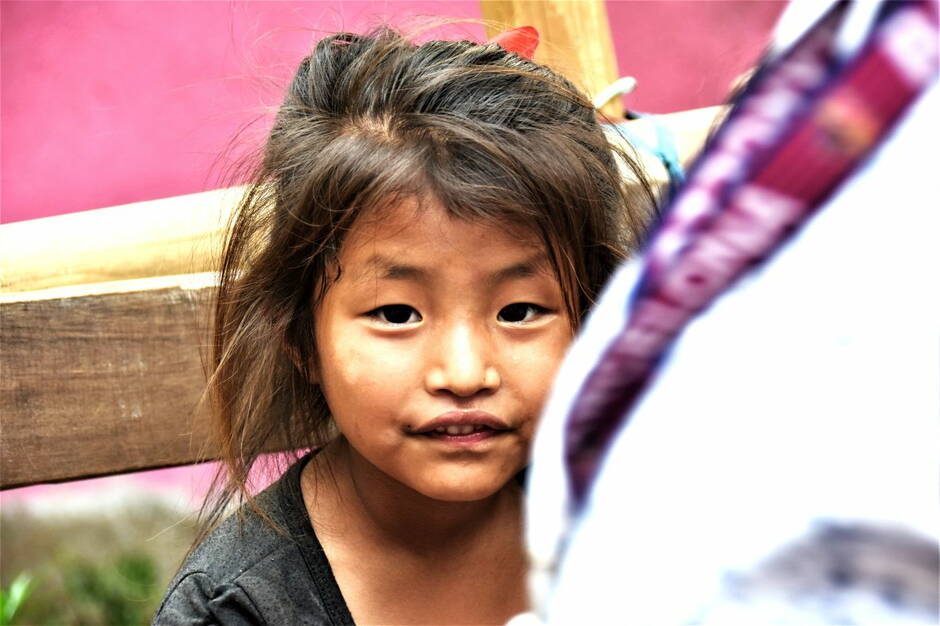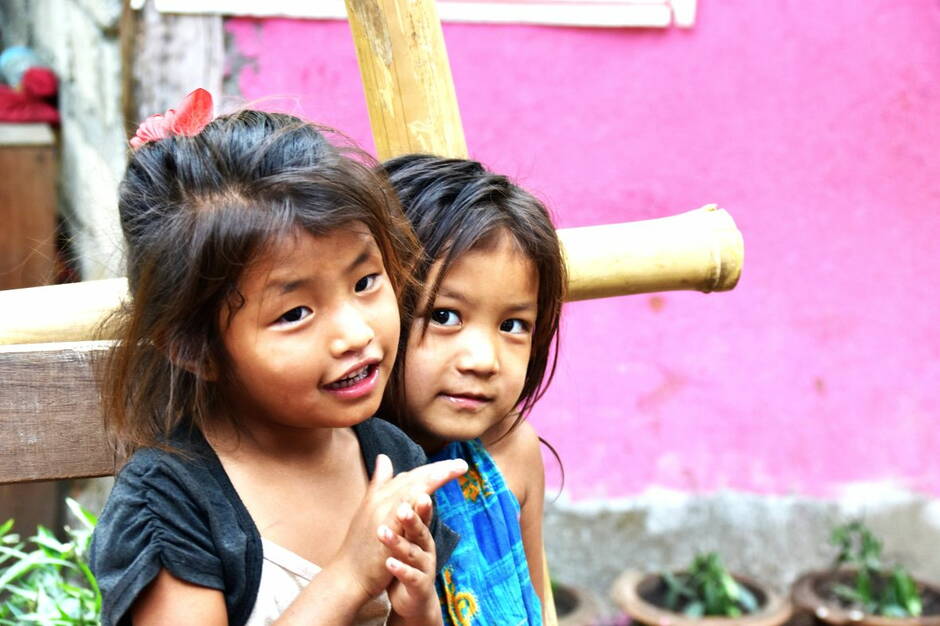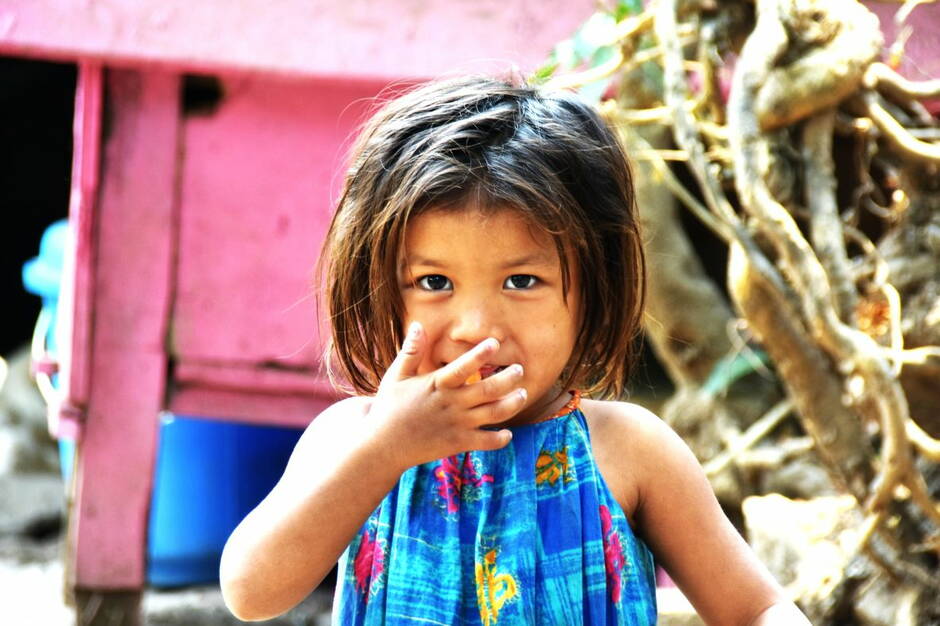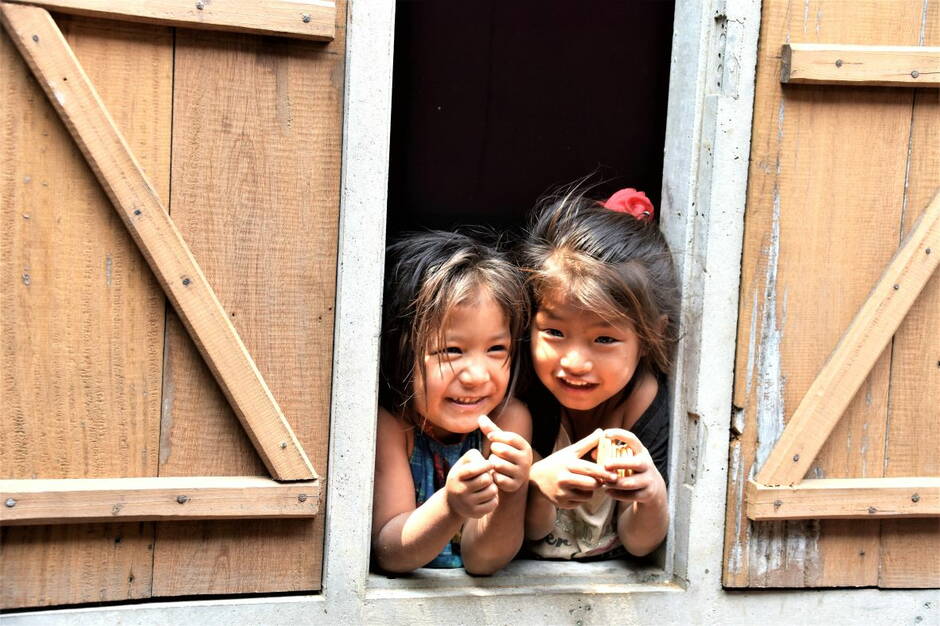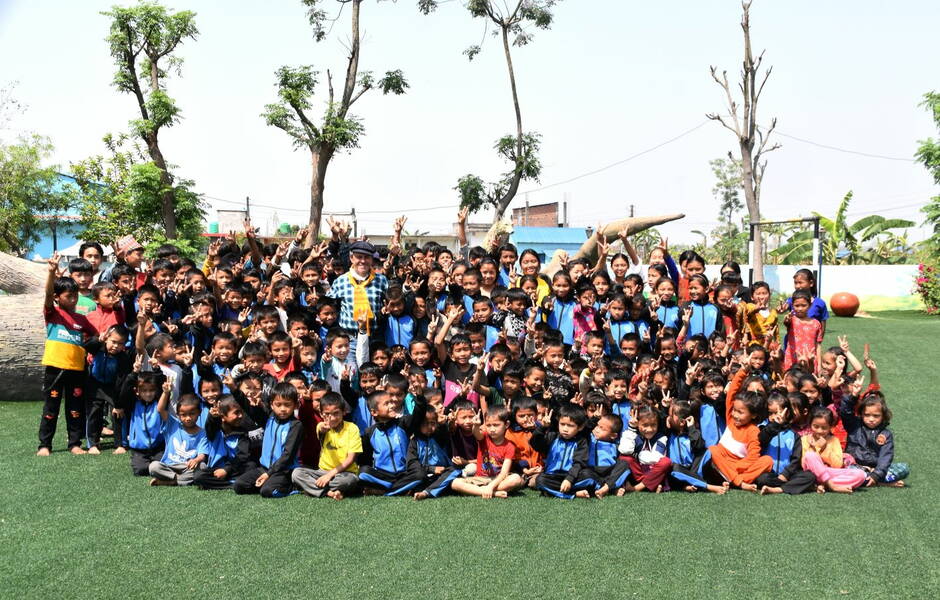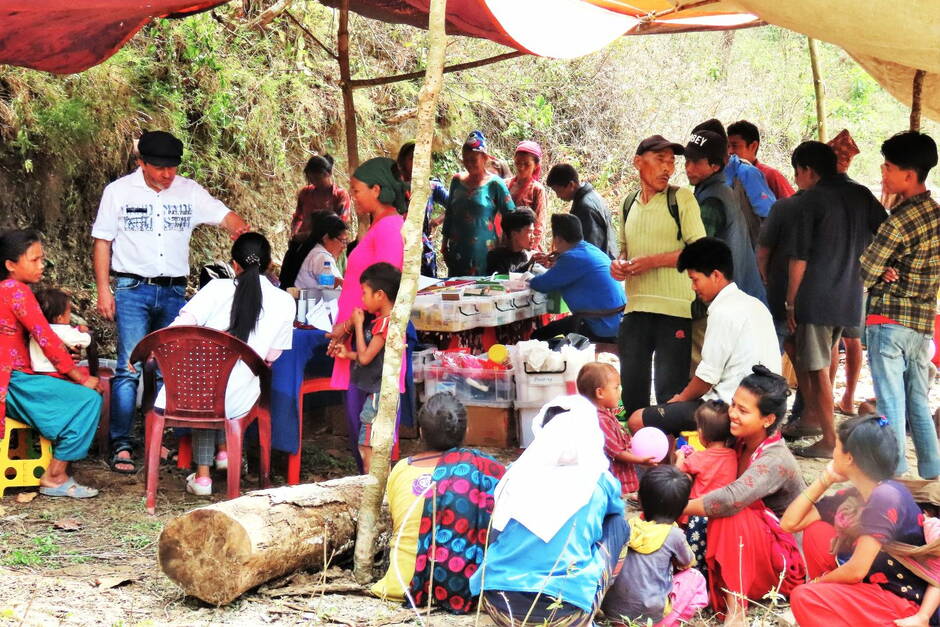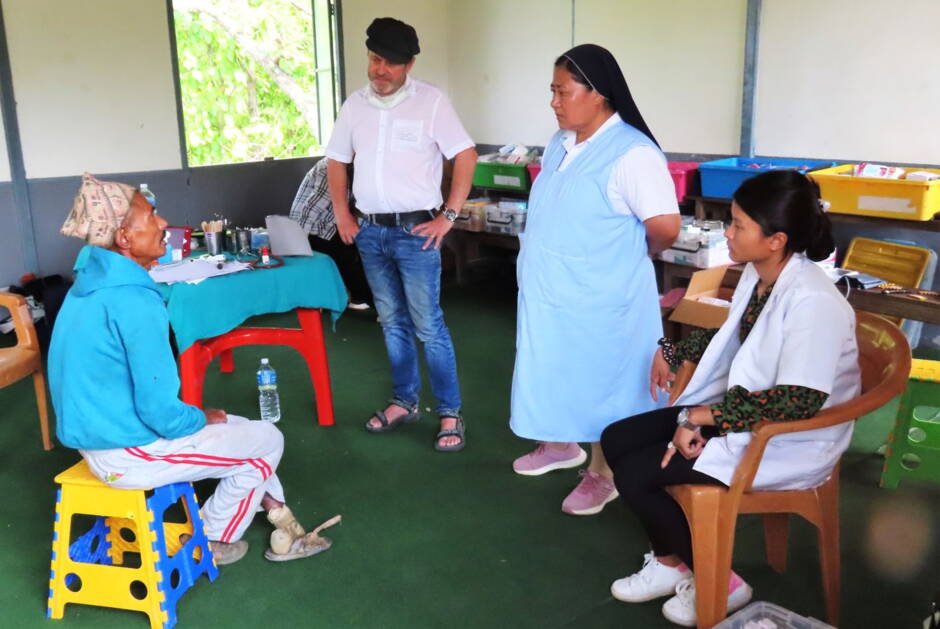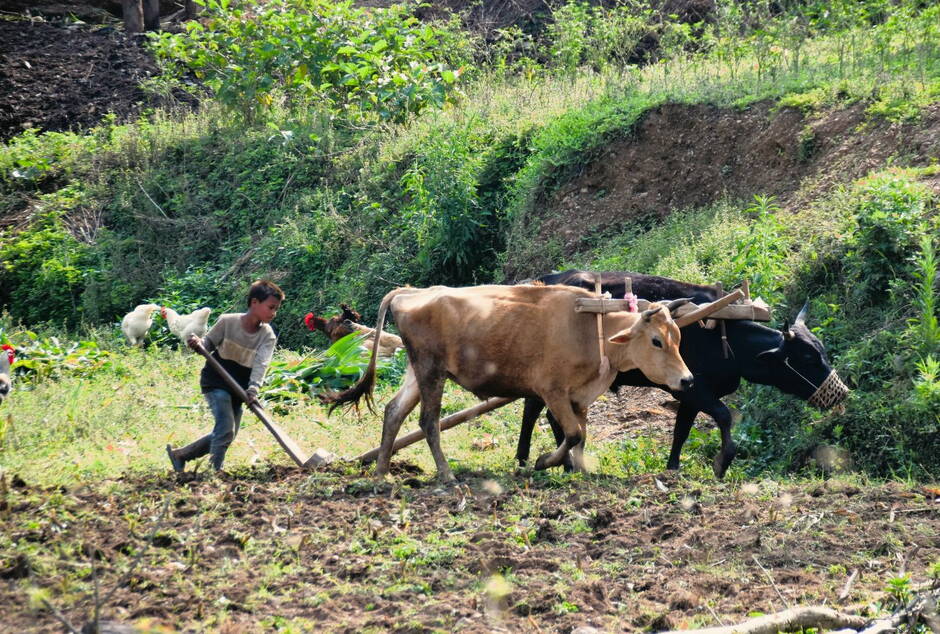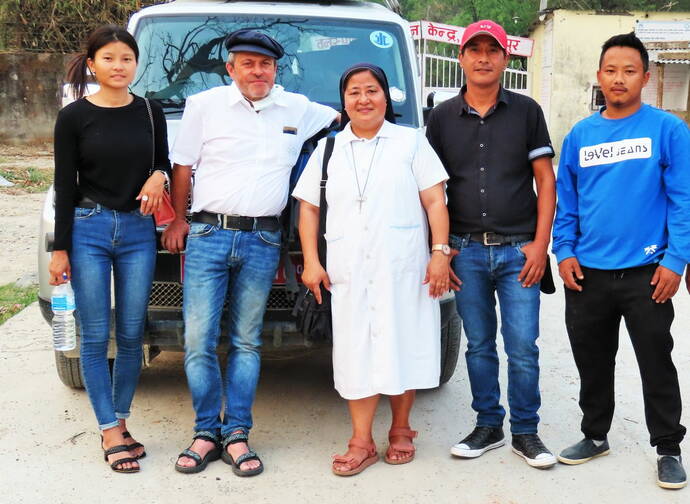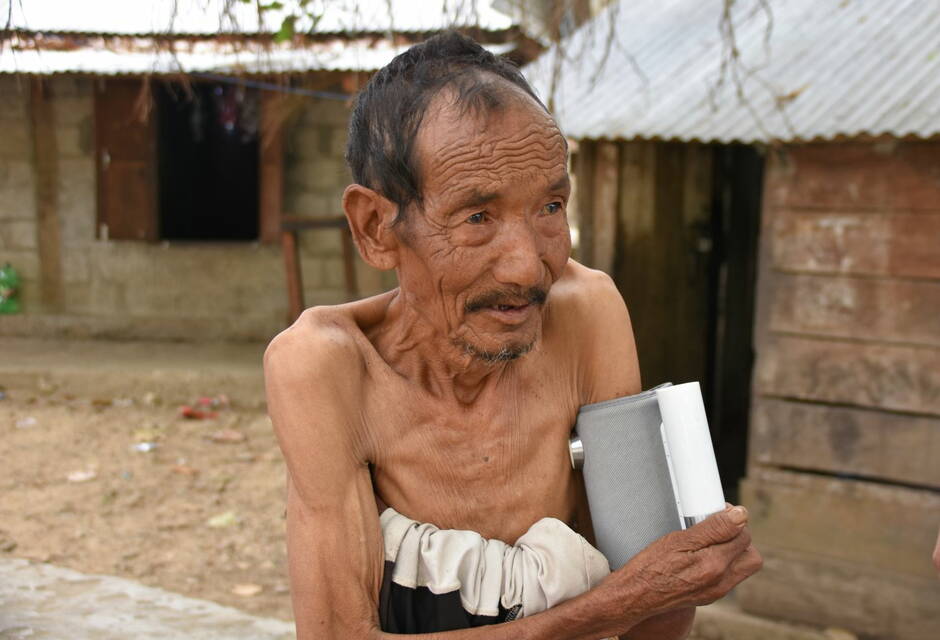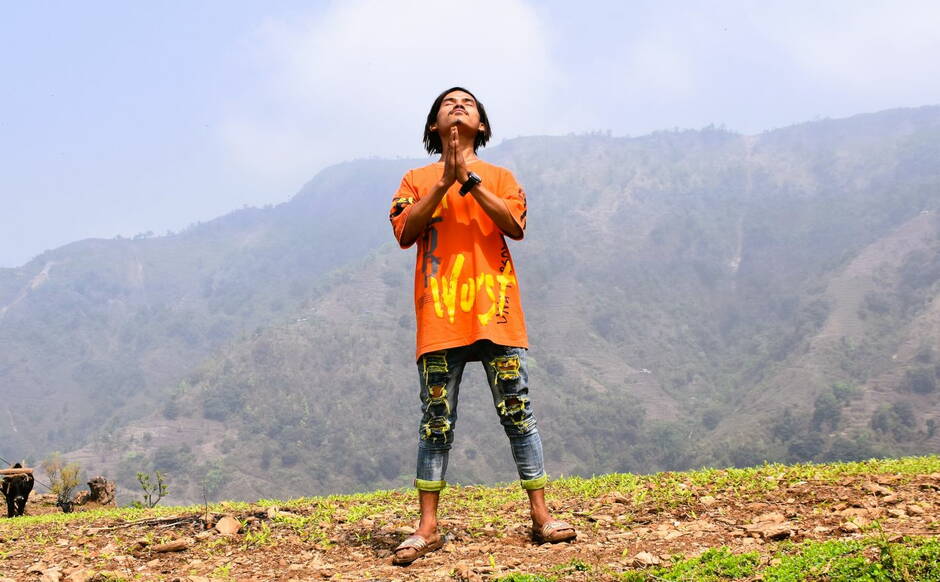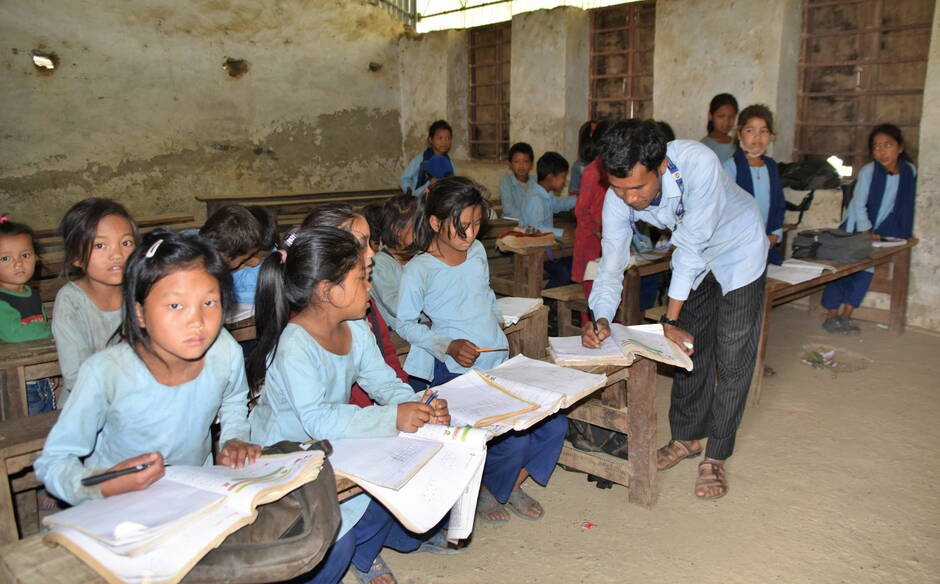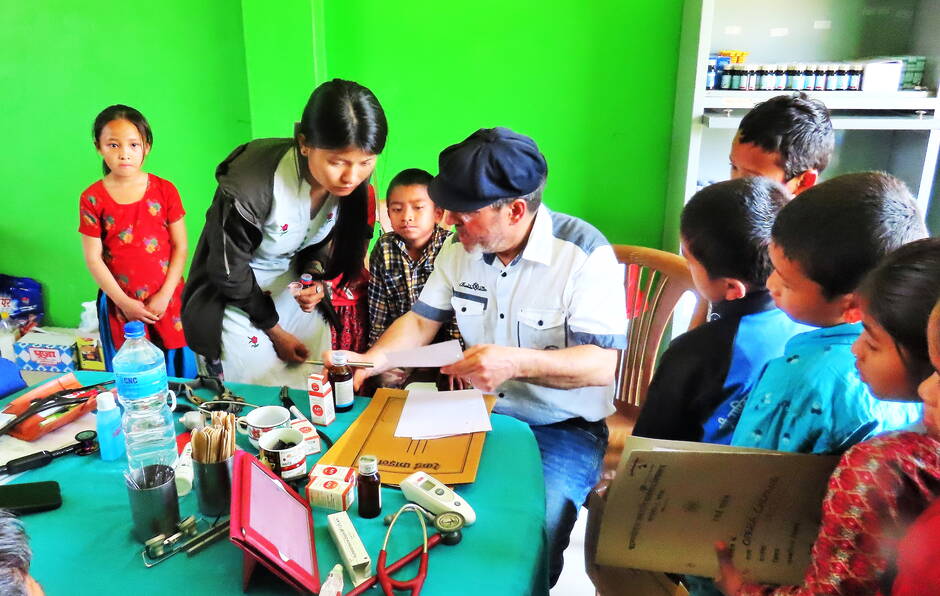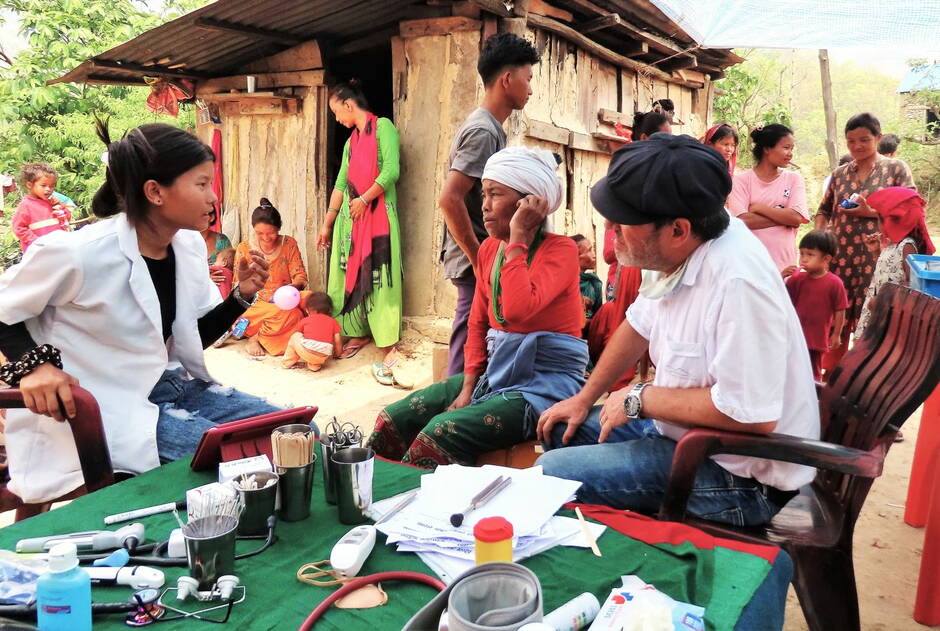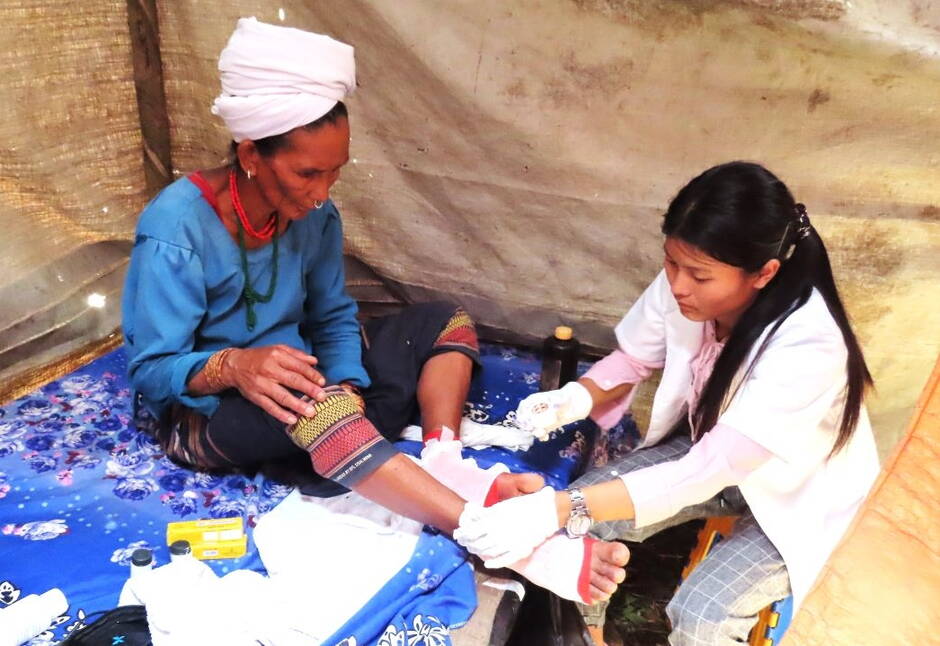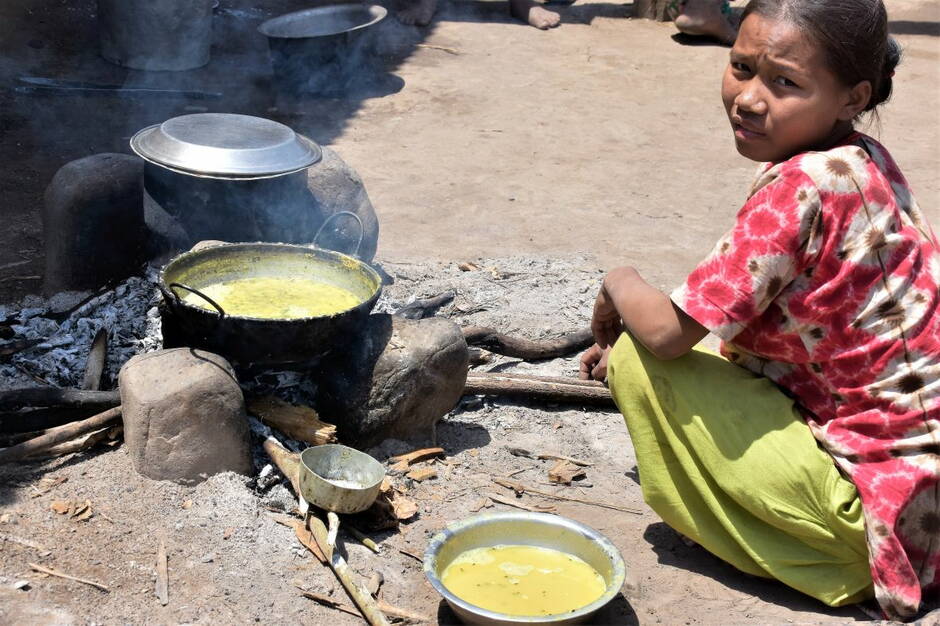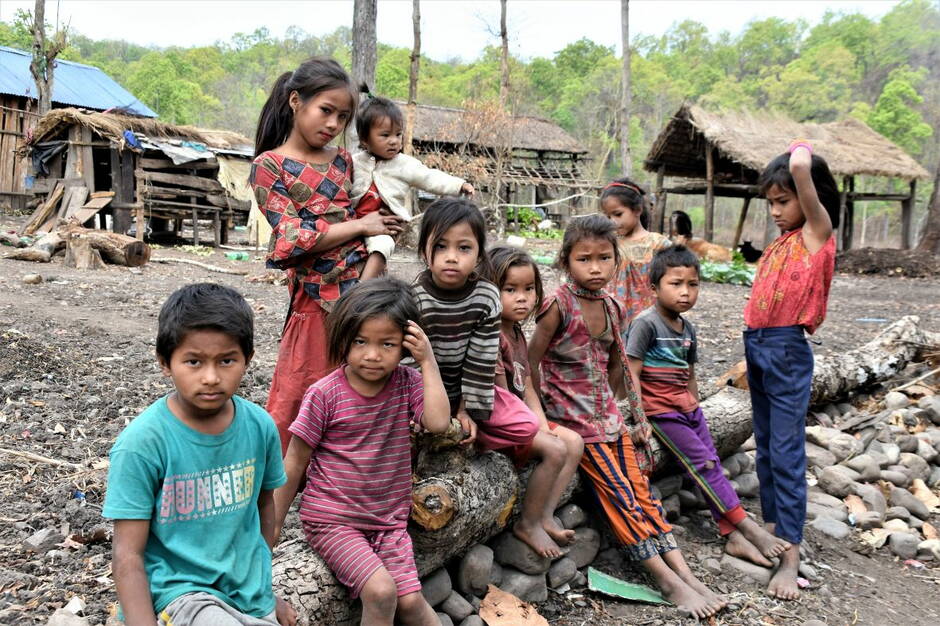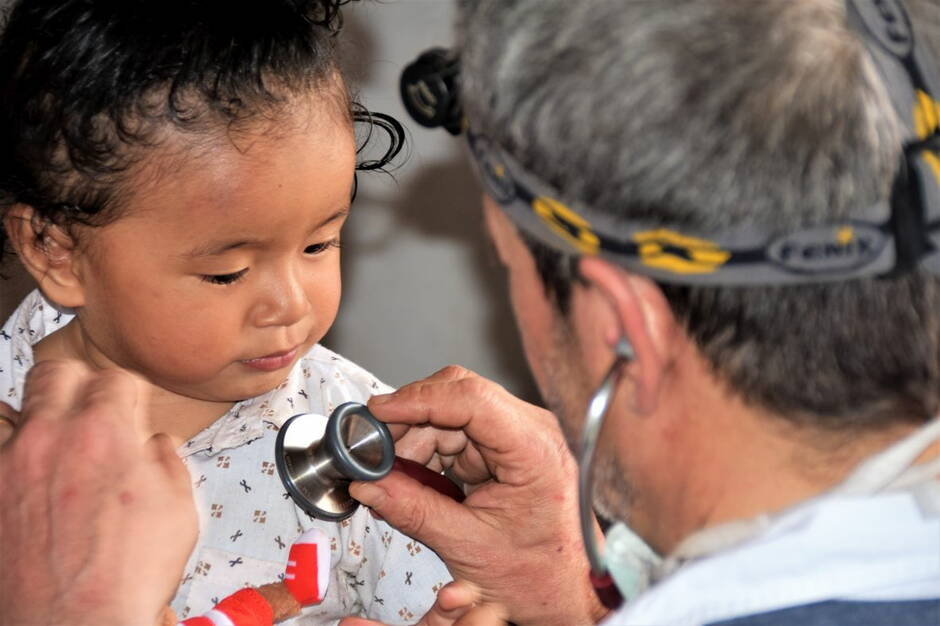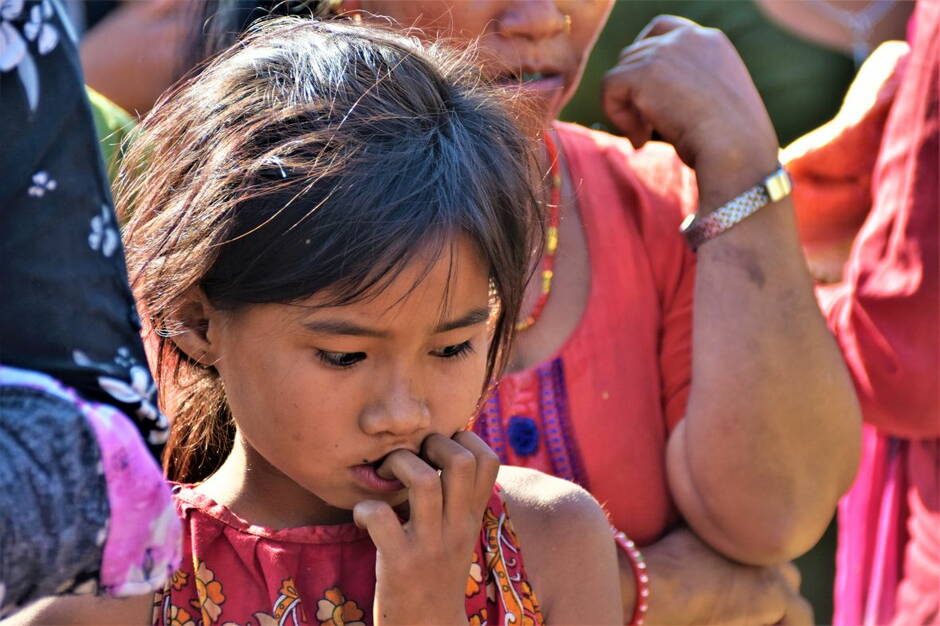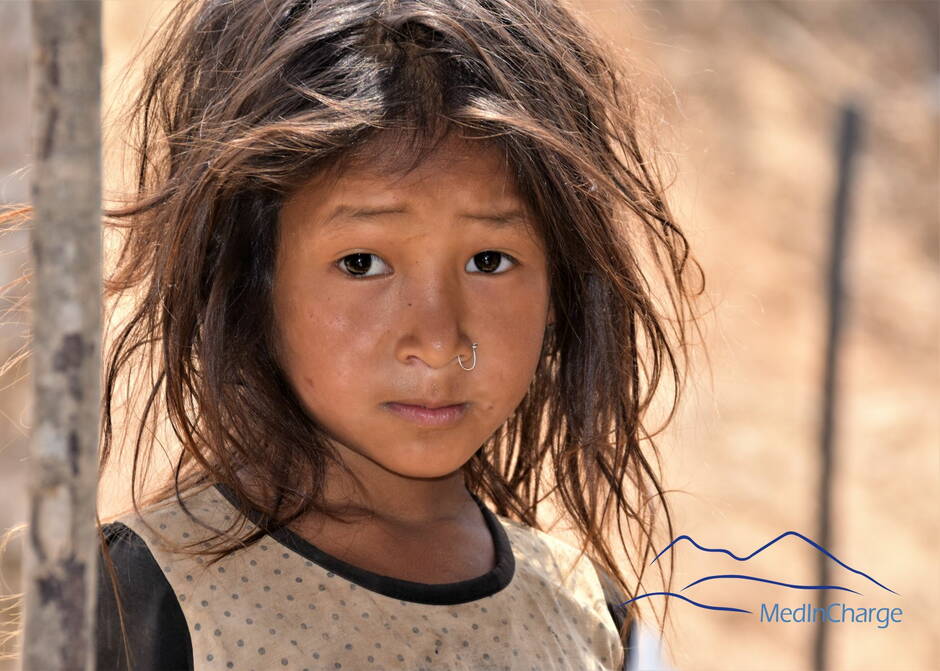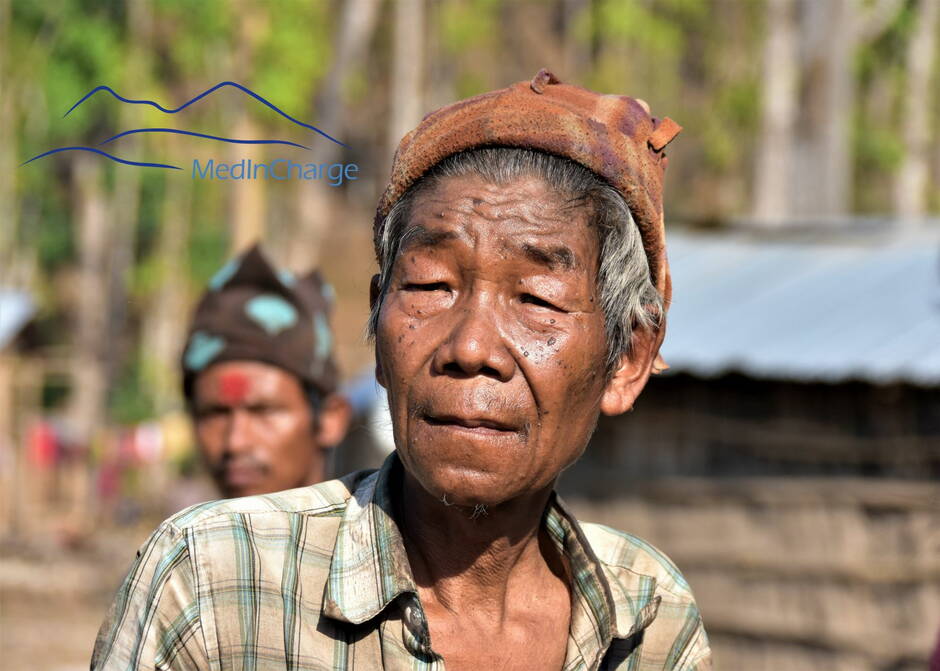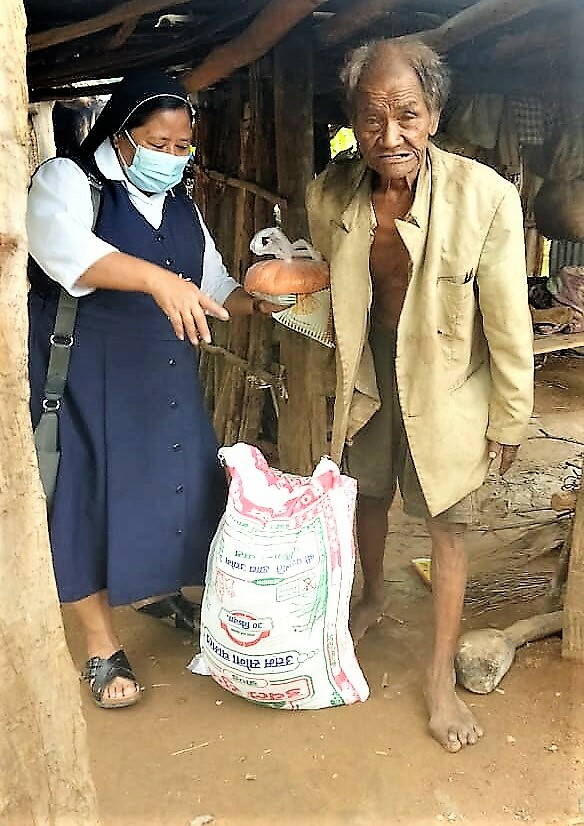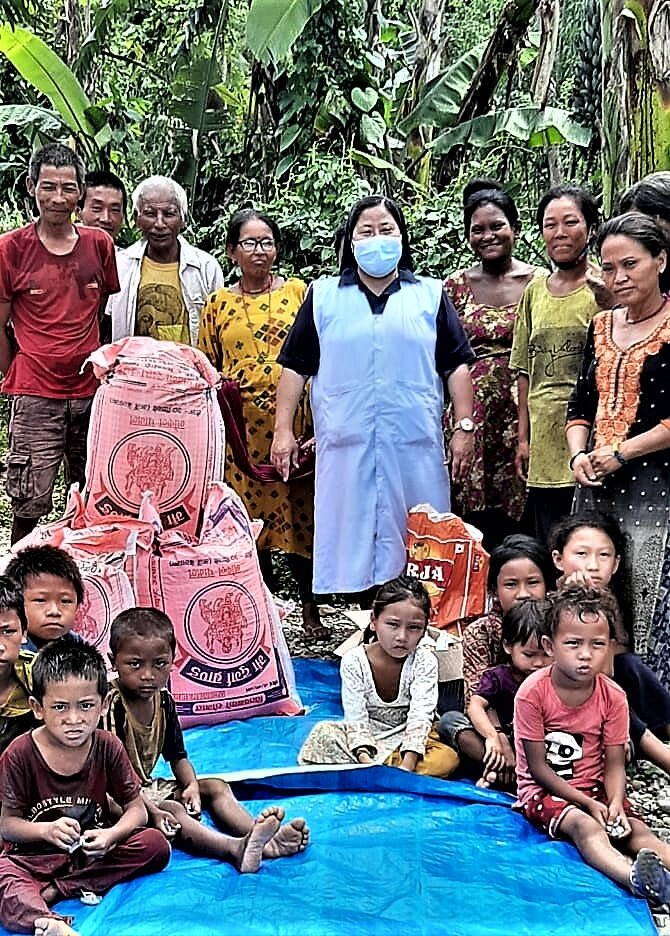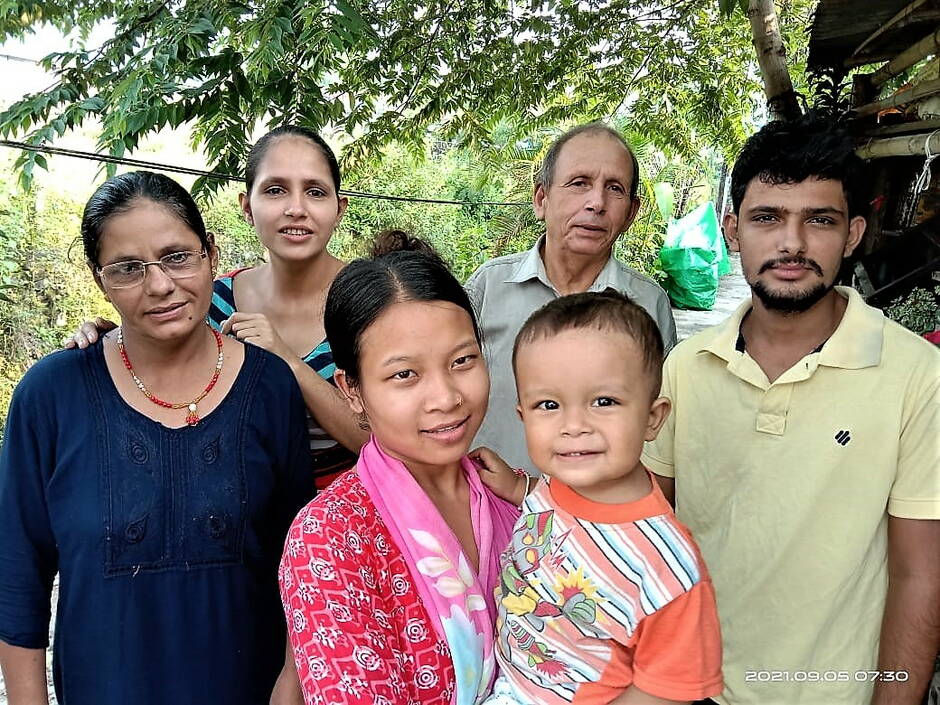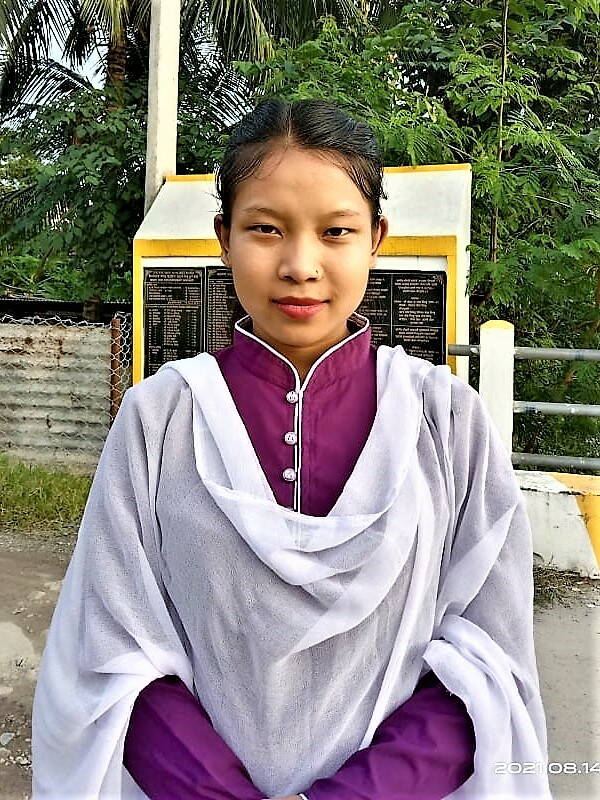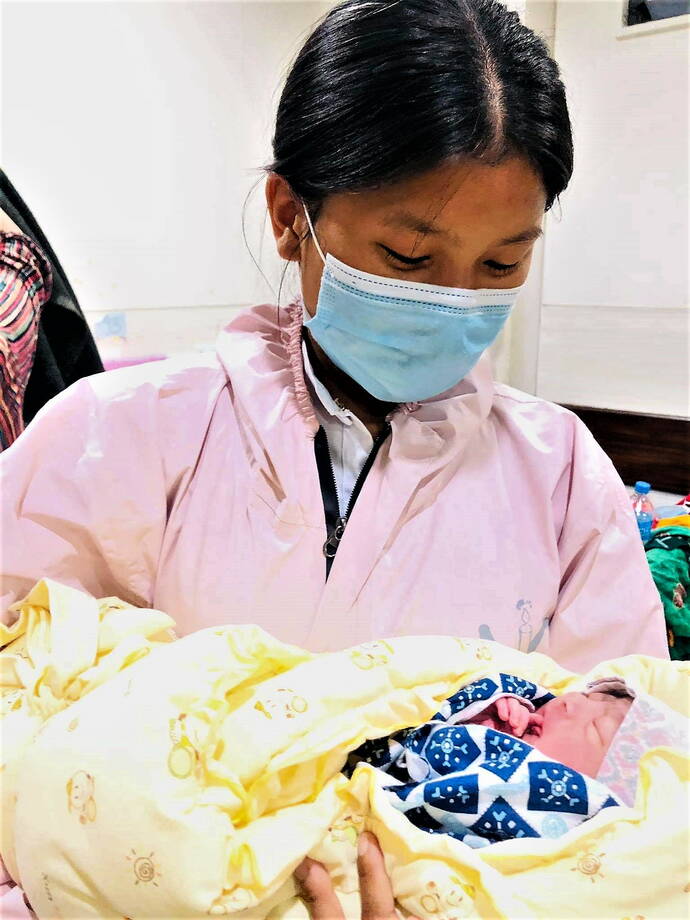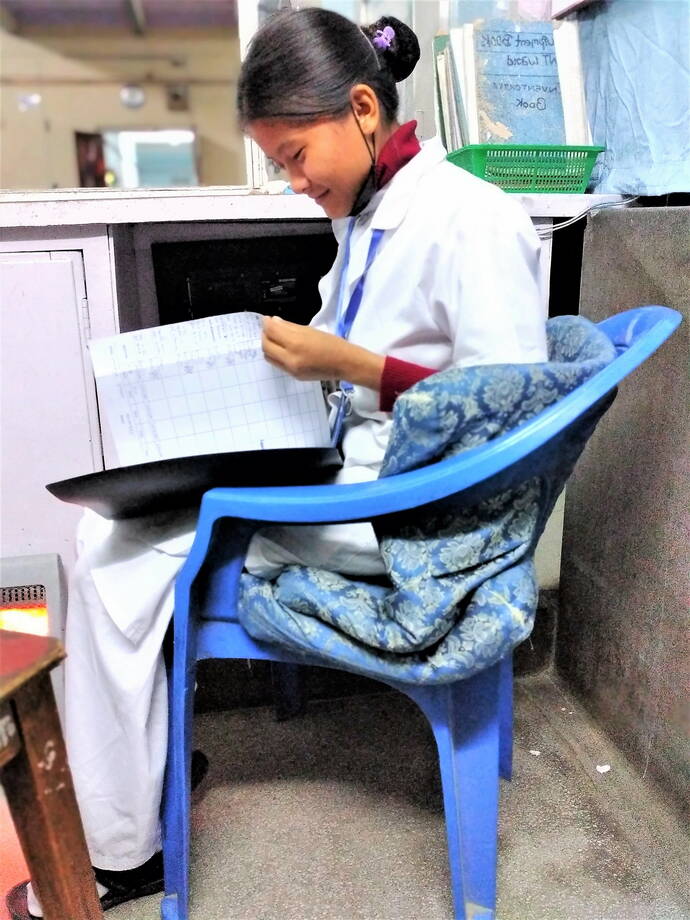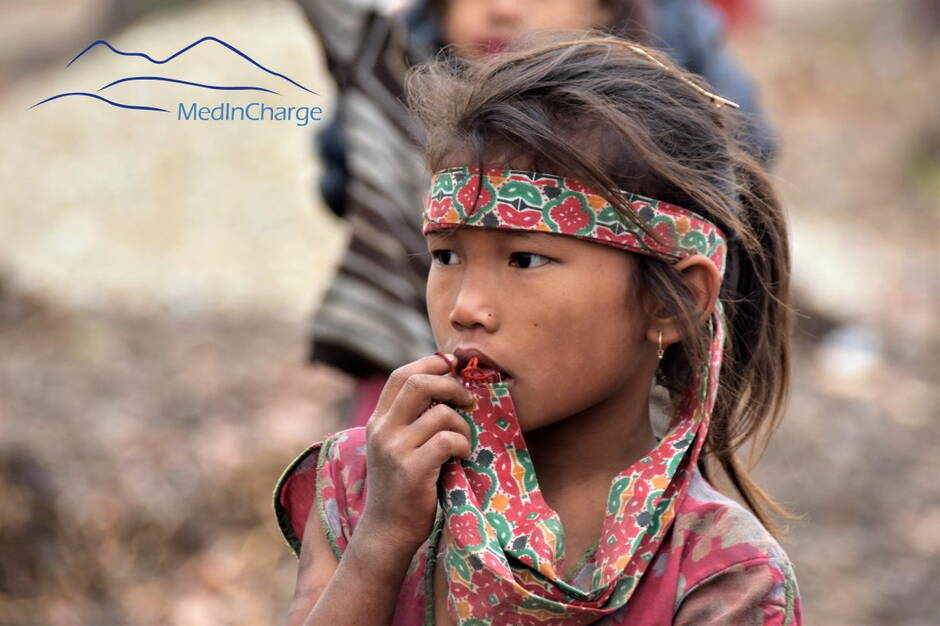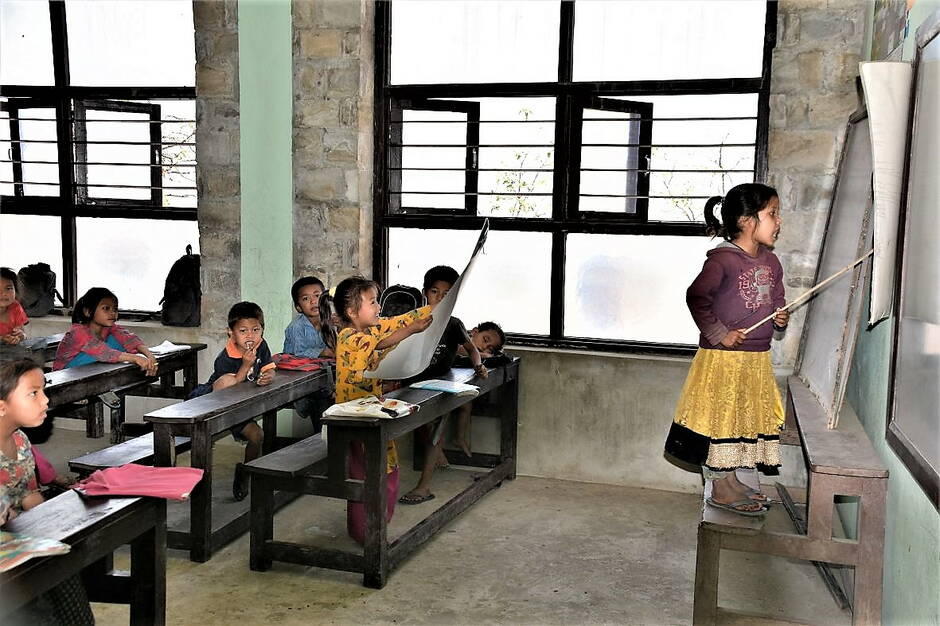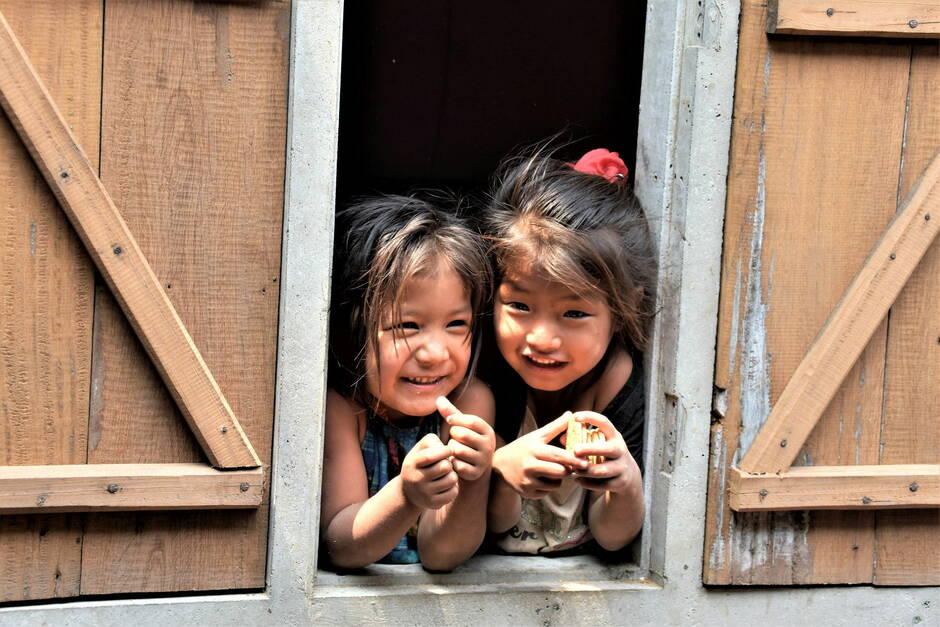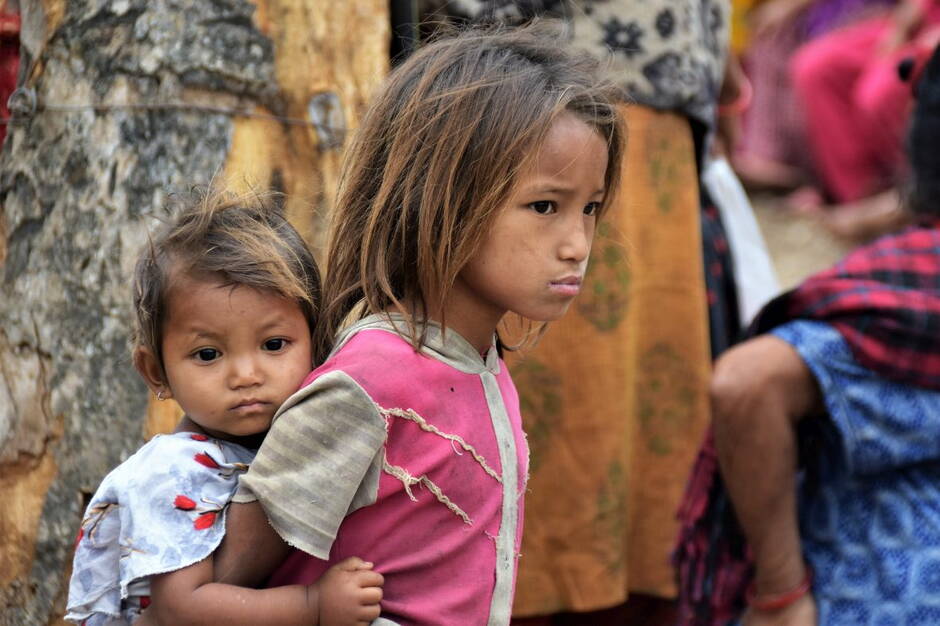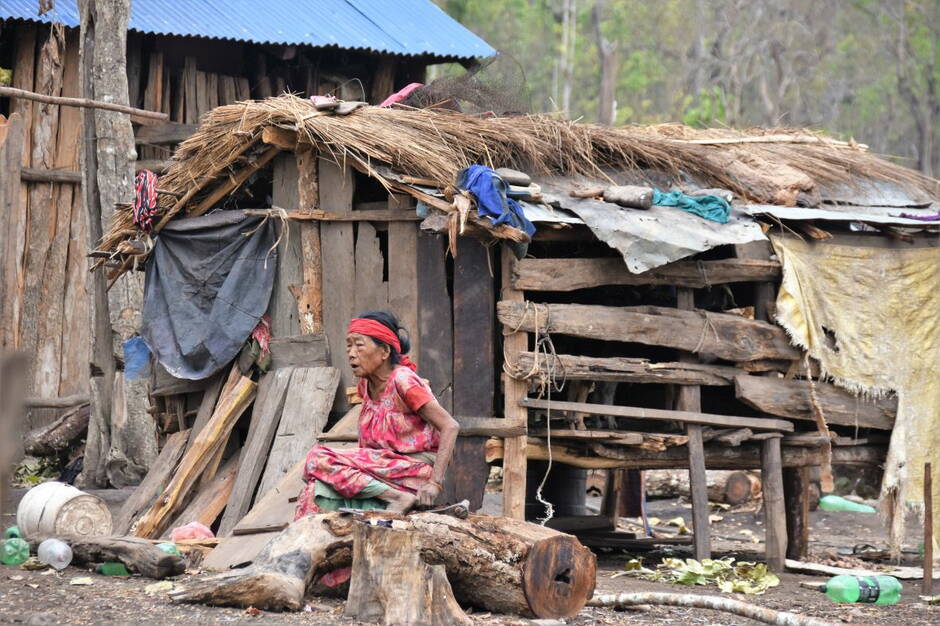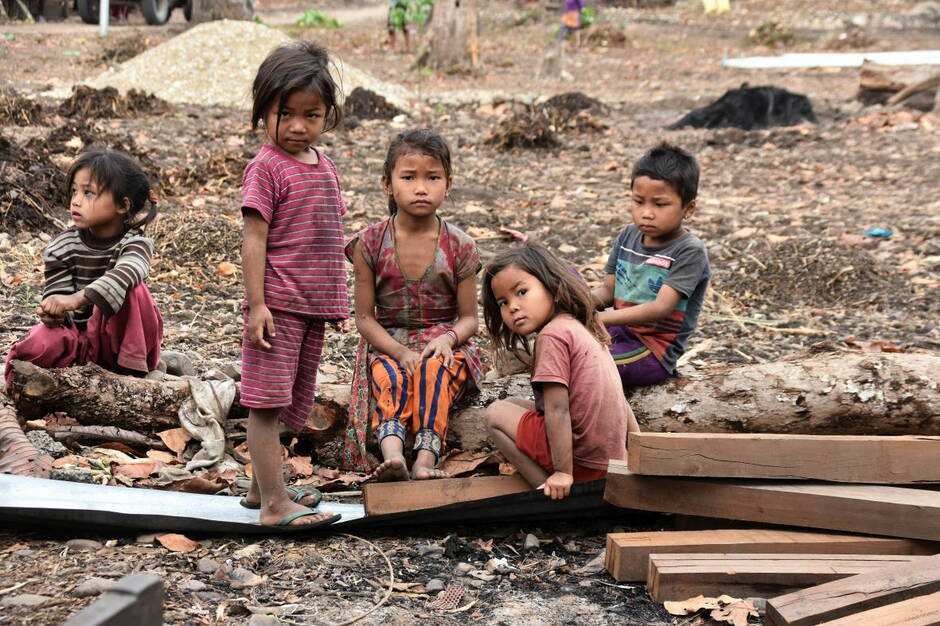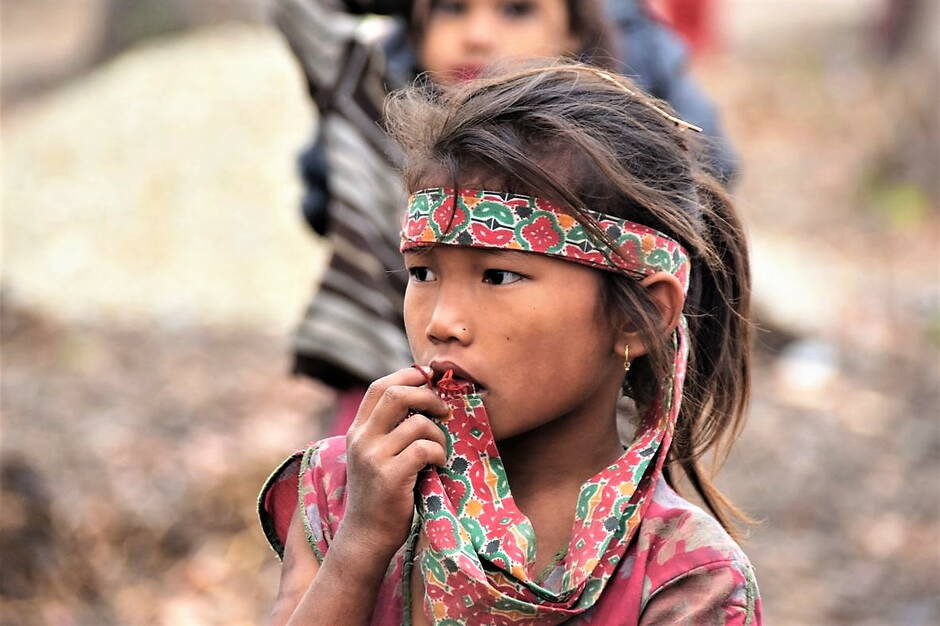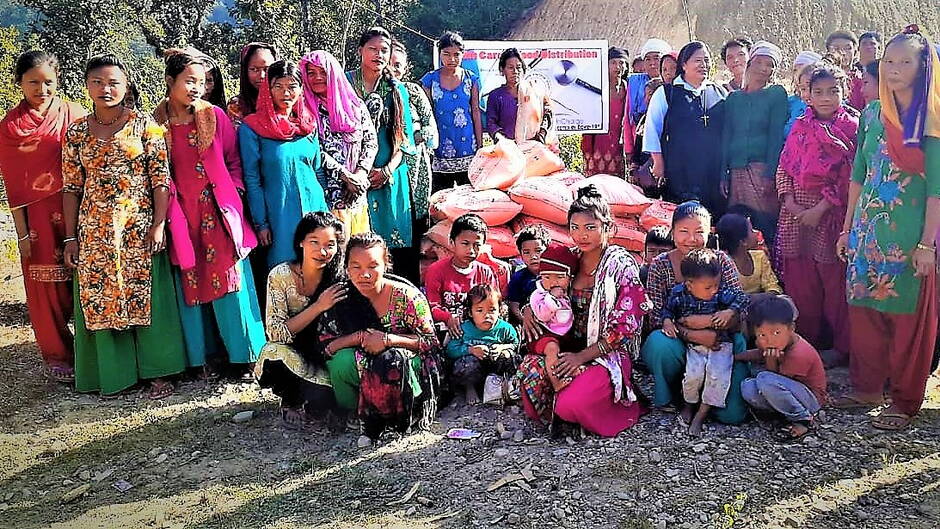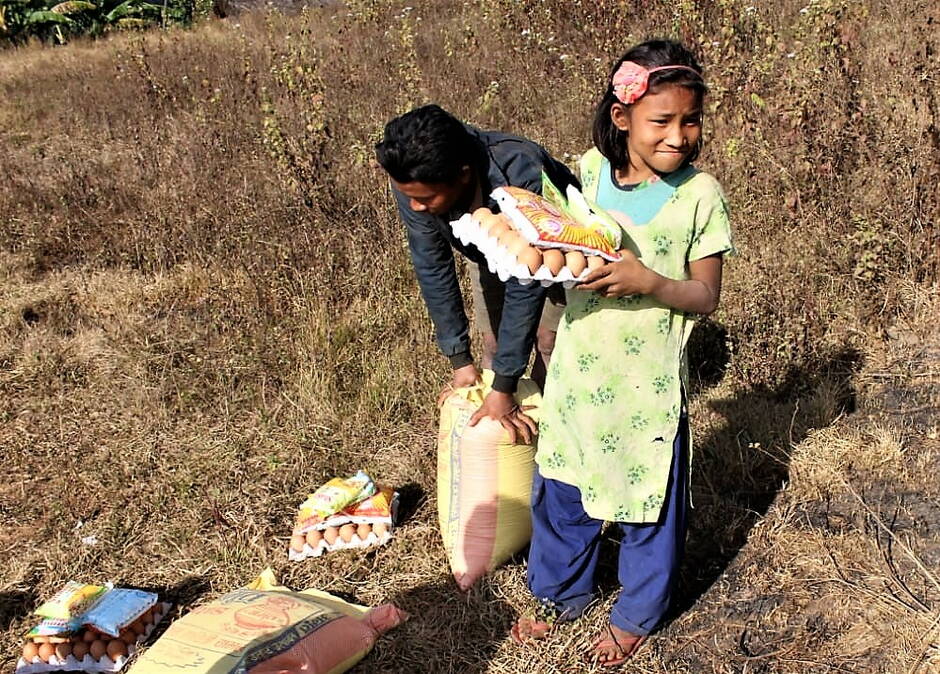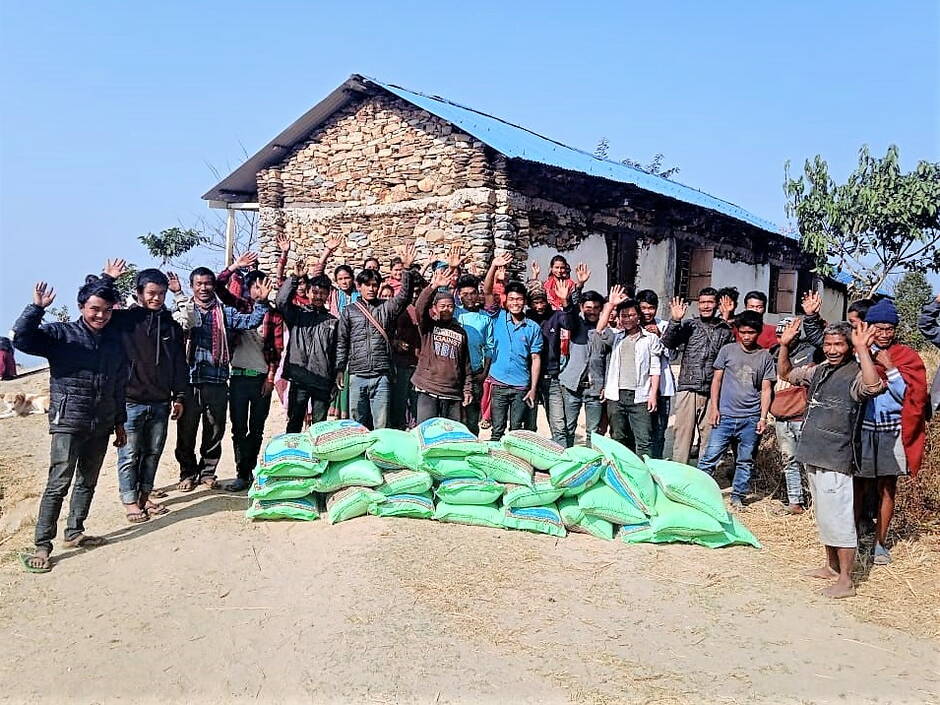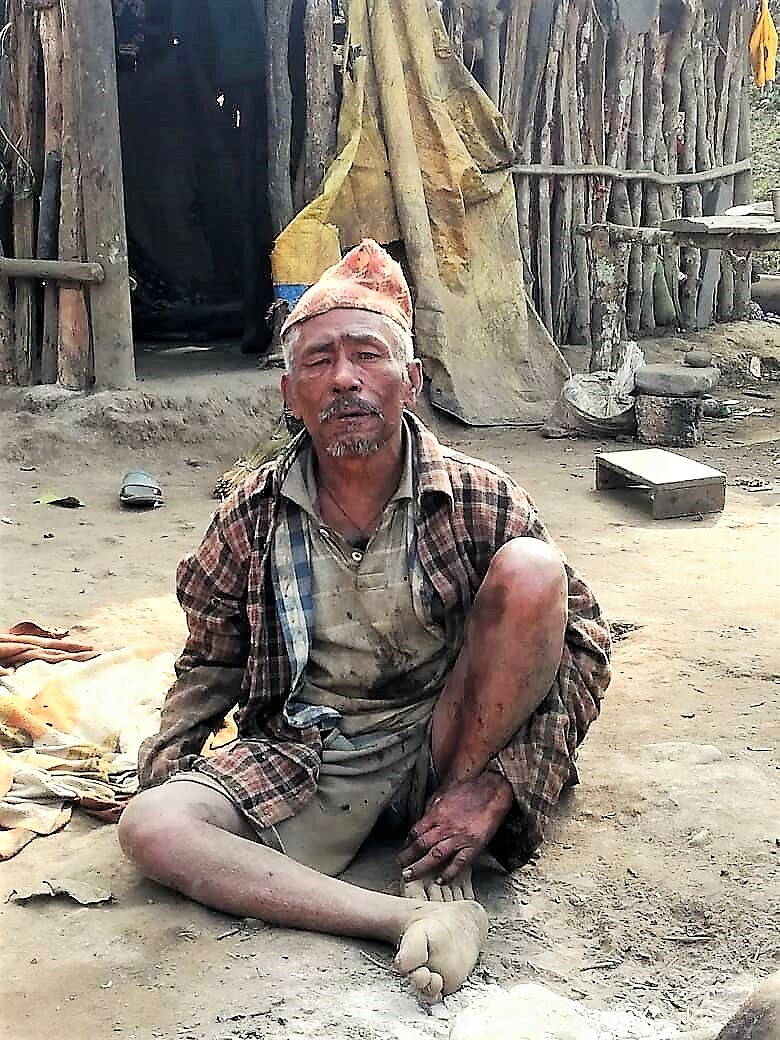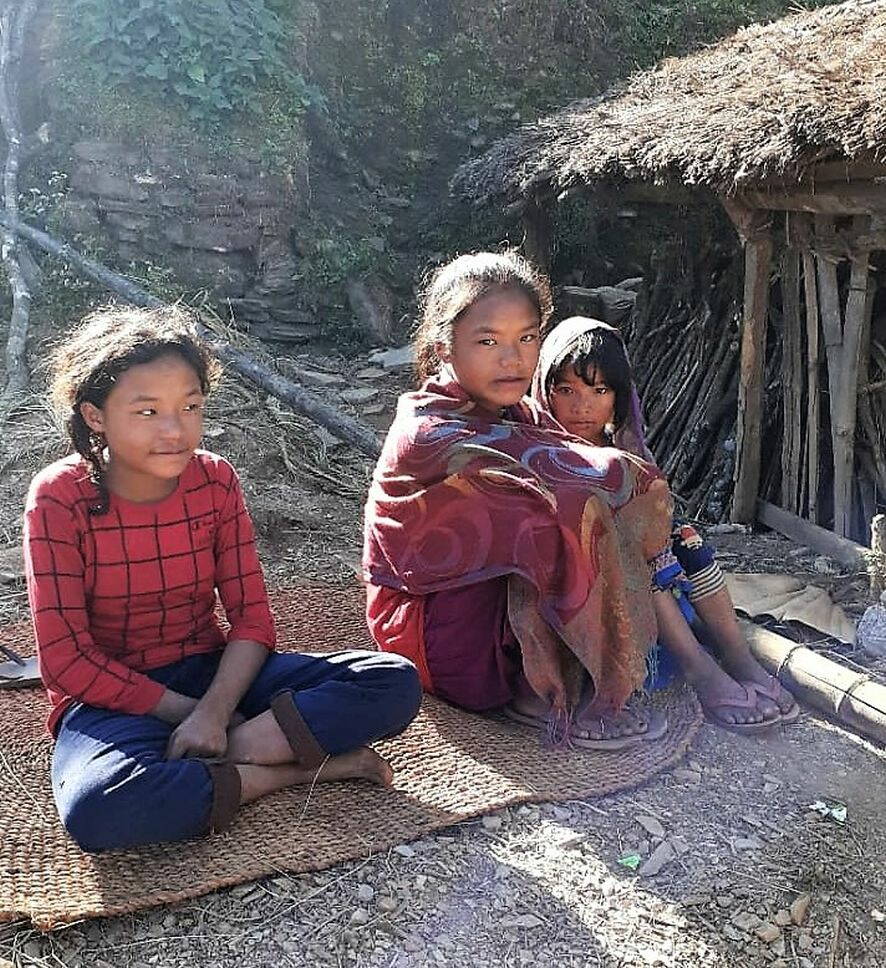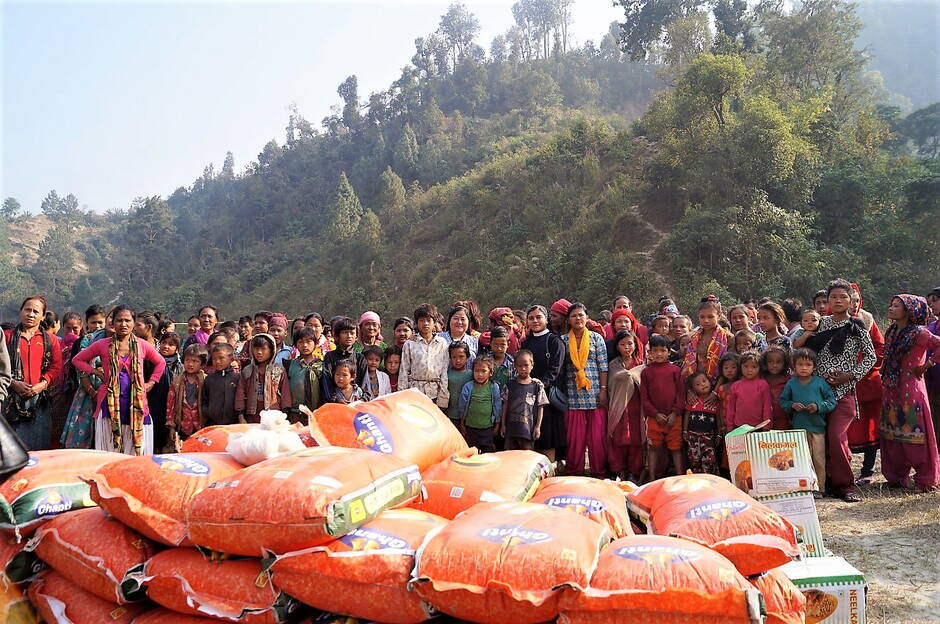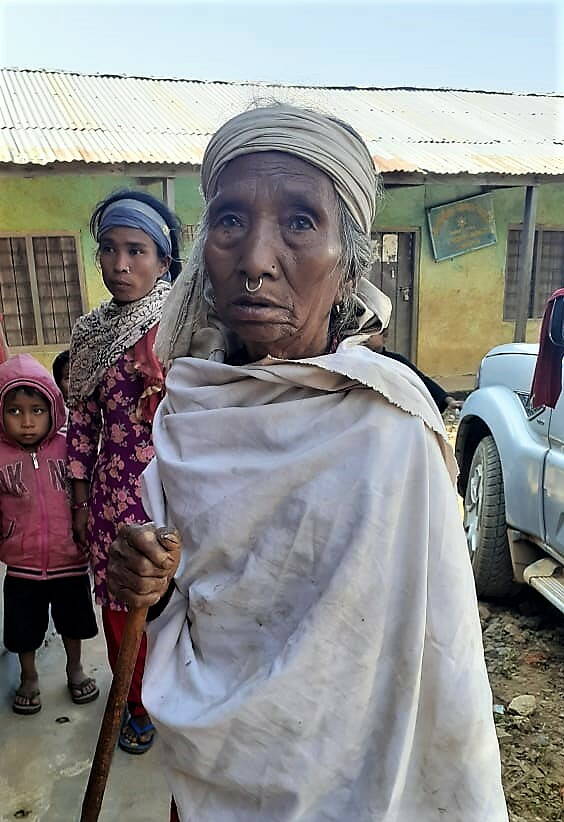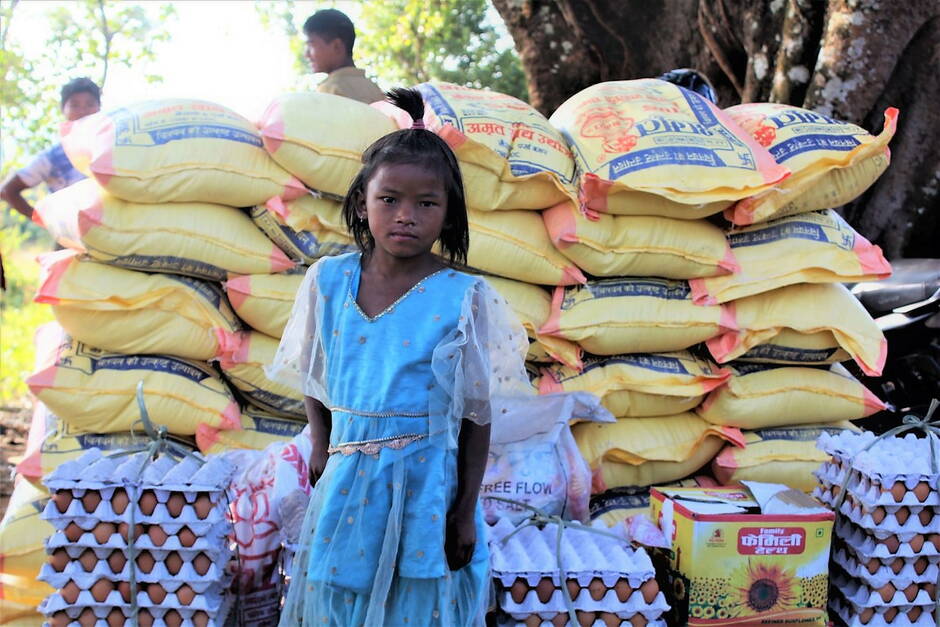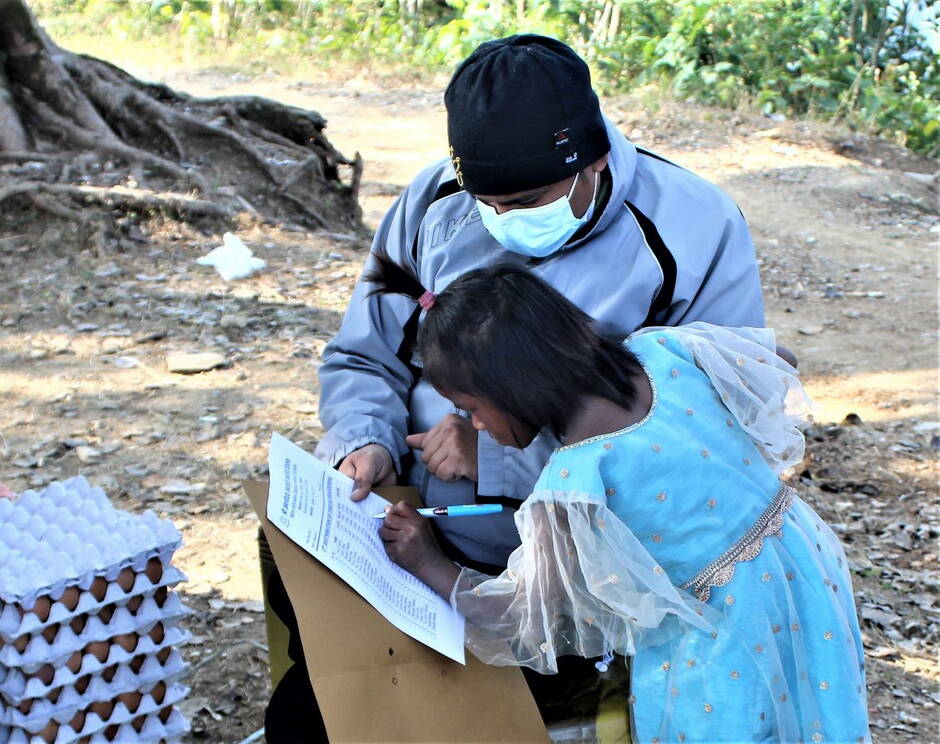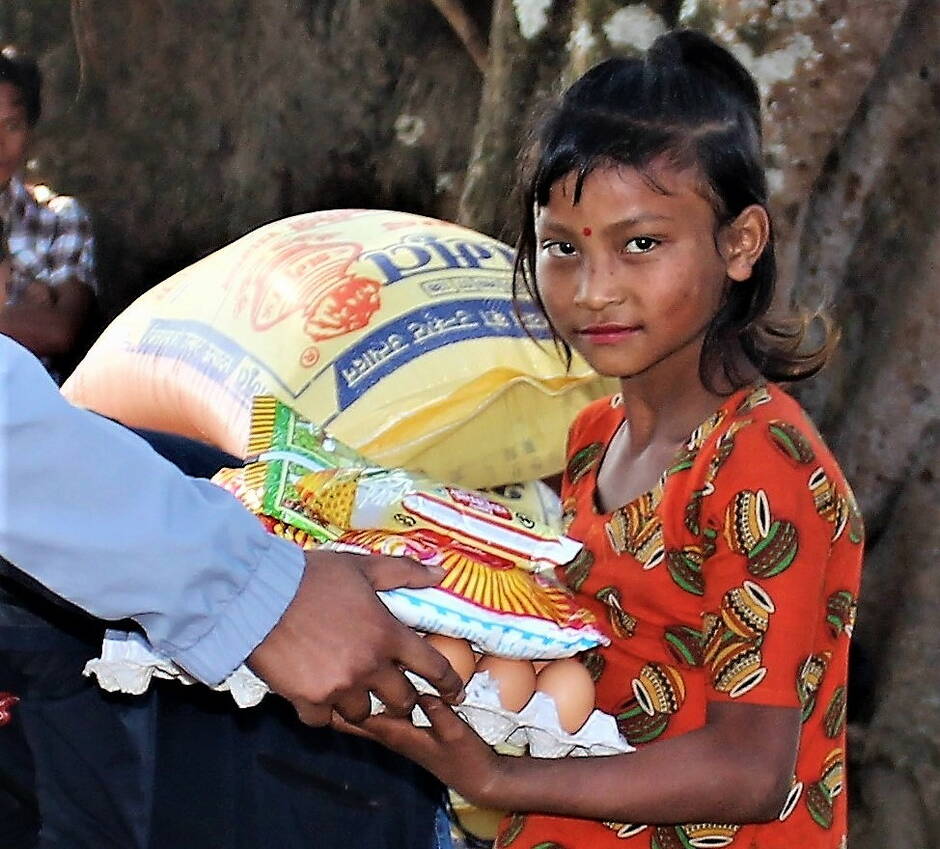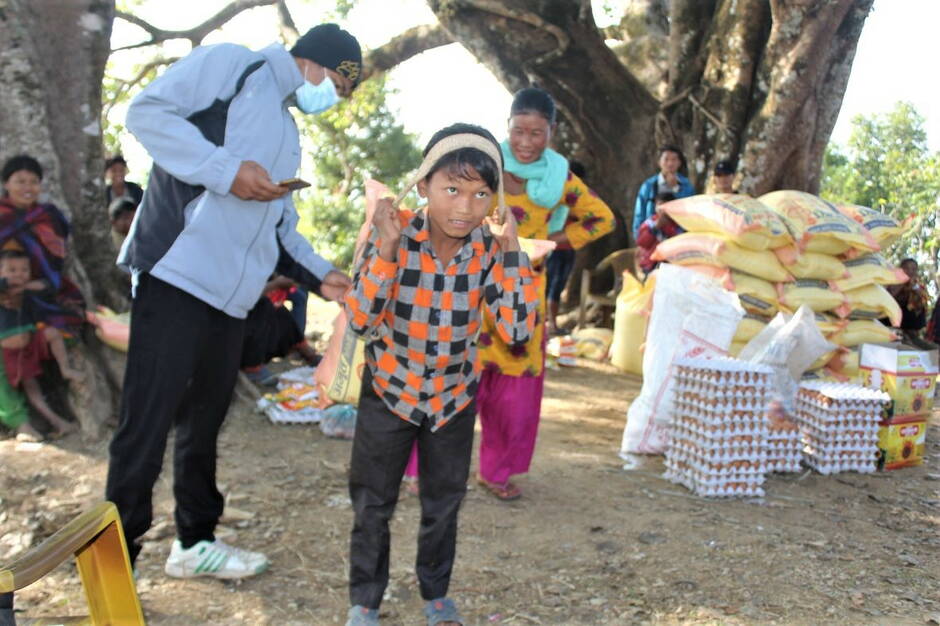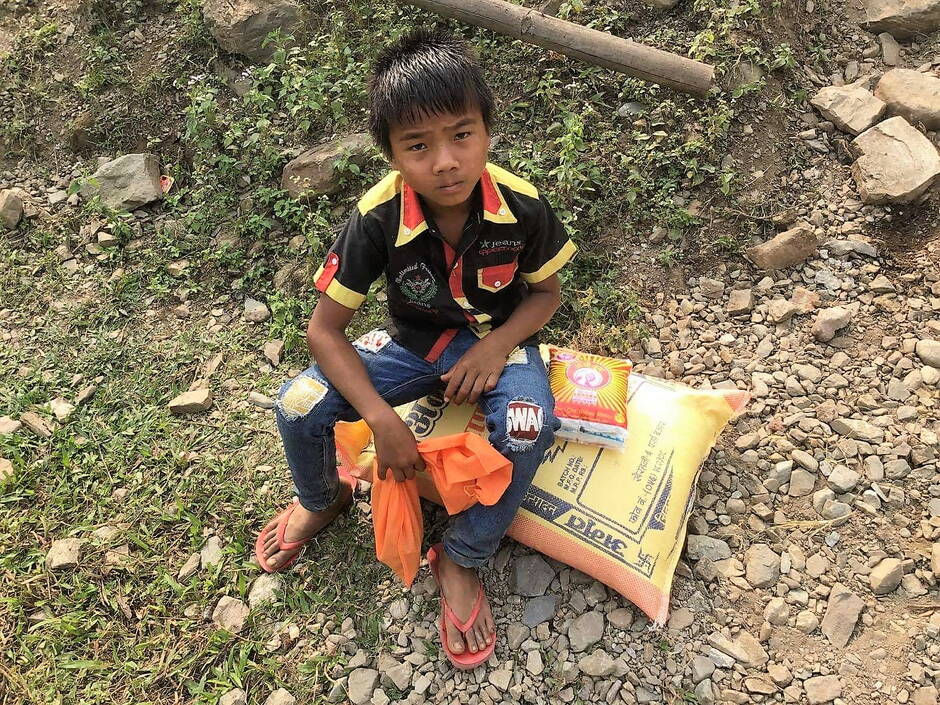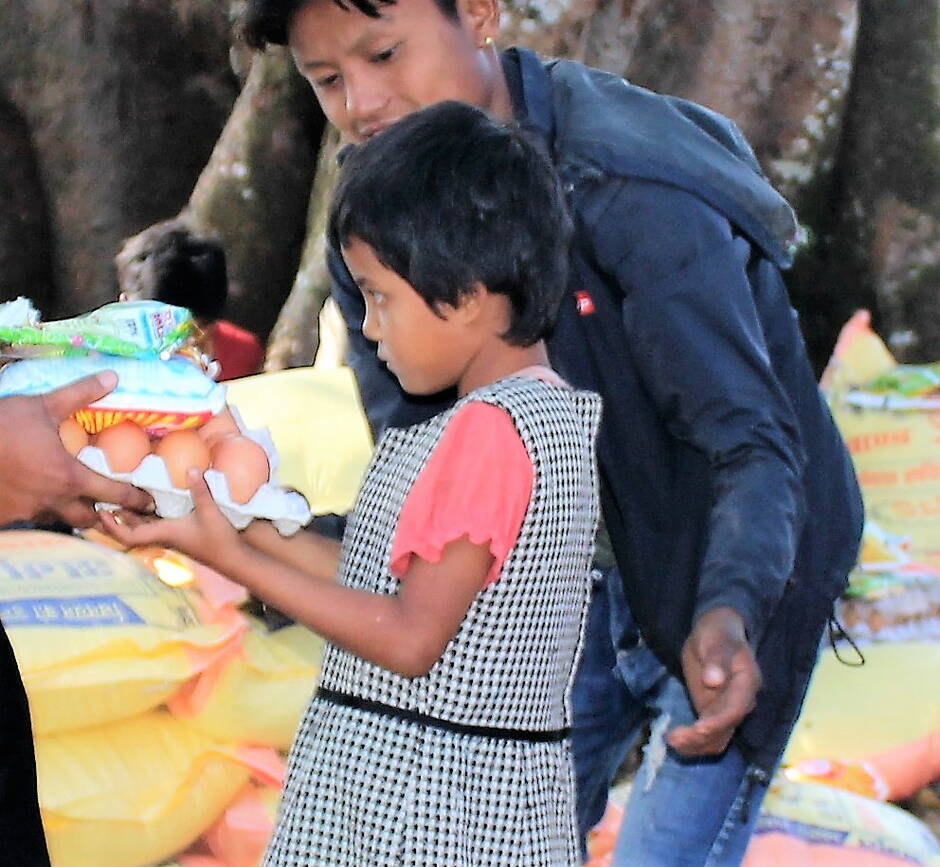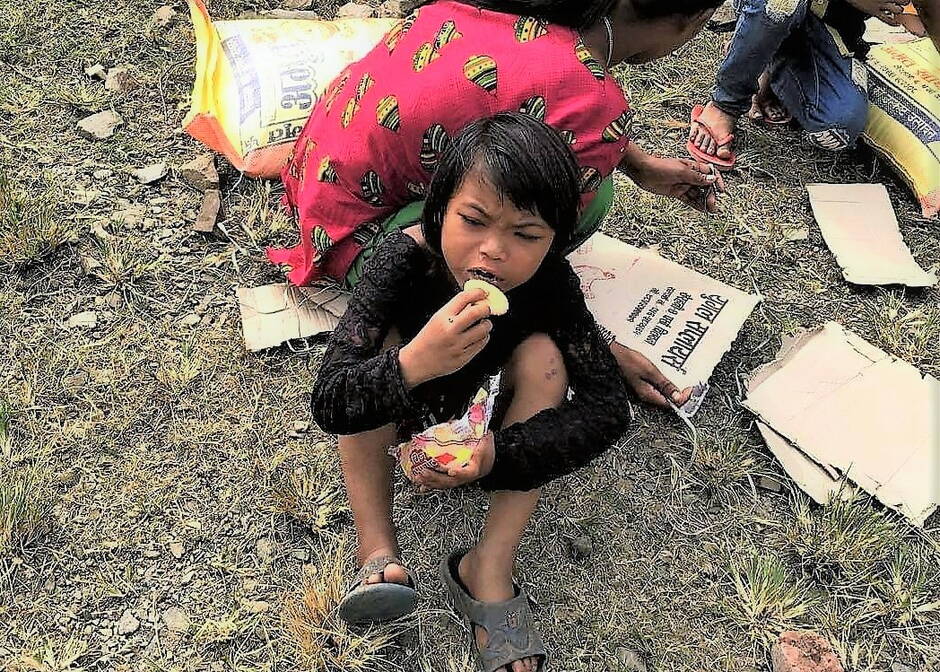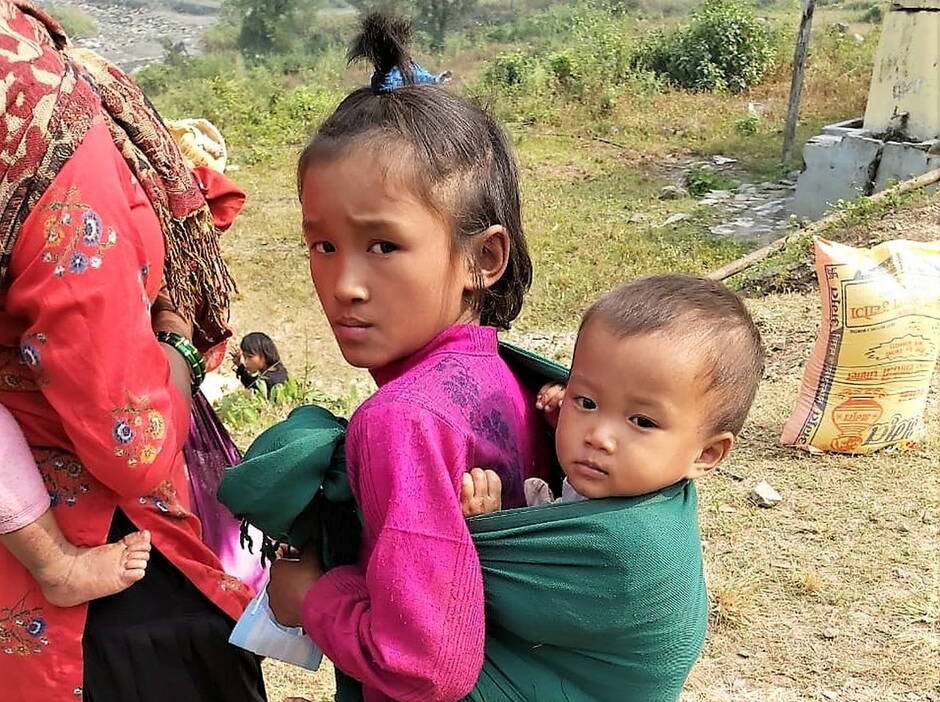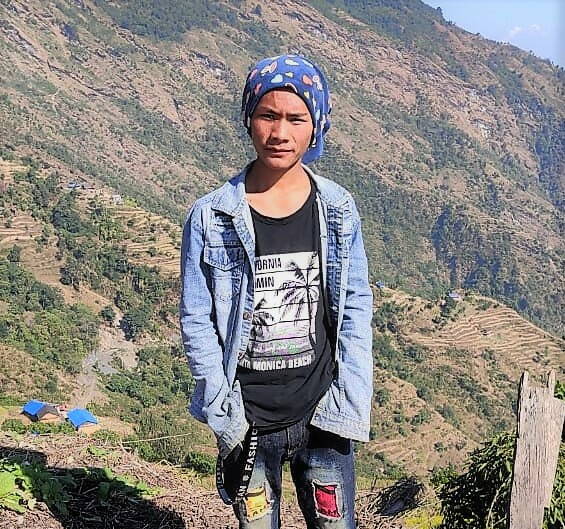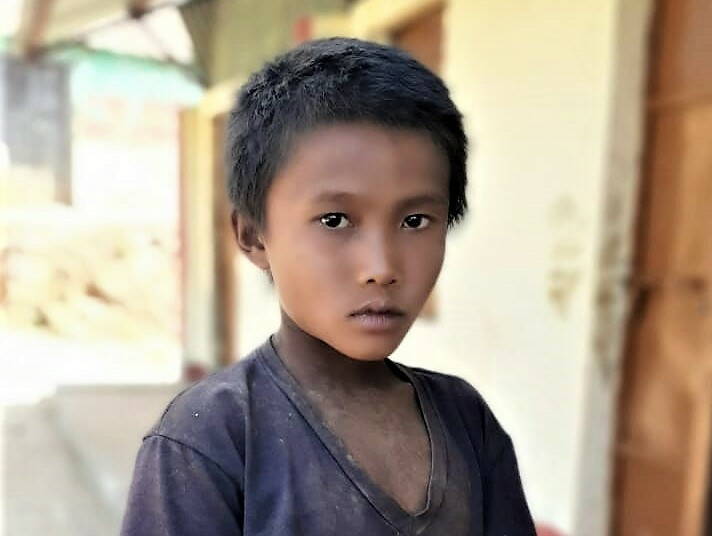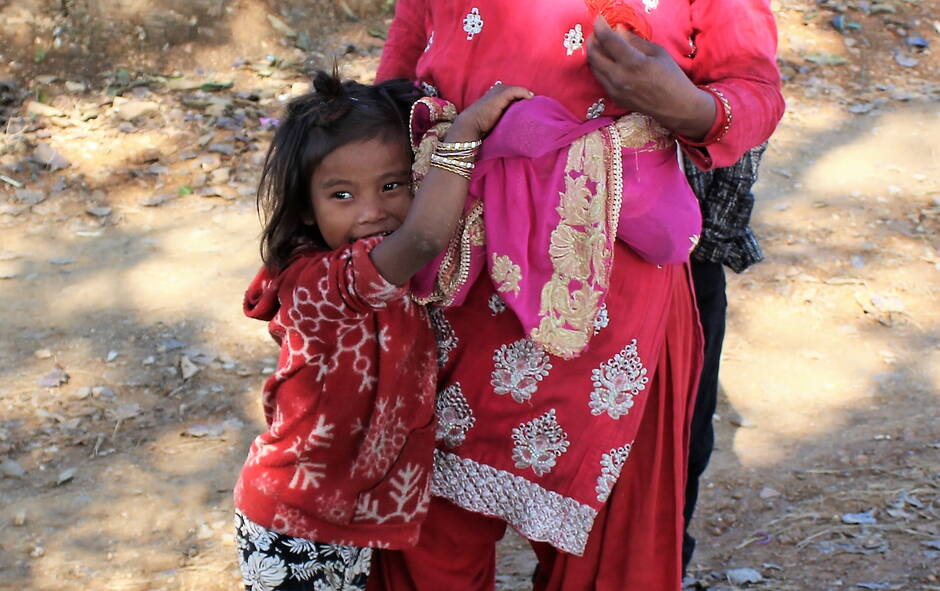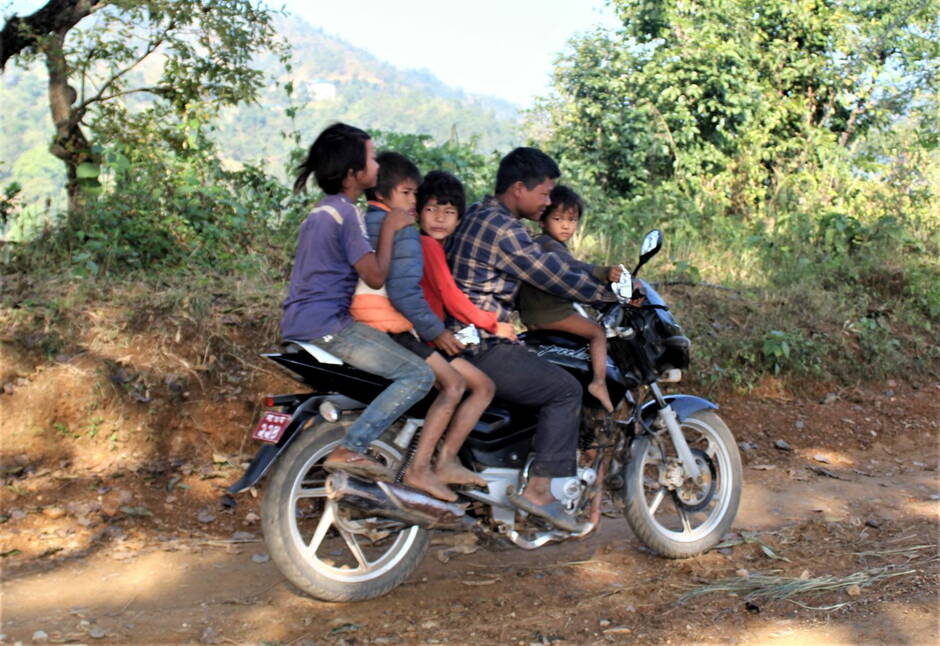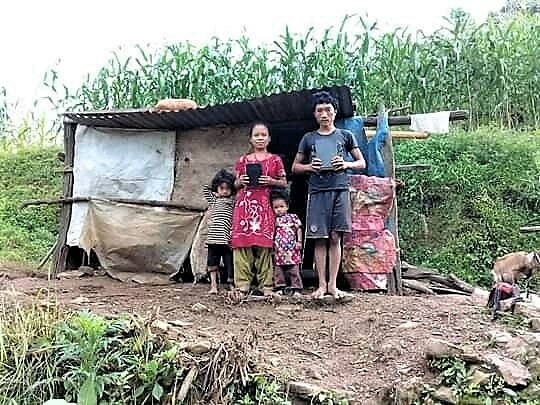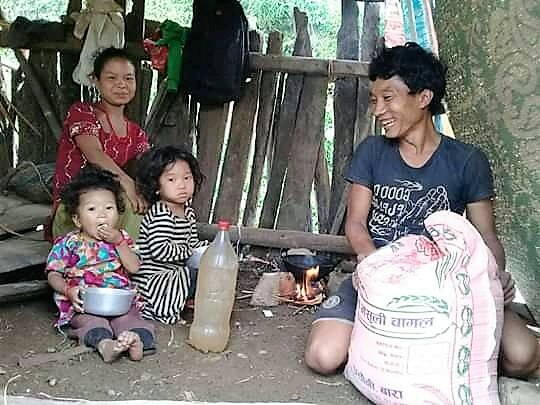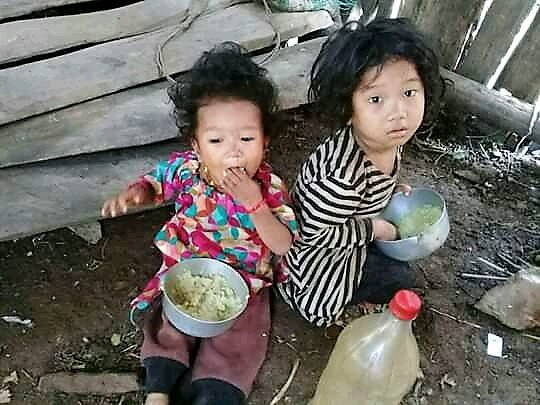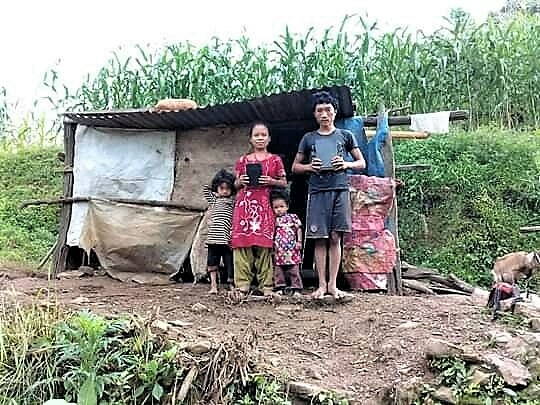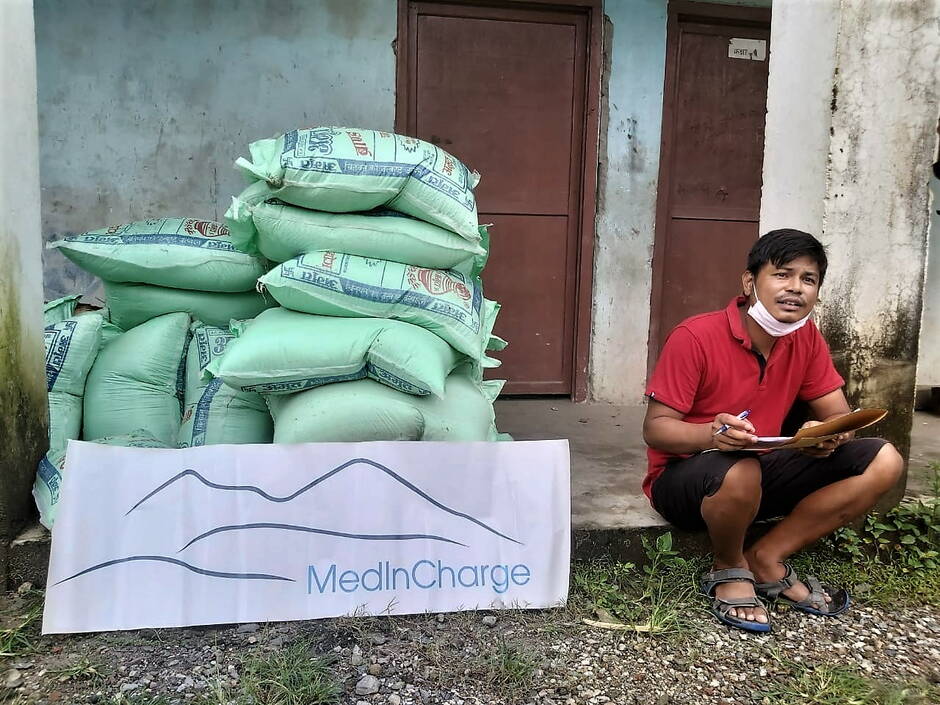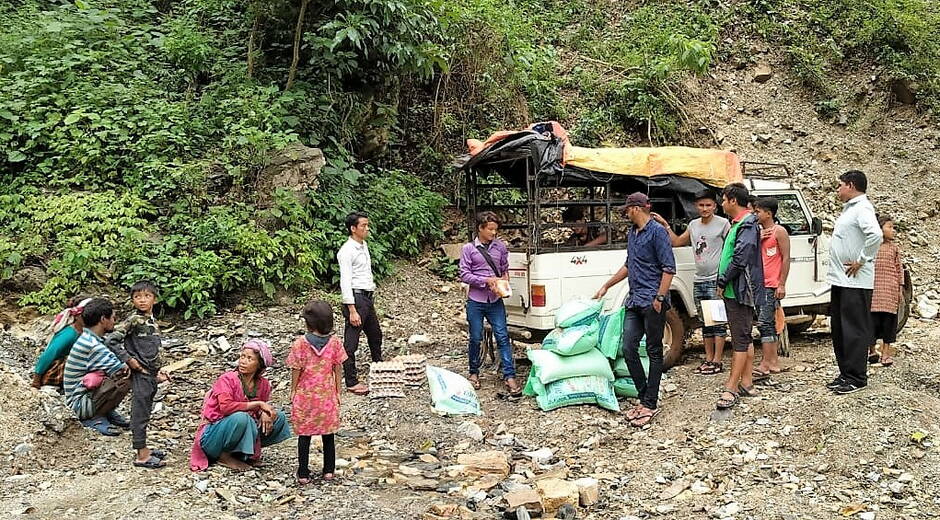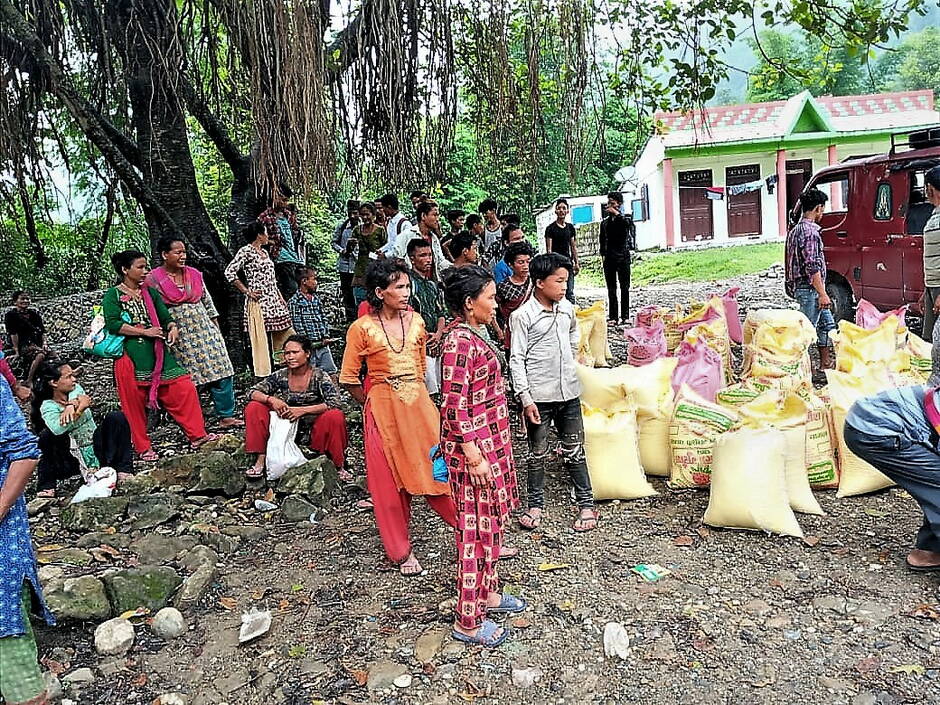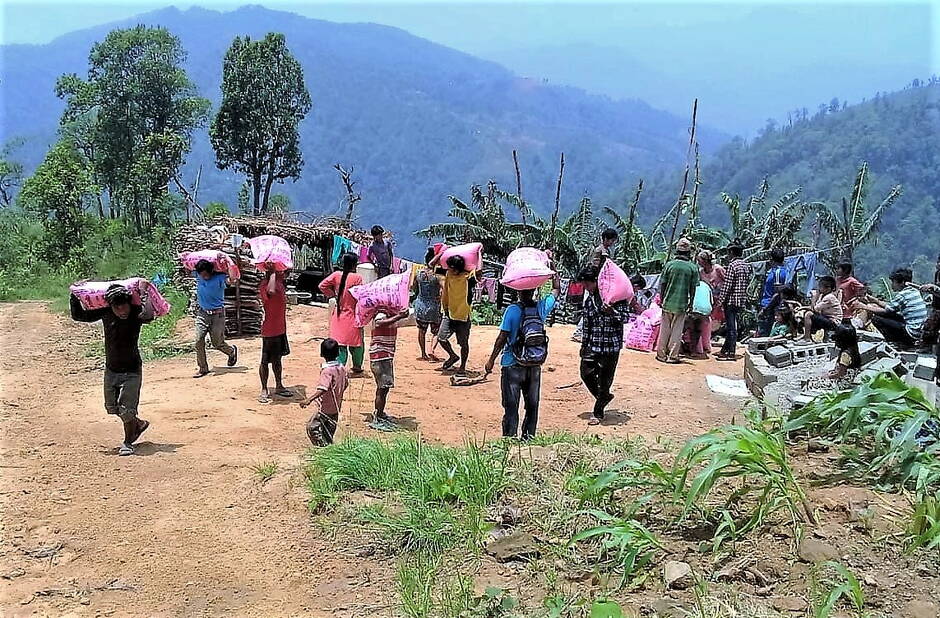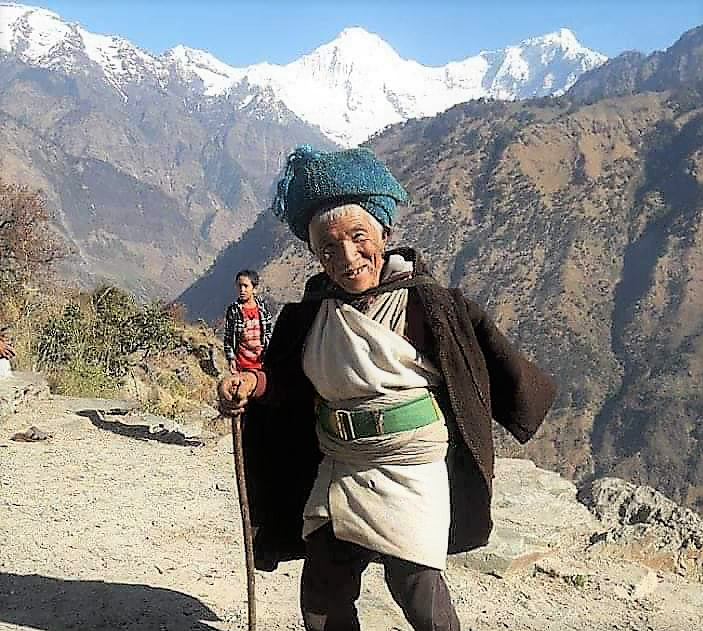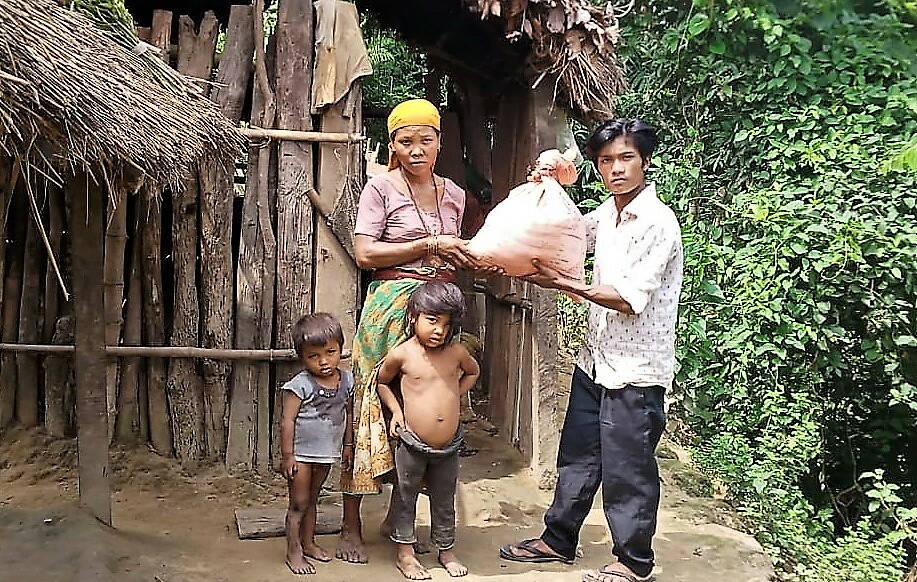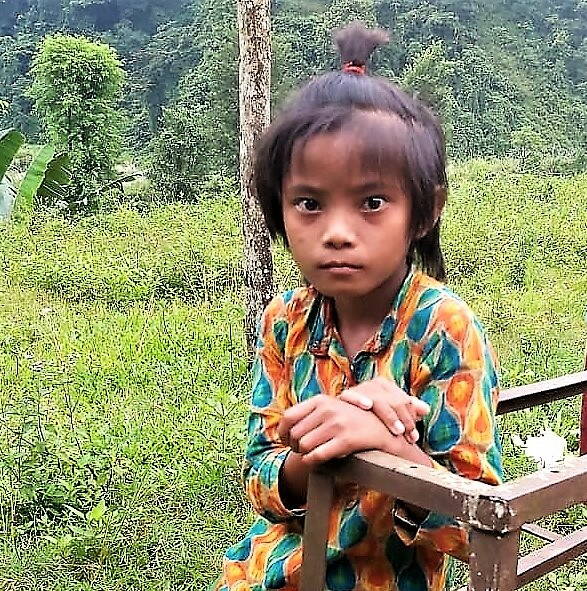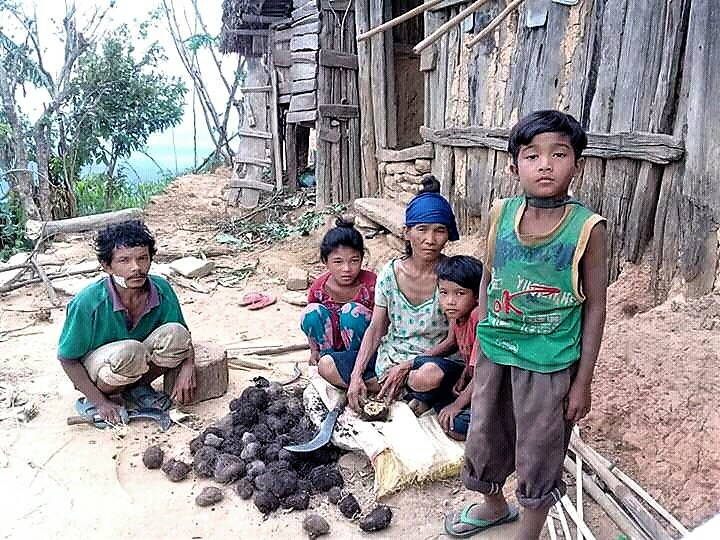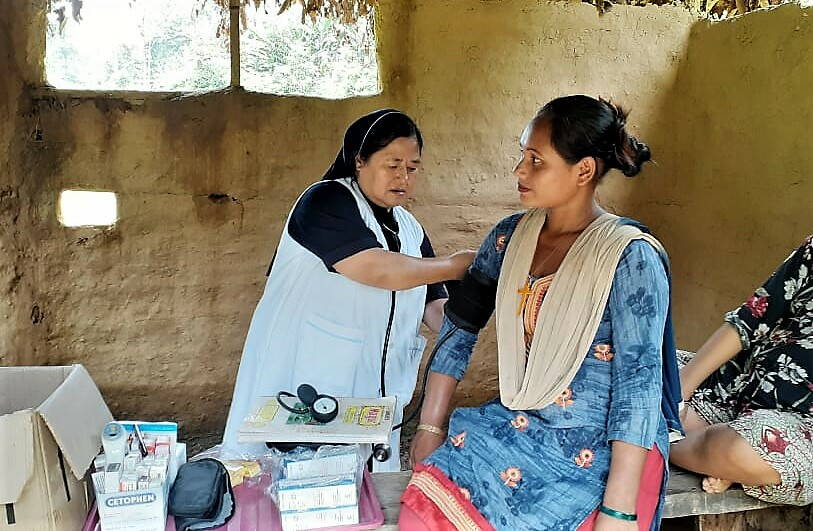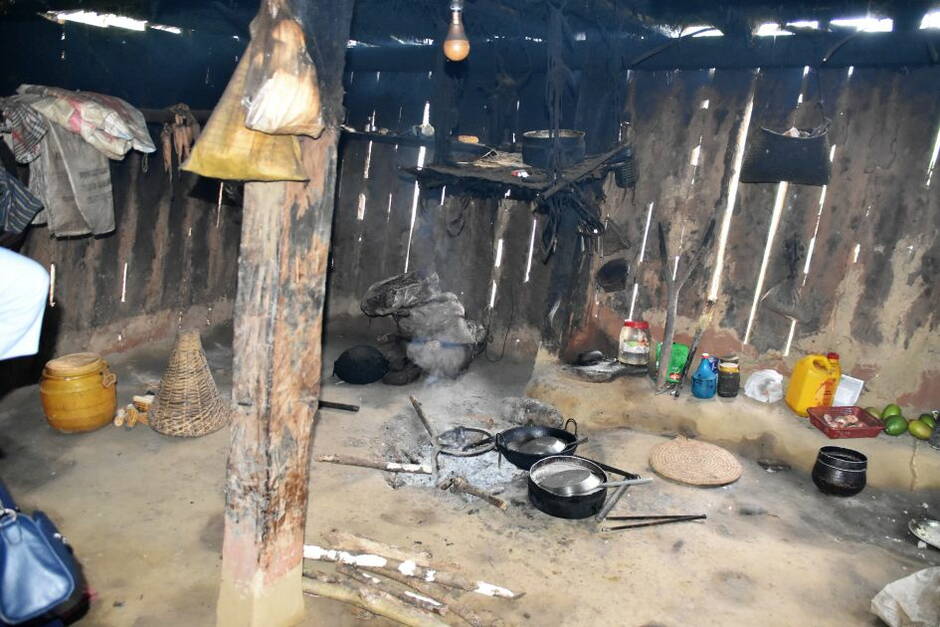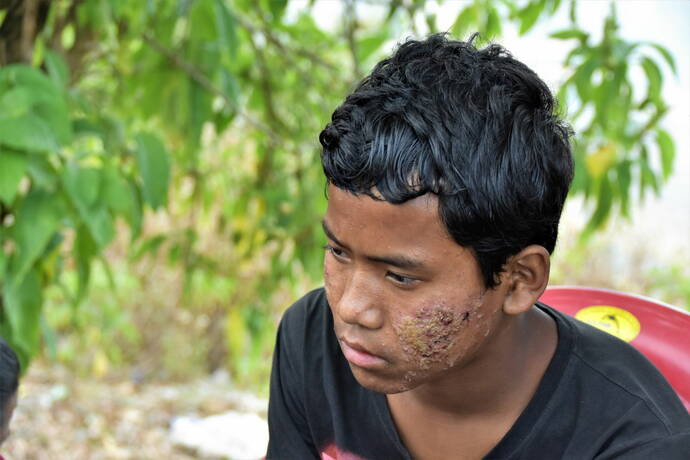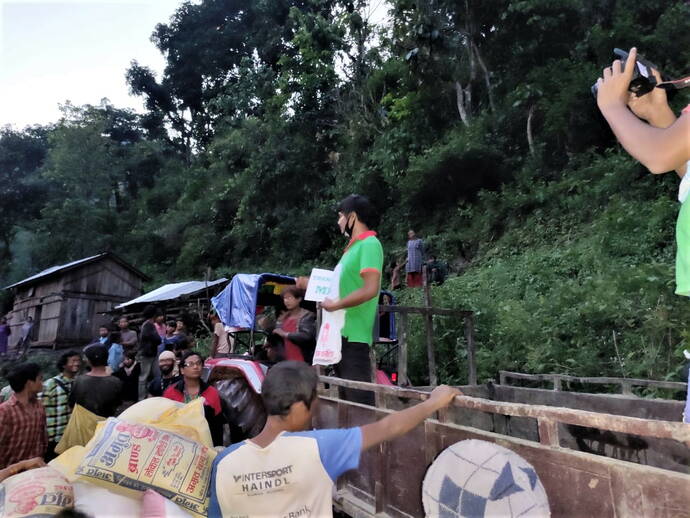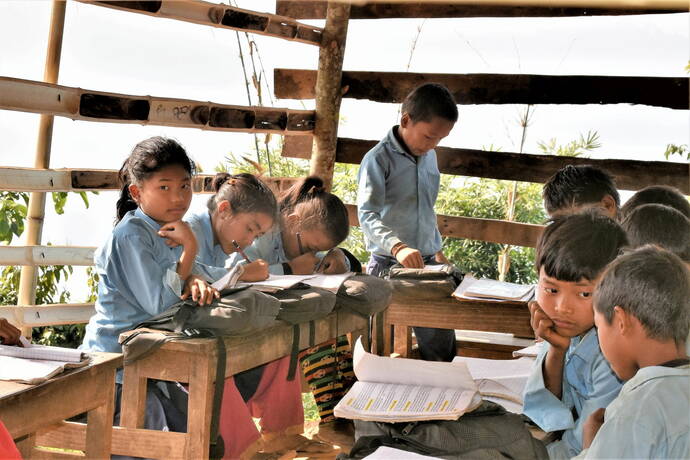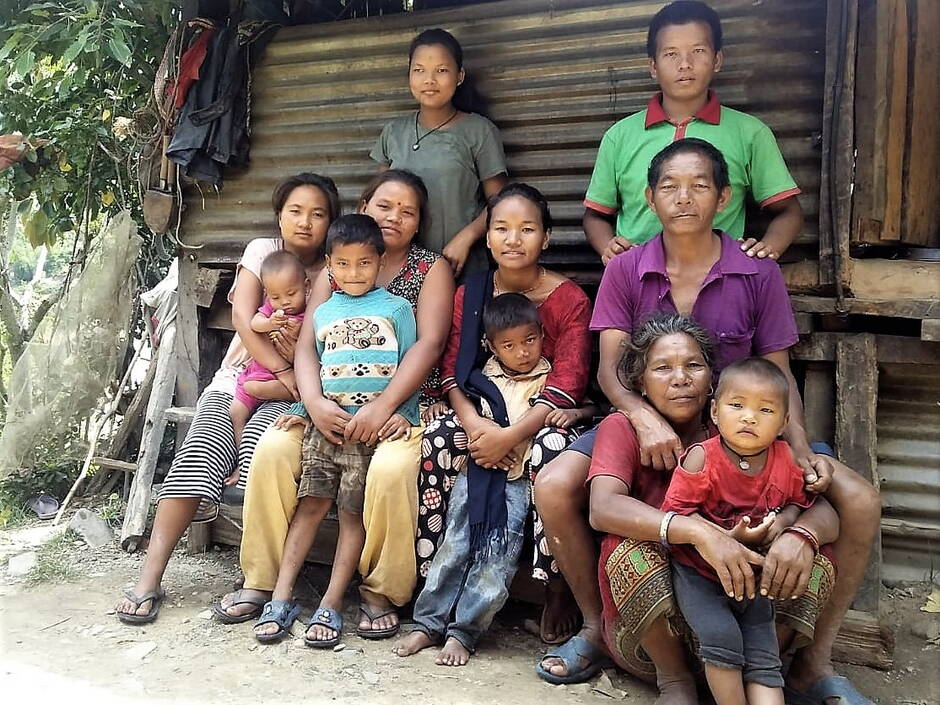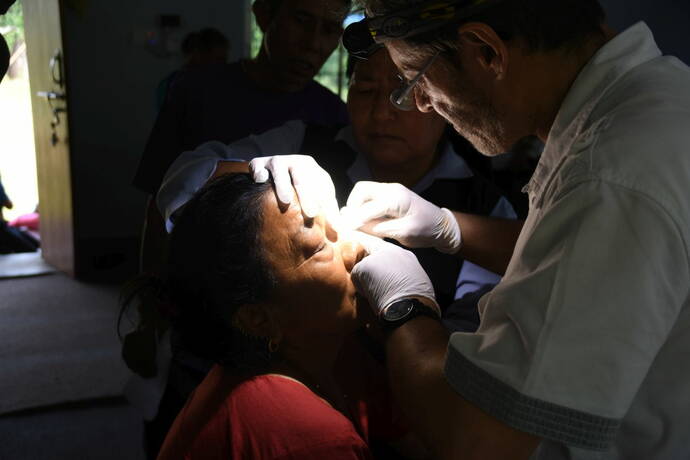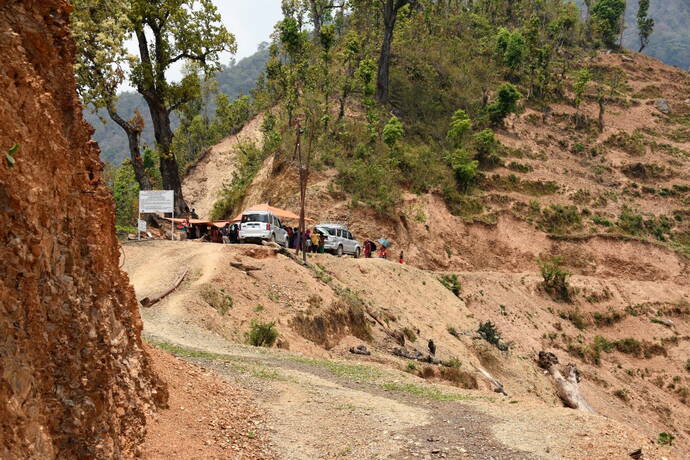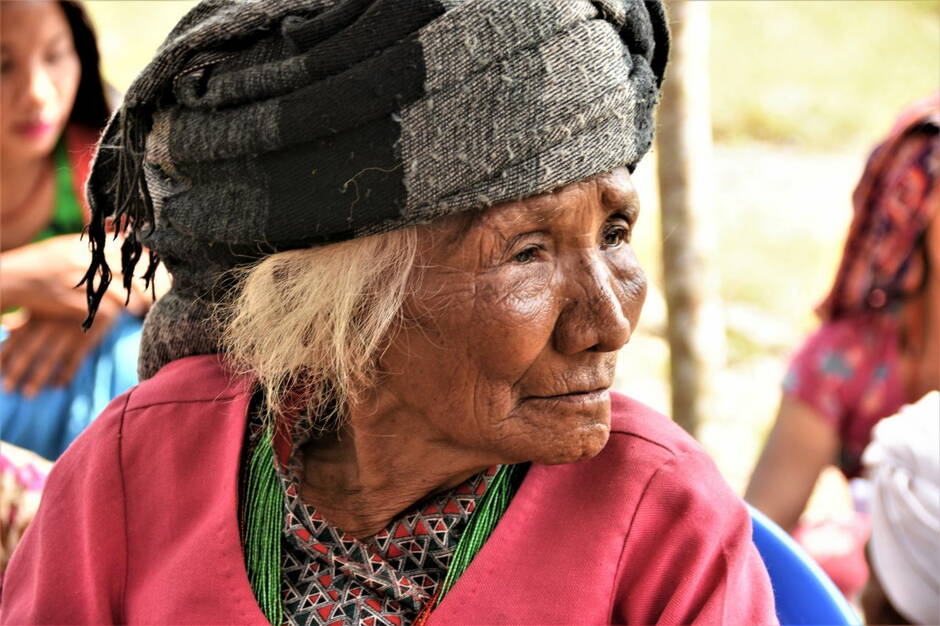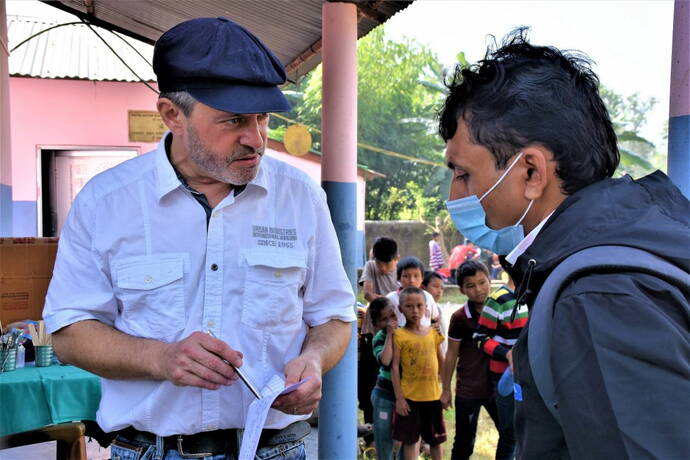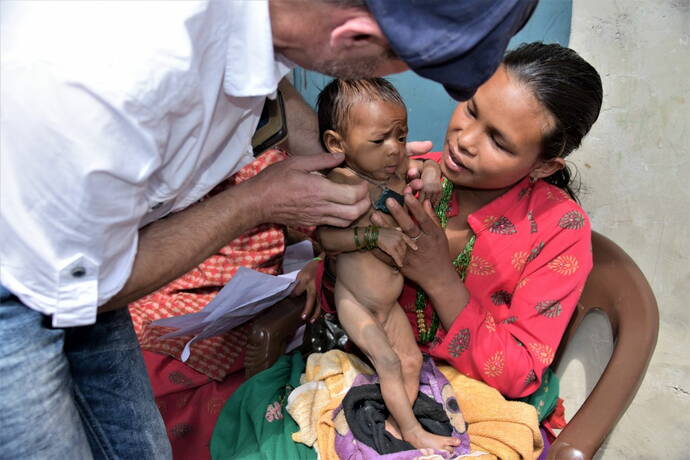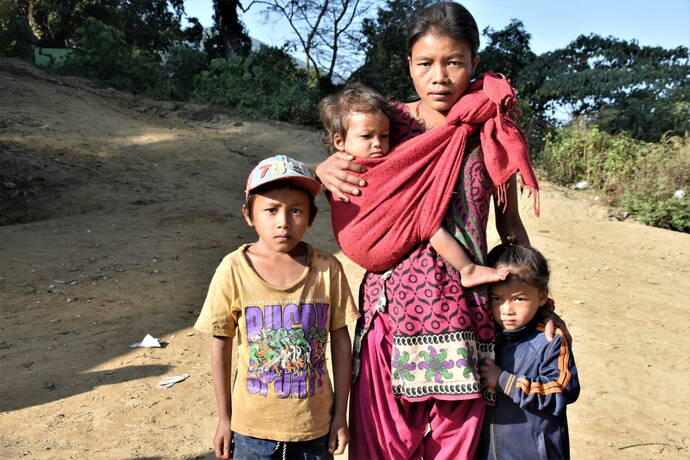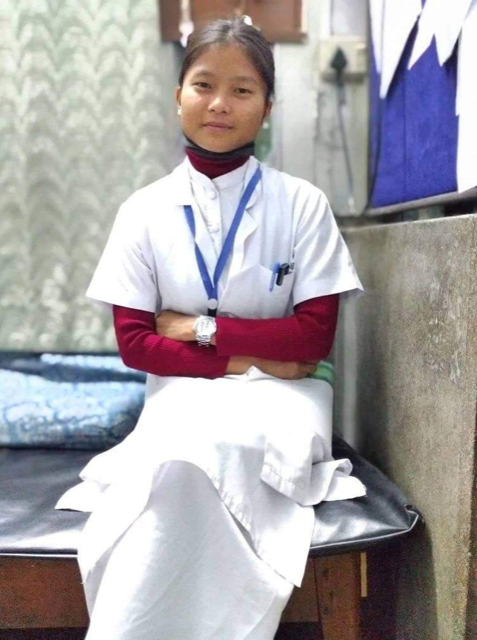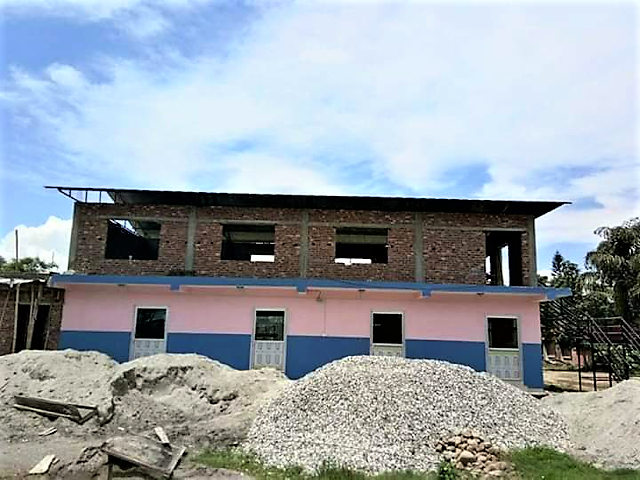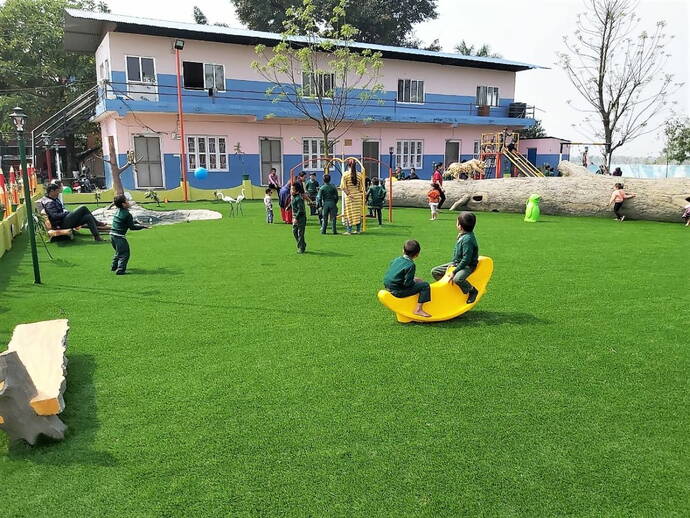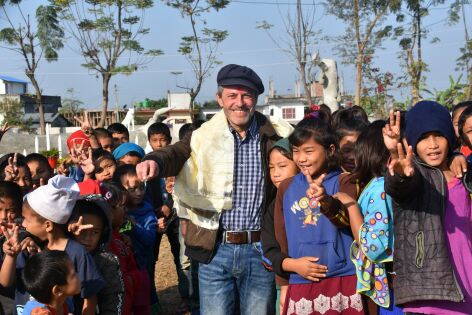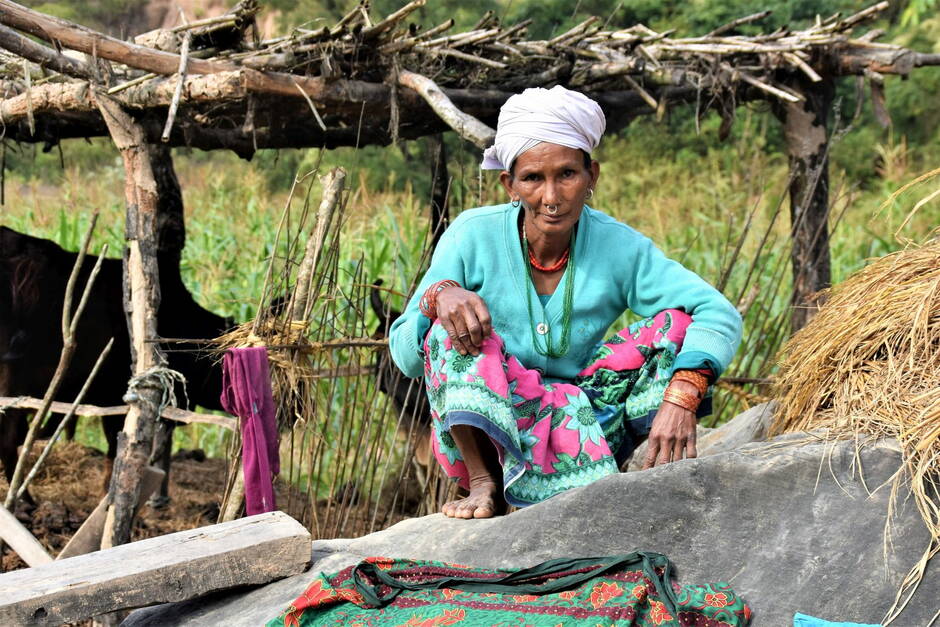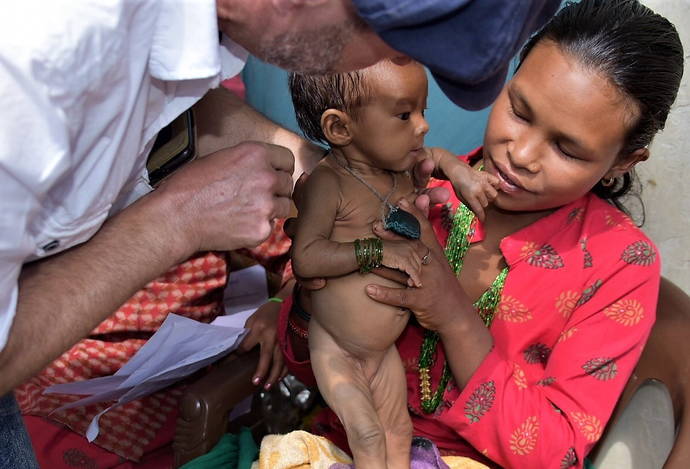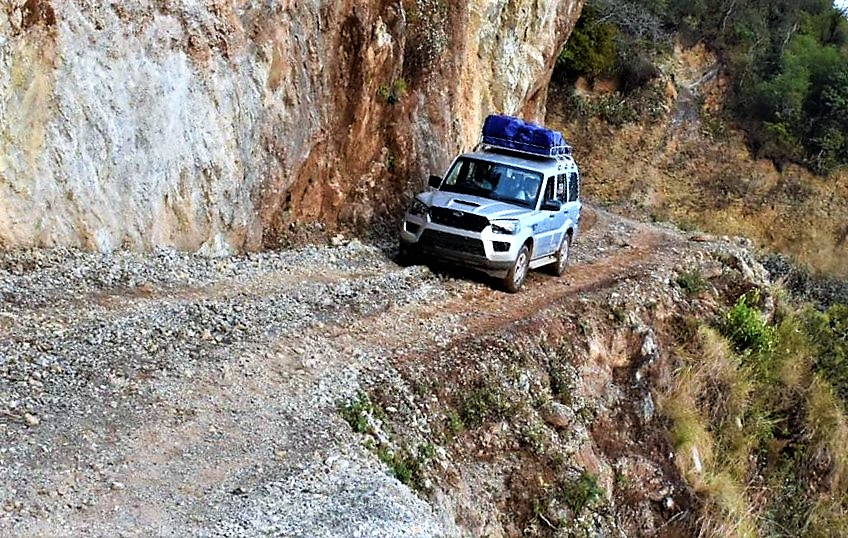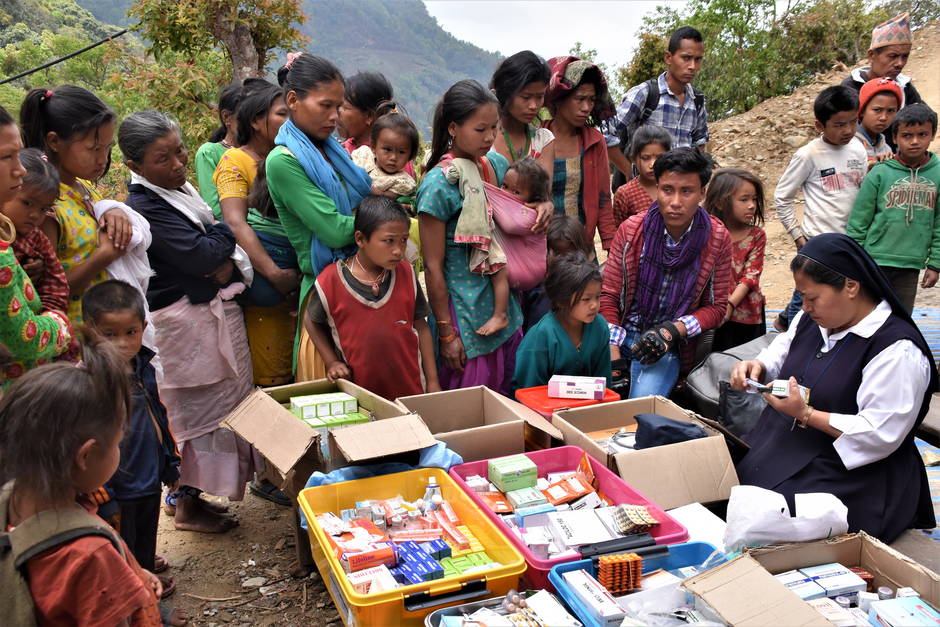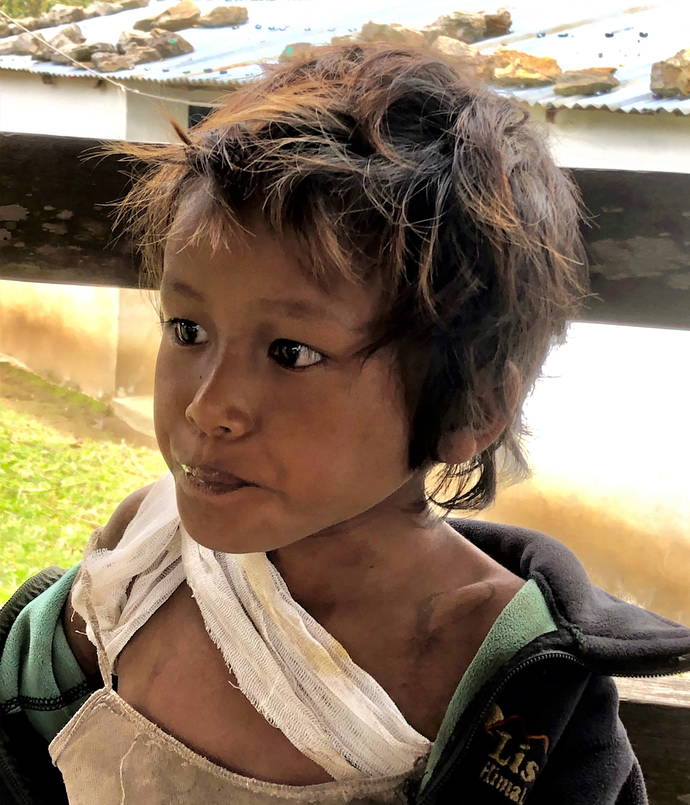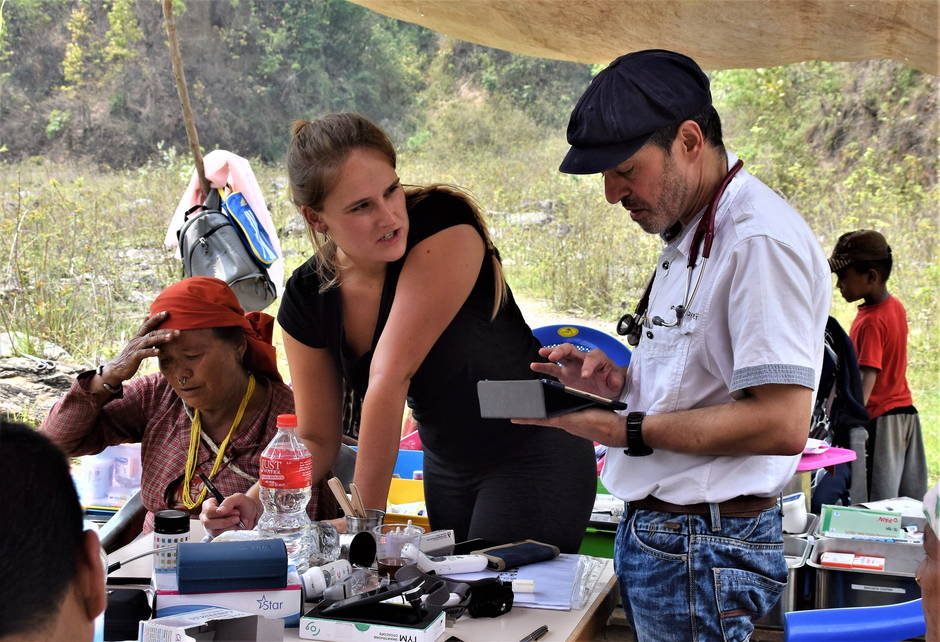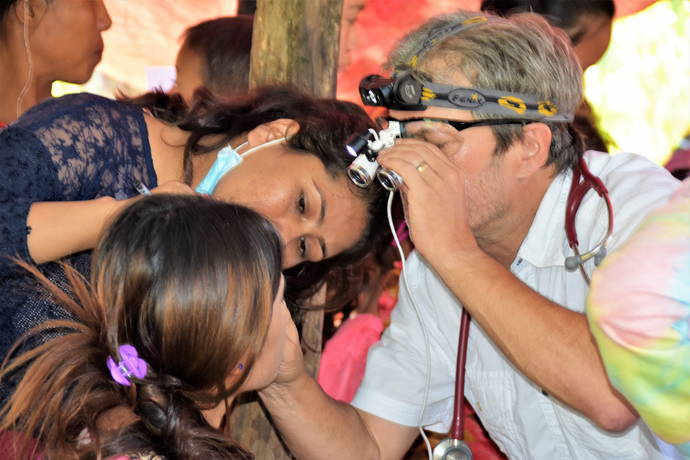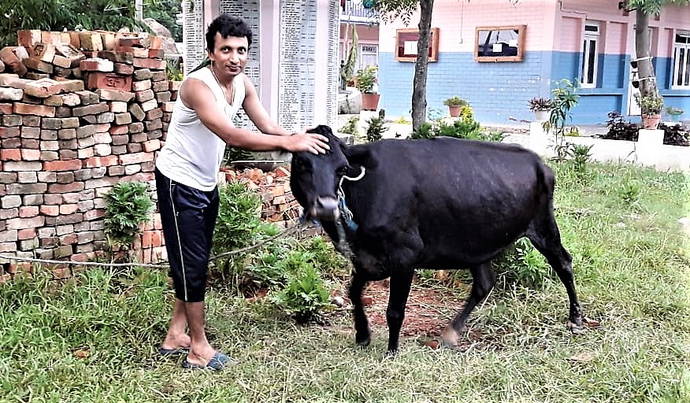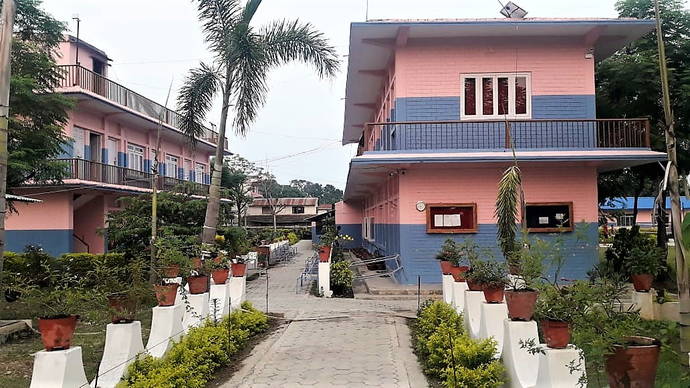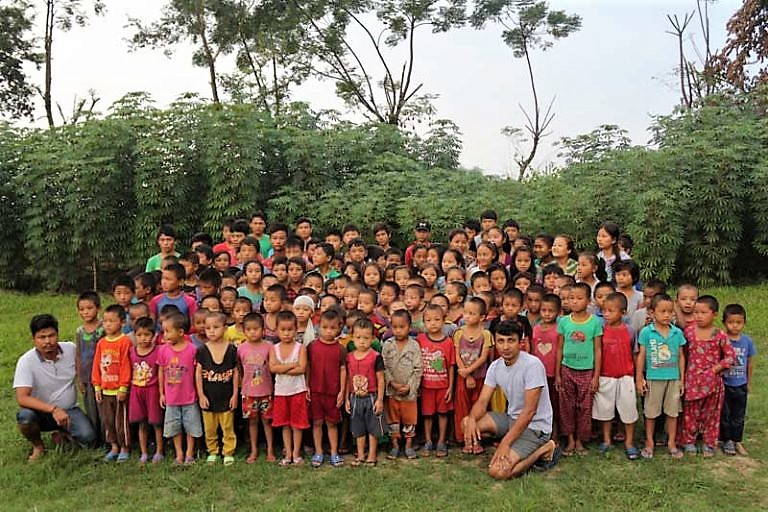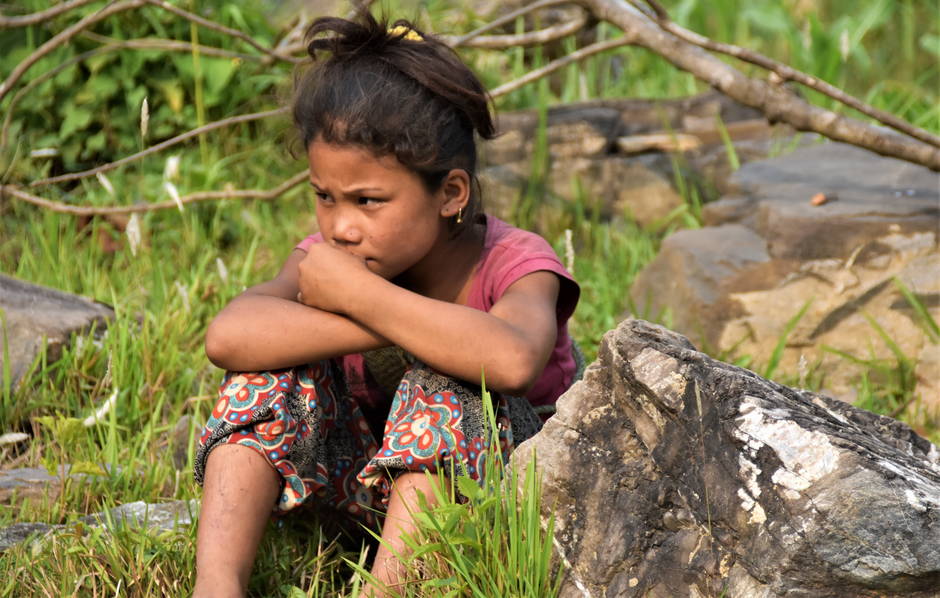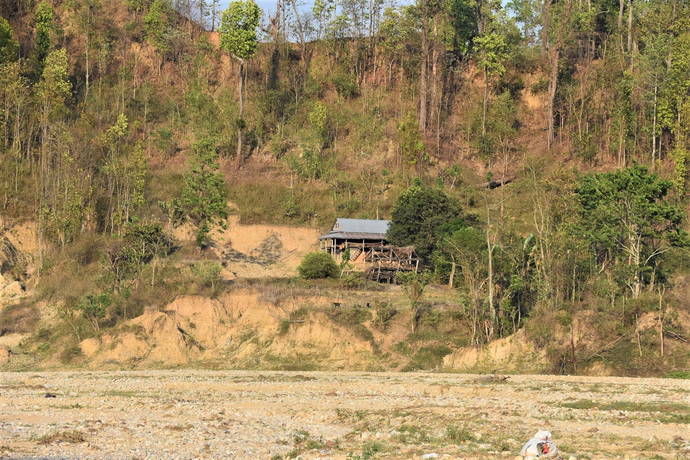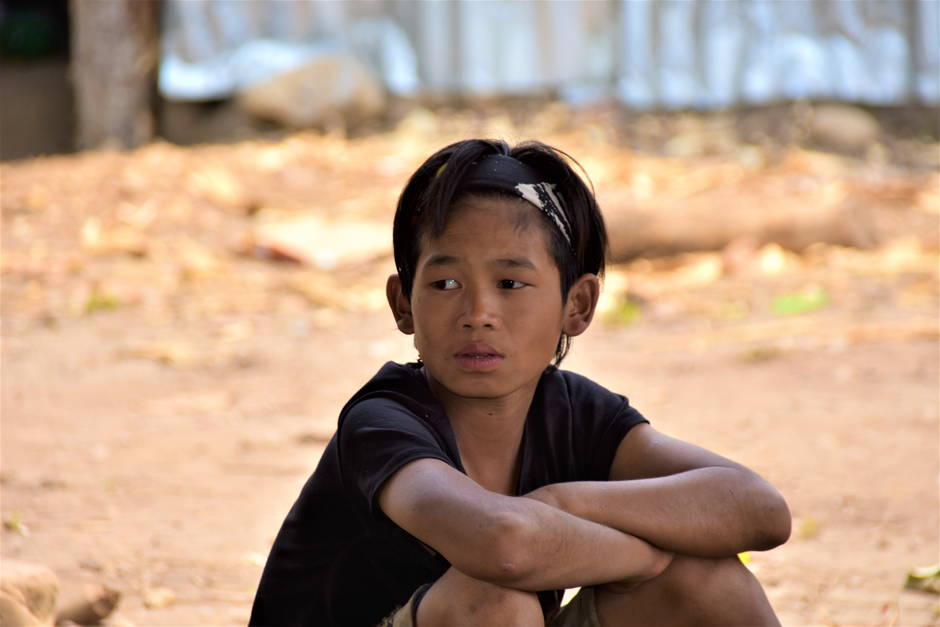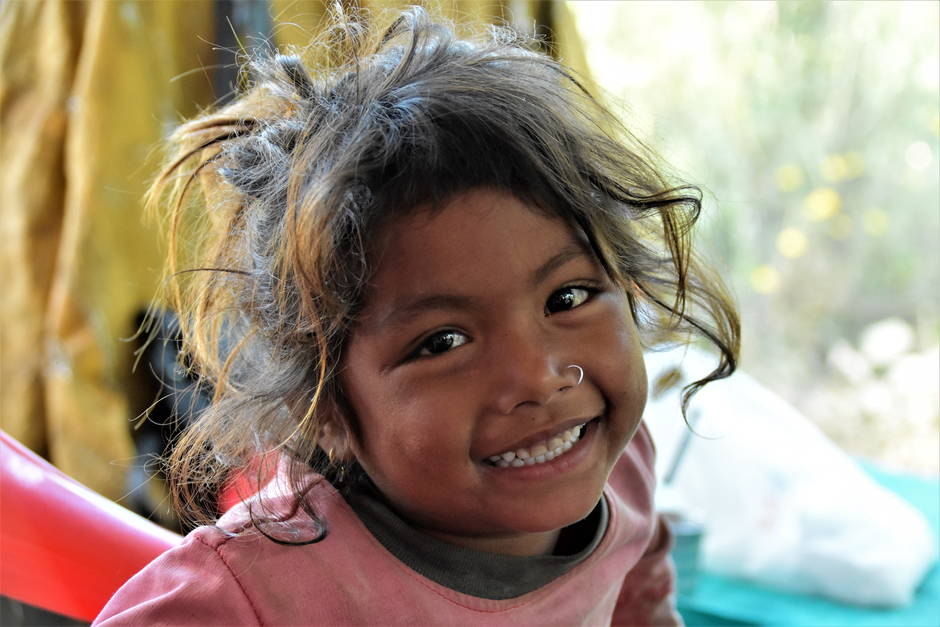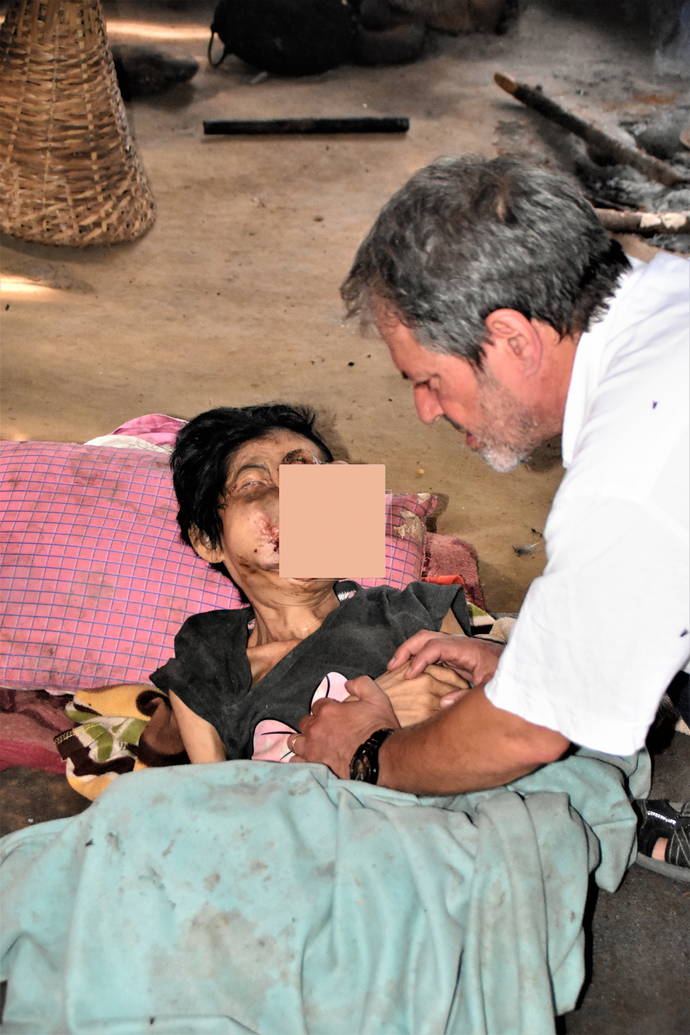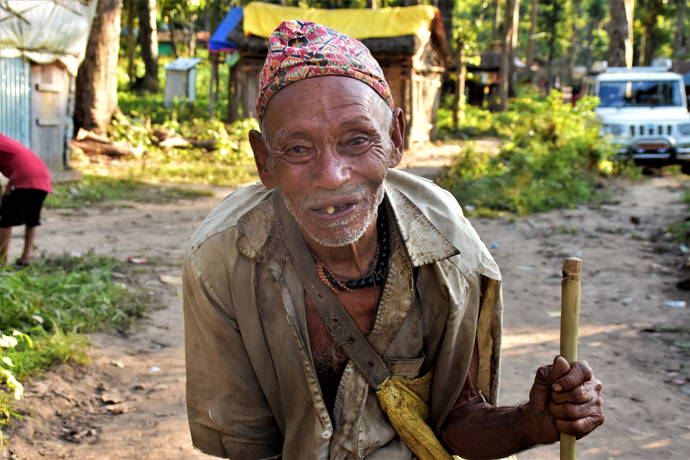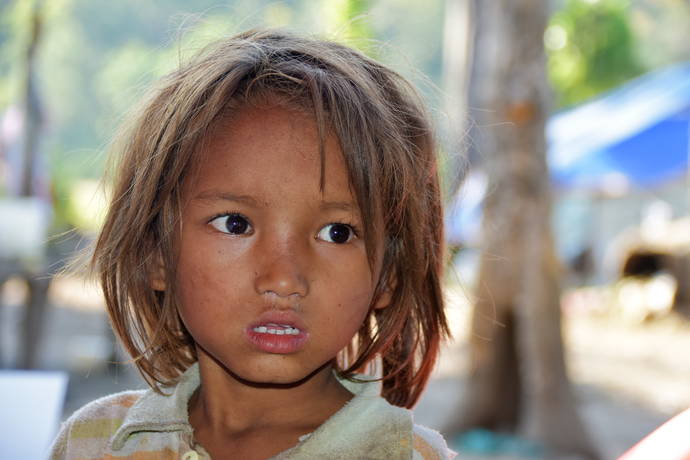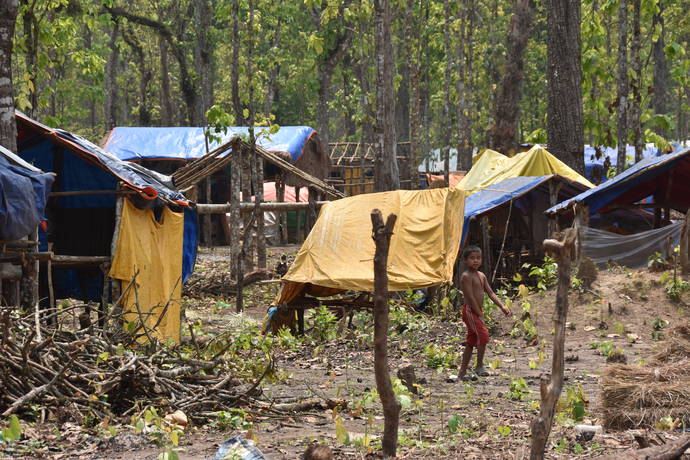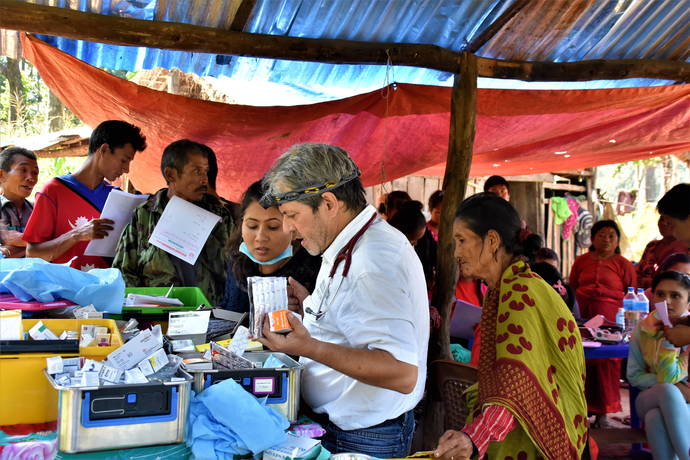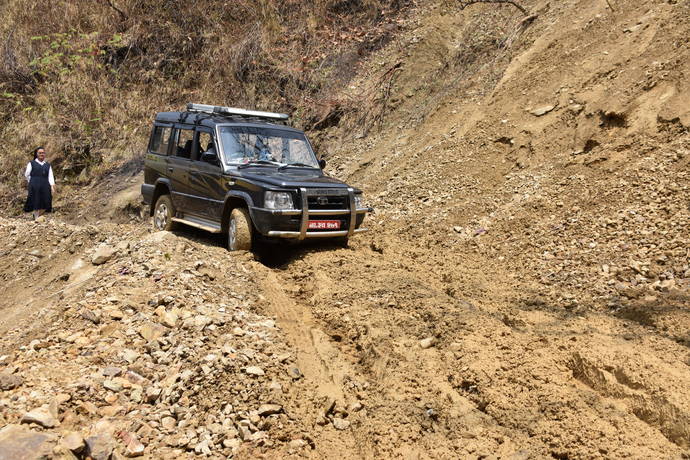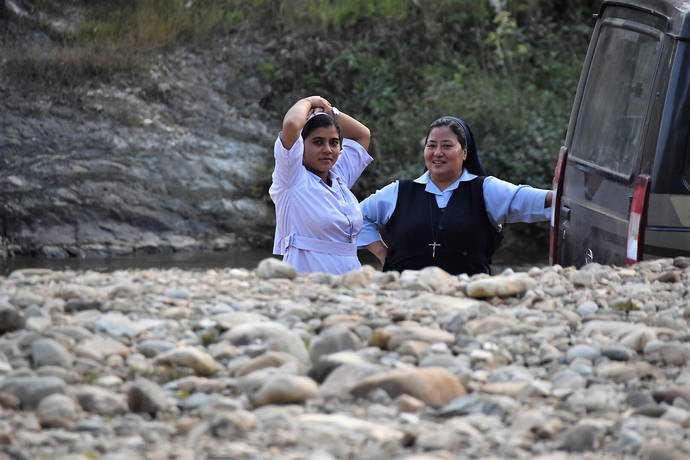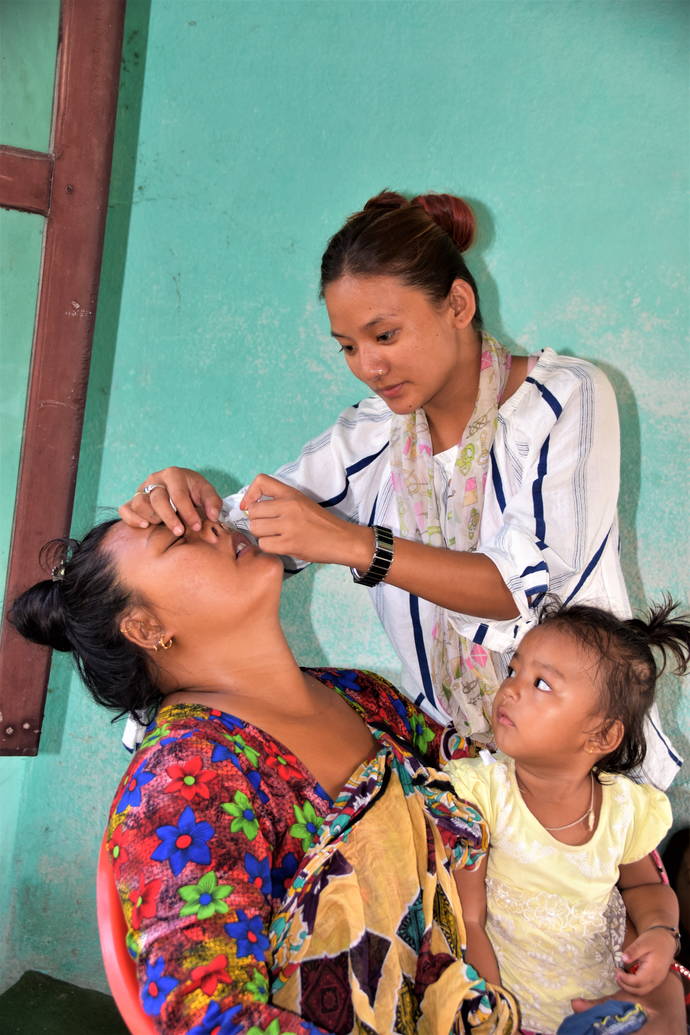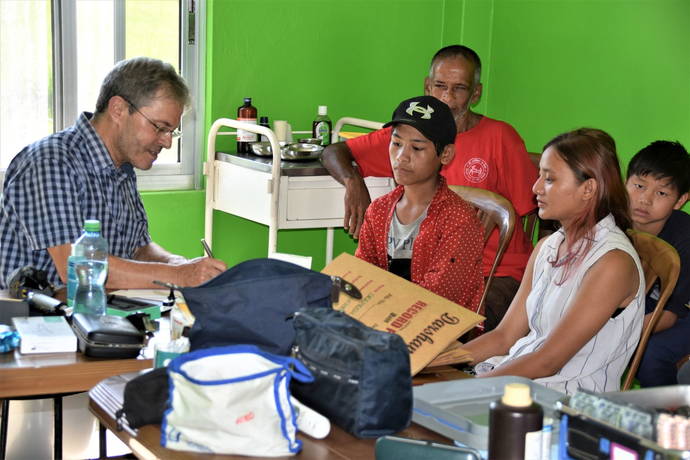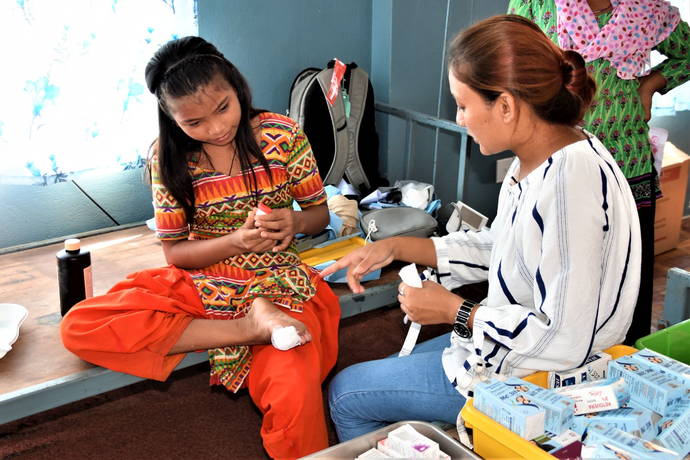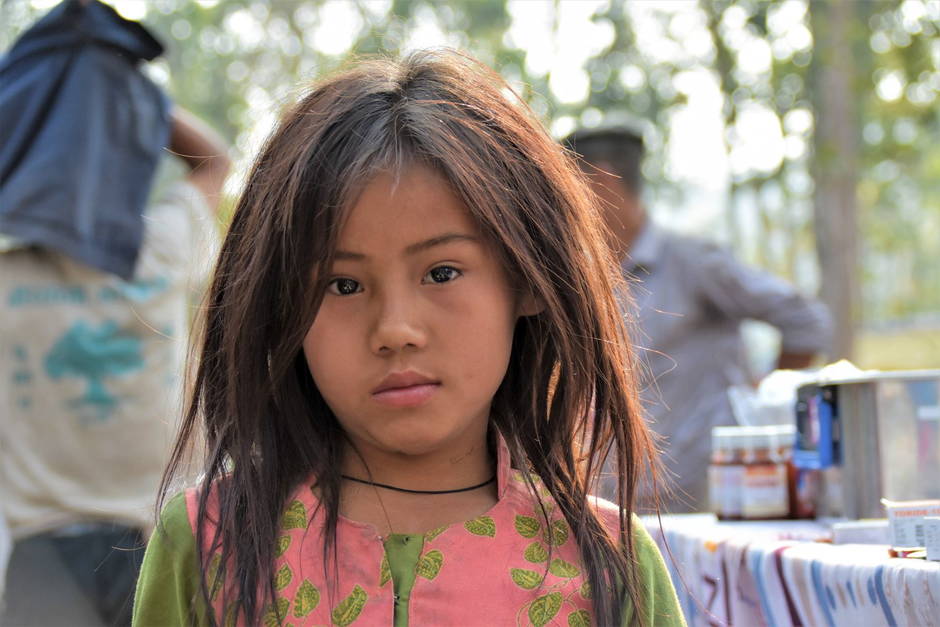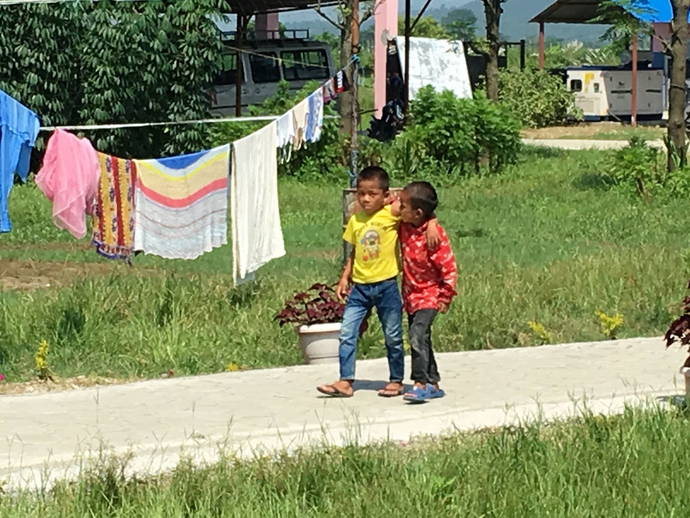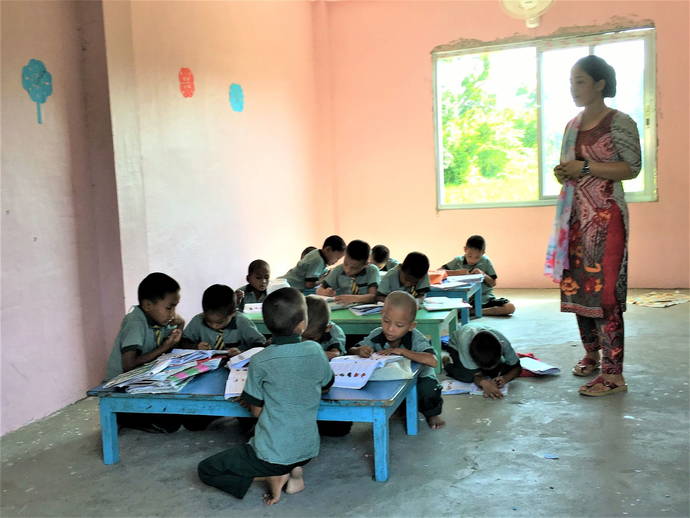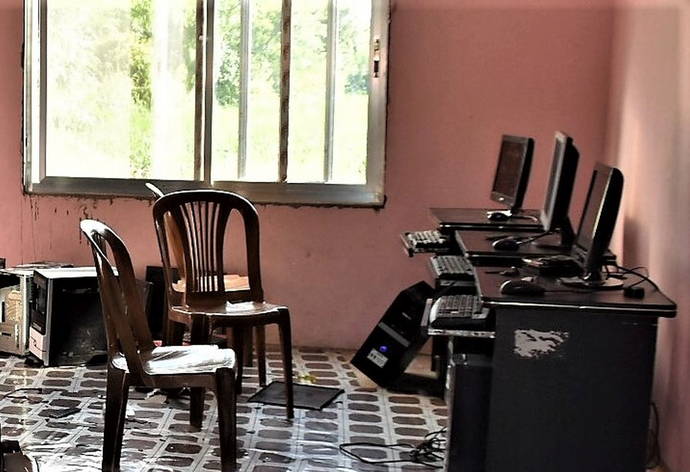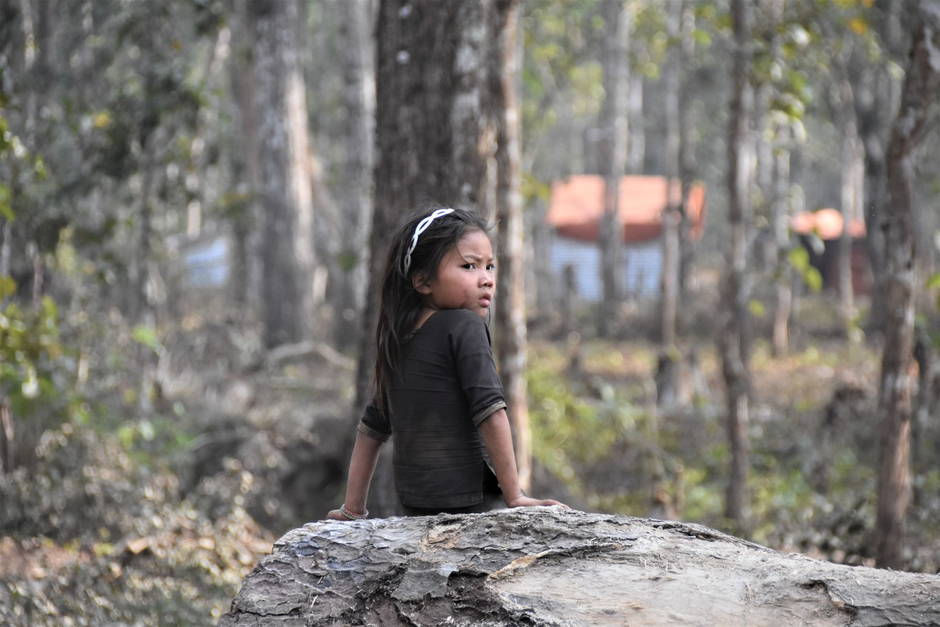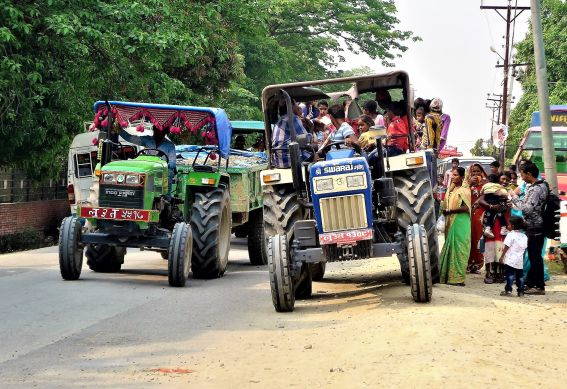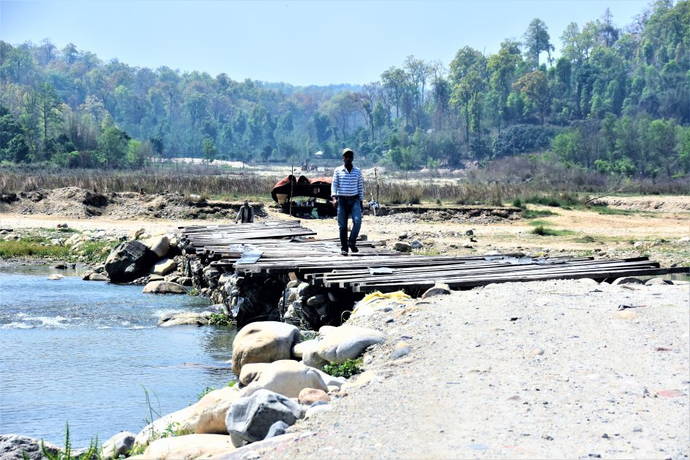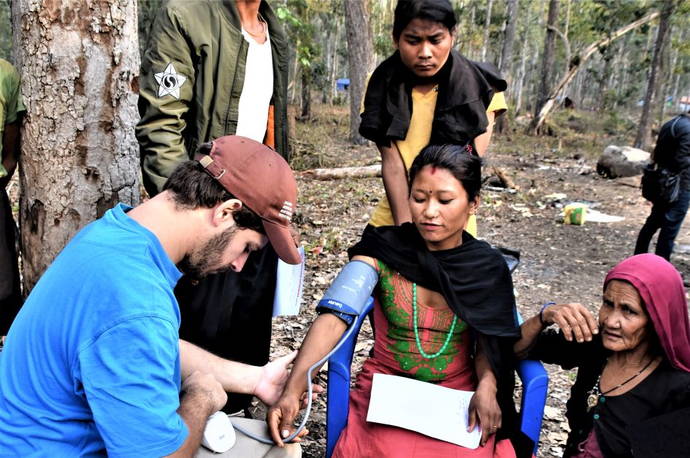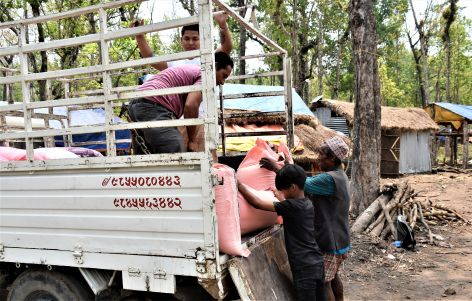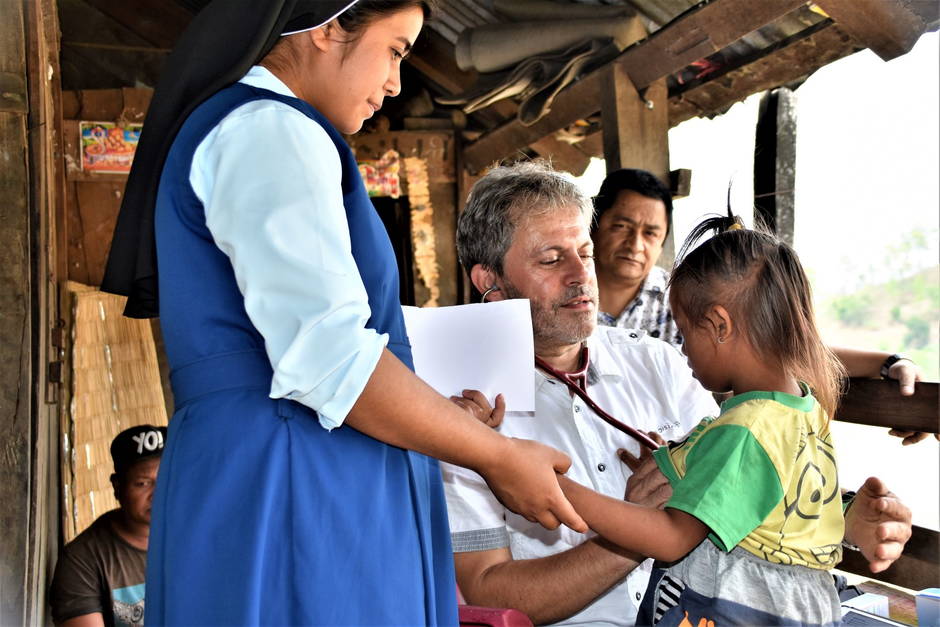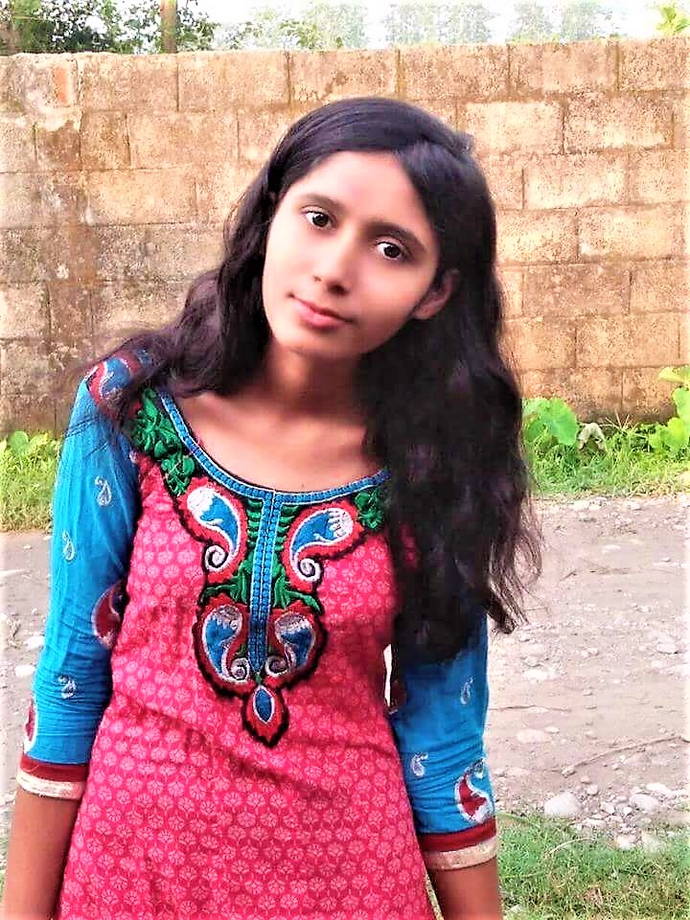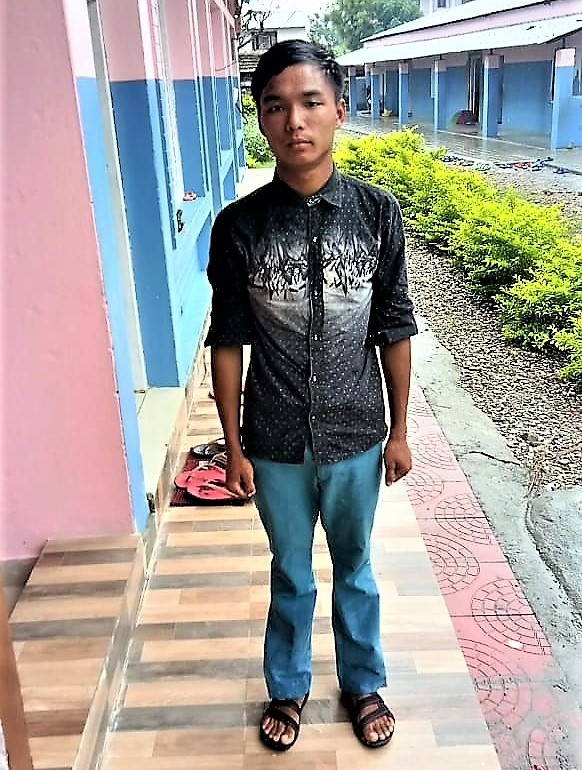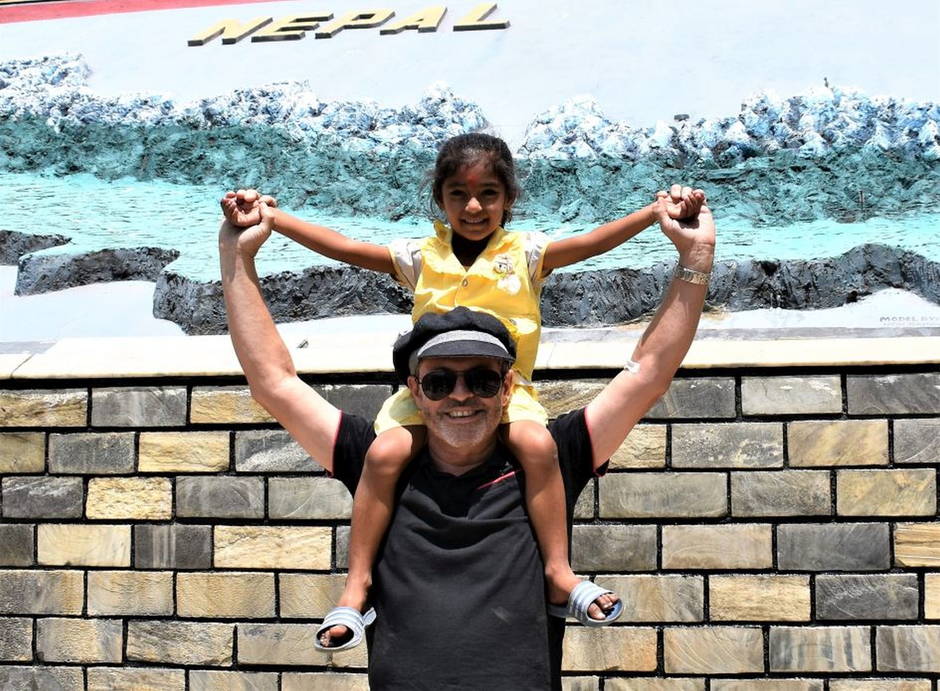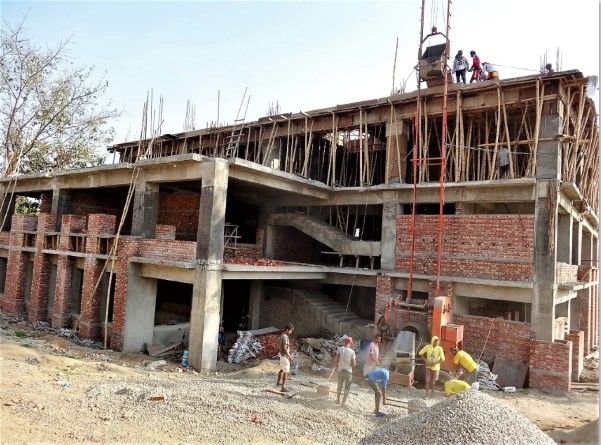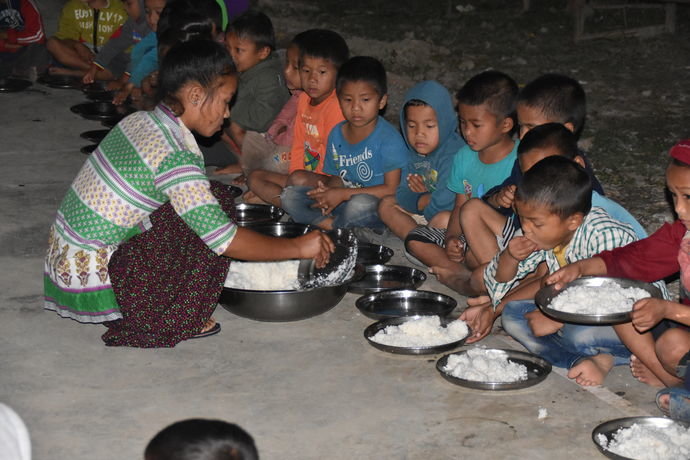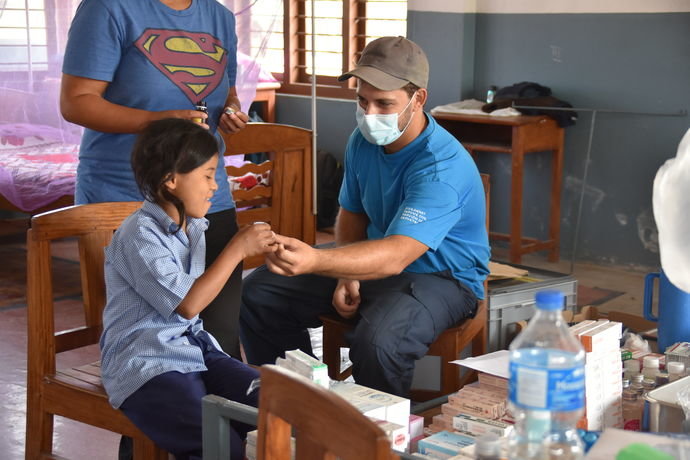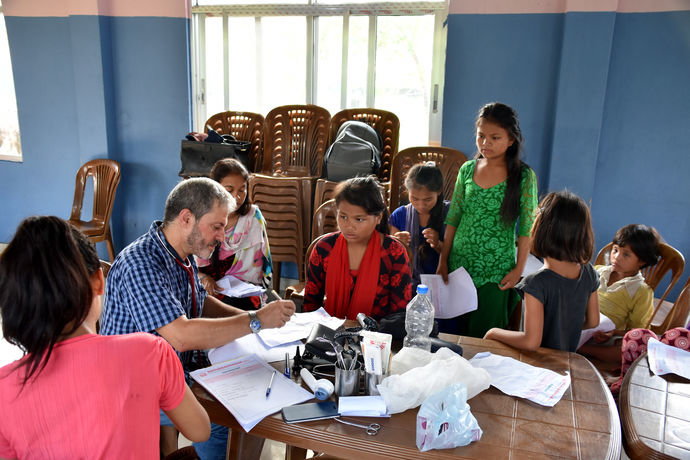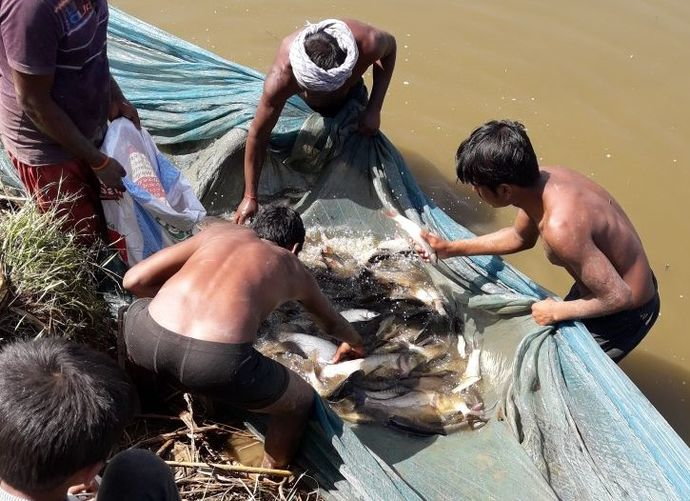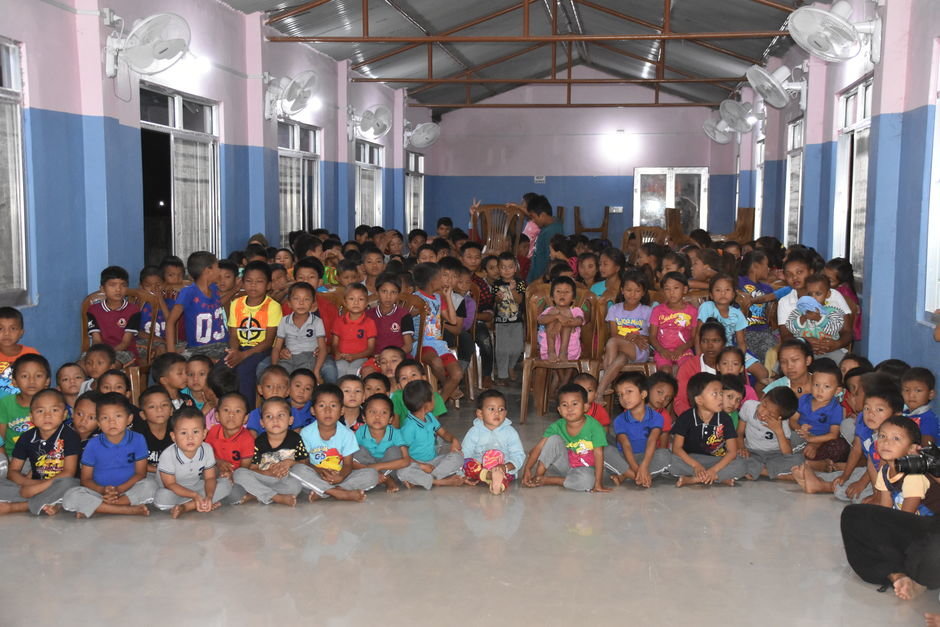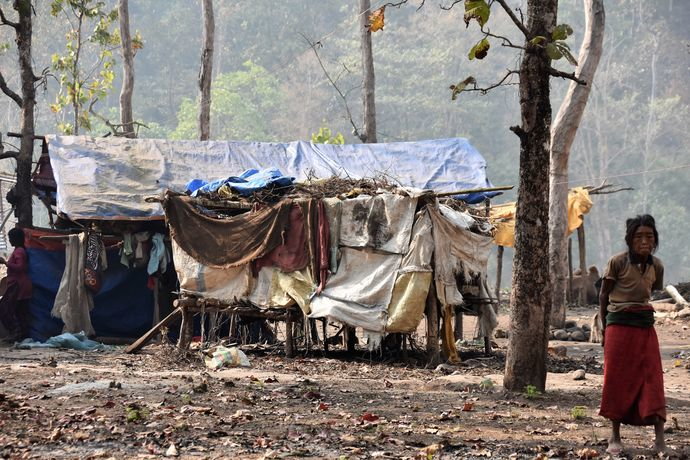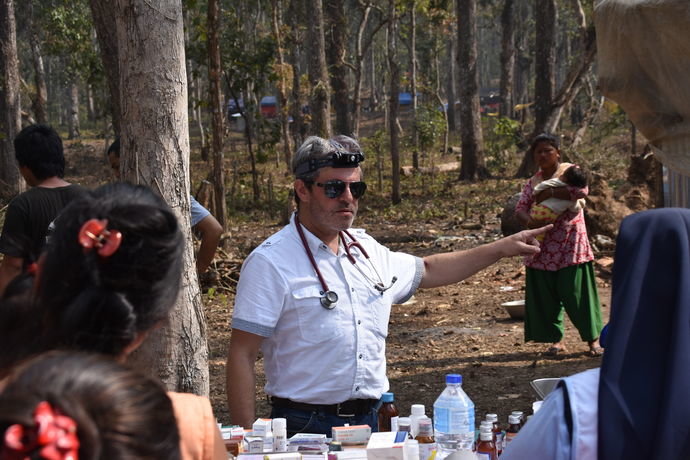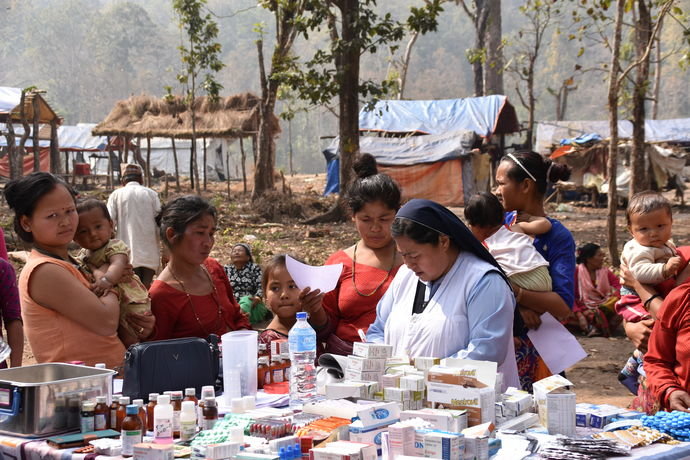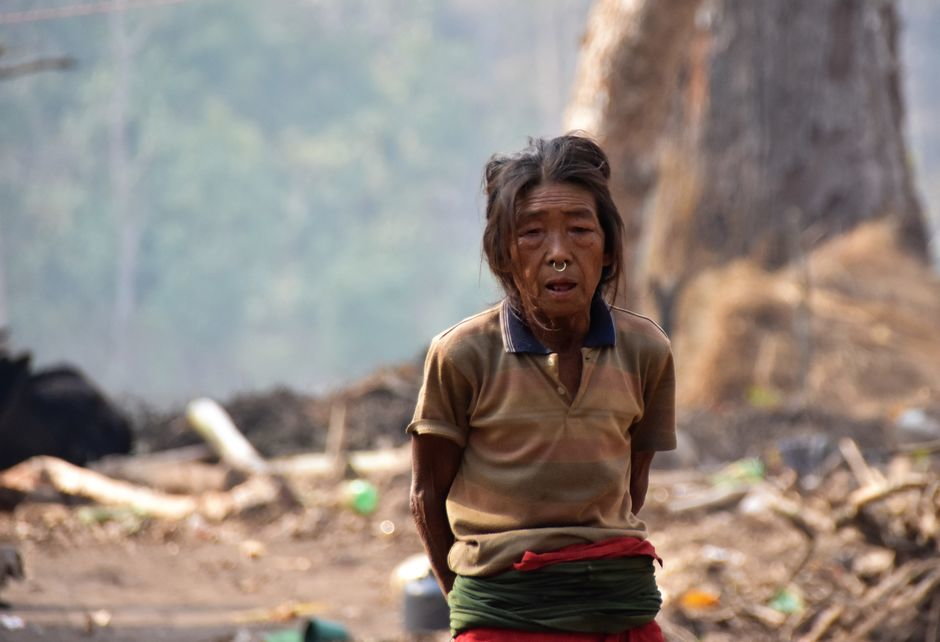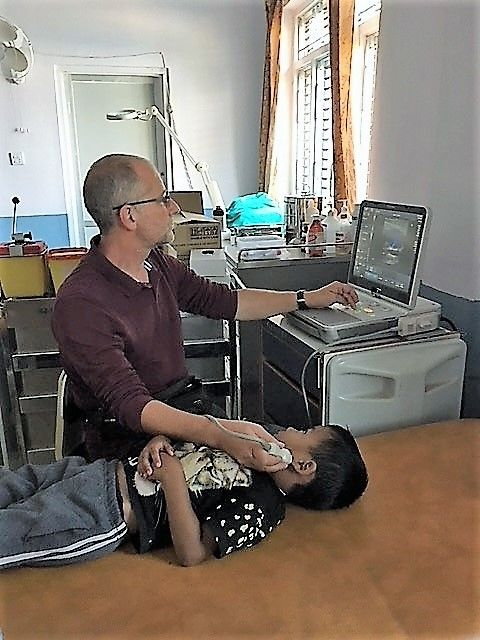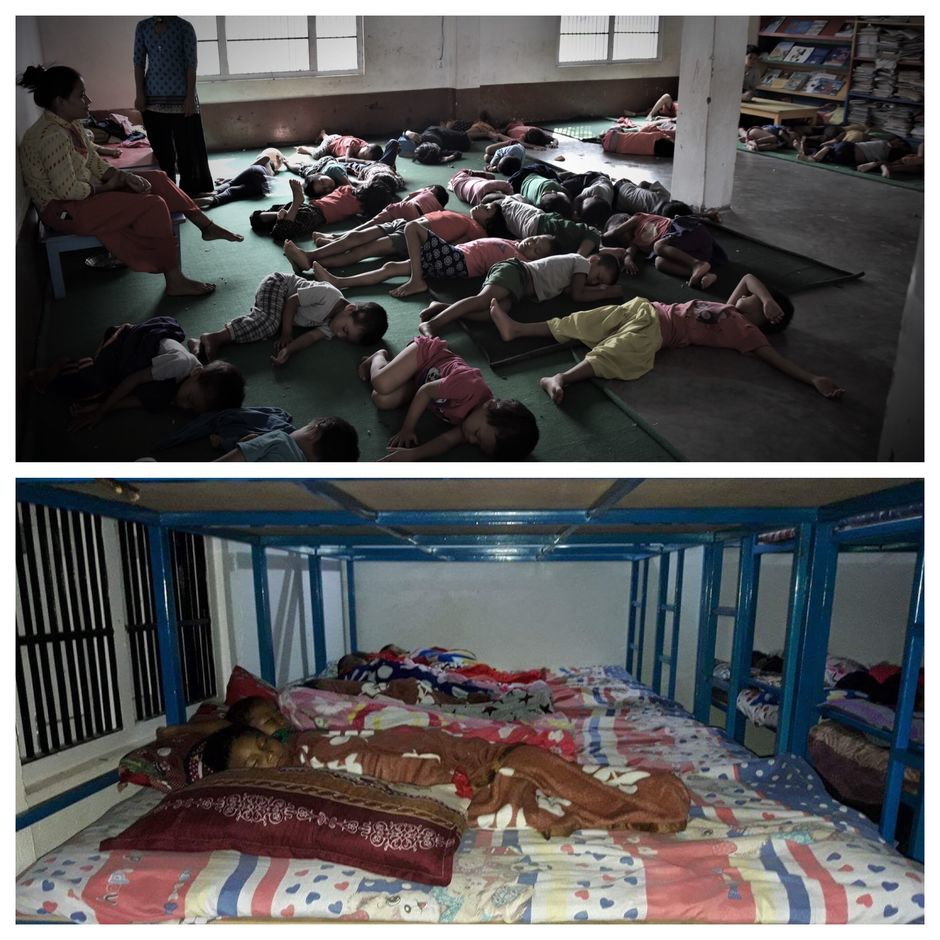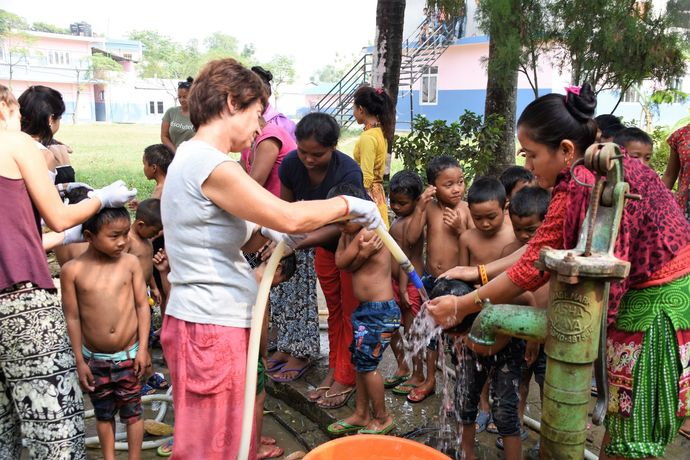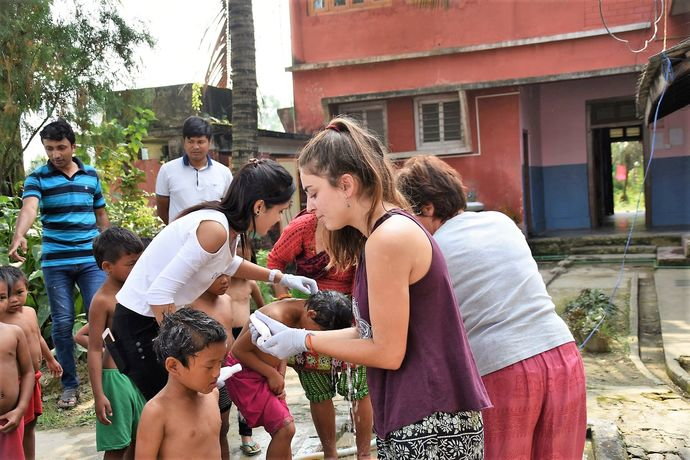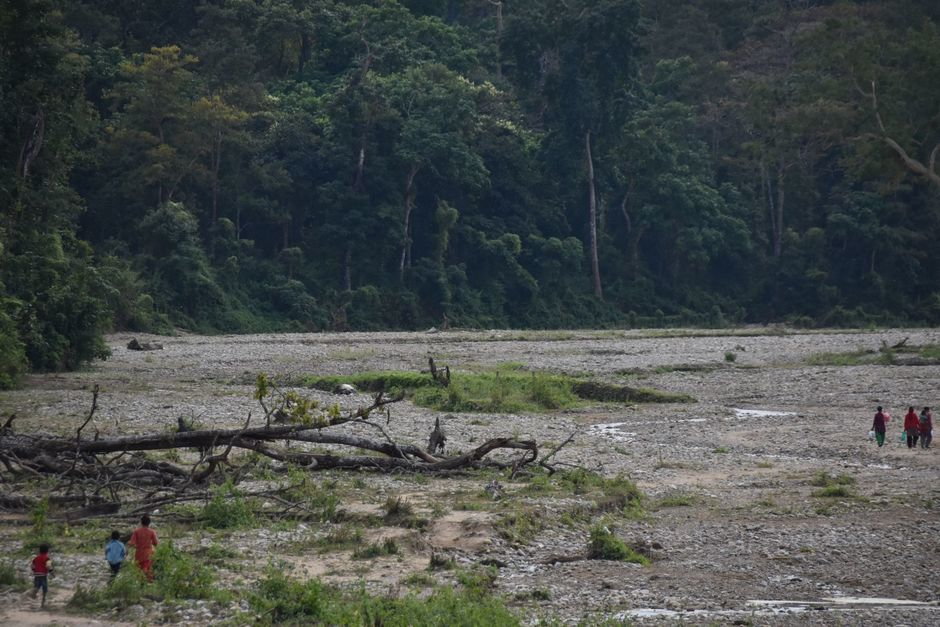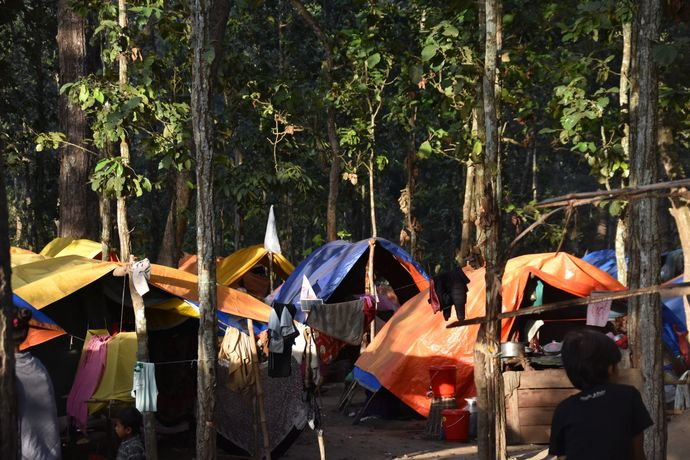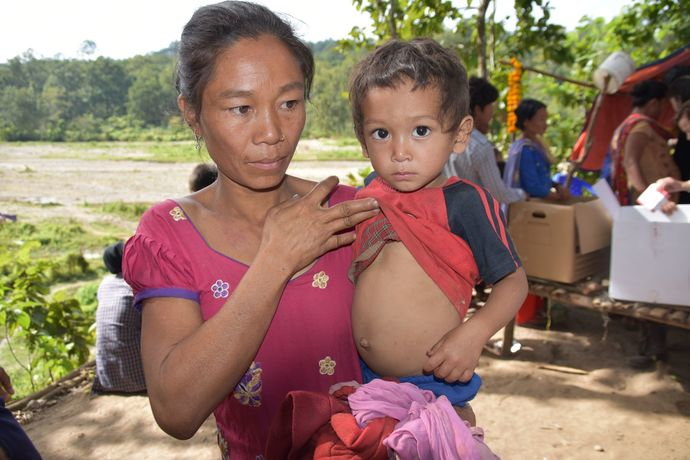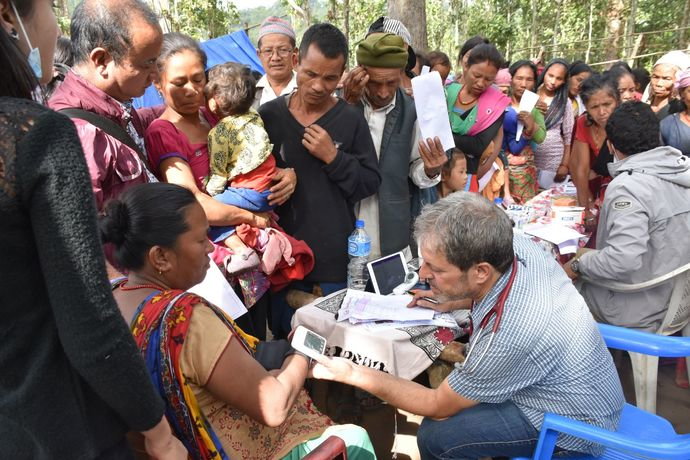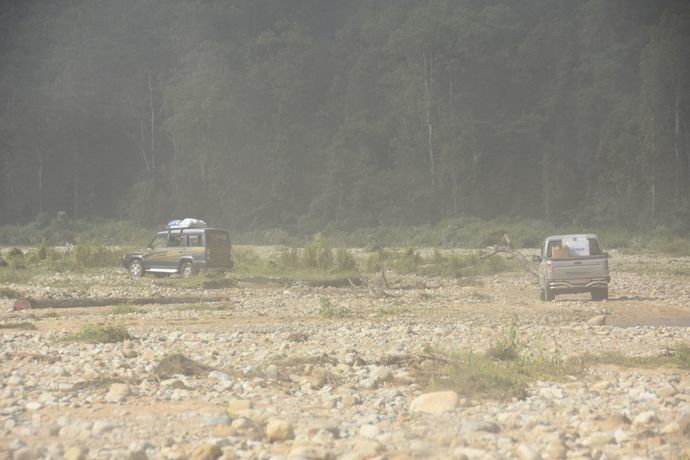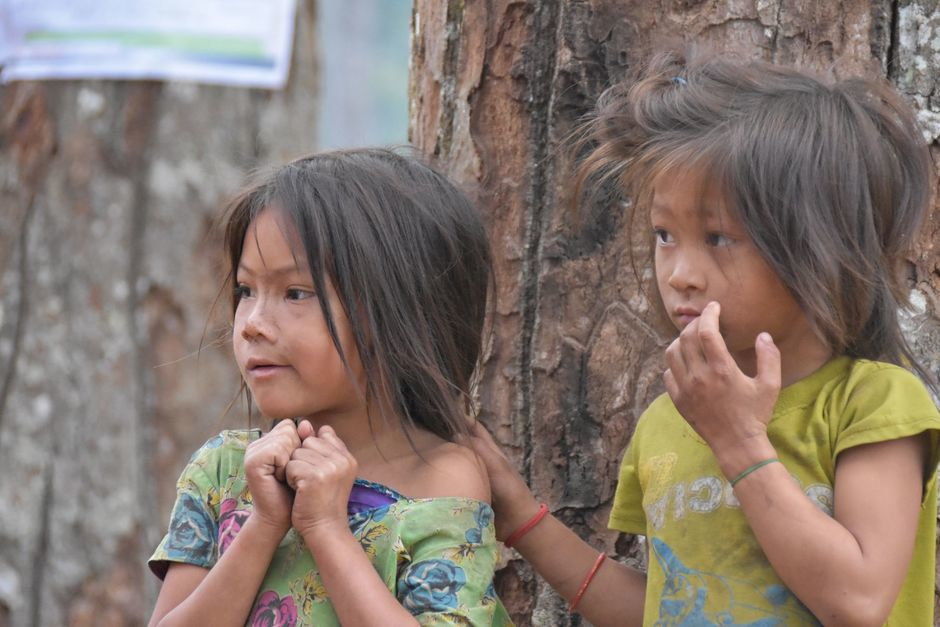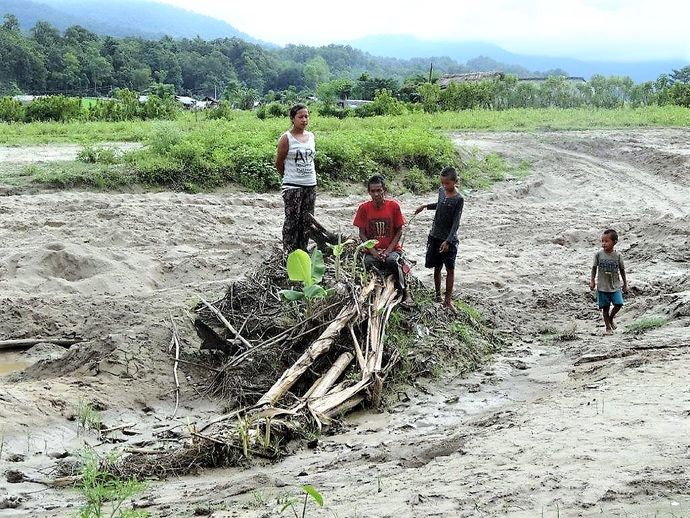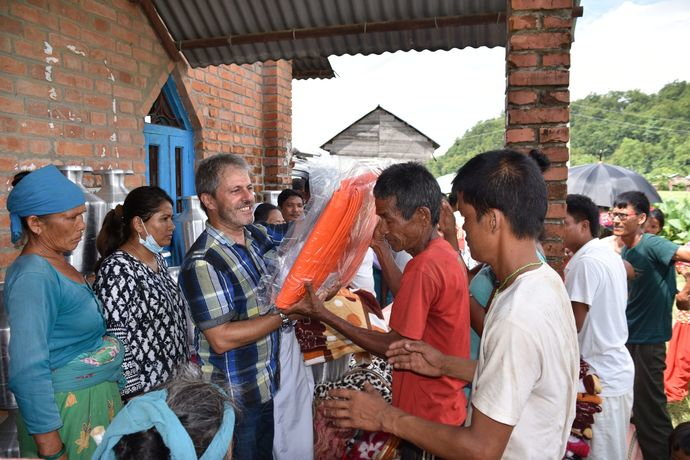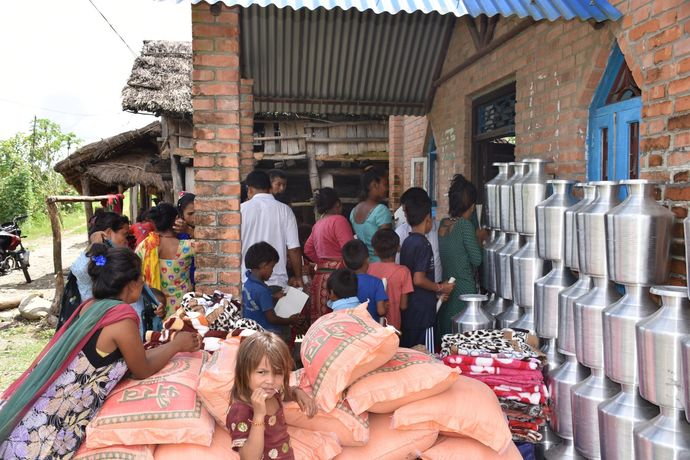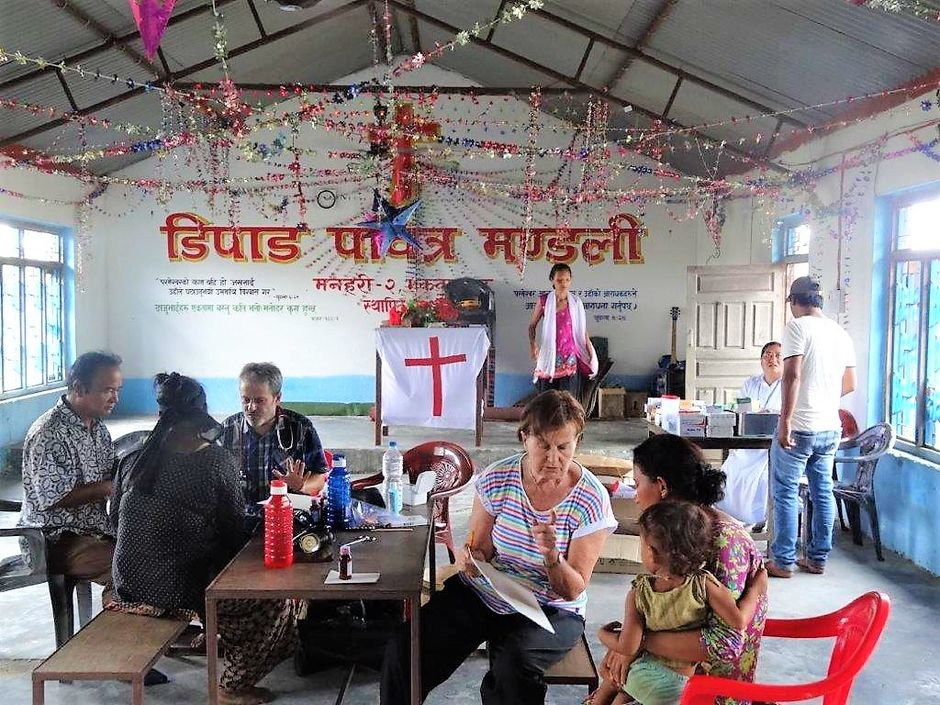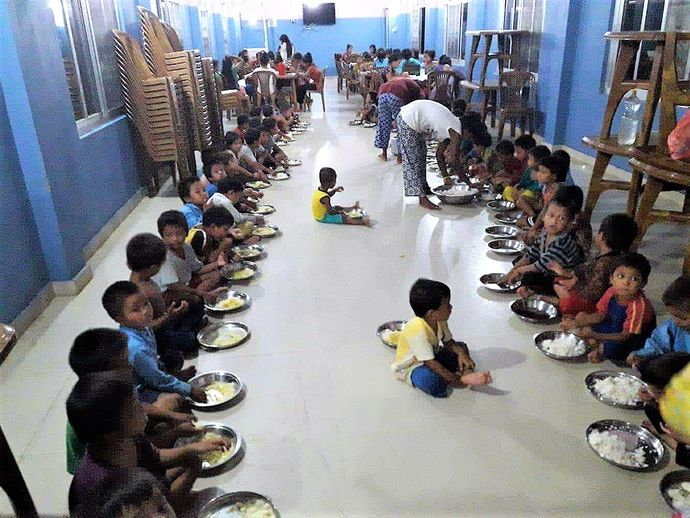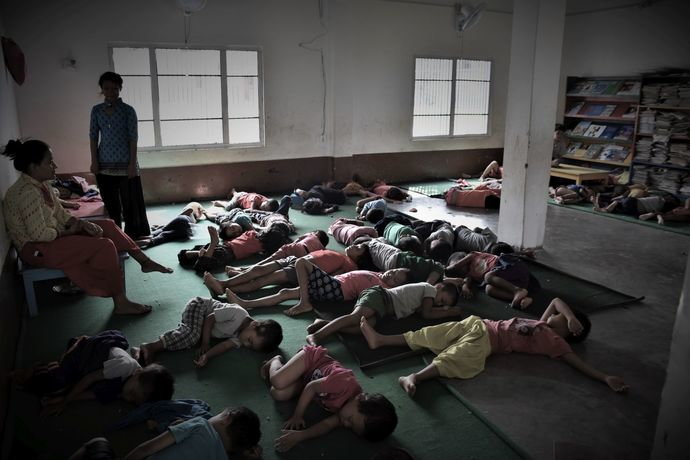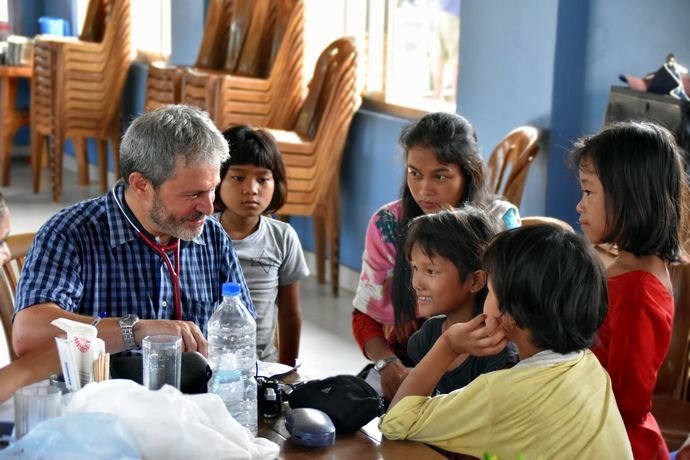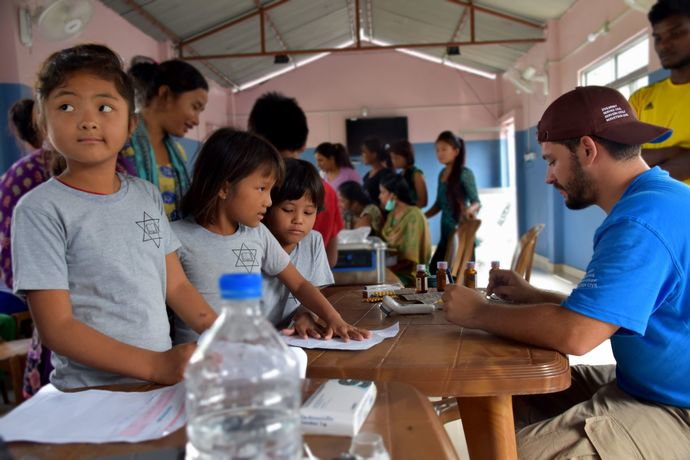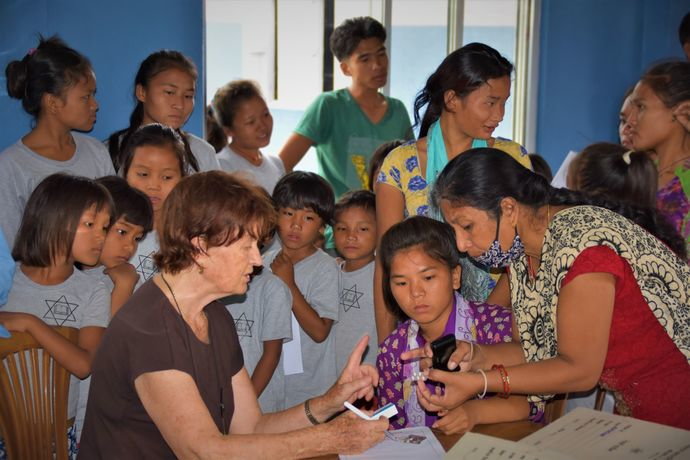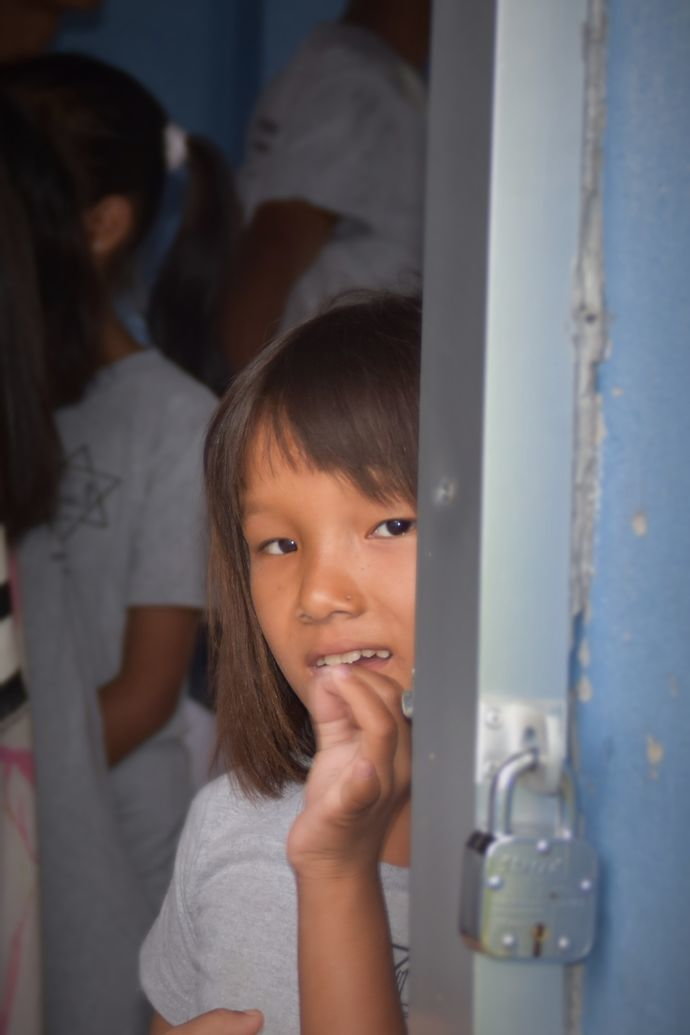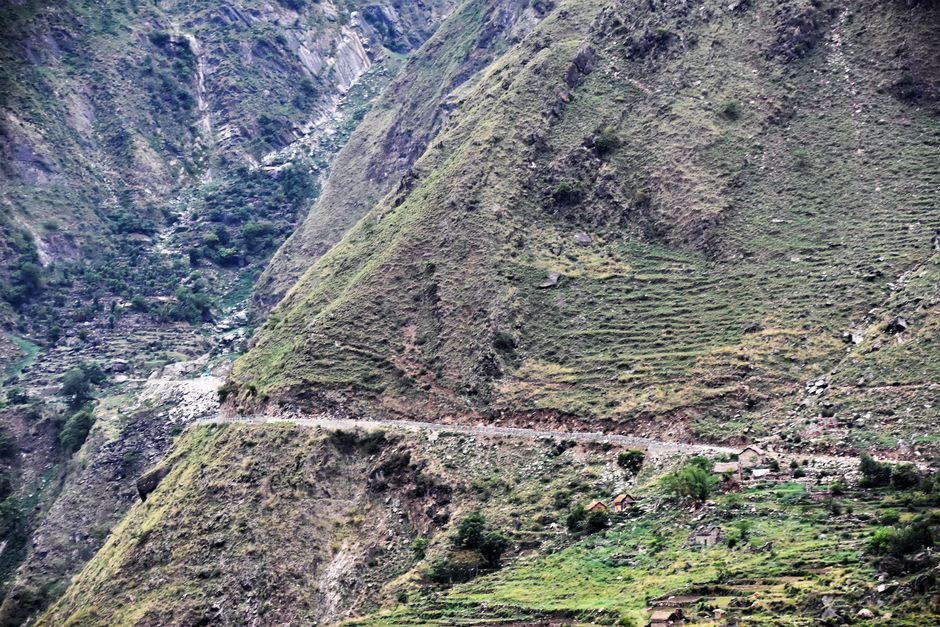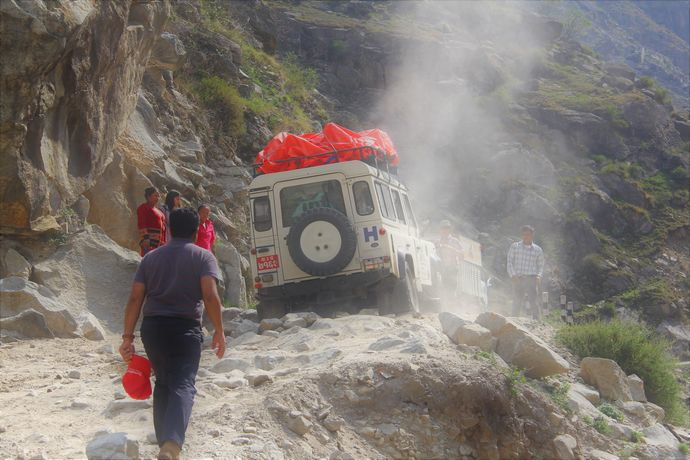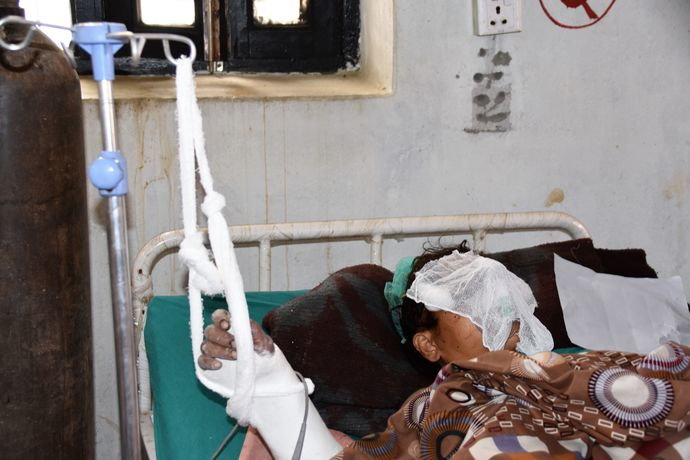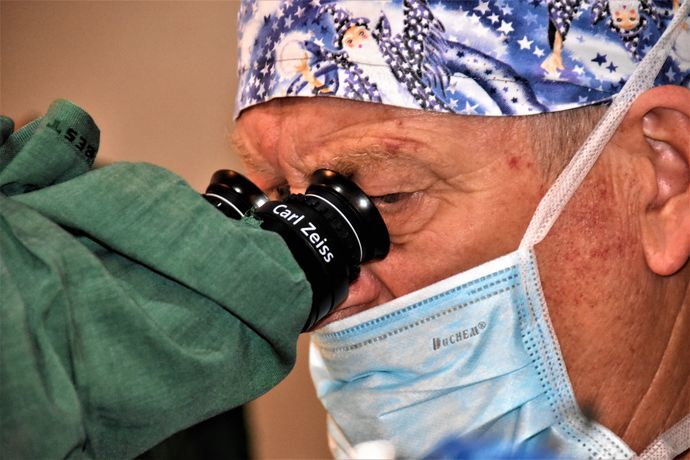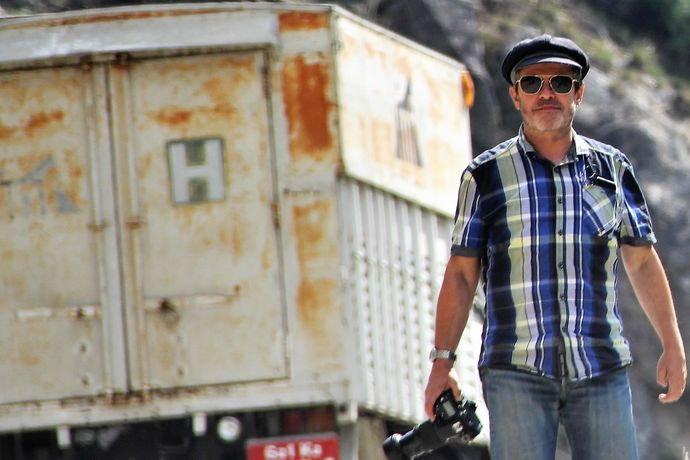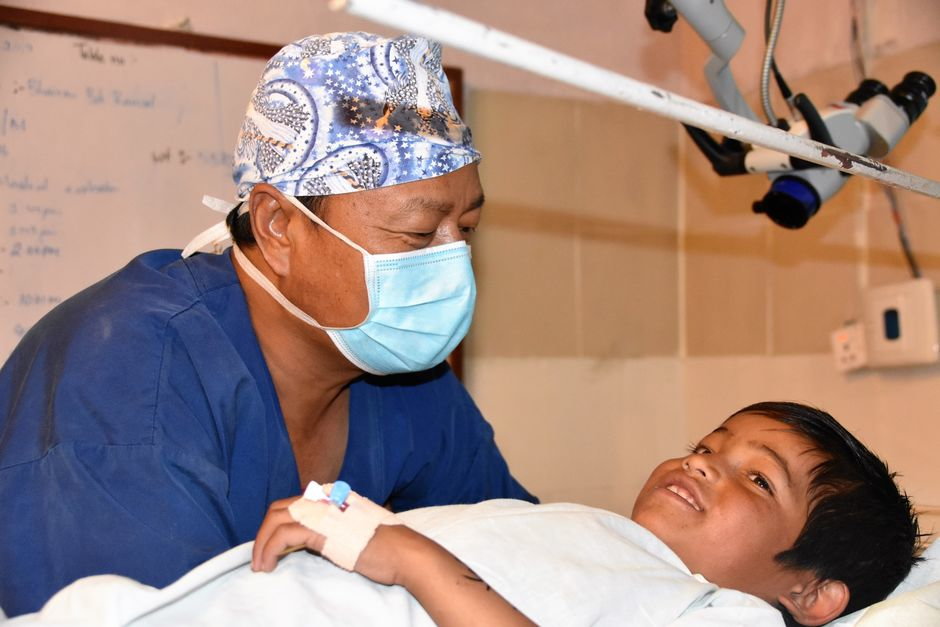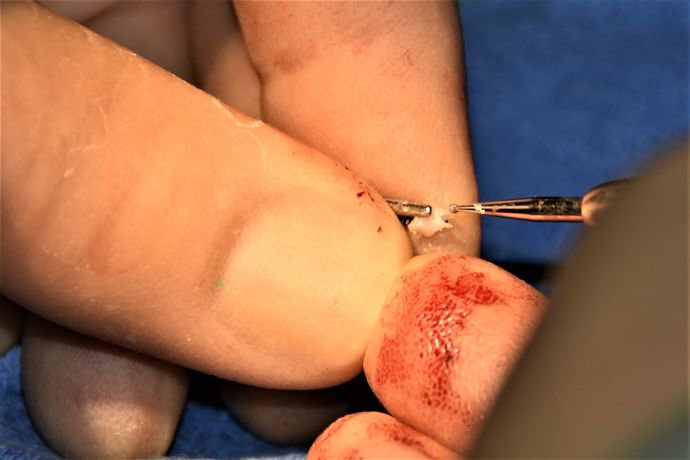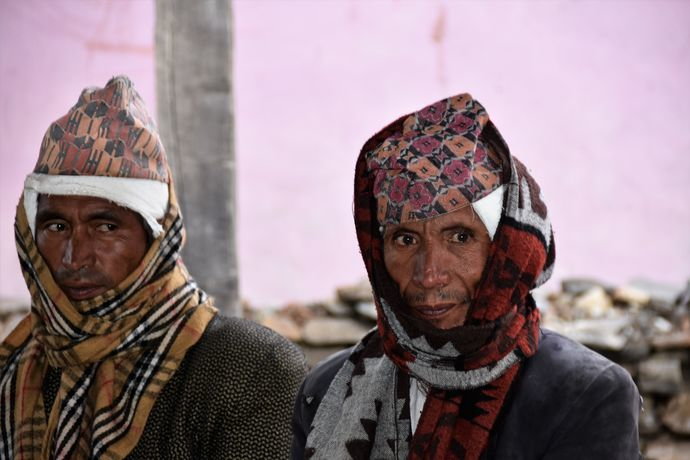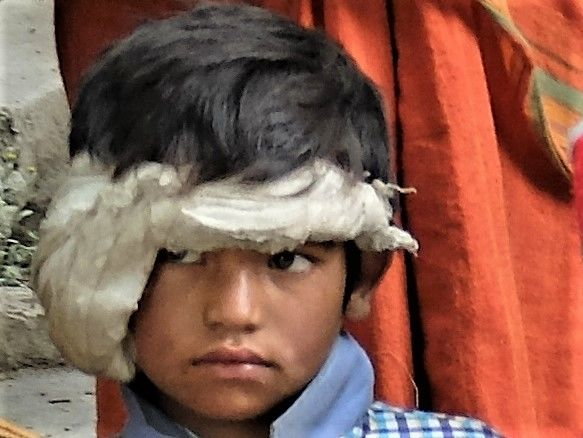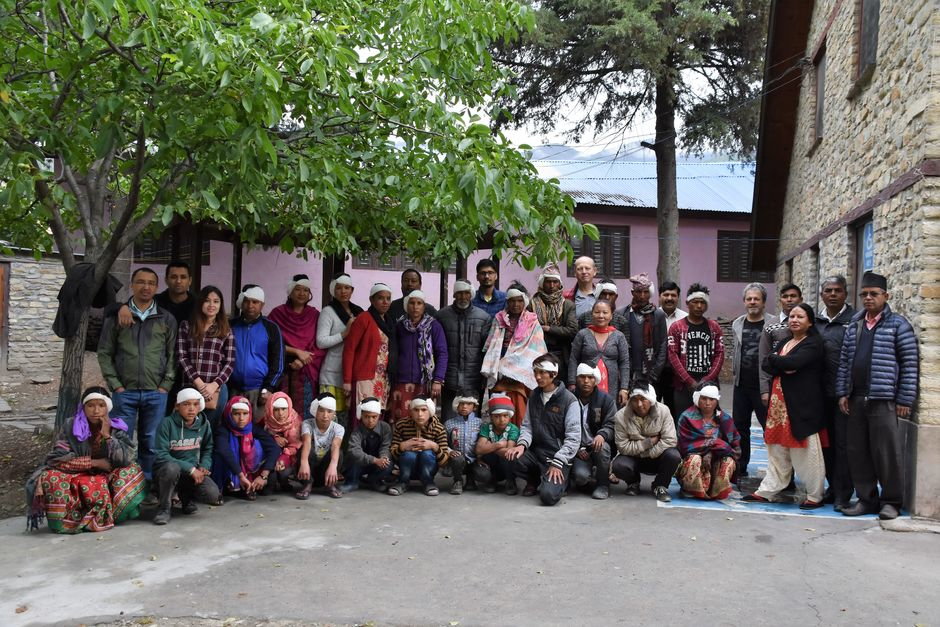Operation reports and activities: This is where we get involved
What wants to give light must accept burning (Viktor Frankl)
Dear Friends of MedInCharge
Nepal is generating negative headlines: in Kathmandu, the charred ruins of department stores and luxury hotels, with piles of burnt-out luxury goods in their forecourts, bear witness to the discontent of the younger generation towards the corrupt ruling elite. This discontent erupted in a bloody uprising in Nepal's capital in September, leading to the fall of the government and a continuing period of political instability in the country.
What wants to give light must accept to burn
Our work does not change the great injustices in Nepal, and certainly not in the world. But it brings some light to fellow human beings who experience only darkness. Here are a few facts that illustrate the effectiveness of our activities.
One sack of rice, 2 kg of lentils and 2 litres of oil cost a total of 2,200 rupees, or around 14 Swiss francs, in Nepal. That is enough to feed a large, destitute Chepang family for a month. A MedInCharge health camp in Nepal with 2 off-road vehicles, all medical equipment, 2 doctors, 2 nurses, 2 assistants and 2 drivers to care for 100 to 150 people costs an average of 400 Swiss francs (2.70 to 4 Swiss francs per person).
A visit to your doctor in Switzerland costs an average of CHF 150 to CHF 300. A US Tomahawk cruise missile costs from CHF 1.5 million and is capable of destroying an oil refinery (this amount could feed a large family in Nepal for 8929 years, and the oil refinery would remain intact).
Seventeen camps, over 2,000 patients examined, and three tons of food deliveries to impoverished Chepang families during our mission in Nepal in October and November testify to the great effectiveness of our investments. Three flat tires, a broken brake disc, and a failed (expensive) four-wheel drive control system on an off-road vehicle during our stay testify to the strain placed on people and equipment during the work.
We have seen that our investments are having an impact! The supply situation in the villages we have been supporting since 2017 has improved significantly. We saw virtually no more malnourished children.
Nirmal Chepang, 10 years old of Kalitar
Nirmal grew up in Khalitar, a remote village with no access to schools or medical care, with five siblings. During the camp, we noticed his walking disability due to a severely malformed right foot.
We were able to convince Nirmal and his mother to come with us to Antyodaya that same evening. At first, Nirmal was fearful and reserved, but after just a few days, we saw him playing happily with the other children. Nirmal was placed in an age-appropriate class and is learning enthusiastically. Thomas Rotach, who accompanied our previous mission as a photographer, has taken on the sponsorship for Nirmal. An initial consultation at a specialist clinic in Kathmandu to correct the foot deformity is planned for the coming weeks.
Imagine this: as a mother, you bring your disabled child, whom you are unable to care for, to a camp, and the next morning your boy wakes up in a boarding school with peers, well cared for.
During our last mission, we were able to stay at our Antyodaya school in the Chitwan district. My friend and school director, Rambabo Chaudhary, has made Antyodaya a place of hope for the children of the Chepang community over the past few years. Here, they not only receive an education, but also food, shelter and care – things that we take for granted, but which are crucial for the children's lives and futures.
Felicitas Cahenzli on a mission with MedInCharge: what will remain after her return?
Felicitas is another young doctor from the Surselva Regional Hospital who accompanied us during our mission to Nepal in October/November 2025. Thomas Rotach was also part of the team as a photographer. He took the pictures in this newsletter.
I asked Felicitas a few questions after her return.
Describe your involvement using three characteristics.
- Anything that works is allowed.
- It pays to listen to your gut feeling.
- Everyone has a story to tell.
What did this mission teach you about life?
a. ... about justice?
I don't know what justice should look like, or who/what decides what is just. But since my return, I have felt an even deeper sense of gratitude for the enormous good fortune and all the opportunities available to me simply because I was born in Switzerland and not somewhere else in the world.
b. … about money ?
Individual prosperity is all well and good, but we can only really enjoy it if the entire population benefits. For example, a mobile phone is only really useful to me if I am in an area where I have access to electricity and the Internet. And for that, measures at the national level are necessary. Ultimately, everyone benefits from better basic services..
c. … about your work as a doctor?
I realised how important personal contact with my patients is to me, listening to them and being able to understand their worries and fears (which was not made any easier by the language barrier in Nepal). I also noticed how angry I feel when I am unable to help patients as much as I would like to. This may be because I do not have the diagnostic or therapeutic resources available locally, or because there is no adequate treatment for their condition.
Was this mission worthwhile?
… for you?
Yes, for me it was worth it. I learned a lot about what is important to me in my work and why I enjoy it. And of course it was also worth it for me because of the many wonderful people I met and the contact with another culture that I was able to experience up close, which would not have been possible as a “normal” tourist.
b. … for the Chepang in Nepal?
I can't say for sure, but I certainly hope so. I was definitely able to identify some patients and refer them to a central hospital for the necessary treatment. And if I was able to help even one of the 1,700 patients, then in my eyes it was worth it.
Tell us about your most striking experience during the mission
I was very impressed by a man suffering from pain and sensory disturbances in his right leg, probably caused by a herniated disc or some other type of spinal cord compression. I gave him an injection of Novalgin, a drug that is part of the basic medication in Switzerland and is often not sufficient to treat back pain. However, this patient returned an hour later, beaming with joy, and thanked me because he was feeling pain relief for the first time in months.
What is a statement that you often heard in Nepal?
«he has knee pain» - Back and joint pain were probably the most common symptoms, which in most cases could naturally be explained by a lifetime of physical labour. Many people can be helped greatly by access to simple painkillers such as paracetamol or ibuprofen, something that is a standard part of our medicine cupboards.
Felicitas Cahenzli, December 2025
Our light in Nepal shines on the dark side of this developing country. By financing schools and basic medical care, we are taking on the tasks of an inadequate government. To stop our support would mean depriving the children in Antyodaya of access to education and their parents in their villages of basic care. We do not want this. We want to keep our light burning.
MedInCharge wishes you a very happy and peaceful holiday season. Fredi (Medical Director), Christine, Anja, Tobias and Cristina Bacchetto (Board MedInCharge)
We are happy to accept donations and sponsorships at:
IBAN CH48 0900 0000 8975 4784 8,
MedInCharge, Chroslenweg 9, 3177 Laupen
We are grateful for every contribution !

Through our operations in the field, we guarantee that your contribution will be used for the intended purpose. All our volunteers in Nepal work free of remuneration and 100% of your donation will be used without deductions to support needy people in Nepal. The administrative costs are carried by the founding family.
Link to our Photo Gallery on our Homepage:· https://www.medincharge.ch/de/photo-gallery.
The only constant in the universe is change (Heraklit)

Dear friends of MedInCharge
It belongs to the great moments of our young organisation when young professionals decide to get involved in our project work. Lena Salcher (27), a young doctor, flew directly from the cosy surroundings of Surselva Regional Hospital in Switzerland to Chitwan in Nepal.
The plan for Lena was to be introduced and accompanied by Sr Miriam, our long-standing head of the local medical team. Unfortunately, Sr Miriam fell seriously ill shortly before Lena's arrival and we had to improvise a lot.
With the support of local friends, the help of Nepalese doctors and the selfless and courageous commitment of Lena, we were able to organise eight health camps in our catchment area of the Chepang population in April. The team treated over 700 sick, destitute Nepalese. These are all people who only receive medical treatment when our emergency services visit the remote villages.
A young doctor on a mission for MedInCharge: this is how Lena Salcher experienced her mission
The mission begins in Pokhara. Sushil picks me up early in the morning. Denise, a nurse, also from South Tyrol, is with me. I met her somewhere at Annapurna Base Camp and she spontaneously decided to accompany me to my first camp. After a three-hour drive, we arrive in Chitwan. Father Michael warmly welcomes us to his Navodaya school, where we will be staying for the first two weeks.
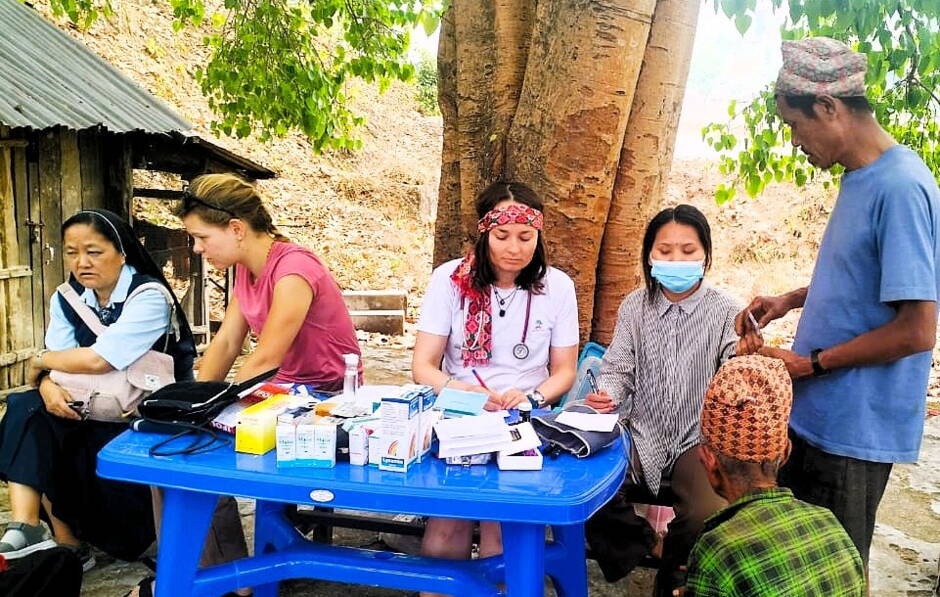
The next day I go to Hetauda to buy the medication I need. Baghwoti, an experienced young Chepang nurse who has already worked with MedInCharge and Fredi, helps me to put together the necessary supplies. Equipped with a large assortment of medicines, we set off for our first camp early the next morning.
The local MedInCharge team accompanies us: Richard and Nirajan are responsible for setting up the camp, admitting patients and organising all the gatherings of people. Then there is Dinesh, our driver, Baghwoti as a nurse and a nun as a translator. Finally, Suman, an incredibly great and competent paediatrician from the regional Ratnanagar hospital. He introduces Denise and me to working under the special conditions of an open-air practice in the mountains of Nepal. Together we realise my incredible first mission. We are warmly welcomed by the villagers with many eloquent speeches and receive a Nepalese scarf as a thank-you gift..
On this day, we examine and treat 104 patients. Afterwards, Denise is so enthusiastic about the project that she decides to stay on and accompany the camps as a volunteer. Every other day we now organise a camp in the Chitwan Mountains or in the jungle in the south of Terai in Nepal. We treat hundreds of needy and poorest Chepang, who are so incredibly grateful for the help. I see many advanced clinical conditions that I have never seen before in Switzerland. Fungal lichen that spreads all over the body, scabies, severe lung diseases or even a hernia as big as a melon.
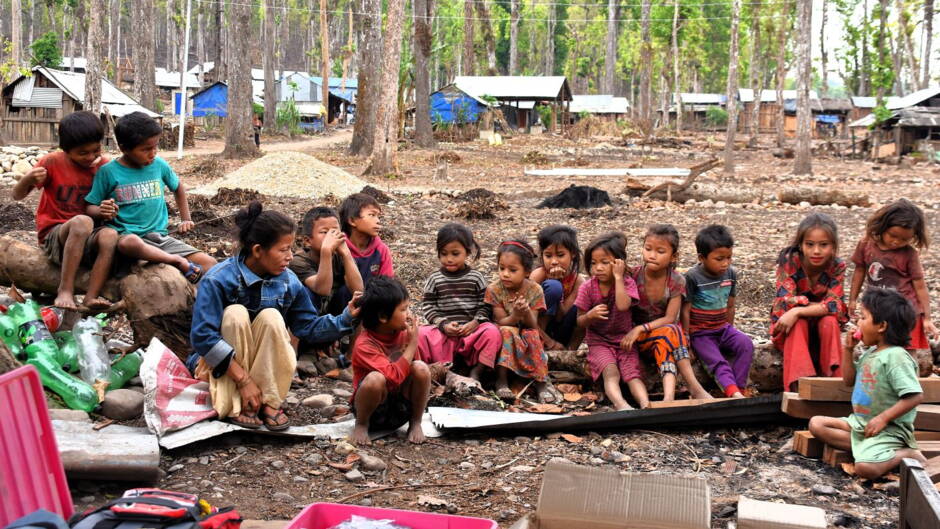
Rambabo's great dream
After two weeks, we visit the Antyodaya Chepang School supported by MedInCharge and are enchanted by the whole concept, the headmaster Rambabo, the staff and the children. We decide to spend the rest of our time in Antyodaya with Rambabo, his family and the school children. The selfless nature, helpfulness and commitment of all the people is simply overwhelming. It is fascinating to see what you can achieve and how much you can do with so little. With a maximum monthly outlay of CHF 50 per head, 250 children are educated here and provided with all-round care, including board and lodging.
Rambabo tells us about a big wish: to build a house where the older children can learn a trade: cooking, floor laying, manual labour, electrical and plumbing work, etc. Additional rooms are needed for this, as all the beds in Antayodaya are ofoccupied by school-age children.
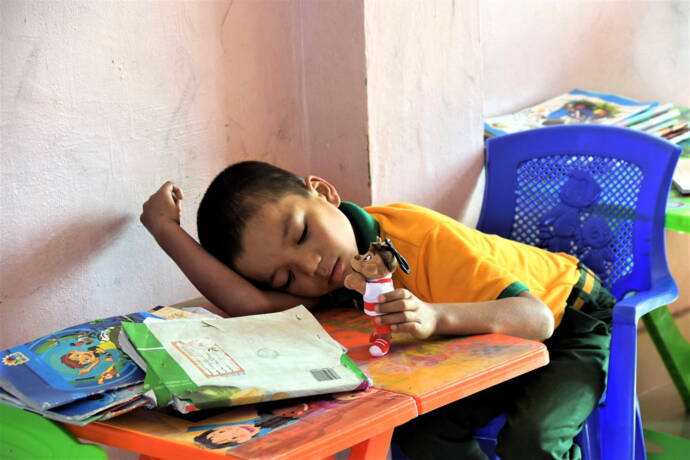
Rambabo has already spoken to local hotels and companies that would help to provide the children with internships. This would give the young people a better chance of finding work and escaping the poverty in which they have been trapped for generations. One area of this new building will be used as accommodation for volunteers so that more people can participate in the project work.
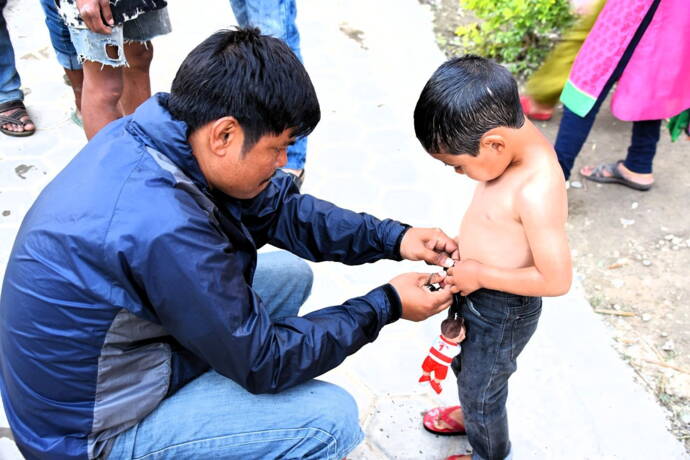
The house is to be built by volunteers. I was so moved by the idea that I want to do everything I can to support it. A project like this cannot be realised without additional money. By happy coincidence, I met Alishma, an architecture student from Kathmandu. She is willing to draw the house free of charge with all the necessary passion. There are so many committed people who are willing to get involved in projects that give children a future outside of
hunger and poverty. I am trying to secure funding for the building through my own initiative. I started a crowdfunding campaign and the fear was there: Can I do it? Will anyone donate? But after a few weeks, the first 3,500 had already been raised.
We need 15,000 francs to get started. I want to return to Nepal in September and start building the house with volunteers. I hope to have secured the finances by then. I will also donate myself and every time I have a birthday and someone asks me what I want, I send them the link. I have everything, I don't need anything. MedInCharge has also agreed to contribute to the costs.

My assignment was a wonderful experience that changed my life, I feel that I can really make a difference with my work here and I have learnt:
‘To remain silent and inactive is to share responsibility"
Lena Salcher
The idealism of youth enables the wisdom of age
(Hans Arndt)
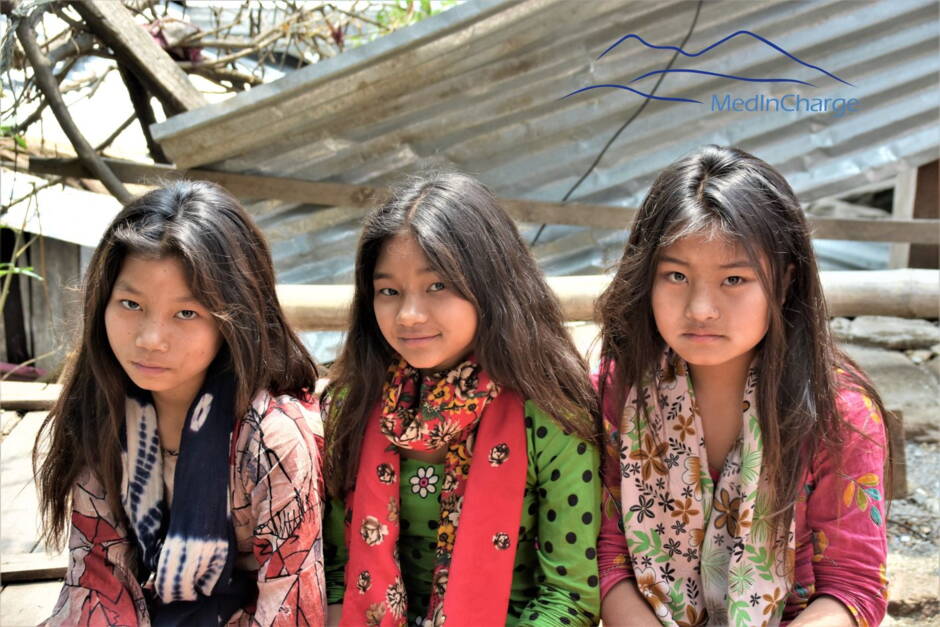
The commitment and idealism of doctor Lena Salcher deserve our full support. We want to try to realise Rambabo and Lena's dream. This is the plan: we are collecting money until the end of the summer. Your donation counts! Alishma draws the building plans and Rambabo obtains the necessary permits. Lena recruits voluntary construction personnel and coordinates the volunteer work. Lena will be back on site in Antyodaya from September. Depending on how the donations come in, she and Rambabo will tackle the detailed planning of the house and its construction. So much for the script.
The wisdom of my age, especially my previous experience in Nepal, tells me that there are still a few considerable hurdles to overcome. But hurdles have never prevented us from starting work, and I will also be rejoining the team in Nepal in mid-October. I will be accompanied by Felicitas Cahenzli, another young doctor from the Surselva Regional Hospital, and Thomas Rotach, a friend and photographer. As a result of the absence of our Sister Miriam, no health camps can be organised over the summer and there will be a great need to catch up on the care of the Chepang settlements. Ideally, we will have two female doctors and one male doctor from Switzerland (Lena, Felicitas, Fredi) on site and, together with our local team (Birsana, Dinesh, Richard, Nirajan), will be well staffed to cope with the expected large amount of work.
Thank you for your loyalty to MedInCharge
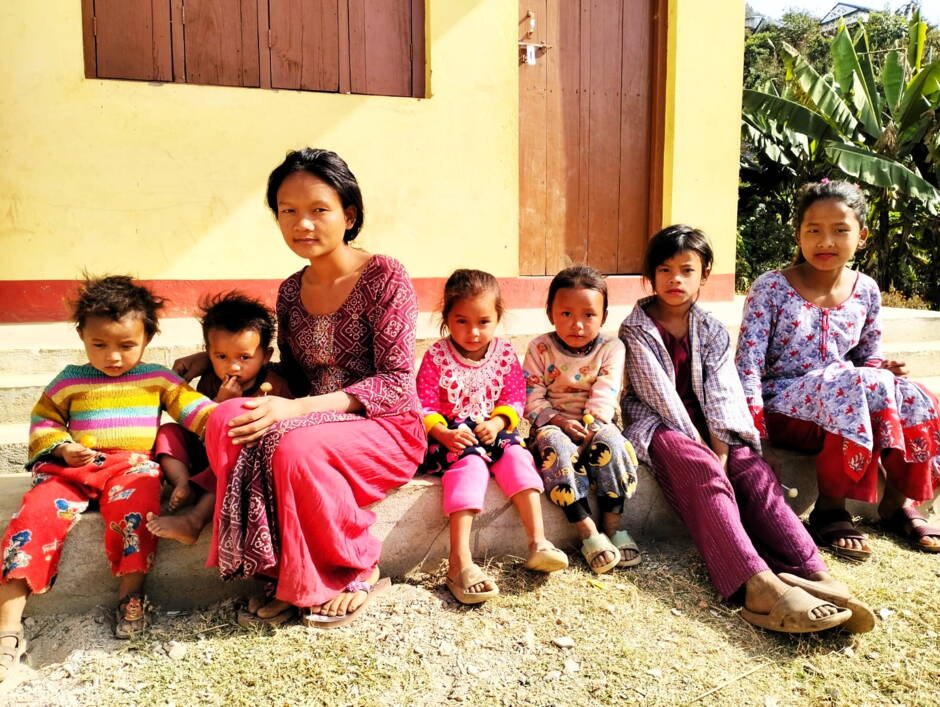
Change is inevitable. MedInCharge wants to direct change in such a way that it brings about progress and improvement. MedInCharge pursues the goal of consciously steering change towards positive developments. We see change as an opportunity to improve existing structures and create new paths. Managing progress requires vision, strategy and the courage to make decisions. MedInCharge works with you to bring about positive change for Nepal's most disadvantaged people. As friends of MedInCharge, you have supported us faithfully for years. You are an indispensable part of our work and we sincerely thank you for that.
Laupen, June 2025
Fredi Bacchetto (President MedInCharge) and Lena Salcher
Help from MedInCharge where it burns
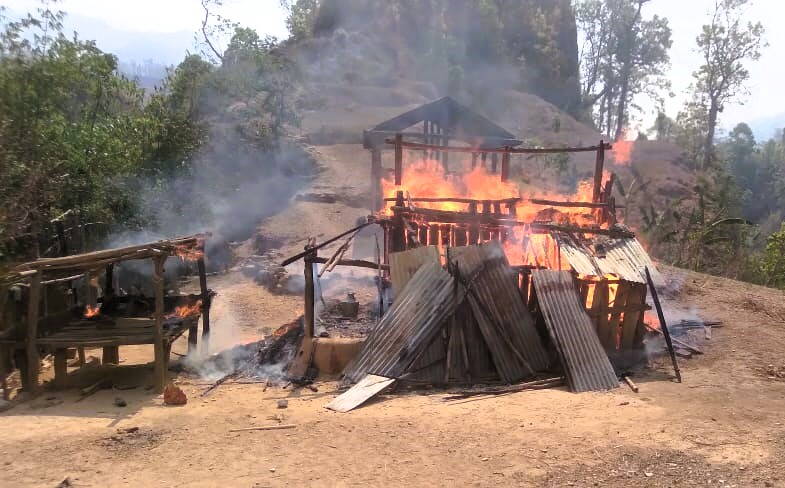
The cooking stoves with open fires in the dwellings of the poor Chepang population are the cause of many serious strokes of fate: In unobserved moments, the poor wooden shacks catch fire and destroy all belongings. Sometimes a child suffers severe burns when it has an epileptic attack sleeping in the cold around the fire Especially women suffer from chronic respiratory diseases because they are exposed to the constant smoke from the cooking places. Providing those affected with the bare necessities of clothing, food and medical care, after strokes of fate, is one of MedInCharge's many tasks.
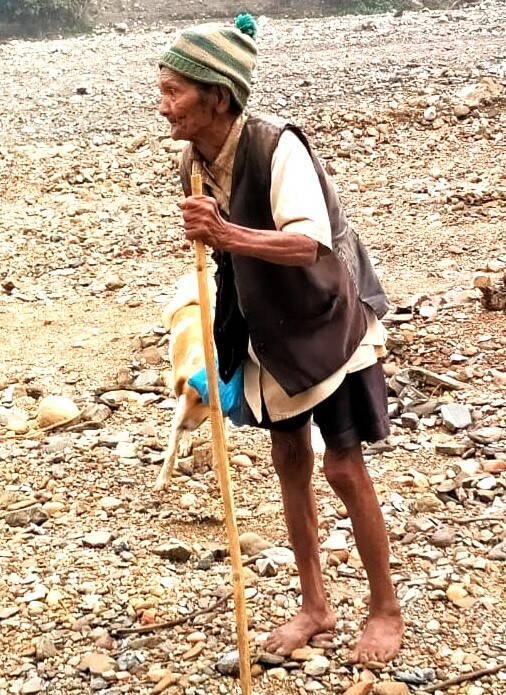
Nepal was just beginning to recover from the consequences of the Covid pandemic when the war in Ukraine caused the prices of daily goods in the country to explode. The increased expenditure on food, gas and fuel is placing a significant additional burden on our budget to maintain the Antyodaya Chepang School and to supply the Chepang settlements. Solidarity with our fellow human beings in Nepal, 8,000 kilometres away, is needed more than ever.
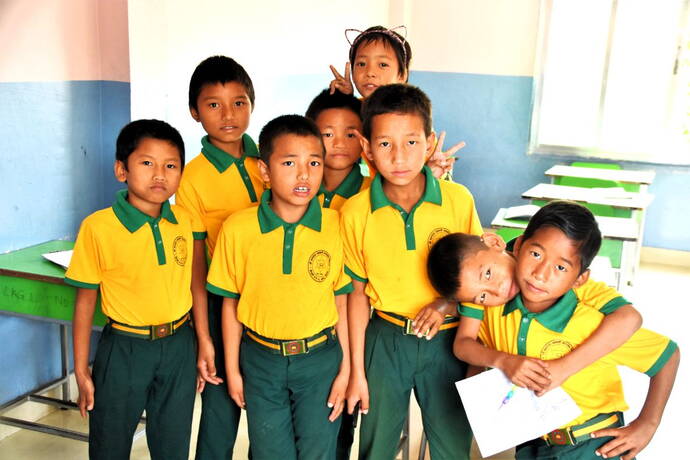
MedInCharge ciation has now completed its sixth year of operation. We are satisfied with the results achieved. The number of places in the Antyodaya School was increased by more than 50 and now offers education, medical care, food and lodging to 250 Chepang children from poorest backgrounds. Sr Miriam's team continuously provides medical and nutritional support to around 2,000 families in two dozen Chepang settlements in southern Nepal.
Everything is possible because of you, dear friends. We cannot emphasise enough how fortunate we are to have your valuable sponsorships, which you keep running silently and steadily. They form the backbone of a great hope for 250 children in Antyodaya.
How to continue with MedInCharge or the question of the sustainability of our investments
With about 120,000 Swiss francs, we could expand the Antyodaya Chepang School by a hundred places. The board of MIC has thoroughly considered the question of whether our association should strive for expansion or preserve what has been achieved. One hundred more school places would mean additional maintenance costs of CHF 4,000 - 5,000 per month. Antyodaya is almost completely dependent on donations from MIC and this dependency grows with every new school place.
We have to accept our limits
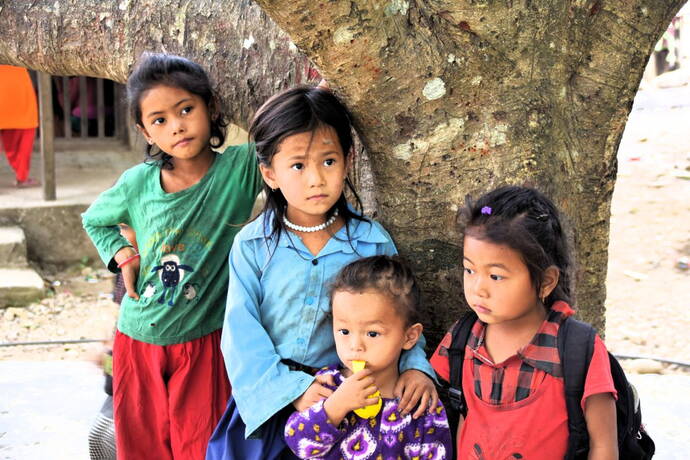
We are in a big dilemma. Every place in Antyodaya offers a child in Nepal a chance to escape its boundless poverty. At the same time, it is our duty to ensure the school's continued existence in the long term. The one-sided dependence of the school on our small association MedInCharge worries us. If MIC should one day no longer be able to guarantee finacial
inflows, the school operation would collapse and the many children would be out on the street again. For these reasons, we have decided not to expand the school until the financing for this step is secured in the long term. About half of Antyodaya's operating expenses are secured through your sponsorships. This is the most important pillar on which the school stands. The rest of the expenses are covered by your spontanous donations to MIC. We sincerely hope that we can continue to count on your faithful support.
As a small association, MedInCharge cannot play with a big ladle on the world stage. With our work, we care for people who have always been exposed to unspeakable deprivation, locally limited but extremely effectively. All MedInCharge board members and volunteers work for free. 100% of the donations flow into the project work and directly reach the needy people of Nepal. The relatively small administrative costs are borne by the founding family.
The Bacchetto family sincerely wishes you a sunny and happy summer season.
Fredi, Christine, Anja, Tobias, Cristina Bacchetto
We must not lose faith in the good
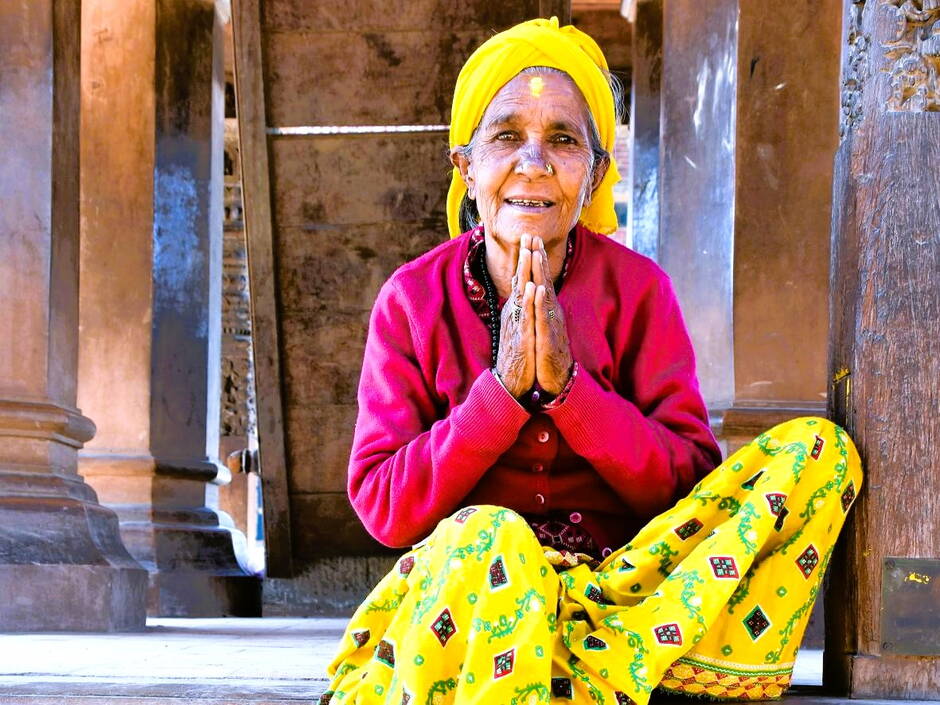
Concentrated information on wars, crises and disasters reaches us through all channels. Many of them are on our screens every day. Others are less mentioned because we are not directly involved or because they have been going on for so long that we have become accustomed to them. Over time, we apathetically classify these as normal on our planet.
MedInCharge engages in places that are less on the public eye, where immeasurable misery and poverty seem to have always existed. In the face of this continuing situation, it is important not to lose faith in the positive impact of our involvement.
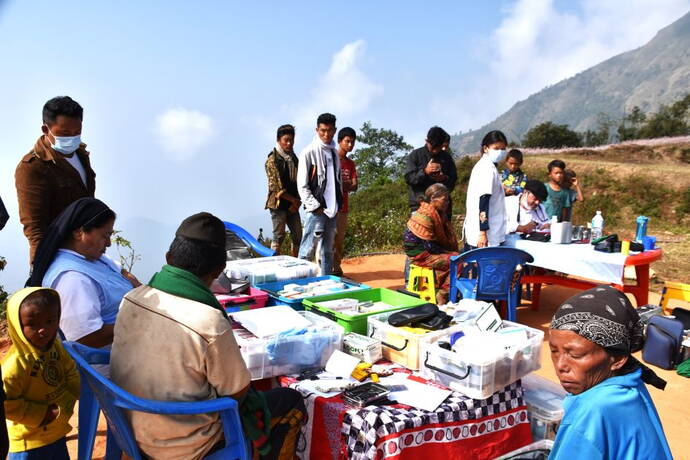
I consider myself religious, in the sense of a person who believes in the basic good of life. This good is predetermined and endures as long as we as individuals do not oppose it. This good is perhaps what the churches call God. This way of looking at things is probably too simple, but it helps in many desperate situations. As long as I am able to believe in a good predestined end, nothing can seriously destabilise me. A good end, someday, but universal as a sense of the divinely predetermined universe.
Building bridges over the deepest chasms of suffering
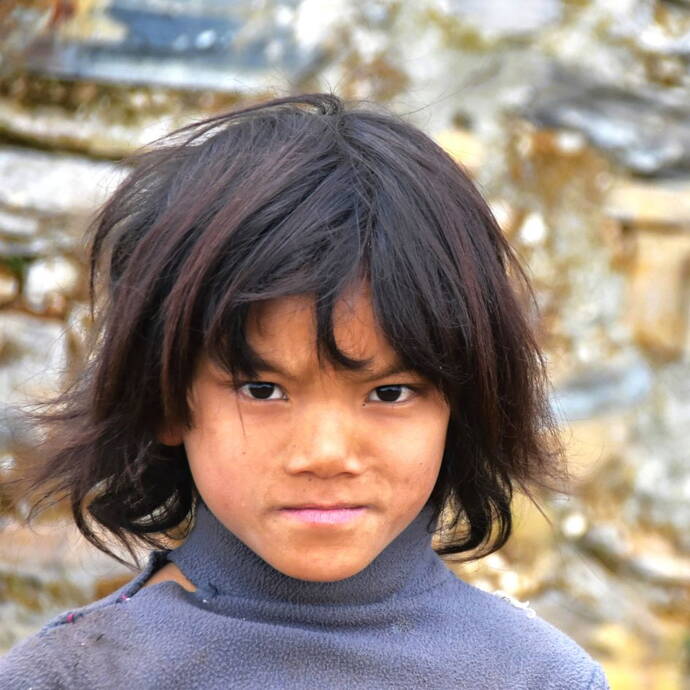
In the face of so much disease, suffering and death in Nepal, I see my role as often being reduced to assisting people and trying to build bridges over the abyss with them. Bridges to the better, to the good in life, wherever we look for that goal. Sometimes I have to leave families and children in misery and objectively assess how far we can go. Sometimes professional conscience demands that I, as a doctor, have the courage to say: enough is enough. This is all we can offer. This has to be enough. Sometimes all we can offer is a pray
with our patients and ask for the serenity to bear the things we cannot change
Death as a process of the good in life?
One thing is certain: the end always comes in the same form for each and every one of us. As a doctor in my final year of training, it was once out of the question for me to accept death as a good thing. Forty years of medical practice have fundamentally changed my professional attitude towards the end of our lives: Is it not a contradiction in terms that I now regard death as a point of good in life? As soon as we consider life as a global miracle, as a continuous process that is detached from the biological existence of each individual, this death takes on a completely different meaning. Without death, life is not possible. It represents the intermediate step we have taken since life appeared on our planet about 2.5
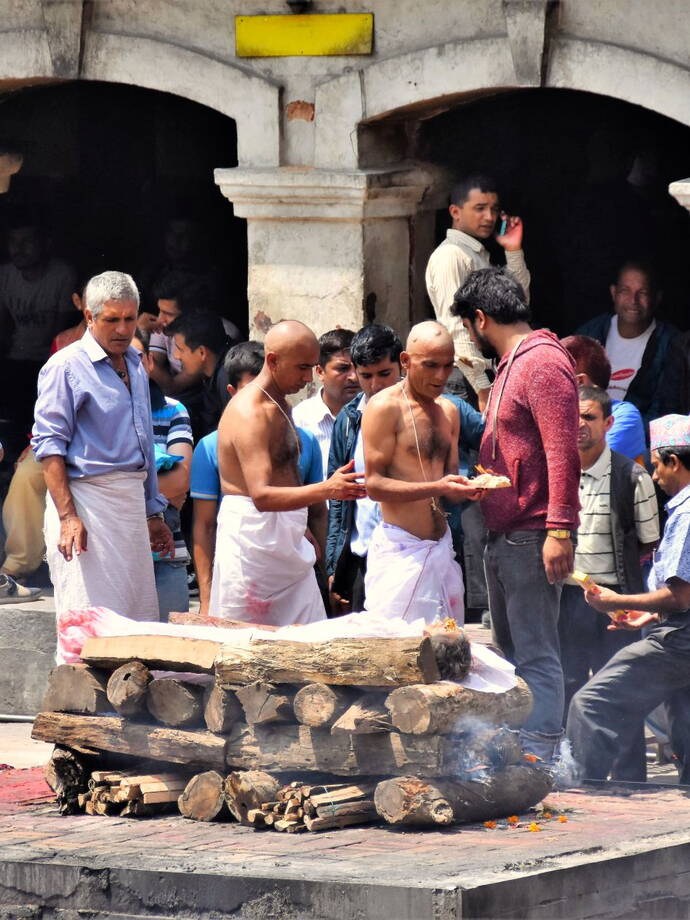
billion years ago to preserve the higher system.
The indescribable divine rules are expressed in our earthly existence. In Nepal, I am learning once again to bow before it with great humility. Medical facts force us to kneel down and come back to reality. In this country, it shows unequivocally how little influence man, with his medicine, can have on our existence.
We will forever be part of the firmament
When I am in great doubt and don't know what to do, I go out and look into the darkness of the night: there is something extraordinarily liberating about looking into the night sky. It reminds us that we are forever part of this indescribably beautiful Milky Way and that no death can take it away. There is so much more than our flickering existence on this planet. To have this confidence is both a faith and a resilience that allows us to exist in life.
It is likely that we will all have to tighten our belts a little this Christmas season. The question is whether there is not enough left in our pockets to do something good outside our immediate environment. A donation to our association will always help.
Our family, the members of the association's committee, wishes you a relaxing and peaceful holiday season
Fredi, Christine, Anja, Tobias, Cristina Bacchetto
High tech saves lives in health camps on the margins of civilisation in Nepal
The Butterfly IQ+ is a little marvel of technology: a very powerful ultrasound device has been packed into a box no bigger than a medium-sized razor. It can be connected to any conventional tablet or smartphone and provides images that have already had a decisive impact on many fates in the remote villages of the Chepang communities supported by MedInCharge. Pregnancy progress can be monitored and women can be referred to a central hospital in time if problems arise. Diseases of the liver and biliary tract, kidneys and urinary tract, gynaecology and many others can be identified and treated in a targeted manner.
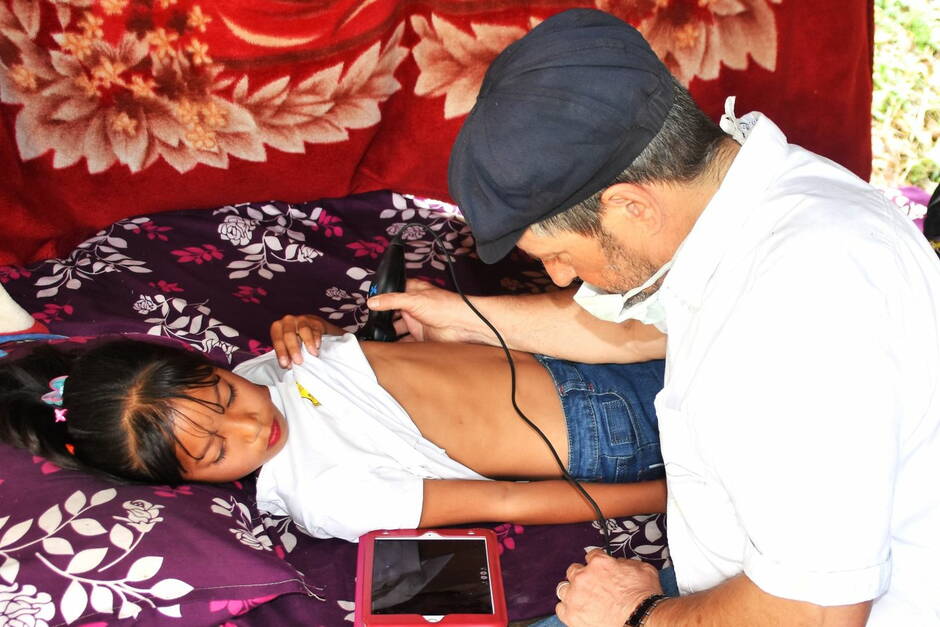
Especially in cardiology, the Butterfly IQ+ has repeatedly proven to save lives
The stories of Sumina and Nirjala are brief examples. Nirjala is 9 years old and Sumina 11 years old. Both girls live in remote villages in the mountains of Makwanpur district in southern Nepal. With the help of the ultrasound device, I was able to diagnose a heart defect with a large open connection between the left and right circulatory system in both children, which leads to a significantly shortened life expectancy. Only the subsequent examination at the "Shahid Gangalal National Heart Centre" in Kathmandu brought clarity and help.
While Nirjala's problem could be solved by heart surgery, Sumina's condition is so far advanced that surgery is not possible at the moment. We are therefore first trying to improve the circulatory situation with medication in order to make the girl fit for surgery. Without surgery, Sumina's life expectancy is limited to about 25 years.
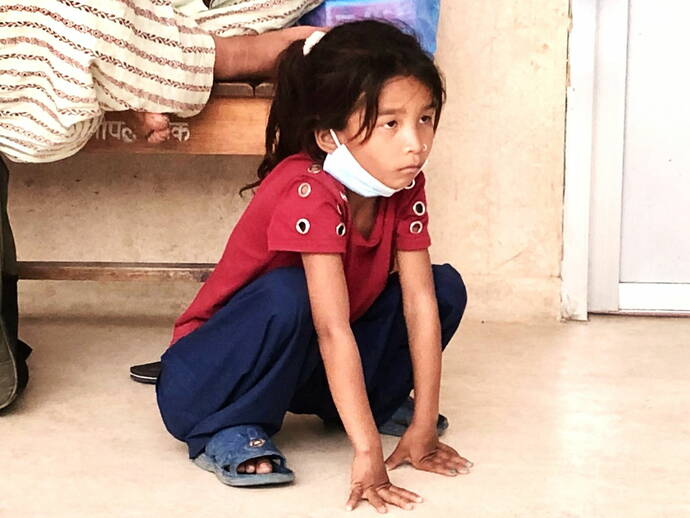
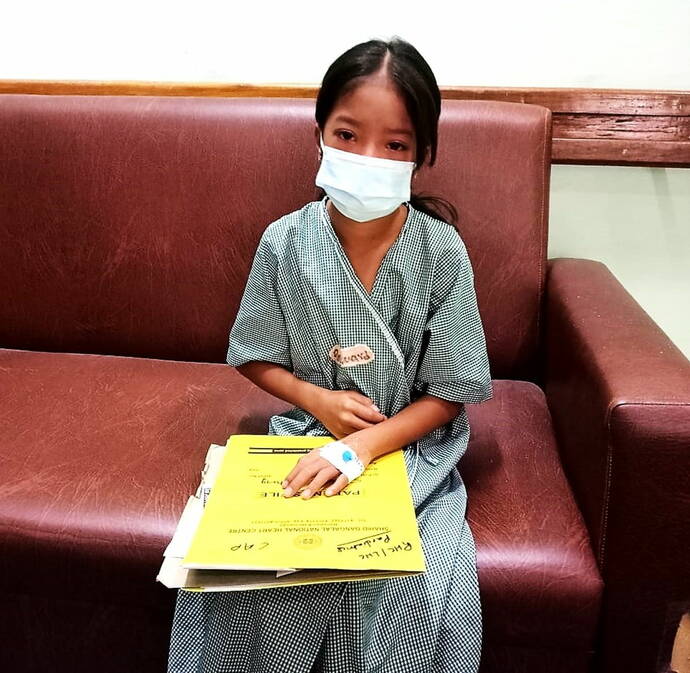
High tech is moving into our everyday medical life on a broad front in the field work in Nepal: My stethoscope transmits the heart sounds acoustically amplified to the ears and visualises them on the tablet, the blood pressure monitor is able to display not only the blood pressure values but also a simple ECG (heart flow measurement) on the IPad and the common middle ear diseases can be digitally documented with a special attachment on the IPhone and exchanged with specialist colleagues.
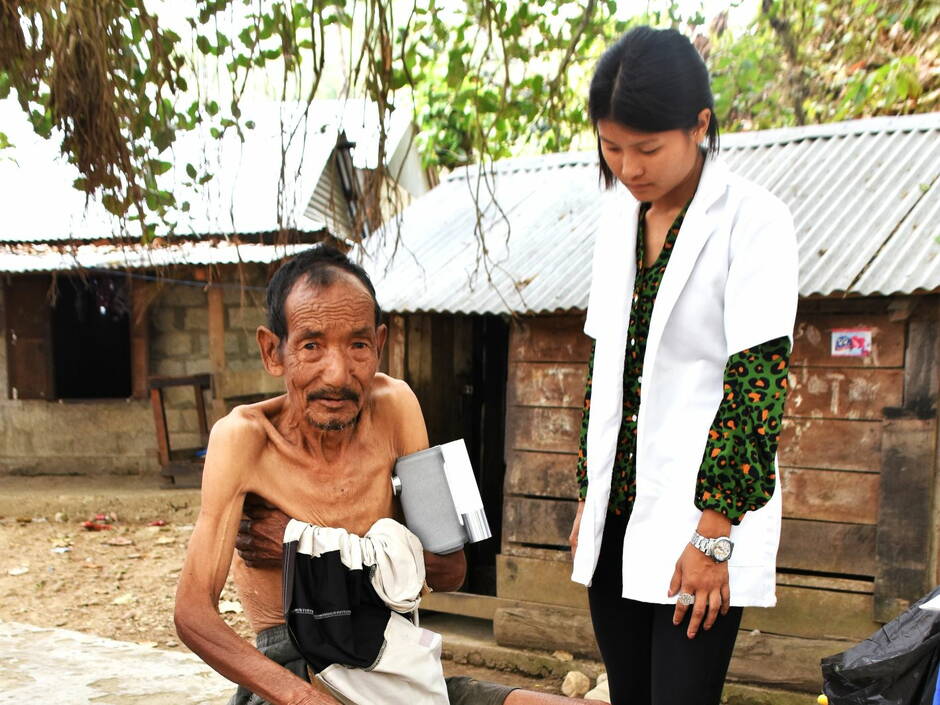
The purchase of this expensive equipment is not financed from the association's budget, but is contributed by me as project leader. Your donations are reserved without deductions for the direct financing of aid for the Chepang ethnic group in Nepal.
Our projects in Nepal are running well and according to plan. The Antyodaya Chepang School is filled to capacity with 240 students. Our partner team in Nepal, led by Sr. Miriam, regularly conducts health camps in the Chepang settlements. My next mission in Nepal is planned for November 2022.
The need remains great and our work is only possible through your faithful and irreplaceable support. For this we thank you sincerely and from the bottom of our hearts.
Fredi Bacchetto,
President MedInCharge
On September 2022
The poor Chepang of Nepal remain in the focus of MedInCharge
In our latest short newsletter you will find a series of children's profiles taken during my last two stays in Nepal. I captured many thoughtful, often sad, and in any case many serious looks, but was also able to elicit a smile from the children from time to time. They are children of the Chepang communities (occasionally also of the Tamang ethnic group) of Nepal. Thanks to your loyal sponsorships and donations, we are able to provide them with schooling and holistic care in the Antyodaya School in Chitwan, far away from the great poverty in their home villages.
Help to fund the children's education
At Antyodaya School, we only accept children from deprived Chepang communities who either have no parents or cannot attend a school for geographical reasons. The demand for places in our school is enormous and far exceeds our capacity. We have therefore occupied the school with the maximum possible number of beds of 240 from the new school year. This is done by utilising and expanding all previously unused rooms. For 2023, we are preparing a project to expand the school by another 60 places.
Heartfelt Thanks !
Your loyal sponsorships are the most valuable support we can receive. Independent of spontaneous donations, we use them to secure accommodation, food, clothing, teachers' salaries and medical care for mentioned children who would otherwise be denied access to education. An expansion of this form of contribution is necessary to secure the operation of the school in the long term. We are grateful for every form of contribution, especially at a time when many people understandably have other priorities due to the war.
The family Bacchetto sincerely wishes you, as Board of the Association, a wonderful and relaxing summer season.
Fredi Bacchetto,
President MedInCharge
on July 2022
MedInCharge in its fifth year
Dear friends of MedInCharge
Do you like the group photo above? It is the children in Antyodaya and you will find me in the middle of the happy crowd of children, taken on 19 March 2022 in the school playground.I am writing this newsletter in midsummer temperatures around 37 degrees in Nepal's Chitwan, where I have been again since mid-March. The Antyodaya Chepang School is back in full operation after a long lockdown. We continue to organise health camps with the well-established team in remote Chepang settlements on an almost daily basis. After the painful pandemic period, MedInCharge's fifth year of operation got off to a conciliatory start.
The war in Europe is bringing suffering to our doorstep
With our work, we care for people who have always been exposed to unspeakable deprivation. At the same time, weapons systems worth billions are being used in Europe to bring death and unbelievable despair to places where until recently peaceful coexistence was possible. War has catapulted the suffering of this world to our doorstep. Why is man incapable of caring for his prosperity and happiness?
About our current work in places where poverty has always been there
Every day we set up our mobile clinic in new places where indescribable poverty, hunger, misery and conditions prevail that have disappeared in our latitudes for more than 150 years. We provide relief with clothes, food and medical care. In the villages that we have been supplying with basic food since 2019, the many malnourished children have disappeared. These are big and encouraging steps.However, the social and geostructural facts in our places of action also lead us to the limits of what is possible repeatedly.
The man on the picture above is badly marked by leprosy. He walks on stumps on his feet and many fingers have died off. For treatment, the man would have to go to an appropriate centre in Kathmandu every three months. In his home, far away in the northern mountains of Chitwan, there are no transport facilities. A wheelchair is unthinkable given the terrain conditions. The only aids he can use are underarm crutches. With these, he laboriously drags himself forward.
And what about the approximately 12-year-old boy in the following picture? The public school is very close to his home. On the way to the camp, we passed countless children in their blue uniforms on their way to class.
However, the boy has to help his mother with the care of the farmland. The path to school leads out of poverty, but this child obviously could not be put on this path yet.Our work in Nepal is only conceivable if we are also prepared to accept what we cannot change at the moment.
You help us change things that we can change:
This is how MedInCharge has worked in Nepal 2021
Als Projektleiter leistete ich 2021 einen zweimonatigen Einsatz in Nepal. Die As project leader, I did a two-month assignment in Nepal in 2021. The pandemic did not allow me to stay any longer. Nevertheless, the local team around Sr Miriam conducted regular camps without interruption, mainly in Chepang settlements. Last year, the team visited a total of 196 village communities (16 accompanied by me), examined 13,689 people, distributed 82 tons of rice, 5.5 tons of lentils, 5,500 litres of oil and medicines worth a total of 64,900 Swiss francs to almost 5,500 extended families (over 35,000 people, most of them children). After the resumption of operations at Antyodaya Chepang School in the autumn, another 18,730 Swiss francs went into the running of the school in 2021.
Our Indian-built 4x4 Mahindra off-road vehicle was increasingly less able to cope with the extraordinary demands of the extremely challenging terrain in the mountainous regions of Nepal. An exceptionally high single donation from north-eastern Switzerland allowed us to purchase a Japanese-made replacement vehicle. The continuation of our indispensable activities is thus assured.
How you allowed MedInCharge 2021 to work
Last year, you supported us with almost 172,000 Fr. in free donations and another almost 32,560 Fr. in committed sponsorship contributions. The individual donations ranged from amounts of 20 Fr. to 85'000 Fr.You all deserve our great appreciation and sincere thanks. Whether small or large, we are grateful for every contribution. Your trust in us and your great support enable us to alleviate much suffering and save human lives. The annual financial statement of our association as well as the audit report for the year 2021 can be viewed on the media site of our homepage.
And finally this: Birsana at the goal of her dreams
Birsana Praja has achieved a lot. At the age of 21, she has just completed her basic training as a nurse. She is the first young person to attend school in Antyodaya and to have her studies financed by sponsorships from our association up to her professional diploma. Now she has accepted a job with MedInCharge. She looks after the children in Antyodaya and accompanies us in the health camps.
The family Bacchetto fmily sincerely wishes you, as Board of the Association, a sunny and happy spring season.
Fredi Bacchetto,
Präsident MedInCharge
On April 2022
About knowledge and meaning of faith
Dear friends of MedInCharge
In Nepal, people are dying because of lack of necessary vaccinations and medical care. Countless families suffer from hunger and unprecedented poverty while we throw away tons of intact food every day. In Nepal, many children are denied the opportunity to attend school because the services are lacking or their parents cannot afford the expenses.
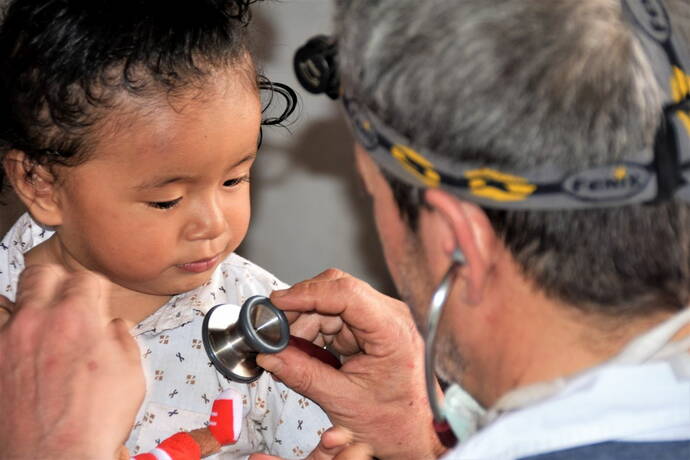
We do not believe, we know
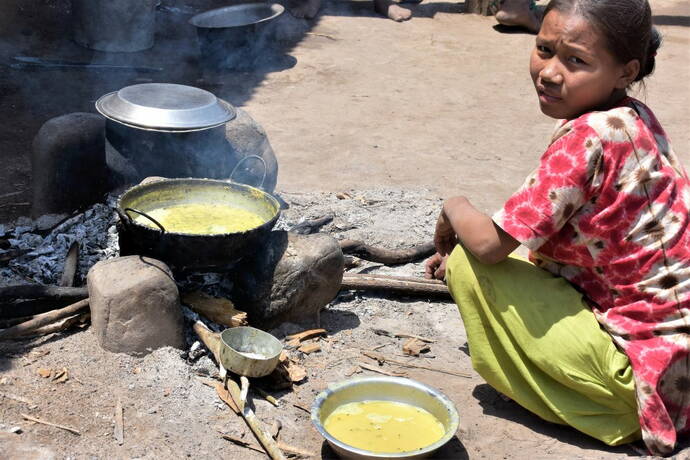
"I know that I know". The debates around the pandemic policy last year brought it to our attention: We know whether vaccination helps or harms, whether the orders of our authorities are good or bad for us, how many instructions belong to our everyday life, and we make this known on all media available to us.
Faith begins where knowledge ends. But we do not need faith in our everyday life. We know.
But we do not need faith in our everyday life. We know.
Where is the sense ?
It appears as if an infinite lack of meaning is driving us forward despite unprecedented abundance in life. We buy whatever we can get our hands on, only to throw it away as soon as it is unwrapped. We pulverise all the treasures of this world, wage wars over oil and fill it into our tanks to go to the disco, the gym, the mall and fly far away from everything close to us.
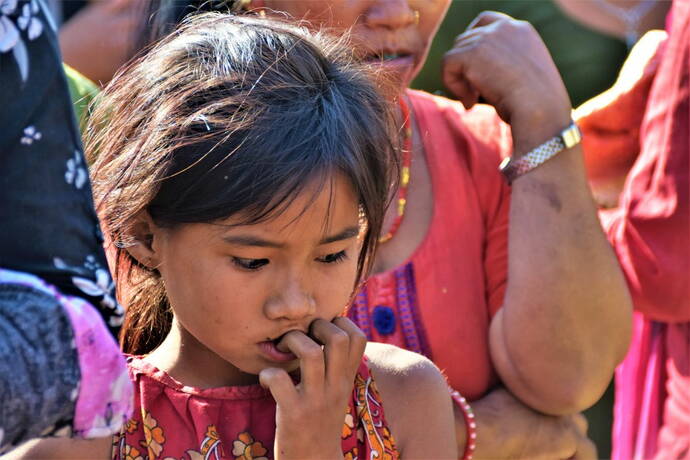
We seize all the resources of this planet and squander them, destroying everything we love. We refuse treatments that save us from death in intensive care units and throw ourselves off bridges on rubber ropes or jump into dangerous ravines because we are no longer able to feel the meaning of our lives any other way. Our life seems to have a flagrant
lack of sense. Filling it with consumption, drugs, feelings and people cannot be the solution. This is where faith can step in.
We should have more faith
The sense is behind the beginning. From a cosmological point of view, the origin of our existence lies in the big bang. This big bang had a reason and the meaning for the entire development of the universe must be found behind this reason. But it is precisely this reason that we cannot grasp, despite all the science and quantum theories. Isn't it paradoxical: our formulas of astronomy and physics can explain almost the entire origin of the universe. The whole thing, except for the rest of a second to the power of minus 43! A billion has nine zeros behind the one, a trillion its 21 and there we are not even in the half of the zeros. So we don't lack much to calculate the origin of all existence, but the last particle seems to remain hidden from us forever.
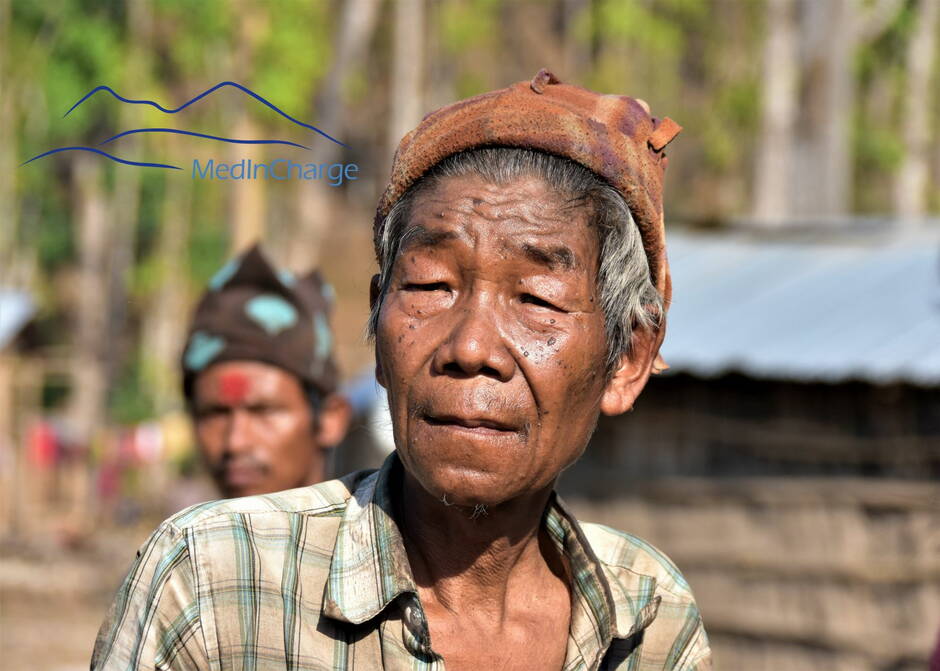
The connection between meaning and beginning was recognised by other people long before us. Already in the Bible is recorded "In the beginning was the Word, and the Word was with God". The "Word" comes from the ancient Greek term "logos". Logos means the "sense". So in the New Testament it is translated, "In the beginning was the sense".Faith today means putting the screen aside and trusting that things will turn out well. We should accept everyday life and accept that we will not get everything right. Faith and knowledge are mutually exclusive. We should respect the sea of things that shuts itself off from our minds. "All I know is that I know nothing". Socrates' statement does not seem to have changed that much over 2400 years later. We have two certainties: We are born and we die. In between, we blink inconspicuously in the universe with our existence on the silken thread of life. Those who believe assume that the thread has a meaning and that it is able to carry us
Share with us and your fellow human beings
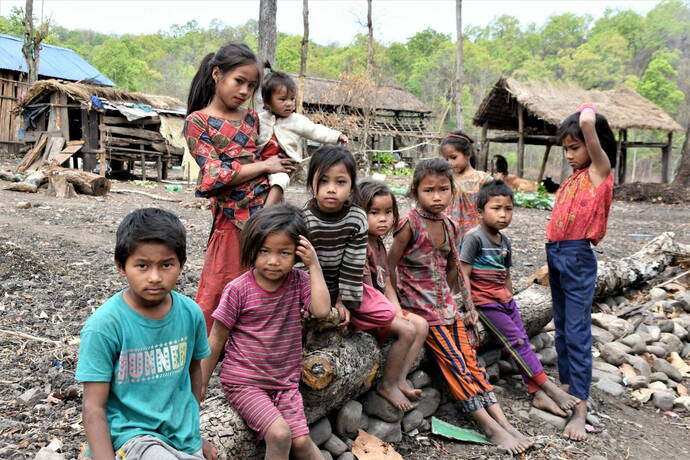
Our work makes sense. We believe in that. It makes sense to enable deprived children to attend school. It makes sense to feed hungry families, to treat their diseases, to protect them from the winter cold with blankets. This is what we believe and hold on to. Share this belief with us.
Antyodaya Chepang School has fully reopened its doors after the long
lockdown and is in the process of re-admitting children up to the highest possible numbers. Every month MedInCharge funds food deliveries to hundreds of Chepang families in Nepal's Terai and the running of Antyodaya School. Support us in our commitment.Consciously enjoy the great privileges we have in our places all year round and especially during the festive season. Remember our privileged situation when you sit down under the Christmas tree in good health and with a full stomach. Look back and check if there is anything left to share with your fellow human beings. Our work is only possible thanks to your continued precious support. With your donations, our association saves real lives. You can trust in this and rejoice with us. We thank you from the bottom of our hearts.
Our family, the board of the association, wishes you a peaceful and relaxing festive time.
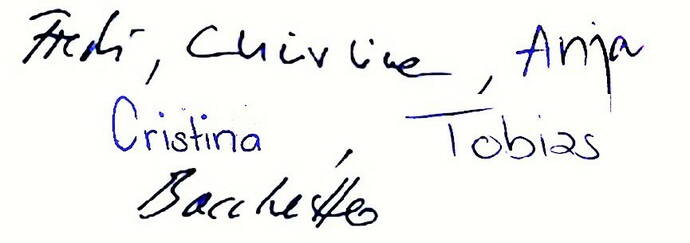
Newsletter MedInCharge September 2021
Dear friends of MedInCharge
The positivity rate of the covid tests in Nepal remains at 14%, which according to the WHO corresponds to a pandemic out of control. However, the number of unreported cases is certainly much higher. Less than 20% of the population could be vaccinated so far because of the lack of vaccine. Accordingly, the pandemic continues to spread in Nepal and is pushing all health facilities to the limit. There is a threat of further drastic restrictions of movement and under these circumstances I have decided to postpone the next mission in Nepal until early 2022.
Sr Miriam, our partner on the ground, tirelessly working to distribute food
Our help and support from Switzerland are more in demand than ever, because it is precisely the poor segments of the population that continue to suffer extraordinarily from hunger and other deprivations in the catastrophic economic situation.
Looking at positive news from Nepal
In my past newsletters I have reported enough about the desolate situation in Nepal. I therefore take the liberty today of focusing on the small rays of hope in what is happening in the country. From this we draw the courage and energy to stick to our commitment.
Kabeeta Rana, 22, a young Chepang seeks her way despite obstacles
Kabeeta completed her primary education at Navadaya and Antyodaya Chepang School. At the age of 18, she was married to a two years elder man. She gave birth to a son 14 months ago, who suffers from a severe congenital kidney disease. She lives in Dharan in eastern Nepal with her husband's family of six members. The husband works in a small bike shop and earns 120 Fr. per month. The sister-in-law receives another 64 Fr. per month as an employee of a small shop. The whole family lives on this.
Kabeeta with Son Adriel, Husband, Parents- and Sister-in-Law
To our surprise, a year ago, Kabeeta approached MedInCharge with a request to support her bachelor studies at Dharan Megha College. With our assistance, she is successfully attending classes between 6pm and 10pm since one year. During the lockdown periods since 2020, she followed school on her cellular. Today, she doesn't know if she wants to continue her studies after graduating in 2024. In any case, the diploma will be a good base to get a well-paying job.
Kabeeta is in many ways an exceptional woman in Nepal. The culture of the Chepang people implies that they get married very young and then have children. Unfortunately, it is very rare for young people to find their way back to studies afterwards, much more so for women.Kabeeta in her school uniform on the school groundsWe are proud of Kabeeta and grateful that her family provides her with the support to pursue her studies alongside her mothering duties. We feel happy about her success and will continue to accompany and support her and her family with joy
Kabeeta in her school uniform on the school grounds
Birsana Praja, 21, the first future Chepang nurse from Antyodaya
We have reported about Birsana before. She has five sisters and a younger brother. Four of her sisters are married and could not attend school. The younger brother and one sister follows elementary school.
Birsana completed her primary education up to tenth grade in Antyodaya. She then successfully passed the entrance examination at the Shradha Insistitute of Health Science Kathmandu. Her grades were so good that she received one of the rare study scholarships from the government of Nepal. For the past two years, she has been studying to become a nurse. She lives in a dormitory in Bhaktapur near Kathmandu. She also followed the online classes during the lockdown with her cellular.
She is currently absolving a practical year at the Friendship Children Hospital in the capital.Birsana's livelihood is financed by a sponsorship from our association. In her mail of 6.9.21 she writes us: " I am extremely grateful for your help to achieve my dream. Without your help, I would not be able to achieve my dream because my family does not have the financial means to support me”.
We are all looking forward to Birsana's graduation in about a year. She will be the first Chepang Nurse that Antyodaya has generated since we started supporting the school in 2018.
At last, presence teaching is allowed in schools again
We have been waiting for this news for 18 months: We have just received the information from Antyodaya that full attendance classes will be allowed again from 17 September 2021. Since the lockdown in March 2020, Antyodaya has been hosting only about 20% of the target number of students to whom it could provide education as per the government's guidelines. These were older children who could follow the distance learning offered through the school's modest technical infrastructure. The school has a WiFi connection and a few older discarded laptops from Switzerland.
Changing things we can change
We feel committed to the underprivileged population of Nepal. In the Antyodaya Chepang School, 200 children receive shelter, food and schooling. The path to school leads out of poverty, as Kabeeta and Birsana show us. The Chepang suffer from poverty that is unprecedented in the world. We offer them survival assistance and hope that the education of their children will help them to improve their livelihoods. With a contribution of 50 Swiss francs, we ensure the livelihood of a family of six in Chitwan for one month and schooling for the children. Help us to change things that we can change.
Fredi Bacchetto
President MedInCharge
In September 2021
Shot down on the runway by Covid (June 2021)
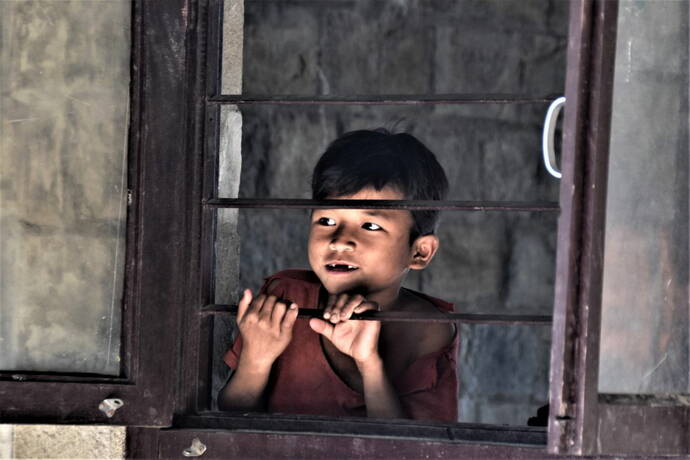
Dear friends of MedInCharge,On 2 May 2021, I stood at the international airport in Kathmandu in a tidy mood and ready for departure and presented my negative PCR test to the official behind the plexiglass booth. He told me that this testing laboratory was no longer recognised. The regulations had changed. Just like that. When I asked where these
regulations could be viewed, and the official referred to a list of laboratories pinned next to the gap in his Plexiglas box. My lab was undoubtedly not on this new list and thus my tidy mood was without delay in tatters. After an unhelpful eruption of emotional expressions, I tried a reboot of my mood in serenity mode. I postponed the flight and plunged into the inferno of the crowd queuing in melee mode in front of the convenient PCR test station the other day. This at the time of the new Corona wave roaring in from India. Then I put myself on hold in a hotel in Kathmandu. Here I was suddenly struck by shivering and high fever.
A quick test announced what was to be confirmed the next day by the recognised laboratory: My PCR test was now positive. The state of Nepal took advantage of my period of isolation to put the whole country under a rigorous lockdown and cancel all national and international flights. So I first spent two dreary weeks in quarantine, locked in a room in a guest house in Kathmandu. Subsequently, two more long weeks of uncertainty were to pass until
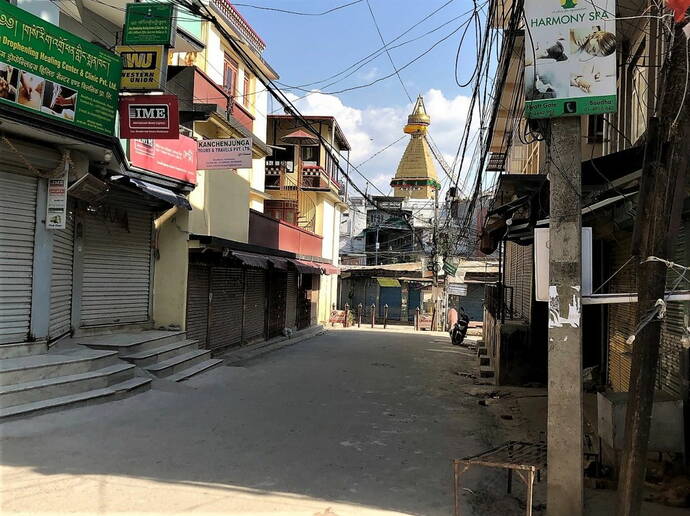
I could book a seat on a charter flight to Europe. During all this time, the otherwise pulsating Moloch of Nepal's capital remained clinically dead. Where normally cars, buses and motorbikes fought a non-stop duel for every free square metre on the wide squares of Kathmandu, now only a few lazy dogs and a (sacred) cow could be made out on the asphalt. In the end, the smog cleared to such an extent that for the first time I can confirm from my own experience that there is also a blue sky above Kathmandu.
The question arises as to why I flew to Nepal at all in a pandemic risk situation
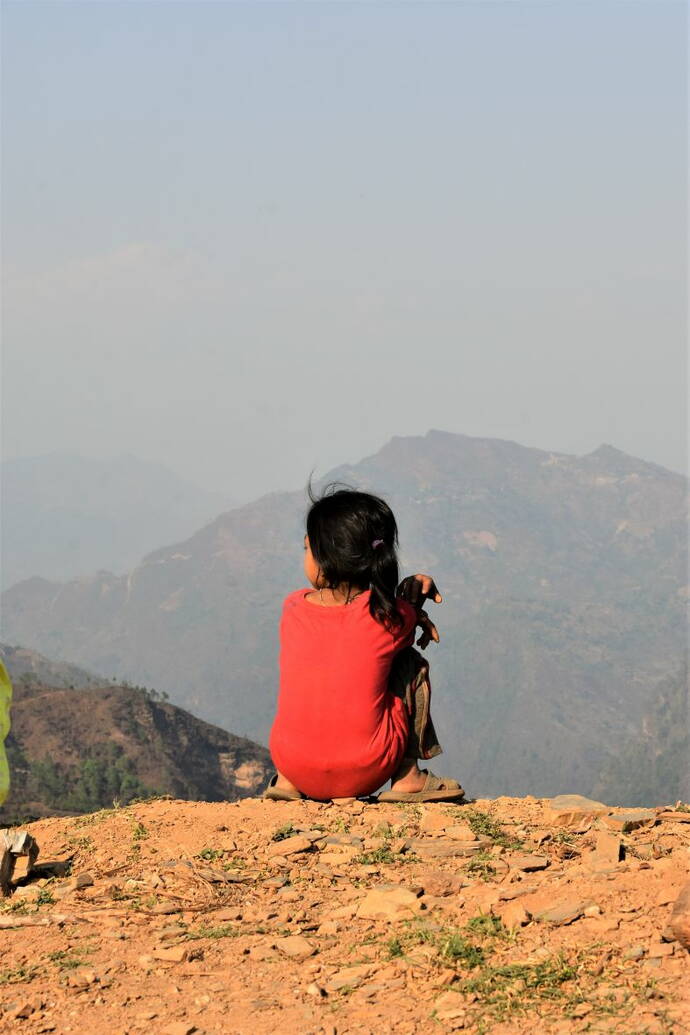
At the beginning of the year, the activities and especially the money flows of the Antyodaya Chepang School, which we support, became increasingly opaque. Therefore, at the end of March, I decided to clarify the situation on site. Unfortunately, an audit of all accounts revealed numerous disturbing irregularities. Due to Nepalese law, foreign investors have to bring in their money through a locally registered NGO. In our case, this was the Happiness Society (HNS), which had the mandate to pass on our donations to Antyodaya School. It turned out that the HNS had misappropriated an amount of CHF 10,500 during the current project period. Unfortunately, the local project manager was also involved. To have been betrayed by people with whom we had been linked by trust and friendship after many years of
cooperation was a deeply hurtful experience for me and our board. It cost us a lot of strength to find the motivation to continue our project work.
In the focus are the Chepang children of Antyodaya
Despite the irregularities, Antyodaya School remains operational and can offer 200 children a place to study, food and shelter. The welfare of these children was the main focus of our board when we decided to lay the foundation for a new start with a new school and project management. The cooperation with the previous project management and the NHS in Nepal was terminated. We have held out the prospect of waiving legal action against the NHS if the shortfall is refunded to MedInCharge. So far, we have received 70% of the embezzled amount, which is why we are cautiously optimistic about the closure of this sad chapter. If a shortfall remains at the end of the day, our family, as the board of the association, will vouch for it so that your donations are not affected by these irregularities.
We have entered into a new collaboration agreement with the school management of Antyodaya, involving the "Little Flower Society" LFS as a fiduciary organisation to manage our remittances to the school. LFS manages the accounts of other large schools in Chitwan. Unfortunately, Antyodaya once again had to close at the beginning of May
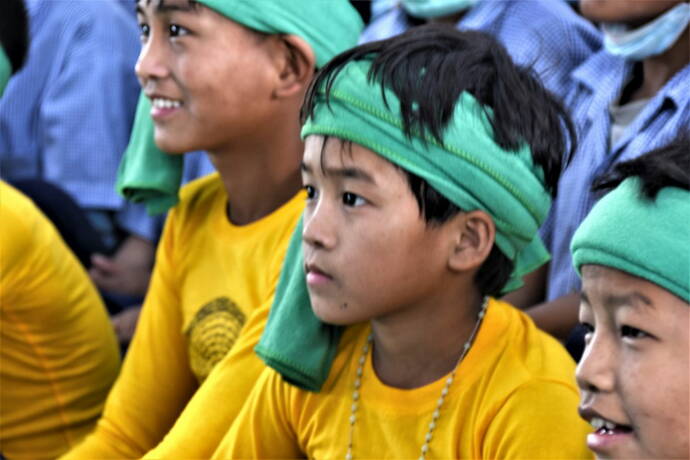
due to the officially imposed lockdown. We sincerely hope that the lockdown will be lifted with the start of the new academic year in June, so that the many children can start to catch up on the school material they have missed.
Where are we in Nepal?
The misery of the ongoing covid pandemic in Nepal can hardly be put into words. I used my stay to conduct 16 health camps in various remote Chepang settlements with the well-established local team. We examined over 2500 people and provided them with medical care and food.
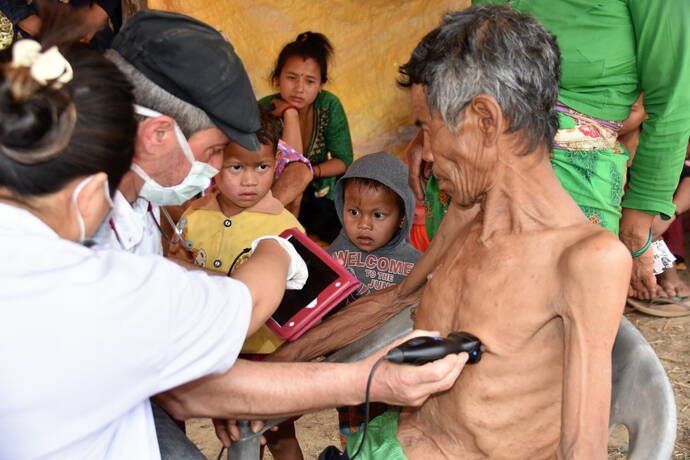
A small portable ultrasound probe, which can be operated with a simple Ipad, was of great use to me during the missions. It allowed me to identify tumours, problematic pregnancy constellations or even children with severe heart defects, which we can then give life-saving treatment. Our continued support is urgently needed. Due to the pandemic situation and meteorological conditions, our
continued support is urgently needed. Due to the pandemic situation and meteorological conditions, the Chepang's self-sufficiency has largely collapsed: seeds and fertiliser could not and cannot be purchased in the lockdown and reduced rainfall also prevented rudimentary planting in the short climatic window in 2021.
in 2021. The daily confrontation with the immense misery of the Chepang was once again deeply burdening: masses of severely malnourished children with only tattered dirty clothes on their bodies, which they wear without interruption until a sibling has to take them over. Their bodies covered with countless rashes of contagious skin diseases and an endless sadness in their eyes. The
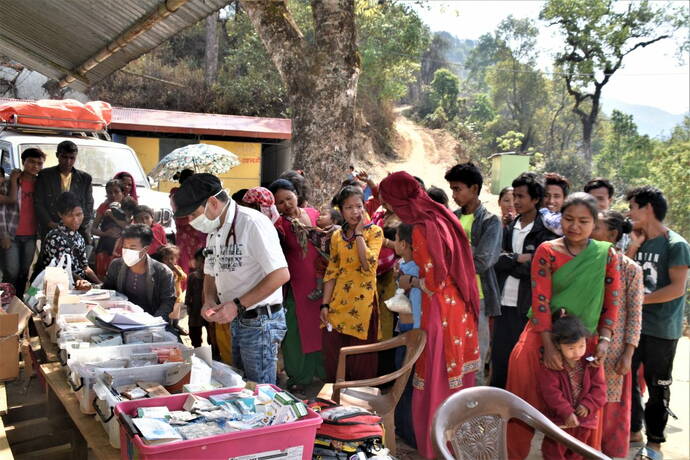
children in our camps never laugh. The parents (mostly the mothers come) in the same state. They often march many hours for the free treatments in the camps.
And always we remain privileged actors of this unspeakable injustice in this world. We dress wounds, treat illnesses and distribute food, but in the evening we return to a set table with a balanced menu. Would the poorest in the world have more if we gave up more privileges or would we all have less? The question is not easy to answer. If I give up all my privileges, I have less, but the poorest in the world do not necessarily have more. This is a conflict that must be endured if one wants to work in the Third World. The same is true of the corruption that exists today and its blossoms, which grow on the soil of the great social disparities.
About sponsorships and donations
We remain committed to the underprivileged people of Nepal. We cannot abandon the children of Antyodaya School. The way to school is the way out of poverty. Their parents were born into an exceptionally disadvantaged ethnic group and suffer from poverty that is unprecedented in the world. We provide them with survival assistance and rely on the fact that their children's education will help them to have a better livelihood. We will therefore continue and depend on your support. With a contribution of 50 Swiss francs, we can ensure the survival of a family of six in Chitwan for one month. This is as much as a good dinner in one of our newly opened restaurants in Switzerland costs.
Fredi Bacchetto
President MedInCharge
June 2021
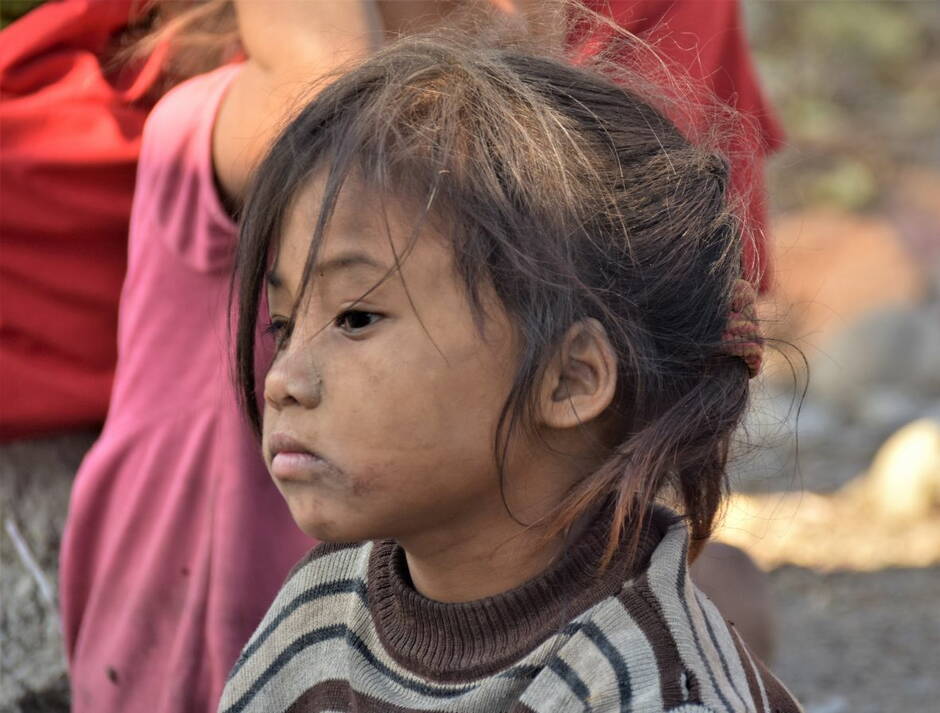
Home
A review of the fourth year of MedInCharge (March 2021)
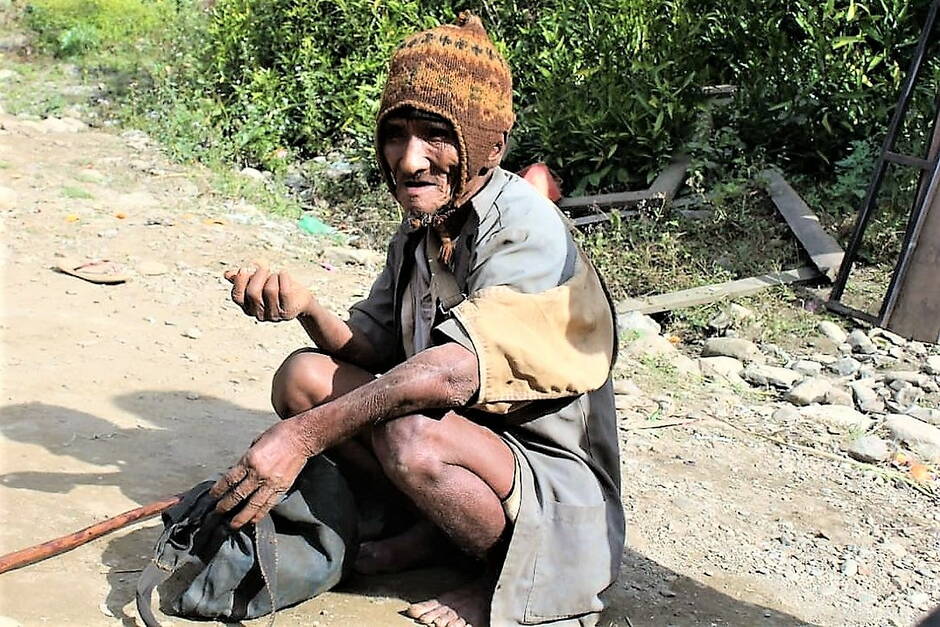
Dear friends of MedInCharge
I have thought long and hard about how to introduce this newsletter so that you will read it at all. Terms that are associated with a transnational epidemic will probably immediately lead to an - from the author's perspective - undesirable reflex in some of you. So I try to avoid corresponding provocative words, at least in the first section.
This begins with the above-mentioned title, which is meant to describe the place where now I am not only at home, but have also spent most of my existence over the past twelve months: Like many of you, this is where I have eaten, slept, spent my free and not-so-free time. In this situation my social activities are limited to interactions with two computers and a total of four screens. For communication, I have a choice of screens ranging from 13 to 27 inches diagonal. A varying window to the outside world, which, however, always remains rectangular in its basic form, is translated into bits and in long-term cannot offer a substitute for a real encounter with a non-digitised fellow human being. I am largely spared any further worries. Whether I am thereby disadvantaged or privileged is a question of point of view.
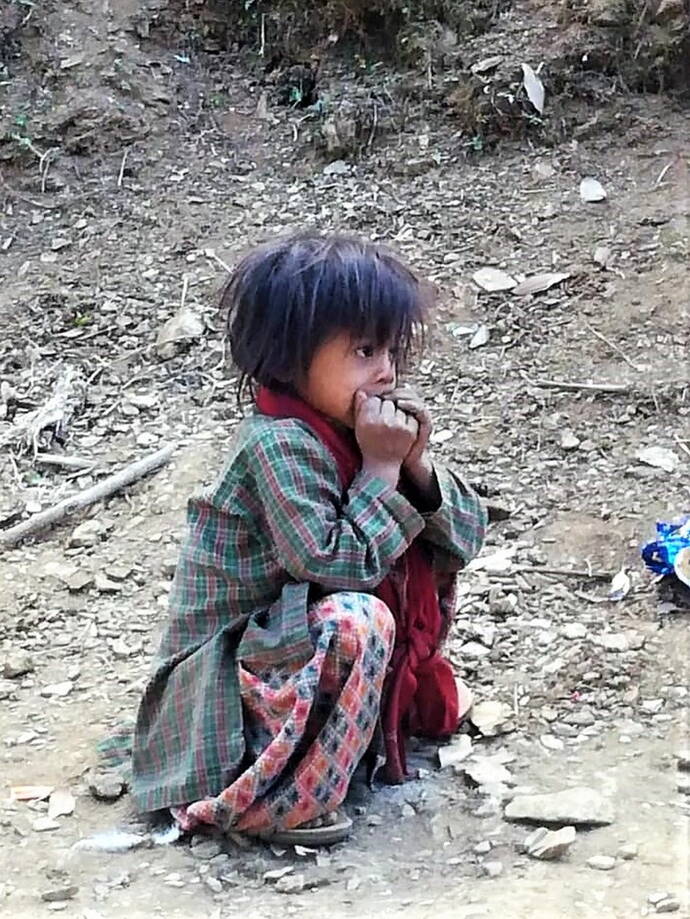
The question of the point of view
For the children we support in Nepal, the "pandemic" (sorry, there is no other way) means that they have not been able to go to school for 12 months. Home teaching or digital communication with people outside the village communities are not possible because there is no equipment and infrastructure. The choice of meals is some rice or nothing at all. It depends on whether their parents were able to find food. During the lockdown, almost all sources of income from the parents' micro trade have disappeared. The situation is particularly serious for elderly people when their own family
no longer provides for them. In Nepal, women have to move in with their husbands and take care of the husband's parents. This is one reason why in Nepal, especially in the pandemic period, many women are married off even younger. The woman's parents receive a small dowry, but if there are no male offspring to be married off, there is no one to look after the parents left behind.
What we did for Nepal in 2020
Due to the pandemic, MedInCharge's 2020 personal outreach was not possible. We invested all budget items for the running of the schools to conduct additional health camps and food deliveries. This way, all the families of the children of Antyodaya Chepang School and many other settlements in need could be supplied with food on a monthly basis. A total of 71,300 Swiss francs went into direct support for needy families. Well over 90 tonnes of food were distributed, primarily rice, but also lentils, oil, salt and eggs. We provided food for about 500 families per month. With an average size of 6 people per family, this corresponds to 3,000 people per month or 36,000 adults and children over the whole of last year.
What you did for MedInCharge in 2020
Last year, you supported us with more than CHF 104,000 in free donations and almost another CHF 30,000 in committed sponsorship contributions. Of this amount, CHF 85,000 came from 27 individual major donors with amounts between CHF 1,000 and CHF 20,000. We owe you all our great appreciation and sincere thanks. Our work is only made possible by your trust in us and your great support. We transform this trust and your donations into concrete help. The annual financial statement of our association as well as the audit report for the year 2020 can be viewed on the media site of our homepage
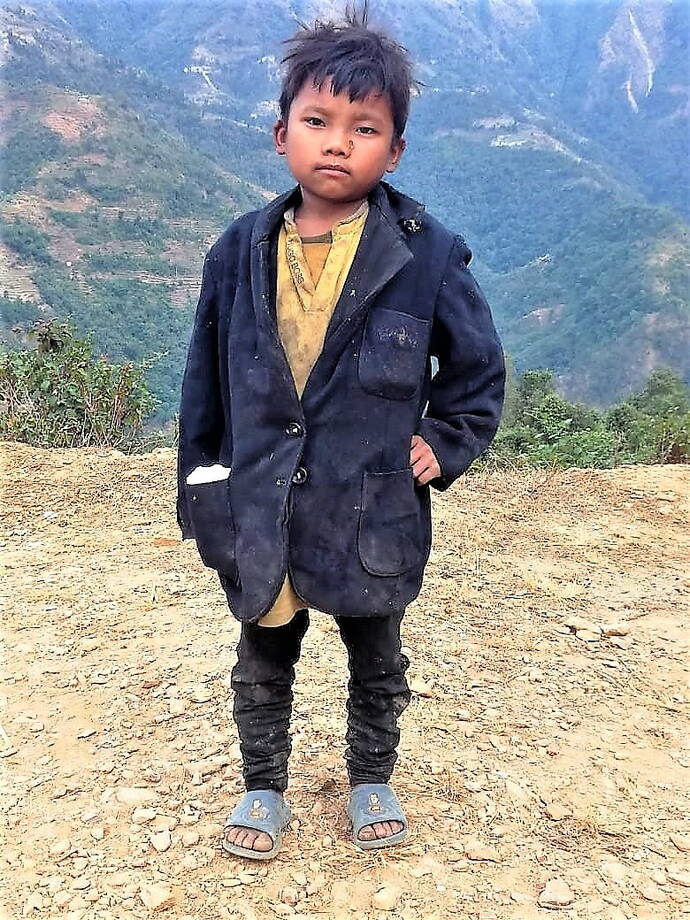
What's coming up for us
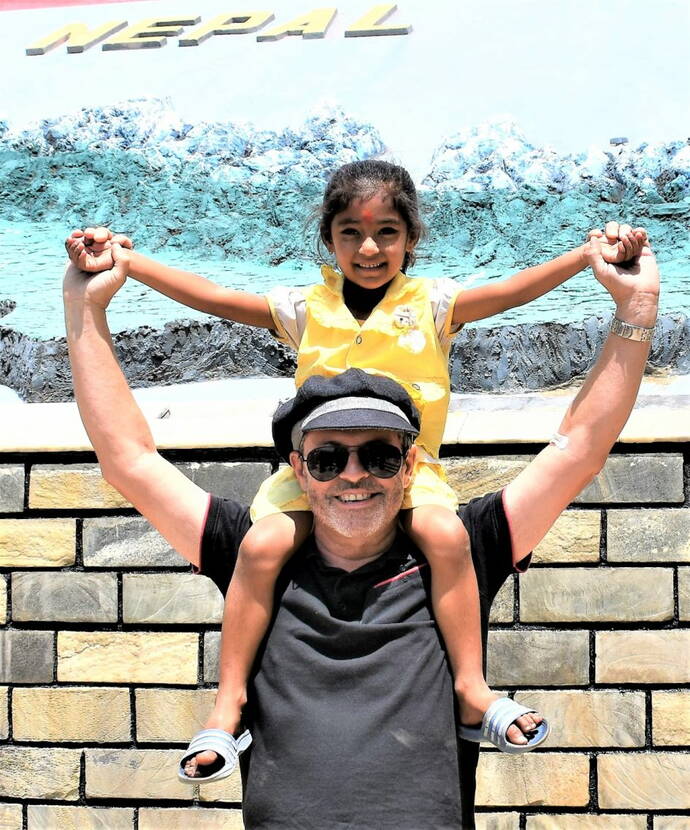
I am sending these lines just before my next departure to Nepal. After a long period of waiting and uncertainty, I was able again to obtain a visa for Nepal and a flight ticket to Kathmandu. The outcome of the mission is anything but certain. The pandemic is constantly forcing new rules of the game on us, and the opaque mechanisms of an administration in third-world mode deprive any orderly planning of any basis. Antyodaya School has not yet returned to regular operations after its closure in Lockdown 2020. The main objective of my outreach is to ensure the full reopening of the School.
In the meantime, I am looking forward to conduct again health camps in the remote Chepang settlements with the well-established local teams and to personally accompanying our food deliveries. Developments in Nepal show us that a regular presence of project representatives on the ground is essential if we are to vouch with our name for the earmarked use of your donations. The Family Bacchetto, the board of the association, sincerely wishes you, a joyful springtime, a time which we can take off all masks and obstacles and meet each other again in a relaxed manner.
Fredi Bacchetto
President MedInCharge
March 2021
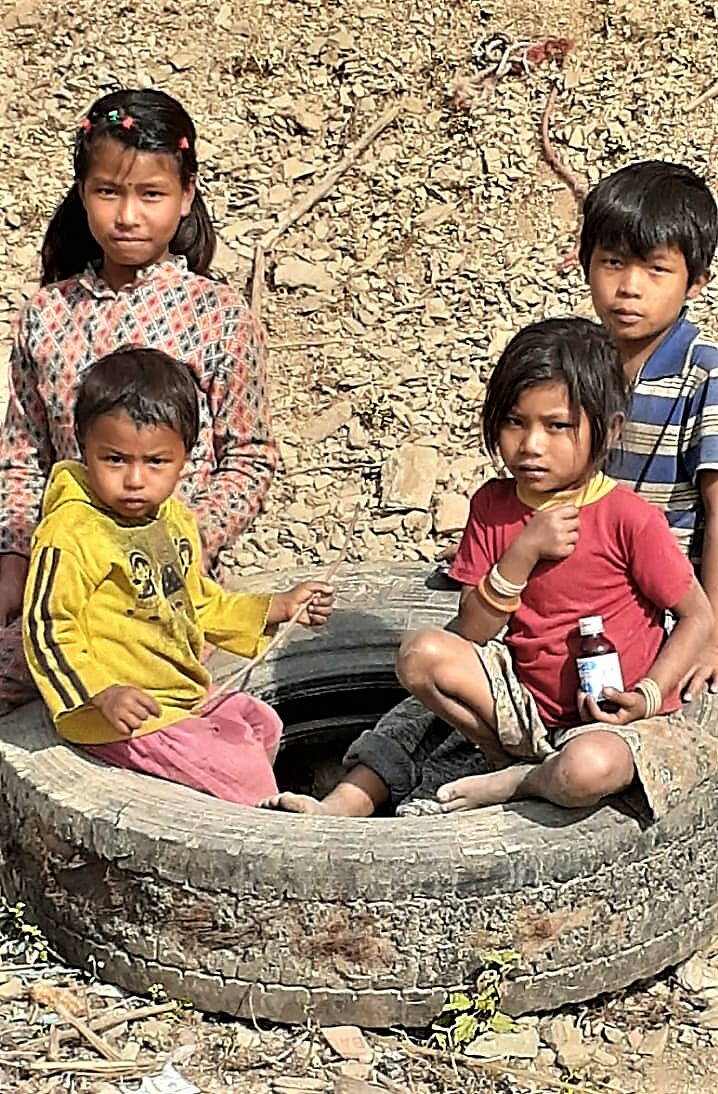
We are happy to accept donations and sponsorships at:
IBAN CH48 0900 0000 8975 4784 8,
MedInCharge, Chroslenweg 9, 3177 Laupen
We are grateful for every contribution !
Through our operations in the field, we guarantee that your contribution will be used for the intended purpose. All our volunteers in Nepal work free of remuneration and 100% of your donation will be used without deductions to support needy people in Nepal. The administrative costs are carried by the founding family.
Link to our Photo Gallery on our Homepage:· https://www.medincharge.ch/de/photo-gallery.
Constantly looking for the way to change things we can change (December 2020)
Dear friends of MedInCharge
Last November, one of our representatives in Nepal had to temporarily suspend the provision of food supplies to the needy villages due to the suicide of a young woman in the family. This event highlights the dramatic circumstances currently prevailing in southern Nepal. People are committing suicide because they can no longer provide food for themselves and their families! Starvation is a reality for many Nepali in the Corona Pandemic. The government issues contradictory decrees on lockdown and restrictions at regular intervals in public life without concrete support for the
population. The schools remain closed and the Chepang children are cut off from education and basic services in our facilities.
Further information can also be found in the Christmas greeting from Boby Anthony, which will reach you by regular mail from Nepal in the coming days.
Changing things we can change
Within the last three months, MedInCharge has transferred over 30,000 Swiss francs for emergency aid to Nepal. Boby Anthony, Niranjan Praya and Sister Miriam Thapa and their teams organise regular convoys to the poorest regions of the Chitwan and Makwanpur districts in southern Nepal. With these funds we were able to save an estimated 1500 families with four to six children from the worst. These are by no means all, but many. More was not possible with our funds and less was not justifiable. Boby Anthony and his team have been able to visit and care for almost all the families of the children in Antyodaya several times. The following slideshow was compiled by Boby during a visit to Korak in October as a thank-you note. A note for those not familiar with Nepalese culture: Nepalese film-making is heavily influenced by Bollywood 😊.
Expto Fifty-Fifty
In the beginning of November a friend of our association surprised us with the news that despite corona restrictions, in Valangin near Neuchâtel an exhibition of the association of the amateur painters of DP'Art could be held in favour of MedInCharge. The artists have painted a whole series of pictures basing on fotos on our homepage, which can be viewed (and also bought) at the exhibition itself or by clicking on the link below. The exhibition remains open until Christmas and DP'Art will donate half of the revenues to our association. We would like to thank them for their initiative and commitment to help needy Nepali people.
When people think of MedInCharge beyond death
None of our descriptions in our newsletters can replace a visit on site. Twice we have already experienced that accompanying our outreaches touched the participants so deeply that they benefited our association after their death.
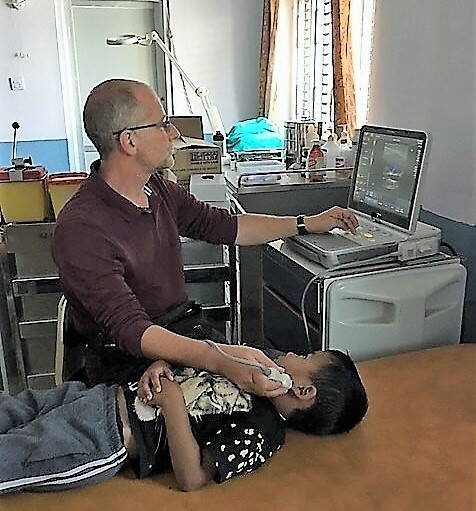
Urs Vogt was head of radiology at the regional hospital in Burgdorf when he joined our activities in Chitwan Nepal at the end of 2017 for a longer assignment. He dedicated himself with much heart and soul to the further education in ultrasound diagnostics of the young assistants at Ratnanagar Hospital and was able to impart this valuable knowledge on a level which a Nepalese assistant doctor would not normally attain in his training. At that time Urs knew about his deadly cancer, which had been with him for quite some time. On the roof of the Ratnanagar Hospital, I spent many moments with Urs in deep-rooted conversations.
I was deeply touched by the objectivity and sobriety with which he spoke to me about his inevitable approaching death. Externally, Urs seemed completely healthy and I, probably more than himself, did clung to the hope that modern cancer research would find a way out of this oppressive situation. Urs Vogt died on 16 June 2019 at the age of 59, leaving behind a family of four children. "My soul to heaven, my body to earth, my heart to my beloved ones," was written in the obituary. To last belonged also the people in Nepal and as a sign of this he sent the mourning donations to our association MedInCharge. In accordance with the family's wishes, we are investing the large amount in the education of medical staff, teachers and children.
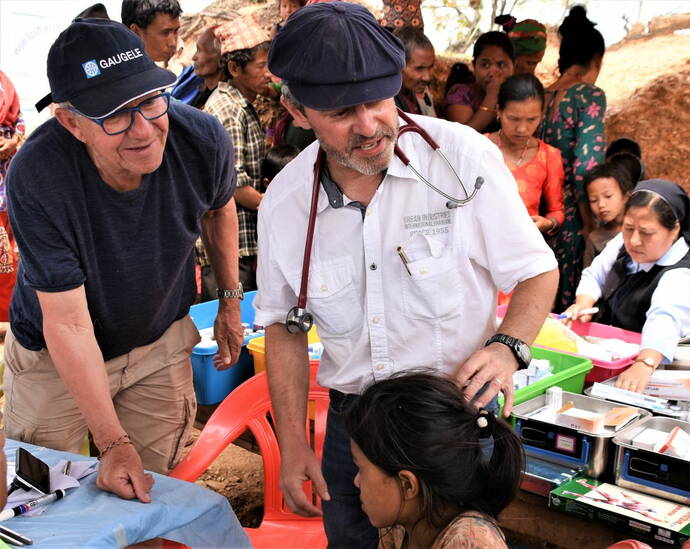
Fritz Marschall worked as an agronomist in the region around Laupen all his life. At the age of sixty he took early retirement and became increasingly involved in church and charitable organisations. In April 2019 Fritz Marschall, his wife Annemarie and three friends accepted an invitation from our association; they accompanied us during a health camp in Goathai Dara. The remote settlements in the mountains of Makwanpur District are characetrised
by a sad poverty, which gets deeply under my skin, even after more than three years of working in Nepal. 17 September 2020 Fritz Marschall was abruptly torn from his life after an accident. He leaves behind a family with three children. The family also donated the mourning donations to our association. We will use the amount to support Goathai Dara. With this large sum the village community can be supplied with basic food for about one year. His obituary refers to the cosmos that shelters us even after death: "If you look at the sky at night, it will be as if all the stars are shining, because I live on one of them, because I laugh on one of them". Every evening, more than 300 families in Goathai Dara and MedInCharge look up to this star in deep connection.
Urs and Fritz have died, but the relatives have to deal with the death, as a priest noted on the abdication. We have donations from two deceased people to manage, which touch the soul of our mission and make us more committed than ever. Our deepest sympathy and thanks go to the relatives of Urs Vogt and Fritz Marschall, and we vouch for the use of the money for the intended purpose.
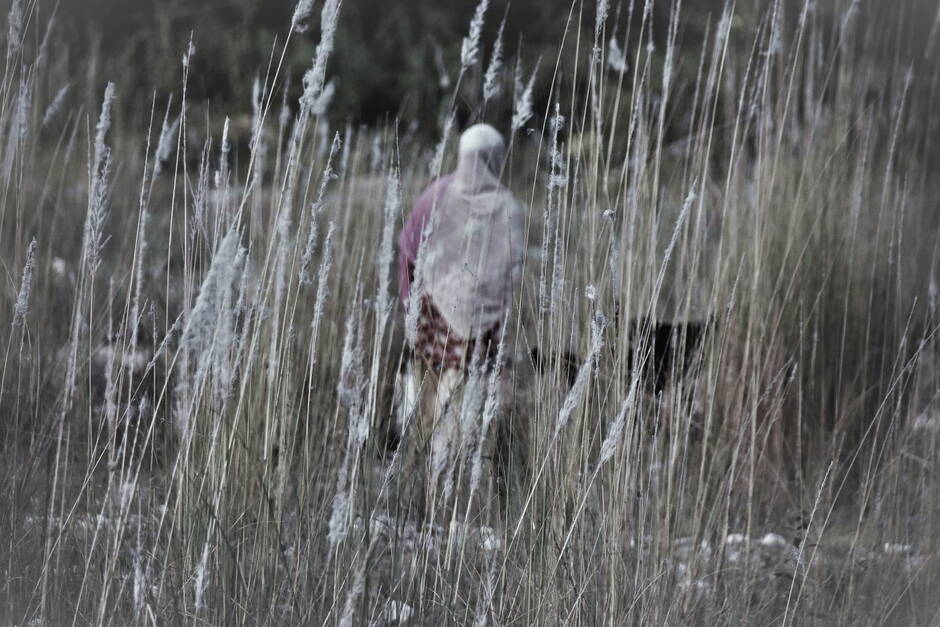
Our Mission is yours
As board of the association the Family Bacchetto wishes you peaceful and relaxing festivities. Enjoy the feast knowing that we remain privileged. Remember this privilege when the last chinoise has been eaten and the last vegetarian meal has been digested. Look back again this year and see if there is still an amount left to share with our fellow men. Our work is only possible thanks to your continued valuable support. We will convert your donations into real lives saved. You can have confidence in this and be proud with us. We thank you from our hearts.
Unless you do it with us:
50 francs per month: Sponsor a child in Nepal and give him or her all-round care in Antyodaya, including school attendance, food, clothing and medical care
25 francs per month: Provide an extended family in Nepal with a daily meal.
IBAN CH48 0900 0000 8975 4784 8,
MedInCharge, Chroslenweg 9, 3177 Laupen
We are grateful for every contribution !
Through our operations in the field, we guarantee that your contribution will be used for the intended purpose. All our volunteers in Nepal work free of remuneration and 100% of your donation will be used without deductions to support needy people in Nepal. The administrative costs are carried by the founding family.
Link to our Photo Gallery on our Homepage:· https://www.medincharge.ch/de/photo-gallery.
Watching misery from distance with persistent powerlessness (September 2020)
Dear friends of MedInCharge
The new academic year should have started in mid-April 2020, but on 18 March all schools were closed due to the pandemic situation and then the whole country was subjected to a rigorous lockdown from 24 March. The Kathmandu Post of 11 September 2020 states that the government now allows local authorities to organise the resumption of schooling. After six months of no action, the government commissions the municipalities to set up virtual platforms for home education. However, the vast majority of children do not have access to the internet, not to mention electronic devices, in the places where they live. In this case, the children should be taught in small groups, according to the government. However, the schools of our Chepang are often several days' walk from the children's home villages. Accommodation in the hostels of Antyodaya was not granted. It is becoming apparent that these children are facing another long educational gap.
Even worse than the lack of school education is the overall lack of food supply for the families of our children.
On August 17th an article about the work of MedInCharge was published in the "Bund" (see media), which describes a situation which unfortunately has worsened since then. At that time we assumed that a flight to Nepal and direct help on the spot would be possible in September. But then the Covid numbers in both India and Nepal have risen dramatically again. The lockdown measures were again drastically tightened: grocery shops only open for a few hours a day and traffic movements are very limited and only possible for short periods of time. These obstacles dramatically aggravate the misery, diseases and malnutrition in the poorest villages of this destitute Chepang.
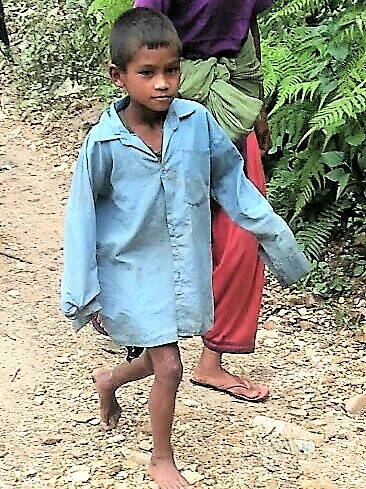
We are spectators of the development of the drama, but can make an important contribution
Your donation matters! Help us to fulfil our task. Secure one meal a day for a month for a family in Nepal with 25 Swiss francs. Our commitment is more than ever in demand.
In this emergency situation we use your donations and sponsorship contributions for food supplies to the underserved Chepang villages to ensure the survival of the families. In this way, several tons of rice, salt, lentils and other sources of protein reach these regions every month. The Board of MedInCharge is convinced that he is acting in your interest in this way. We are glad about every support we receive from our numerous friends in this difficult situation and use the donations to limit the health damages of the suffering population in this critical situation. With 25 francs we can provide a family of six members with 20 kg of rice, 2 kg of lentils, eggs, oil and salt for a month.
MedInCharge seeks reinforcement
MedInCharge has achieved remarkable projects with its local partners since its foundation in 2017. The aim is to ensure the implementation of health camps for the suffering population and the operation and expansion of schools. This will only be possible if the continuity of our small organisation can be ensured. So far, all administrative work in Switzerland has been handled by the founding family alone. We would like to extend the structure of the association to a broader basis. Are you motivated to put some of your heart and soul into our association? Get in touch with us! A committed team is looking forward to meeting you.
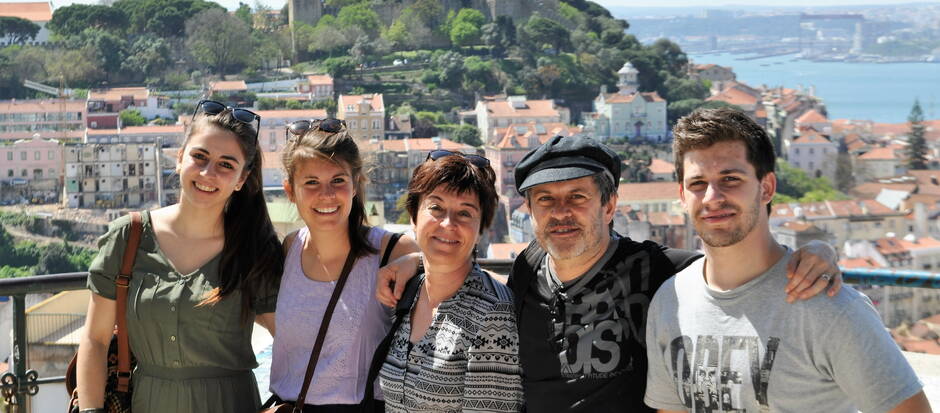
Through our operations in the field, we guarantee that your contribution will be used for the intended purpose. All our volunteers in Nepal work free of remuneration and 100% of your donation will be used without deductions to support needy people in Nepal.
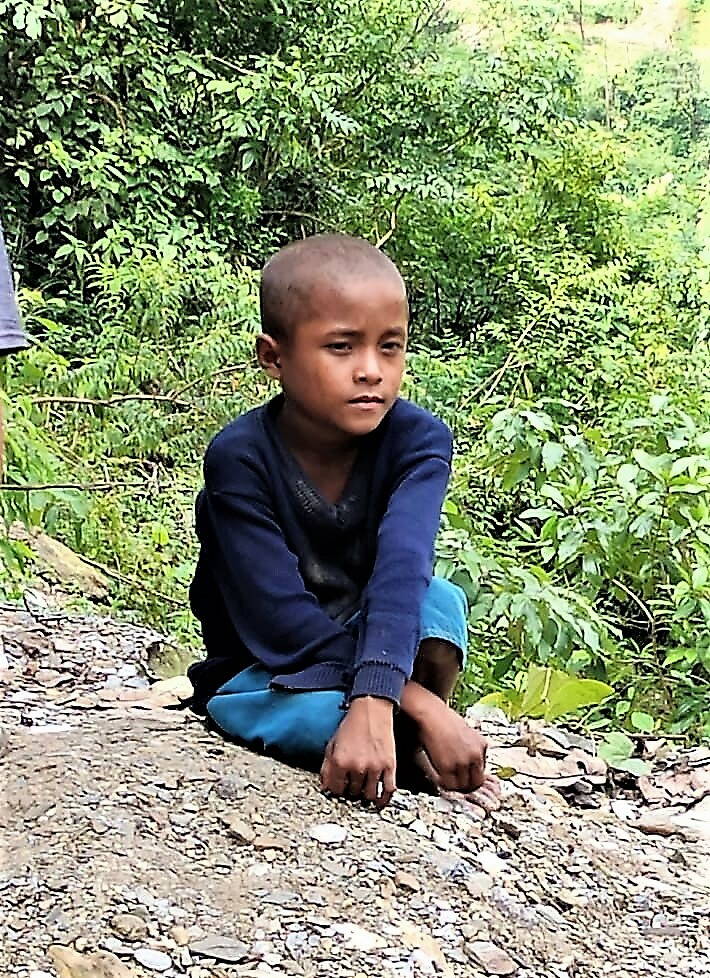
Even if we are not present, we should feel committed (June 2020)
Dear friends of MedInCharge,
Lockdown! I hardly need to explain that term. Or should I? How does a family of 12 members feel? Parents, four siblings, two partners and four children. They're thrown into a 5x6 meter room where people cook and sleep. In the corner, the family's only source of food: a half-bag of 15 kg of rice and 2 kg of lentils left over. The family lives on the equivalent of 90 francs of the son's income as an employee in a repair shop. But the workshop remains permanently closed in the lockdown and the income is suppressed. So they can't buy rice and everyone is hungry. Apart from that, no rice is for sale. Rice deliveries from the cities are interrupted because of the lockdown.
When Nepal gets back to everyday life, we start again on square zero in many places.
Die Schweiz macht sich an den Wiederaufbau des neuen Alltags und der Wirtschaft nach dem Lockdown. Rückschläge gehören in einem Entwicklungsland auch ohne Pandemien zum Alltäglichen. Häufiger in der Frequenz und viel einschneidender als bei uns. Das ist immanenter Bestandteil von Entwicklungszusammenarbeit und gehört zum Engagement.
Switzerland is working on rebuilding its new everyday life and economy after the lockdown. Failure is part of everyday life in a developing country, even without a pandemic. More frequent and much more drastic than here. This is an inherent part of development cooperation and is part of the commitment.
Our involvement is in demand more than ever
Unless we do it : Delivering rice where supplies run out
MedInCharge has already distributed well over one tonne of rice, 120 litres of oil, 200 kg of lentils and salt via the local partners to families in Chitwan Nepal who were particularly affected by the lockdown. The gratitude towards MedInCharge was great.
Further calls for help reached us from the chronically underserved settlements of Cisapani, Torquai, Goathai Dara and Pangthali with well over a thousand resident families. With the help of the Sisters of the Divya Jyoti Community in Hetauda, we are also arranging the urgently needed rice supplies to save the inhabitants from further severe malnutrition. Help us to fulfill our task. Assure a family in Nepal one meal a day.
Unless we do it : Salary maintenance in lockdown
During the closure phase, MedInCharge paid the salaries of Antyodaya's school staff without interruption. In Nepal, this is not a matter of course. For us it is a matter of maintaining social responsibility towards our employees, which also guarantees their loyalty to us. They will not forget that they will keep their families in this critical time.
Top Bhadur Chepang (top right), Head of Maintenance Antyodaya School. The whole family with many siblings and children depends on his salary.
On-site missions by board members and volunteers
In order to run Health Camps and to manage our projects on the poverty front, board members and other MedInCharge volunteers will fly back to Nepal as soon as the authorities allow us to do so. Whether this will be possible again in the current year is unfortunately still open at the time of publishing this newsletter.
Laupen, in June 2020
Fredi Bacchetto,
President MedInCharge
Your support is needed more than ever
Unless you do it :
Offer school attendance to a child in Nepal.Provide a family in Nepal with a daily meal.
IBAN CH48 0900 0000 8975 4784 8,
MedInCharge, Chroslenweg 9, 3177 Laupen
We feel happy about every vontribution
Through our operations in the field, we guarantee that your contribution will be used for the intended purpose. All our volunteers in Nepal work free of remuneration and 100% of your donation will be used without deductions to support needy people in Nepal.
Miracles always happens, a review of the third running year of MedInCharge (March 2020)
“Miracles always happens in
our projects”, ...Bobby Anthony keeps on call out. The manager of Antyodaya Chepang School is an unshakable optimist. At least for the work of our small association MedInCharge and his school, which we accompany and support since its foundation, this seems to be true. However, in view of the consistent application of this philosophy,
sometimes I have to handle obstacles with Bobby. So, I hardly can talk to him about difficulties in our project work. He immediately refers to the "Miracles" (which will happen in future) and thus, according to his way of thinking, everything is comprehensively and conclusively discussed. To the Miracles that have occurred in the past year to the MedInCharge:
Miracle one: What MedInCharge was able to do last year thanks to your support in needy Chepang communities
The purchase of the new off-roader, thanks to a single donation in spring 2019, is one of the most important strokes of luck MIC could record. We are now entering regions and settlements which seem to be forgotten by the world. Again and again these severely malnourished children, far away from any perspective or future. The indescribable poverty and misery that is revealed to us, strongly sags our mental reserves.
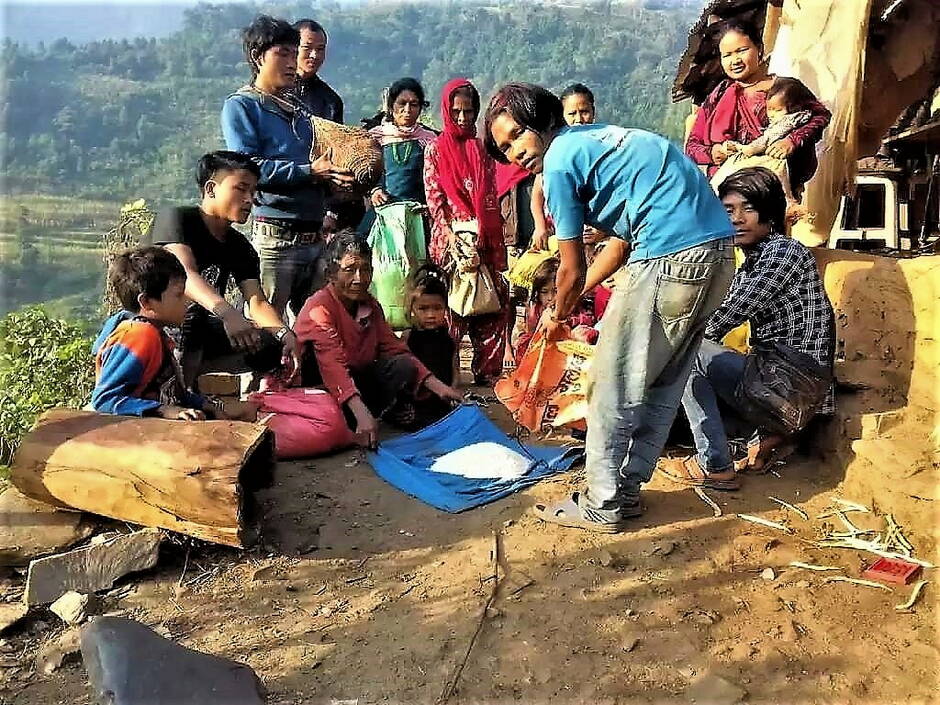
Torquai residents distribute the rice after carrying the 30 kg bags up the mountain for 8 hours to their village
Finally this is precisely what we are changing. In 2019, we conducted health camps in more than twenty villages in constant company of the experienced sisters of the Divya Jyoty community and a well-rehearsed team, reaching several thousand families. The villages of Torqay and Pangthali are supplied with rice and dhal (lentils) on a monthly basis, and success has been achieved. To meet the children of Torqay in a regenerated nutritional state after six months of rice delivery was one of the deeply moving moments of my work in Nepal last year.
My accident with a shoulder fracture in February 2019, which prevented me from working in Nepal for several weeks, is booked under the negative balance of the Miracles.
The same girl. 9 month old, weighting 4 kg in April 2019 and the whole family of normal weight in November 2019, 6 months after monthly rice deliveries (the girl in her mother's sling)
Miracle two bears the name Antyodaya Chepang School
Sometimes we are concerned about the conservative family structures in Nepal, which are culturally strongly influenced by India. Unfortunately, it happens again and again that young people get married after twelve years of schooling or their parents prevent them from attending secondary school because they want their children to support the family. Here we are reminded how great the need for development cooperation in Nepal still is. In the spirit of Francis of Assisi, we daily use our strength to change things that we can change, and we practice serenity in accepting things that we cannot (yet) change. And it works. In the past three years we have changed a lot: Where three years ago there were only a few dilapidated buildings, now there are living 200
Chepang children. They are holistically cared for by a well-rehearsed team of cooks, teachers, tutors and a nurse. Thanks to sponsorships from members of MIC, the first young people are already in the process of completing their further studies as nurses or in other fields.
Insights into the school area of Antyodaya: spring 2017 under construction and in March 2020 with the newly opened playground
We have not yet reached our goal with the sponsorships in Antyodaya
Almost 60 individual sponsorships now cover 30% of the school's running costs. In order to relieve the school from the deficit guarantee of our association, more than one hundred additional sponsorships are required. Here too we trust in the upcoming Miracles. You are invited to help us perform the next miracle. After filling out the sponsorship form (see below) on our homepage, MIC
will assign you an individual godchild who can be contacted personally. In order not to financially benefit any individual child, the sponsorship contributions are paid into the school's common maintenance fund. It is possible to retire from sponsorship at any time, because MIC covers the outstanding balance of the school. The monthly support or sponsorship costs 50 US$ per child.
The 2019 financial statement of MedInCharge is online and can be viewed on our media page
Fredi Bacchetto,
President MedInCharge
Laupen, in March 2020
Unless you do: I support a child in Antyodaya with a sponsorship
Just turn the page or zap away is not possible !
The girl in the picture is nine months old. She weighs less than four kilograms. The child is completely apathetic, the whole body is covered with skin folds because there is no fat and hardly any muscle underneath. The belly is bulging and as a result of the extreme lack of protein it is swelling up with fluids. The girl suffers from a severe marasmus and is in acute danger of life.
Dramatic conditions in Torqay
She can no more be saved in Nepal. The child was brought to us during a health camp a few weeks ago in Torkay. We were only able to reach the place with our new Off roader after a dangerous drive in the high mountains of the Makwanpur district (see video photo gallery). The devastating earthquake in Nepal had destroyed the access roads to Torqay in 2015. Even four years after the event, the government has not yet managed to reconstruct the roads. The populationcan no longer go down to the valley to sell their few products and are hopelessly impoverished as a result.
The longer I am in Nepal, the more the abysses of misery and horror open up to me in this country. For the description of poverty in Torqay there are no words.
The longer I am in Nepal, the more the abysses of misery and horror open up to me in this country. For the description of the poverty in Torqay there are no words. Never before I've seen so many emaciated people in one place. Never before have I seen so many severely malnourished children. Over 300 families live in Torqay.
Of course, I know the pictures from the media reports of the famine in Sudan, Somalia, Ethiopia and what they are all called. But here it is different. The children I hold in my arms are real. Just turn the page or zapping away is not possible. In Switzerland alone, we throw away over 250,000 kilograms of wholesome food every hour. Imagine that: Six articulated lorries full, hour after hour, every day of the week. How is this possible?
When the village leaders say goodbye in the evening with grateful words, many of us have tears in the eyes. The misery in this place forgotten by the world, is hard to bear. Our hearts are bleeding.
In the meantime, MedInCharge and the Sisters of DJC have provided Torqay with a large load of rice as emergency aid. Due to the destroyed access roads, the residents have to carry the heavy sacs on their backs for several hours.
They are very grateful to us. So am I. Your donations make this possible
With us also Sudip was allowed to join the way home. After an insect bite, the nine-year-old had developed a large chronic and open wound that stretched more than ten centimeters across his neck. With big eyes he watched the action from the front seat of the off-roader. He had never driven a car before! In our base station Sudip was taken care of for two weeks by our nurse from Switzerland, Aline Maurer. Afterwards, Aline's several week job came to an end and Sudip moved to the Antyodaya Chepang School.
13 health camps and 1,900 people cared for in April 2019 alone
After I was able to return to Nepal in April this year, we conducted 13 health camps in short succession in Chepang settlements and at the schools of Navodaya and Antyodaya. I was always accompanied by the Sisters of the Congregation "St. Joseph of Cluny" and other helpers of the community.
By the time I returned to Switzerland, we had examined and treated 1,900 people, half of them children. From the many impoverished Chepang settlements we were able to bring 50 additional children to Antyodaya.
The increase of the school was made possible thanks to the generous support of the Lotteriefonds of the Canton of Bern. We are very grateful.
The thirteen-year-old severely handicapped girl lives in the wooden shack shown - together with six other siblings and her mother. We have brought two girls from this family to the Antyodaya School
We have edited our work in the Health Camps on a video. The recordings were made in April this year.
The video can be viewed either on YouTube
https://youtu.be/9Pyv4j0IHi8
or in the photo gallery of our homepage
https://www.medincharge.ch/en/photo-gallery
We work on a small scale - but sustainably
When the children enter school, the ideal course of the MedInCharge project idea comes to an end: With our camps, we provide the parent generations with medical help and food. By transferring the children to the Antyo¬daya School, we provide the children with clothing, shelter, food and education. The children are to be supported until the end of their school education with a vocational diploma and thus with a livelihood.
No utopia: The oldest students who joined the school when it opened in 2017, are about to complete their diplomas in nursing and information technology. The school is constantly working on increasing its autonomy. Thanks to donations from friends of MedInCharge, the school has recently been able to increase its herd to seven cows. This means that Antyodaya is now producing enough milk to give all the children a glass every day. A very important source of protein and calcium during the children's growth period.
The demand for our help far exceeds our possibilities. MedInCharge is a small association. All the fundraising, logistics, administration and operations themselves are carried out by a very small number of volunteers. Our border is not the sky, but the finances: With your very valuable donations we can now finance well the described Medical Camps. The survival of the Antyodaya
School can only be secured from 2020, however, if we recruit a further hundred sponsorships.
Without additional sponsorships the future of Antyodaya is not secured
In conversations with friends I notice that the assumption of a sponsorship is not particularly popular. It seems that many of you are deterred from making regular payments. I can understand that well, I often feel the same way. We try to counteract this circumstance with a kind of guarantee of our association: A withdrawal from the sponsorship at MIC is possible at any time and with a simple mail to MIC or me. At no time does the support of a child break off after the sponsorship has been suspended. The association guarantees the education of every child in Antyodaya at all times.
And the sponsorship has a very nice downside for the sponsor: The assigned godchild has a name and does not only exist virtually. Sometimes an enriching exchange develops between the children of the sponsoring family and the child in Antyodaya. The Internet and Google Translator make this possible. For MedInCharge, however, a sponsorship means invaluable security: We never know how many donations we will receive at what time. A sponsorship is a great planning security for us. We take our responsibility towards the children in Antyodaya very seriously and secure financing makes us sleep much more peacefully.
Heart full thanks for your donations and immaterial support, which we experience without interruption from you.
Fredi Bacchetto,
Board Member MedInCharge
Unless you do: I support a child in Antyodaya with a sponsorship
All board members and volunteers of MedinCharge, both in Switzerland and in Nepal, work for free. 100% of the donations are used for the financement of projects and benefits directly to the needy Nepalese population.
Review of the second operating year of the MedInCharge MIC association (March 2019)
From a dialogue at the X-ray department of a clinic in Berne on 6 February 2019:
X-ray assistant to the elderly man with the arm sling: «Skiing? »
Older man with the arm sling: «No, motorbiking. »
X-ray assistant «Ooohh», .
...after a rather thought-provoking break somewhat insecure: «In winter? »
Older man: «No, in Nepal. »
X-ray assistant «Ooohh», ...
On the night of February 2, 2019, on the short way home from Navodaya School, a heavily drunk man suddenly emerges from the dark in the middle of my lane. Despite my low speed, I can't completely avoid him and fall with the bike onto my right shoulder. The man wears a few scratches off. For me it's a complicated fracture of the right shoulder.
So now I find time to write the due annual report of our association activities.
We look back on a very pleasing year. We received 131,949 Swiss francs in donations. We owe this impressive amount to you friends of MedInCharge, but also to the generosity of a foundation from Central Switzerland (CHF 36,000) and the Catholic Church in Bern, as well as a selfless individual from Northwestern Switzerland (CHF 50,000). 100,014 Swiss francs flowed into our project work in 2018 and the balance of the association's assets on 31.12.2018 was 97,493 Swiss francs. We were thus able to enter the third project year on a solid financial basis. We are proud and amazed. We would never have dared to dream of being able to move so much as a small family association.
A summary of our financial statements for 2018 can be found on our homepage.
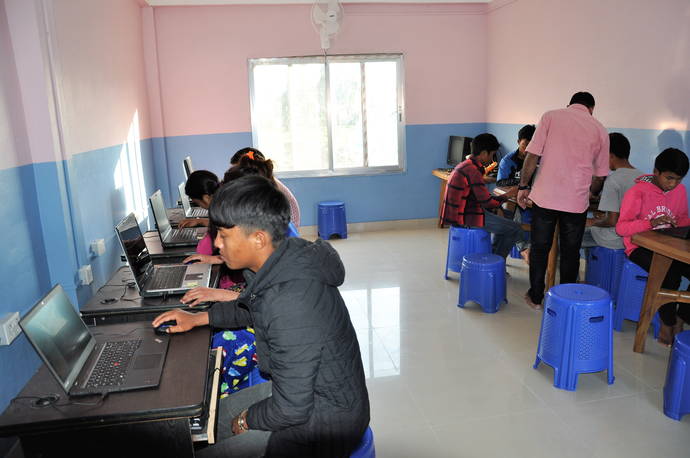
A big insurance company left us twenty laptops. These fully functional laptops are extremely useful in Nepal. We use a large part of them at the Chepang schools. Many children come into contact with computers for the first time and learn to communicate with the outside world.
The Antyodaya Chepang School on an expansion course
Thanks to increasing sponsorships and donations, MedInCharge was able to cover the operating costs of the Antyodaya School last year. The association's reserves now allow a prudent expansion of the educational institution. The school purchased cows and geese, set up a large fishpond and planted lots of protein- and carbohydrate-rich vegetables. This allows the hostel to contribute a considerable amount of self-sufficiency. The school should be able to run autonomously
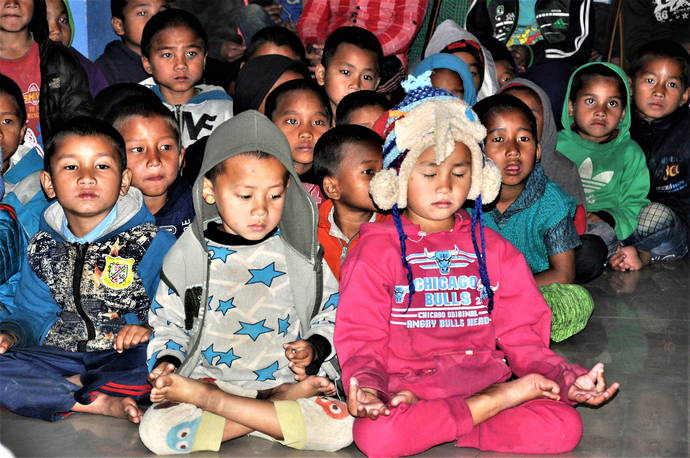
in a few years. The Antyodaya School makes an eminently important contribution. For the first time in their lives, the school offers education to this children and young people. Thus, the children get a fair chance on the long way out of poverty.
Health Camps for the Poorest in Nepal
The children in Antyodaya come from the poorest backgrounds. MedInCharge is therefore committed to support the generation of parents too. On average, we conduct health camps once a month in the impoverished communities of the Chepang. Thanks to a single donation from a person in Switzerland, we will be able to purchase the urgently needed off-roader in the coming weeks. Now we can reach the remote communities safely. We bring medical supplies and clothing to the settlements. Whenever possible, a small truck accompanies us and carries a ton of rice. It is very close to me when we set up our treatment stations after long exhausting journeys between the shabby tarpaulins. We see women drawn by the daily struggle for survival. We look into the big eyes of the malnourished children in their torn clothes, meet people marked by chronic infectious diseases and parasites. The vast misery of these communities can hardly be described in words. Isn't it our duty to give these underprivileged people something of our abundance?
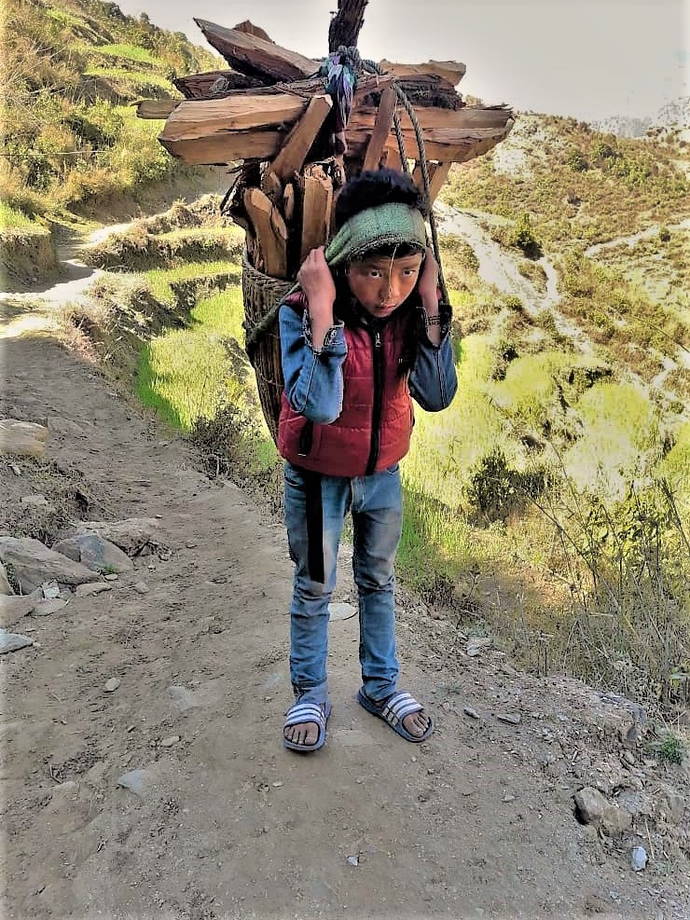
Last year we ran 13 health camps and were able to care for over 2,000 people. A load of 1,500 kilograms of rice costs 1,000 Swiss francs. An entire camp costs 2,500 francs. The accompanying team ideally comprises two doctors, a dentist, three nursing staff, three drivers and about six other helpers. The camps were financed by MedInCharge. This work is only possible thanks to your donations. Thank you so much!
The 2018 financial statement of MedInCharge is online and can be viewed on our media page
Fredi Bacchetto,
Board Member MedInCharge
All board members and volunteers of MedinCharge, both in Switzerland and in Nepal, work for free. 100% of the donations are used for the financement of projects and benefits directly to the needy Nepalese population.
It is a mistake to think that daily confrontation with misery makes it easier to endure suffering (December 2018)
Which core tasks should a doctor perform? Maintain health? Heal illness? To avert death? During my last stay in Therai Nepal I visited a woman about forty years old several times. She lives in a lonely wooden shack on the edge of the jungle along the Rapti River. Her whole face is cruelly deformed by a huge cancer that is spreading inexorably. An unspeakable despair befalls me as I enter her hut. My work in Nepal is associated with numerous moments of great impotence. It is a mistake to think that the daily confrontation with misery makes it easier to endure suffering. Moments of desolation are an integral part of the work of a doctor in Nepal.
"It is incumbent upon us to accompany our sick fellow men in a difficult phase of their lives"
The quotation comes from Gian Töndury, former anatomy professor and rector of the faculty of medicine in Zurich. How true. When all the medicine in the world fails, I reach out to the patient and ask with him for the serenity to accept things that we cannot change. Accompaniment in moments of overwhelming hopelessness helps the patient to build bridges over the abysses of misery.
Many Chepang are still forced to live in tent settlements in the jungle along the Rapti River. By 2017, the monsoon floods had snatched all their belongings from many of them. They receive no help from the government. On the contrary, they have recently been accused of illegally colonizing state land. Between the trees there is no land for cultivation and the areas are far from any medical care. Before my home leave, we again carried out numerous camps in the slums of this very disadvantaged population group. At least every few weeks they receive some rice and medical care.
At the moment we can only visit the Chepang with inadequate vehicles without four-wheel drive. This always puts us in critical situations. When we get stuck in the soaked and muddy paths, the accompanying sisters don't just trust in God: they get out and push hard. If we want to do good work safely, we have to improve our logistics. We will therefore invest a lot of energy in the following months in collecting donations for a 4x4 drive vehicle.
The school leads out of poverty
In the schools of Navodaya and Antyodaya, near our base hospital in Ratnanagar, so many Chepang children are cared for as infrastructure and finances allow. MedInCharge has employed Sarita Masrangi, a young Chepang woman who now works as a health nurse at both schools. Sarita grew up 13 years ago in Navodaya and recently graduated as a nurse in Bharatpur. A success story with sustainability. Congratulations Sarita!
Some children of Antyodaya are still looking for a sponsor to provide them with an education. Education leads out of poverty, as the example of Sarita shows. The children have prepared drawings which will reach your mailboxes in the coming days as a Christmas greeting from the school.
When all our Christmas wishes are fulfilled and friends and relatives have received their presents, the remaining budget may allow a contribution to our projects or even a sponsorship:
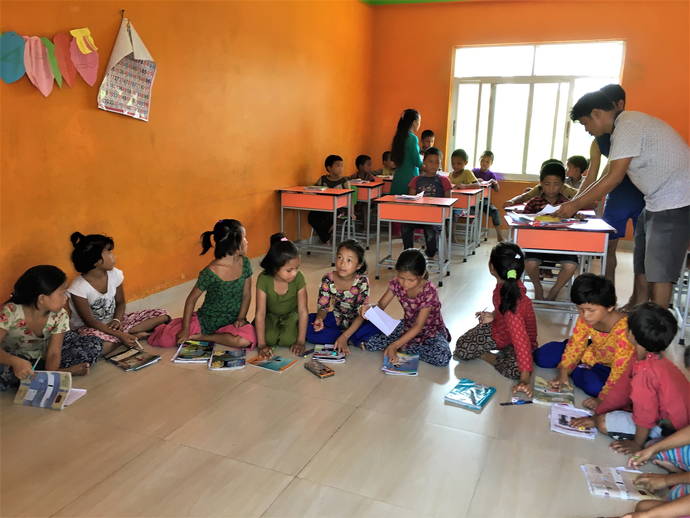
Christmas is coming. Time for reflection, for looking back and perhaps also for expectations of the new year. Faith can strengthen. We should have more faith. Those who believe stretch a rope between two certainties: Our existence is only a small flashing between two points in the eternal cycle of time. We were born and we will die. This rope connects two eternities beyond our power. Between them we spin the thread of our life, love and suffering. Those who believe assume that the balancing act has a meaning and that this meaning can carry us.
In this spirit we wish you all a reflective holiday time
Fredi Bacchetto,
Board Member MedInCharge
All board members and volunteers of MedinCharge, both in Switzerland and in Nepal, work for free. 100% of the donations are used for the financement of projects and benefits directly to the needy Nepalese population
Looking for 200 godparents for the children of Antyodaya Chepang School (September 2018)
Immediately after my arrival in Nepal in mid-September, all the professional drivers in the country went on strike. The government had announced the introduction of a new law for the chauffeurs, which would have made them financially responsible for the numerous and horrendous traffic accidents. The government reacted to the withdrawal of the drivers with the archaic instruments of their Maoist party book and announced a general counter strike for all motorists. Taking part in these kinds of riots is not optional in Nepal. Indeed, if you were to refuse, you get arrested by the police. So once again, almost nothing was moving in Nepal. At first, I was able to count myself among the lucky ones as my motorcycle wasn’t concerned by the strike regulation and, as a biking doctor, I could continue to offer my services within a radius of a few kilometers. However, only briefly: Without truck drivers there is no gasoline delivered to the stations and using the applicable laws of internal combustion engines that are also valid in Nepal, my Renegade stopped after about 300 kilometers.
In a developing country, such inconveniences need to be endured with serenity. We are committed to helping the poorest sections of Nepal’s population. Through health camps in the mountains and jungle settlements of the Chepang, we provide the parent’s generation with medical care and food. MedInCharge is particularly involved in the Antyodaya Schoolwho opened in 2017. For the time being 200 Chepang children receive food, clothing, medical care and education.
To ensure the future of the Chepang in Antyodaya, we have decided to establish an
individual sponsorship for each child. We are in the process of setting up an IT room for the children with second hand computers from Switzerland. The Chepang should learn as early as possible to deal with these important means of communication in the third world. We are would like to invite you to enter into a dialogue with a child in Antyodaya. If you sign up for a sponsorship, we will give you the
personal address of the assigned sponsored child and you can contact him if you wish. Google translator in English is totally enough for a meaningful exchange. The duration of your sponsorship is up to you and you can withdraw at any time. In this case, MedInCharge guaranties for the support of the child concerned without interruption.
Yes, I’ll take part in a sponsorship and invest 50 francs per month in the future of a Chepang child:
--> either via the online form under
https://www.medincharge.ch/fr/contact-soutenir-parrainages
--> or by e-mail to fbacchetto@medincharge.ch stating the contact address.
--> Or by post stating the contact address to
«Cristina Bacchetto, MedInCharge, Chroslenweg 9, 3177 Laupen»
Finally this:
A few months ago, Shaison P. Ouseph shot a touching film at Antyodaya School. Our son Tobias, my dear colleague Ruth Gonseth from Shanti-Med-Nepal and myself participated in it.
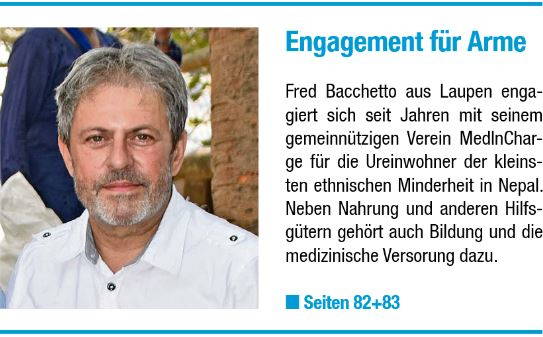
The Newspapers of Köniz and Sensetaler dedicated an article to the work of our association MedInCharge in their September issue 2018 (in German):
Here the Link to the article:
As usual here the link to more pictures in our photo gallery on our homepage:
https://www.medincharge.ch/de/photo-gallery
All board members and volunteers of MedinCharge, both in Switzerland and in Nepal, work for free. 100% of the donations are used for the financement of projects and benefits directly to the needy Nepalese population.
We send you warm greetings
For the Board MedInCharge
Fredi Bacchetto
Chaainaa !! (June 2018)
"Chaainaa" in Nepali means "not available" or "does not exist". In Nepal, "Chaainaa" is rarely associated with a solution to the non-existing. In Switzerland, I can’t identify any "Chaainaas". Nearby Bern offers everything my heart desires, both materially and immaterially. If something is missing in the offer, I can order it without delay on the Internet and it is posted the same day. In Nepal, the Internet connection is more often disrupted by the many power outages than available.
On the terrace in front of our house in Laupen, the tranquillity is overwhelming when I lie in a deck chair. No deafening clattering tractor trailer, which thunder without interruption on the large aisles on the road surface. No stressful horns, which makes me want to jump away from the road. In traffic, everything runs according to well-defined and beyond-complied rules and the movement is possible without increased risk to life and limb. In the morning I wake up on a soft mattress, get a newspaper from the mailbox and sit down at a richly set table for the morning meal.
On Summer Leave in Switzerland
I’ve been back in Switzerland for a summer leave since a few weeks. At the same time, increasing monsoon rains are rising in Nepal. We can only hope that they will not destroy as many existences as this 2017. Along the Rapti River in Nepal, thousands of families of the Chepang tribe were deprived of their existence less than twelve months ago. Since then many of them are living in tent settlements in the jungle along this river, with no land for cultivation and no medical
care. If they are lucky, from time to time a few 4x4 vehicles appear. They bring urgently needed rice, medicines and healthcare professionals. For a few hours, a health camp will be set up and several hundred people will be examined and treated by a doctor. They have even better luck if a child can be sent to one of the big Chepang schools near the Ratnanagar Hospital. Per family, a maximum of one member aged of four and over is admitted. The schools provide food, clothing, housing, education and important medical care to the children.
The Chepang always in the main focus of MedInCharge
MedInCharge invests many resources in the care of the Chepang. As doctor, I have been assisting over a dozen health camps in Nepal since the fall of 2017. Sometimes my colleague and dermatologist Dr Ruth Gonseth is with us. We owe her much support in critical moments thanks to her many years of experience in Nepal and the patronage of their association Shanti-Med-Nepal through the Ratnanagar Hospital. At many other health camps, I was accompanied by the small community of Sisters of St. Joseph of Cluny and their friends. In the periphery of Hetauda we visited numerous remote mountain villages, slums or jungle settlements in the spring of 2018 and supplied over a thousand people in a short time. I have great respect for the sacrificial devotion of these young Sisters.
Our biggest support among the Chepang Schools still requires the young Antyodaya School of Bobby Anthony. As the school continued to grow in self-sufficiency, our monthly allowances were recently reduced by $ 1,000. In order to maintain the basic operation, the school nevertheless relies for a long time on the financing by third parties. In particular, fair wages for teachers are a major concern. So, they stay motivated to do a good job and benefit the young Chepang. Our investments in the Chepang Schools are sustainable help for self-help. With the help of numerous volunteer assignments from my family and friends of our association, we achieved a very satisfying situation at large Chepang Schools in the area around Ratnanagar Hospital. For more information I refer to our last newsletter in March of this year.
It is crucial to secure the financing of our projects
We have booked our next return flight in the hot Chitwan of Nepal for the 13th of September 2018. We dream of landing with secured finances for our little Chepang in Kathmandu. We dream of providing food and medical help to their destitute parents. For that we need your support:
• A health camp costs around $ 2,500.
• A pickup load of rice (750 kg) costs US $ 500.
• The salary of a teacher or nurse is US $ 130 per month.
• Our medicines for the Chepang Schools cost US $ 100 per month.
• A sponsorship for the further education of a young person costs US $ 50 per month.
Nisam, left, 14 und Dipesh, right, 17 depend on sponsorships to continue their studies (Contact adresses over fbacchetto@medincharge,ch)
All board members and volunteers of MedinCharge, both in Switzerland and in Nepal, work for free. 100% of the donations are used for the financement of projects and benefits directly to the needy Nepalese population.
For the Board MedInCharge
Fredi Bacchetto
Review of the first operational year of the association MedInCharge (March 2018)
Dear friends
The first operating year of our association MedInCharge is coming to an end. Time for a quick review.
In first place, we have to thank Dr. Ruth Gonseth and her association Shanti-Med-Nepal (SMN). Through her active support, Ruth has made it much easier for us to get started in Nepal and has opened doors for many projects.
The new Bakulahar Ratnanagar Hospital, financed by SMN, reached its highest point a few days ago in the construction of the foundation. This, however, with customary delay of more than a year. We are all looking forward to moving into the new building, so that we can finally escape the increasingly narrow spaces in the old building. Optimists (Nepali) think this should be possible in 2018. For the latest report on the construction situation, we refer you to the homepage of SMN.
During the first operating year, MedInCharge invested almost 100'000 Swiss Francs in the local primary care in Nepal
No doubt, this was made possible by the generous donations of our friends, patrons and sponsors. You all deserve our sincere and heartfelt thanks. Your solidarity is the resource from which we recharge in the face of the oppressive situation in many regions of Nepal, courage and strength.
The Antyodaya and Navodaya Chepang Schools
All in all, more than 400 underprivileged Chepang children aged between 4 and 17 attend these two schools. The Navodaya School is well structured after more than ten years of operation. Under the direction of Bobby Anthony, an enthusiastic, warmhearted man, Antyodaya was able to outgrow itself.
The main energy of MedInCharge this year was directed at Antyodaya. Through the account of MedInCharge, CHF 50'000 were invested into Antyodaya school in 2018. For the ongoing operation of the big school, we have to secure 6'000 CHF per month. Thanks to very generous donations from the foundation Nelumbo and Nepalhilfe e.V. Bonn, we can guarantee the operation of the school until the end of the year. We regularly carry out extended medical visits in Antyodaya. The big enemies in the medical sector are lice, scabies, mycoses and infectious respiratory diseases. After nine months of activity in the school, the health status of the children can now be qualified as good.
In a record time, an in-house fish farm, a garden and a chicken farm were set up. The school also has dairy cows. The important protein supply for the children will soon be ensured by an independent production. The children and us are very happy about this.
Many advances in energetic support in the Antyodaya School are thanks to Tobias Bacchetto, who absolved his civil mission in Nepal. The school is aware about it and the farewell party was very touching in early March 2018.
And then this
Devastating monsoon rains have swept away many villages with all their belongings in the Therai of Nepal in 2017. The reconstruction assistance by the government is practically non-existent in this region. The older generations of Chepang had to retire after the disaster in very modest camps in the jungle.
For the maintenance of health posts, health camps, construction of destroyed villages, food and medicines, MedinCharge has spent
just under CHF 30'000 in southern Nepal since autumn 2017. Twice, under the auspices of Shanti-med-Nepal, we ran large health camps in the Chepang villages. These encounters mark us deeply and touches every volunteer in the heart.
We look confidently into the second operational year of MedInCharge
All board members and volunteers of MedinCharge, both in Switzerland and in Nepal, work for free. 100% of the donations are used for the financement of projects and benefits directly to the needy Nepalese population.
What more do we want: Thanks to your generous support from Switzerland, we have the great privilege of doing enriching and meaningful work in Nepal for both sides. The warmth of the Nepali population often compensates for our privations. The daily gratitude of the beneficiaries we pass on to you with great pleasure.
We send you warm greetings and best wishes from the Chitwan
For the Board MedInCharge
Fredi Bacchetto
Situation report on Chitwan beginnig of December 2017
The last two months have been marked by many poignant events that underline the purpose of our association's activities. In addition to Tobias and Fredi, Christine and our daughter Cristina were also here, which brings us to a total of 80% of our family. Virginie Kormann and the dermatologist, Christina Emmenegger, also did valuable volunteer work (see Photo Gallery). A week ago, Urs Vogt, chief radiologist at Burgdorf (picture at right) Regional Hospital, joined us for a longer assignment. He immediately started with a lot of enthusiasm the advanced training in ultrasound diagnostics of the young assistant doctors at the Ratnanagar Hospital.
Expansion of support of Chepang schools in Chitwan by Medincharge
Whenever possible, the Chepang send their children to schools specially set up for them by NGOs, where they also receive shelter and food. Due to the big onslaught, these schools reach their capacity limits and it is a great challenge for all of us to secure infrastructure and basic medical care. The cramped space conditions make infectious diseases spread rapidly. Meanwhile, we look after more people in the schools, with more than 500 children and the numbers just keep rising.
At the end of October, the Chepang children returned from a few weeks holiday after the big Dashain festivities. As usual, they brought along with them a whole series of souvenirs that were less welcome, such as fungus, scabies, lice, bacteria and viruses. With the active support of all volunteers, we again examined in chord the hundreds of children and released them with a mass treatment, of all the large and small infectious creatures.
Thanks to many donations from Switzerland, beds for all children have now been made available in record time. This is a great prerequisite to effectively contain the epidemics. A large part of our resources are now absorbed by weekly visits to these schools in addition to the parallel running hospital routine.
The great emergency in Nepal after the floods in summer continues
The entire Chepang village of Chisapani was washed away with several hundred of houses during the flood in August. An uninhabitable sandy desert remains. Until the government allocates new land to these people, they are forced to live in temporary tents in the jungle. We organized a large health camp amongst them and treated more than 260 people in a single day. What we found there is one of
the most impressive things we have experienced and seen so far in Nepal. Poverty and misery are indescribable. The child in the picture below, with the bloated abdomen, suffers from, for example, Kwashiorkor, a severe disease of advanced protein deficiency. To remedy the famine, we left 50 bags of rice in the camp. Despite all that, people remain happy and adapt to the wretchedness. Children make playing balls out of waste bags that they fill up.
Tobias has installed a solar panel with local helpers, so that at least some people have some power again. Ruth. and Christina E. treated countless infectious skin diseases while Fredi, with an assistant from the Ratanangar Hospital and the Nursing Team, provided basic care to the remaining residents.
The arduous way home had us all very thoughtful. But also accompanied by the good feeling to have brought help in a few hours.
We are aware that at Christmas time countless relief organizations send donation requests and it is not easy for us to request help as well. To continue the work of this project, however, MedInCharge remains dependent on donations from its friends. The donations to MedInCahrge are tax-exempt. Our big thanks goes to all donors who make this important work possible for us.
We send you warmest greetings and best wishes for joyful festive days from Chitwan
Fredi und Tobias Bacchetto
Situation report on Chitwan end of September 2017
My son Tobias and I have resumed our work here in Nepal beginning of September. Our resources have quickly been absorbed by two critical events.
The section about Naya Basti is based on an article written by our colleague Dr Ruth Gonseth for Swiss medias.
Major emergency in Nepal due to flooding
The devastating flood came early in the morning at 4 am, tearing people from their sleep. A dam on the Rapti river couldn’t stop the water masses after the monthly monsoon weather anymore. The village of Naya Basti with about a hundred wooden huts was drowned by the flood within minutes. 37 houses were immediately swept away by the force of the water. The inhabitants lost all their possessions, the animals and the whole rice harvest. There only Ermines a vast sandy desert.
A farmer and his family behind de remainigs of his hut
Naya Basti in the southern district of Chitwan, is one of the many villages that were destroyed by the violent monsoon raids in Nepal at the beginning of August. About 50,000 houses are totally destroyed and 160 people have perished in the floods. It affects the poorest people in Nepal who build their houses near the banks of the rivers. This land belongs to the state, and they allow the poorest to build their simple wooden huts there.
Faced with the helplessness of the state, people depend on the support of local and foreign organizations. We have received many help calls. Thanks to the generous financial support provided by our partner organizations Shanti-Med-Nepal (Dr Ruth Gonseth) and the Swiss Foundation Nelumbo, we were able to provide help within very short time. In several villages, we helped with food, clean water, tents, blankets and clothes over the first difficult days. With the "Health Camps" we now also bring health care to the villages. In Naya Basti, we held our consultations for about 100 patients in the church, together with our colleague Dr. Ruth Gonseth. In front of the church, we distributed the relief goods. The plight of the people is very oppressive and we hope that the donation money in the account of the association will be enough for many more places.
Bad state of health at the Antyodaya Chepang School of Bobby Anthony
The "Chepang" are among the natives of Nepal and a small ethnic minority. An almost forgotten people, today one of the poorest in Nepal.
The Chepang were originally nomads who migrated from Tibet into the wooded mountain regions of Nepal.
More than 50 years ago, the then King ordered the civilization of so-called "primitive" aborigines. This was associated with a forced settlement in less elevated areas. The Chepang were thus deprived of their roots and traditions. They live today as poor peasants and hardly have any land. Today there are about 35,000 Chepang. The state is not in a position to offer the education of the Chepang children, which is why private aid organizations face this challenge. Demand is huge and exceeds the supply by a lot.
Bobby Anthony is a busy young Indian. He has set up a Chepang school in record time for over 200 children near our hospital. A few weeks ago, Bobby admitted the first 180 children to the school. The school's infrastructure is still spartan. The children eat and drink on the floor. They sleep closely together on the naked asphalt. Under such conditions, scabies, fungi, bronchitis, sinusitis, whooping cough, fever, chickenpox, and more spread epidemically.
Immediately after our arrival in the Chitwan, we received a call for help from Bobby because of many sick children. In a spontaneous health camp, we decide to examine all the children of the school and to provide medical care for them.
In front of us an endlessly long queue, which has not decreased by noon. Fredi and Ruth investigate child by child, while Tobias tries to secure the distribution of medication
with Tobias and assistants. Over 90% of the children have serious infectious diseases. The initially disciplined human chain is increasingly divided into parts, until we are all surrounded by countless curious children of all ages. The heartfelt sentiment is touching us all in our deepest interior. Nobody can escape the charism of a Chepang kids. The indoor temperature significantly exceeds the 40-degree mark in the afternoon. Nobody seems to have a problem with it. Besides us Europeans.
After discussing with Bobby, the infrastructure needs to be expanded immediately. We agree with Bobby that he will begin the construction of double beds immediately. Within three weeks it should be possible to provide a bed for all 180 children.
Medincharge secures a deficit guarantee of up to 10'000 Swiss francs for bed production. A double bed costs a little more than 80 francs. With a donation of 40 francs we can offer a regular sleeping-accommodation for a Chepangkind.
We gladly accept contributions under IBAN CH48 0900 0000 8975 4784 8, MedInCharge, Chroslenweg 9, 3177 Laupen.
To join our actualized photografic Gallery choose :
https://www.medincharge.ch/en/photo-gallery
Report INF EAR-Camp Jumla,
18. to 30. Mai 2017
18.-21.5.2017
Pokhara, 6 o’clock in the morning. Departure for the Ear camp in Jumla. The place is located in Western Nepal at 2'400m altitude. We fight our way up through the Nepalese mountains with 2 Landrovers and a little four-wheel drive truck for 37 hours. First on acceptable roads, along imposing heights and steep gorges, via Tansen down to Butwal and then again sharply northwest to Nepalganj. First overnight stay in Surkhet, after 17 troublesome hours, often on off-road surfaces with potholes and rocks.
We take off again early in the morning. But after an hour, one of the Landrovers breaks down in the middle of the mountains. In vain, the drivers try to repair the gearbox problem with great effort. Finally, the car must be abandoned. The load is redistributed to the other two vehicles and a replacement car is requested. Four members remain behind, to travel together in the event of a further breakdown. The remaining two vehicles follow the course of the Karnali River in seemingly endless windings. After 16 hours, in the mountain village of Manma, in the district of Kalikot, at 2,500 meters above sea level, the team is finally reunited the next morning, at six o'clock. Those who were left behind are now in a smaller but newer and more reliable 4WD vehicle. And so, we continue.
Now the roads, or at least what the monsoon has left of them, are particularly adventurous. We drive through the most fantastic mountain formations, along narrow streets, ever deeper into the north-west of Nepal. To the left of us is the Karnali River, sometimes on the same level, then seen from dizzying height. Have you ever overtaken or passed a truck on a valley side, when the unsecured road is covered with slippery mud and just 30 centimeters wider than
both vehicles? The passenger has the opportunity to observe the river in question from the side window! The river flows through the rocks 1500 meters lower down, right at the base of a vertically sloping rock wall, which runs directly down from the edge of the road. Finally, we reach Jumla after a strenuous ride in the early afternoon. It is cold. There are no heaters. At the local bazaar, we all cover up with additional clothes.
Without delay, the team begins the establishment of the camp, which is set up on the site of an old hospital unit.
Saturday, 20.5.2017, 8 pm, Ear-Camp Jumla
We sit exhausted at supper, when Mike receives a help call from the operating room of the nearby regional hospital. A woman with a bad facial fracture after falling from a tree. Mike performes surgery on the lady until late into the night with the local team. What is impressive is the background story
of the woman. She lives with her husband and two children far away in the mountains. The coupleare both deaf and they do not have any money whatsoever. When they were found seriously injured by members of the village community, they were taken to the hospital. The children bustled around, in order to collect some money from their local relationships, in order to pay for the intervention. But that wasn’t enough. Here it is up to the aid agencies to build bridges in between the insurmountable abysses of poverty, in order to secure treatment.
Sunday/Monday 21./22.5.2017
It is impressive how the experienced group establishes an operational outpatient clinic (OPD), an operating room (OT), a pharmacy, an auditory testing center and a patient registration and recording center within 24 hours.
Every camp participant has his important task here. The system is designed to remedy malfunctions whenever possible, every staff member has important and flexible roles:
· Dr. Mike Smith, ENT surgeon, is always in the OT for very complicated cases.
· Dr. Fredi Bacchetto, a specialist in preventive medicine and in public health, responsible for reporting and assistance on all fronts.
· Dr. Nirmal Thapa, an ENT specialist, attends up to 180 patients a day, providing treatments of the ear in all variants.
· Dr. Krishna Bogati, anaesthetist for all surgical interventions, therefore practically always in action.
· Mr. Robin Lama, theatre instrument manager and operation assistant, also always important in all surgical interventions.
· Mr. Ashish Sharma, an audiologist, performs more than one hundred auditory examinations per day.
· Sister Surakshya Kunwar, nurse, patient preparation and operation assistant, postoperative surveillance.
· Mr. Rabi Gurung, equipment technician, patient reception. Assistant in the operating room.
· Gom Kumari Thapa, Indra Sahi, essential assistants in the operating room and the outpatient clinic
· Prithivi Raj Baral, Rishi Ram Baral, Tika Ram, drivers, never lose their nerve and control over the vehicles, even in the most difficult situation. In the camp, they’re also responsible for the shaving of the patients and other tasks before surgery.
· Eka Dev Devkota, Camp Coordinator and manager. He makes relationships with the local medical authorities and organises all the team and many other details. Without him, the camp wouldn’t work for more than a minute. He also runs pharmacy during the camp.
· We are also helped by Dhan Gurung, who has run a small ear clinic in Jumla for many years and helped on our previous ear camps there, he syringes wax from ears and is a local link person for the team and patients after the camp.
What is annoying is that the internet connection is getting worse. There is electricity only during a few hours a day, and the connection speed is extremely slow and variable. I’m realising my normal dependence on the net. As a newcomer, I'm just not used to the fact that there is no electricity. I feel very limited in my field of action. Mobile phones are everywhere, but the network links are poor or absent, especially on the road journey.
Tuesday, 23.5.2017, Ear-Camp Jumla
The camp begins to bring people. 85 patients in the outpatient clinic. Four tympanoplasty surgeries. It is astonishing how many people here seem to be walking around with ear infections and giant holes in their tympanic membrane.
Wednesday, 24.5.2017, Ear-Camp Jumla
Two complicated reconstructions of the auditory ossicles for Mike and five more eardrum interventions. The surgeons will not leave the operating room until 20 o'clock. The waiting list for major interventions has meanwhile increased to 39. And it is only Wednesday.
Thursday, 25.5.2017, Ear-Camp Jumla
At noon Mike has already performed three tympanic surgeries.
In the OPD a young man, Bhairab, presents himself with advanced suppuration of both ears, with severely damaged temporal bones. The infection has penetrated both middle ears, and has already destroyed all auditory ossicles on the right. The hearing loss of the young man will soon be more or less complete. In addition, if the abscess is not treated, it risks damage to the brain. The patient needs surgery urgently.
In Nepal, the patient never makes the decision about an operation alone. The decision is always made with the family and the relatives. The relatives of Bhairab live in the mountains of Nepal. For this reason, the young man's accompanying partner should give consent. But she doesn’t want to take that responsibility alone. Therefore, the only other suitable available person from the patient's extended family is first consulted.
At 13.45 pm the time has come. In a several hour operation, which requires the surgeon to perform the finest of his fingers mechanics, Mike opens the right mastoid bone and removes the diseased areas and remaining parts of the tiny ossicles. He then reconstructs them into the middle ear. Then he rebuilds a tympanic membrane and closes the huge mastoid cavity with
grafts and a large soft tissue flap.
To finish the day, the last operations are another tympanoplasty, an excision of a huge cyst behind the ear of a 10-year-old boy and placing a tympanic vent tube. 115 patients were treated in the outpatient clinic. Ashish has done 67 Audiograms. The camp team does not return to the lodgings until after 8pm.
Friday, 26.5.2017, Ear-Camp Jumla
When we enter the camp shortly after eight in the morning, there is a huge crowd waiting for us. A loud gesticulating crowd, just like a pop star, besets Rabi! Everyone wants to get as good as possible position on the waiting list. Their patient number is written on their forearms with a water-resistant pen.
Nirmal treated 65 patients in the OPD up until noon. In addition, there are now only 5 major interventions left to do: 3 tympanoplasties and 2 ossicular reconstructions. Unfortunately, many patients just do not show up at the intervention appointment. This leads to unnecessary loss of resources, because substitute patients who have not eaten or drunk in last few hours cannot be found without delay. They must have empty stomachs, for safety during the operations. Although almost all surgeries are under local anaesthetic, the patients are often sedated as well.
Saturday, 27.5.2017, Ear-Camp Jumla
Actually, the only official holiday of the week in Nepal. In the OPD we are currently treating 114 people. Mike and Nirmal perform six major interventions, five eardrum reconstructions, and an ossicular reconstruction.
Sunday, 28.5.2017, Ear-Camp Jumla
In the operation room, the surgeons still perform six major operations, two mastoidectomies and four reconstructions of the auditory ossicles. The OPD remains closed. as well as the statistics on the Ear camp. We have seen over 500 patients in the OPD and performed 36 ear interventions. Over 120 procedures had to be postponed. The hearing of these patients will have to wait for the next camp. There is still a lot to do.
Electronically, I have been completely cut off from the outside environment for more than 24 hours. There is not much electricity, no WiFi and no Internet. The cell phone line has also been dead for a long time. No contact with my wife Christine, my children, or work in Switzerland. What is unpleasant is that neither I nor any one was expecting this state of affairs. There was no opportunity to warn them in advance. I'm simply no longer contactable for them.


